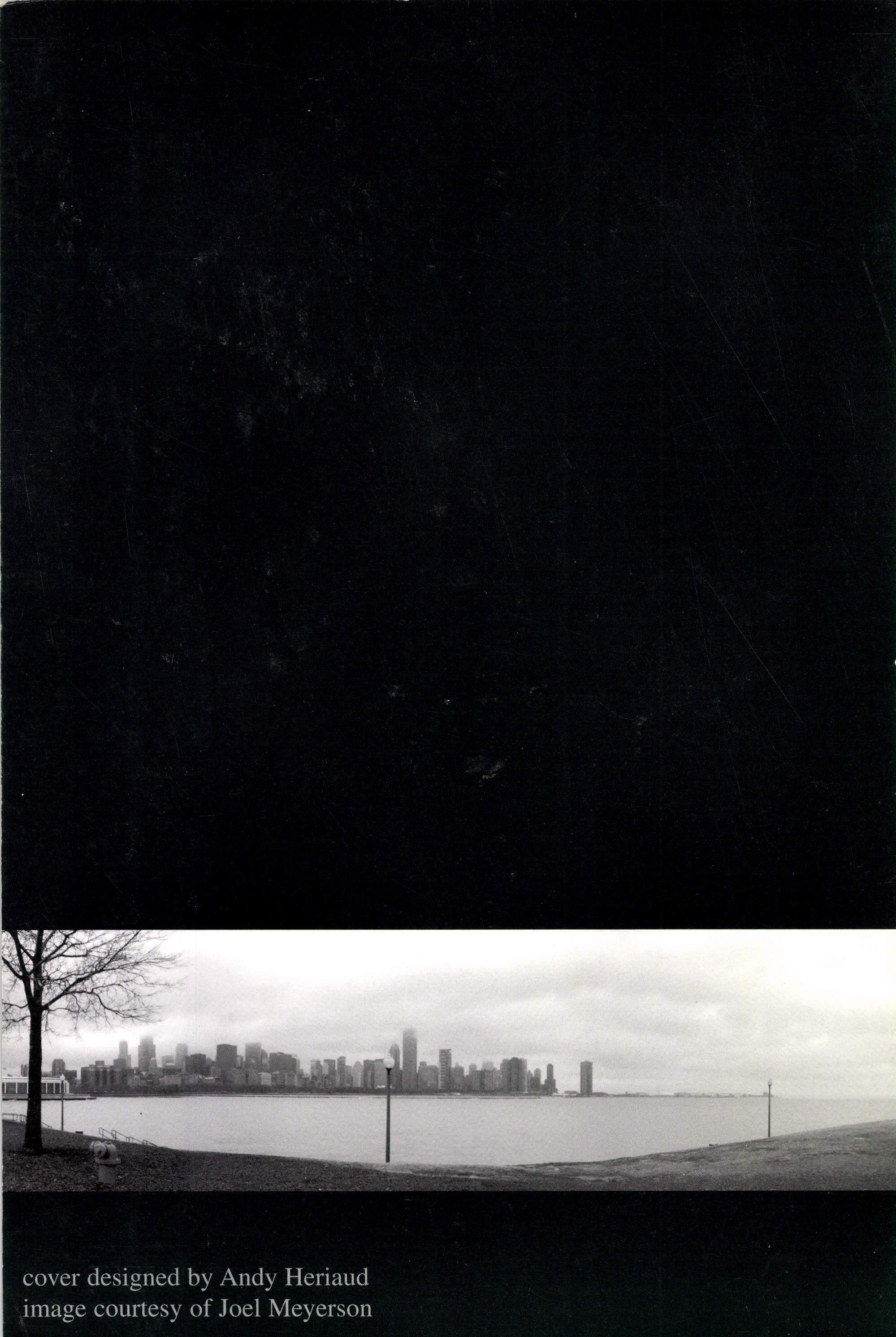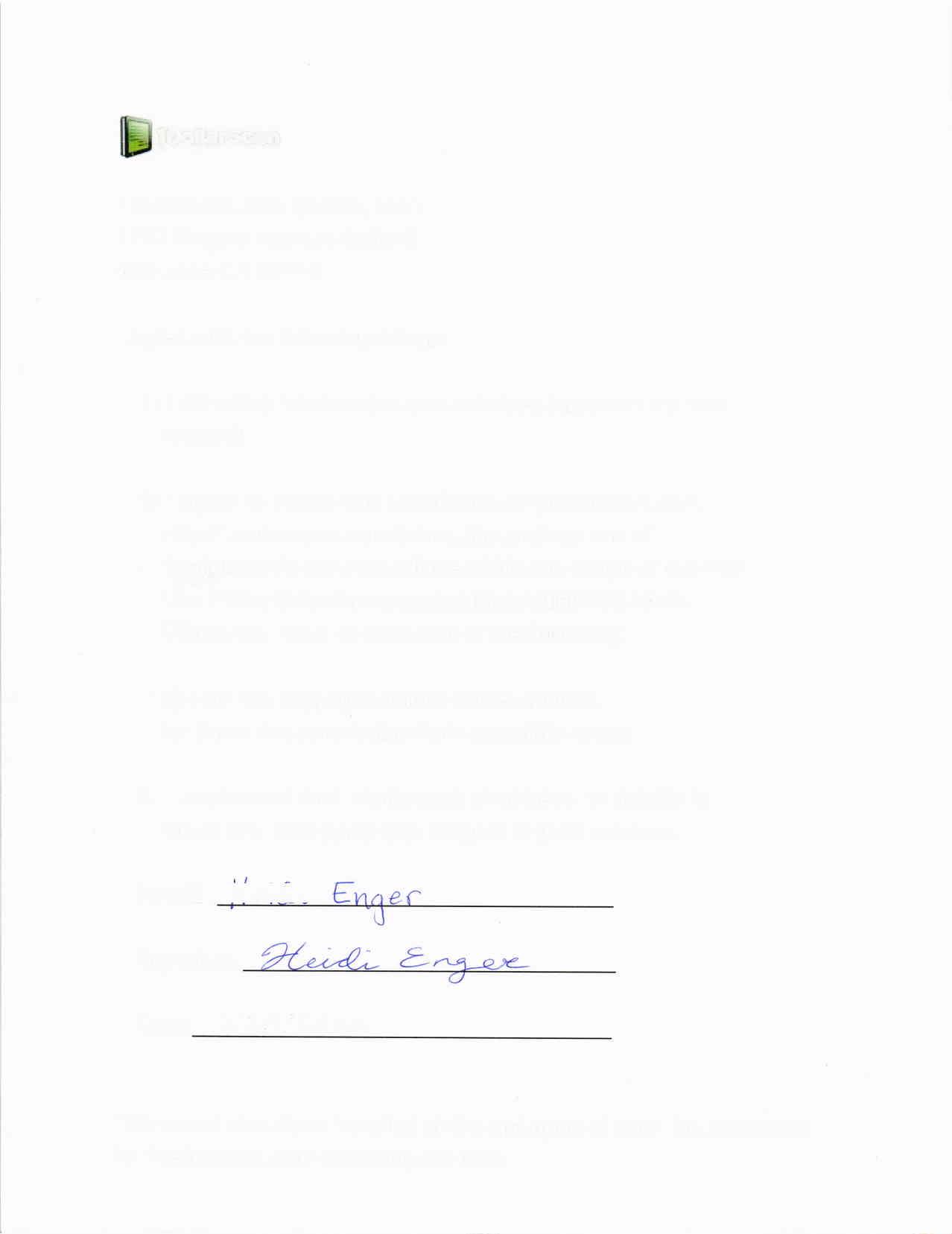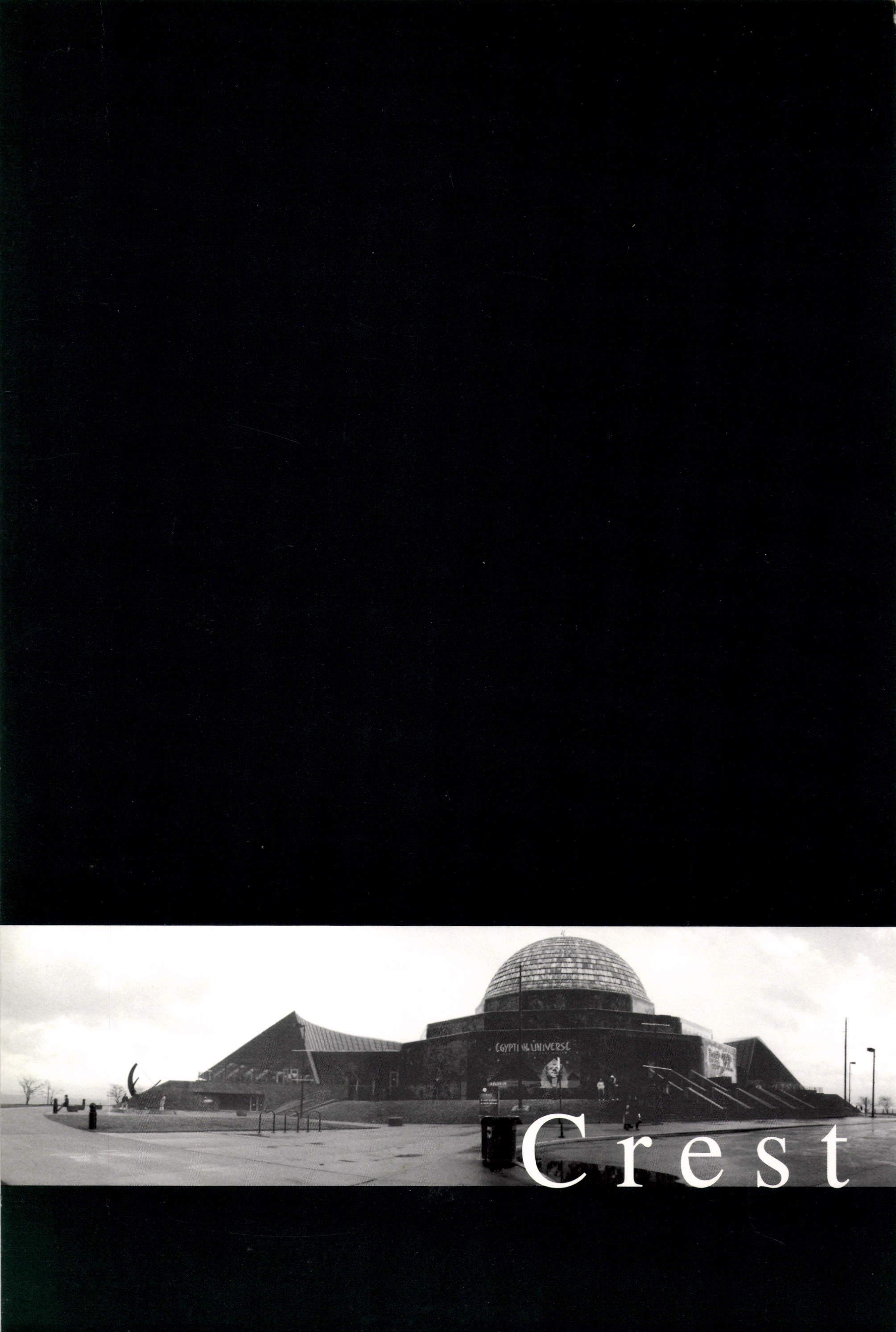
,:f_
i

CTEST 2006-2007
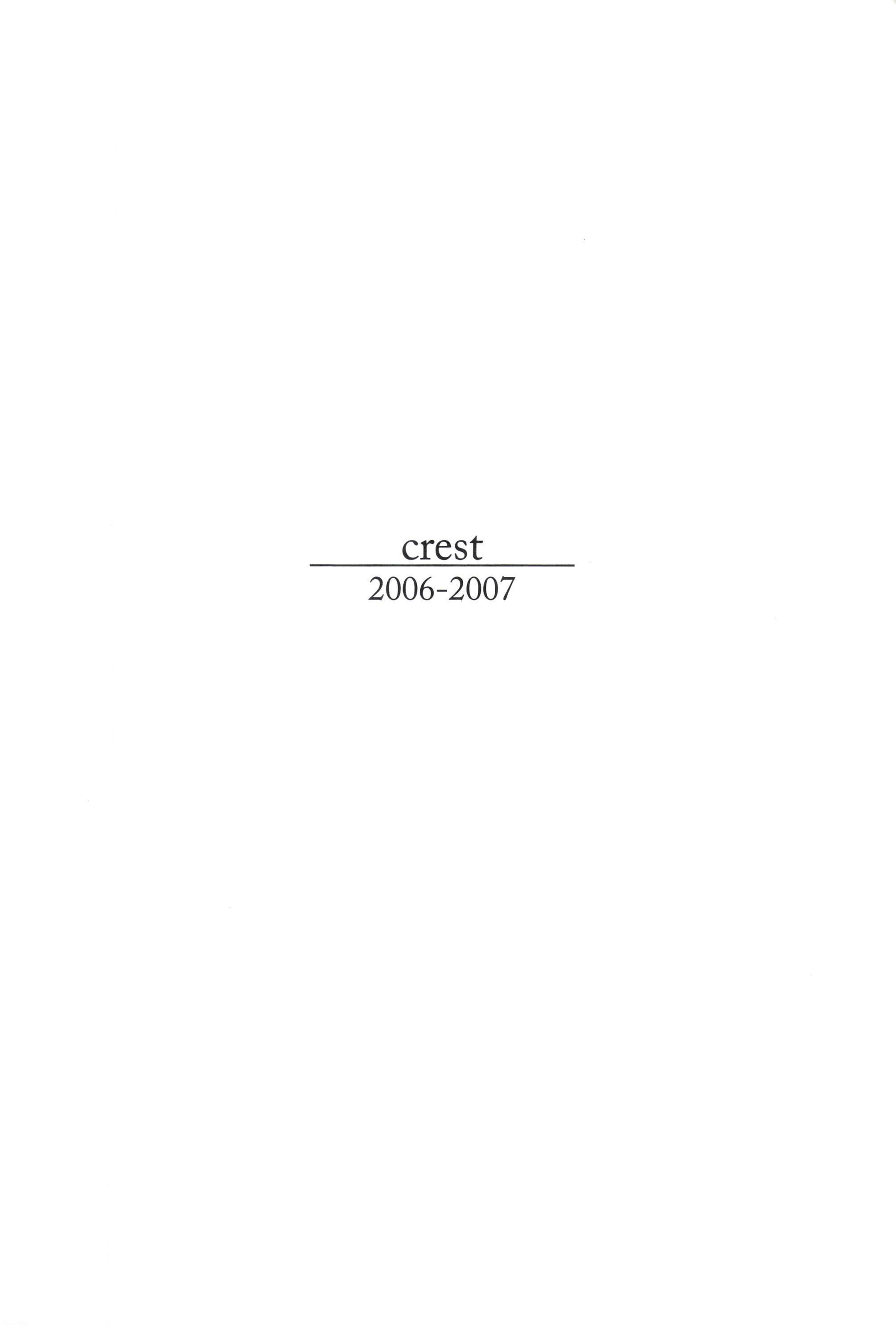
EDITOR-IN-CHIEF Claire Lombardo
EDITORIAL BOARD
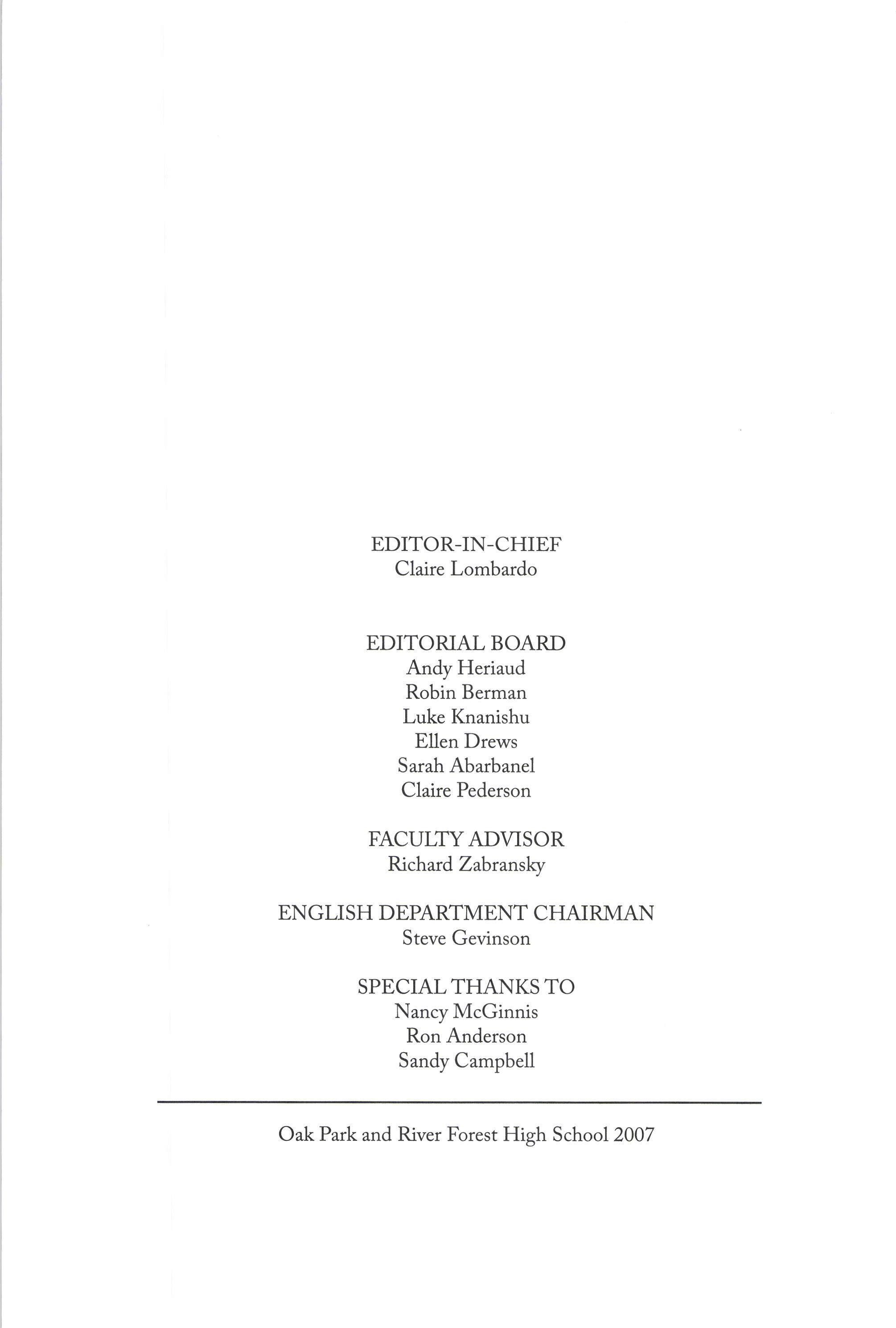
Andy Heriaud Robin Berman Luke Knanishu Ellen Drews Sarah Abarbanel Claire Pederson
EACUUTYADVISOR Richard Zabransl<y
ENGUSH DEPARTMENT CHAIRMAN Steve Gevinson
SPECIALTHANKS TO
NancyMcGinnis
Ron Anderson Sandy Campbell
Oak Park and River Forest High School2007
Laura Osterlund Yasmin Abdalla JoyJones M^ggy Kucera
Vanessa Haddad Ashley Dye DejaThylor Madeline Roberts Steven Ren Joanna Evans Samantha Stevens Conar Gillard
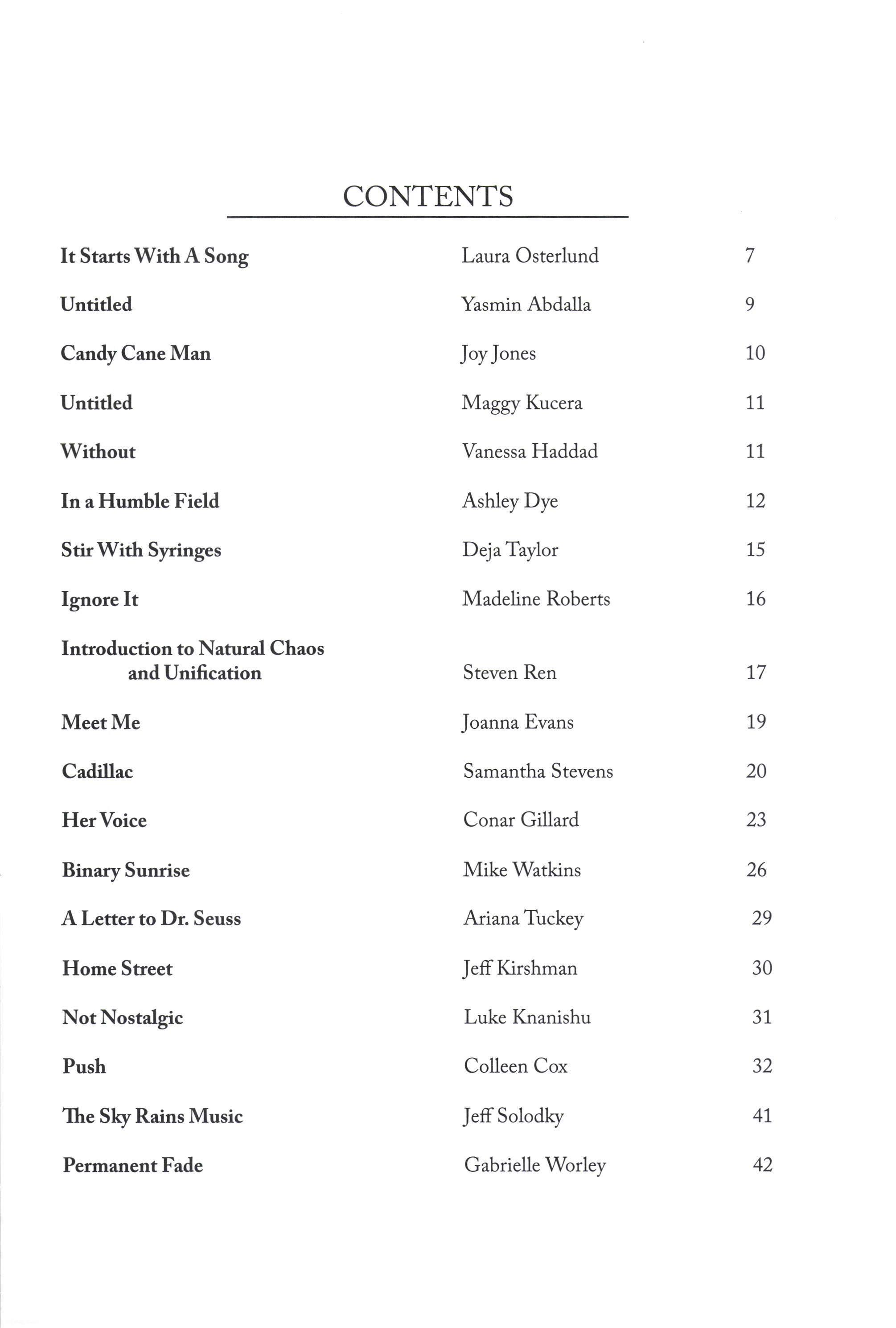
Mike Watkins ArianaTuckey
JeffKirshman
Luke Knanishu
Cox
Worley
Starts
CandyCaneMan
Without In
It
Push
Music PermanentFade
CONTENTS It
WithA Song Untitled
Untided
aHumble Field Sdrwith Syringes Ignore
Introduction to Natural Chaos andUnification MeetMe Cadillac HerVoice Birrrty Sunrise A Letterto Dr. Seuss Home Street NotNostalgic
The SkyRains
Colleen
JeffSolodky Gabrielle
9 10 11 11 12 15 76 L7 19 20 23 26 29 30 31 32 47 42
Anne Dubslry
Jasmine Leslie Robin Berman
Jules Woodard Ellen Drews
Aaron Baskin Kylie Pedersen
Lionel Biichi Novana Venerable Lucy Conley-Smoucha

Keenan Smith
KendellWelch OliviaJaplon Richard Zabransl<y Andy Heriaud Bethany Kibblesmith Laura Osterlund Anne Kenealy
Stephanie Sam Johanna Strouse Natalya Carrico Matt Brown
Life
Earrings
Box
The Brightest Knight
Drunk State ofMatter Untided Jackin the
Bicycle Guys Untitled Crab-ShellBlue Yearning for Freedom I Remember North Challenger TheMute Accident Prone Soldier NoArtist is Normal I SawTwoWomen Kiss 'A Lurking Hint of Kinship" "The End of Something" Salvation God's SmallThings Before You Meet My Father
Adam Levin
Emily Smith
Tony Laz,zeretti
Liz Davis
Derek Baron
Maddie Labadie Alicia Plomin
Brian Stratton
Crescentia Stegner-Freitag
Jillian Merifield DejaTaylor Camille Erickson
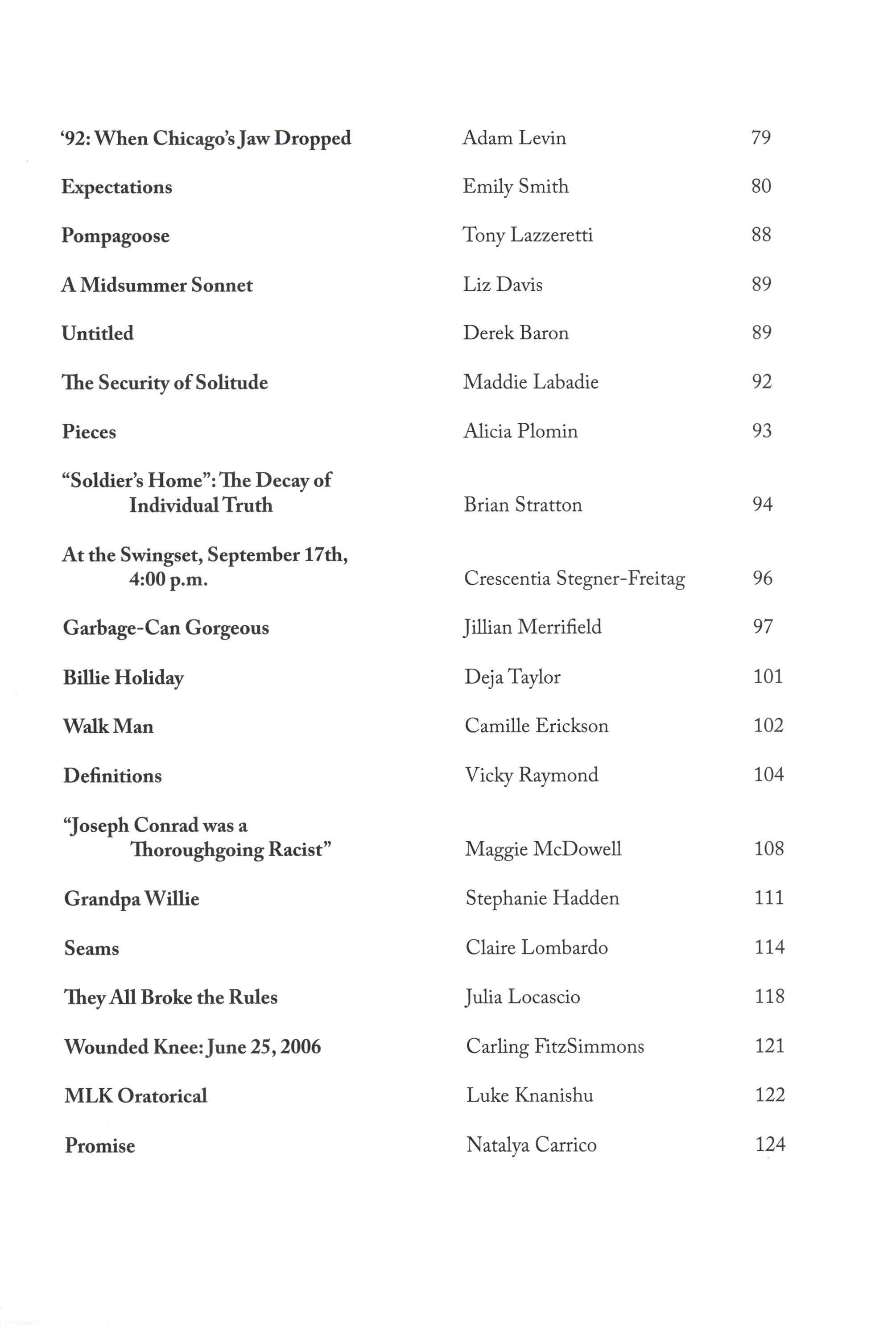
Vicky Raymond
Maggie McDowell Stephanie Hadden
Claire Lombardo Julia Locascio
Carling EtzSimmons
Luke Knanishu Natalya Carrico
'92 : When Chicago's Jaw Dropped Expectations Pompagoose
Sonnet
Security of Solitude Pieces
Seams TheyAll Broke the Rules
Promise
AMidsummer
Untitled The
"Soldier's Home": The Decay of IndividualTiruth Atthe Swingset, September 17th, 4:00p.m. Garbage-Can Gorgeous Billie Holiday WalkMan Definitions Joseph Conradwas a Thoroughgoing Racist" GrandpaWillie
Wounded Knee: June 25, 2006 MLKOratorical
79 80
118
722 724
88 89 89 92 93 94 96 97 101 702 104 108 111 774
727

It Starts With a Song
Laura Osterlund
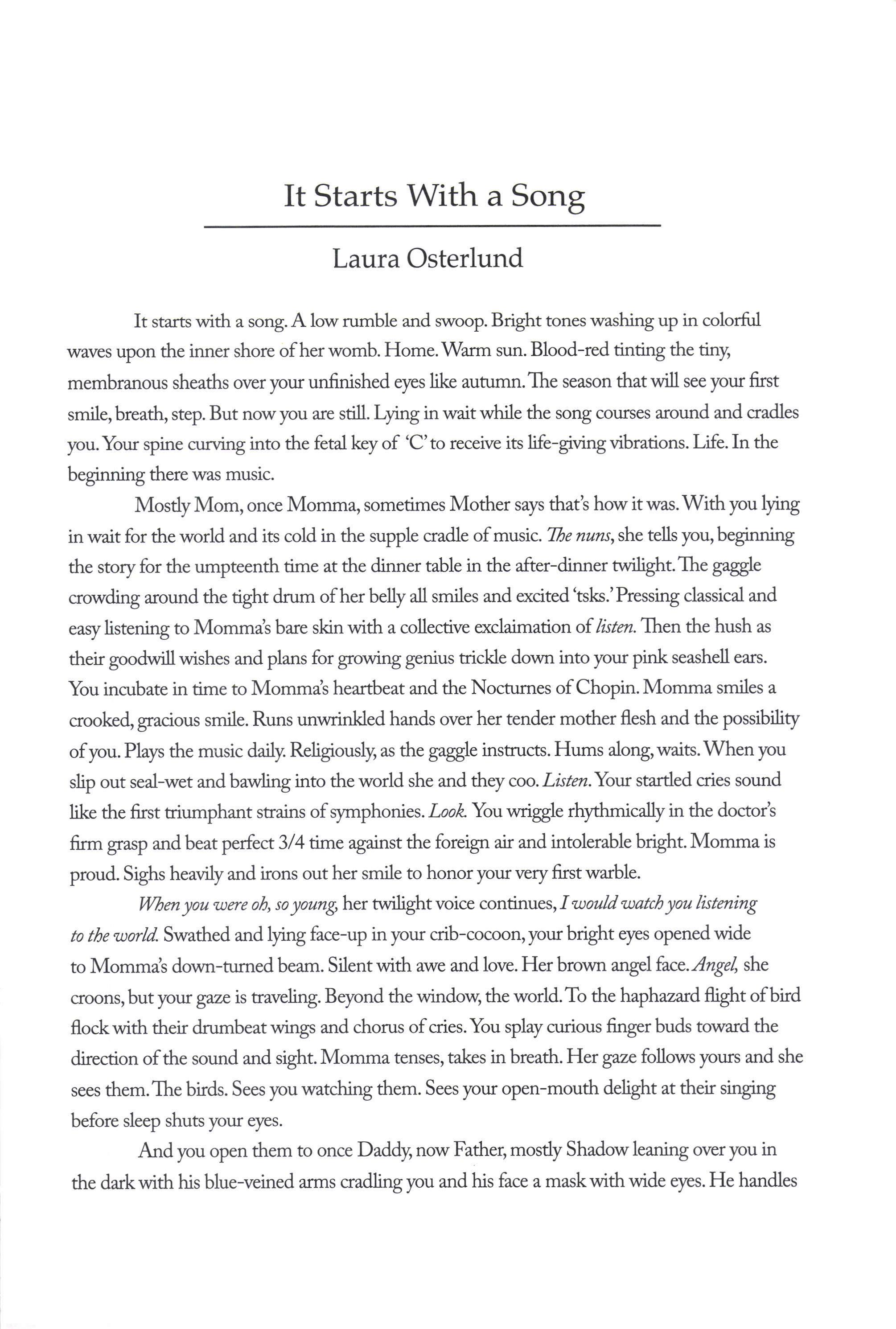
It starts with a song. A low rumble and swoop. Bright tones washing up in colorfirl waves upon the inner shore of herwomb. Home.Warm sun. Blood-red tinting the tiny, membranous sheaths over your unfinished eyes like autumn. The season that will see your first smile, breath, step. But now you are still. Lying in wait while the song courses around and cradles you. Your spine curving into the fetal key of 'C'to receive its life-giving vibrations. Life. In the beginning there was music.
Mostly Mom, once Momma, sometimes Mother sala that's how it was.With you lying in wait for the world and its cold in the supple cradle of music. The nuns,she tells you, beginning the story for the umpteenth time at the dinner table in the after-dinner twilight.The gaggle crowding around the tight drum of her belly all smiles and er<cited'tsks.'Pressing classical and easylistening to Momma's bare skinwith a collective exclaimation of listen.Then the hush as their goodwill wishes and plans for growing genius trickle down into your pink seashell ears. You incubate in time to Momma's heartbeat and the Nocnrmes of Chopin.Momma smiles a crooked gracious smile. Runs unwrinkled hands over her tender mother flesh a-nd the possibility ofpu. Plap the music daily. Religiously, as the gaggle instructs. Hums along,waits.When you slip out seal-wet and bawling into the world she and they coo. Listen Your sartled cries sound Iike the fust triumphant strains of symphonies. LooLYou wriggle rhythmically in the doaor's firm grasp and beat perfea 3/4 nme against the foreign air and intolerable bright. Momma is proud. Sighs heavily and irons out her smile to honor your very first warble.
Wen you uere oh, so loung her twfight voice continues, I would tpatcb you listening to the usorld. Swathed and lying face-up in your crib-cocoon,your bright eyes opened wide to Momma's down-tumed beam. Silent with awe and love. Her brown engelhce.Angel, she croons,butyour gaznistraveling.Beyondthewindow,theworld.Tothehaphazardflightofbird flock with their drumbeat wings and chorus of cries. You splay cruious finger buds toward the direaion of the sound and sight. Monuna tenses, takes in breath. Her gur follows yours and she sees them.The birds. Sees you watching them. Sees your open-mouth delight at their singing before sleep shuts your eyes.
And you open them to once Daddy, now Father, mosdy Shadow leaning over you in the darkwith his blue-veined arms cradlingyou and his face a maskwithwide eyes. He handles
you like a sffange creature. All com silk dor rn and moon-white flesh. Afraid he'll break you. So he stands still and caresses you with warm breath and song. And you dorit knowwhether you're asleep or awake.Is that dream-stuffcoming out of Daddy's mouth or real music?
My Cherie Arnour, pretty little one tbat I adore, Youie the only gtrl my lteart beatsfor...
And why do you all of a sudden want to cry?
(Years later youll tell Father you never heard any singing.l raas asleep, and tbe looe song uasjust a sweet dream.)
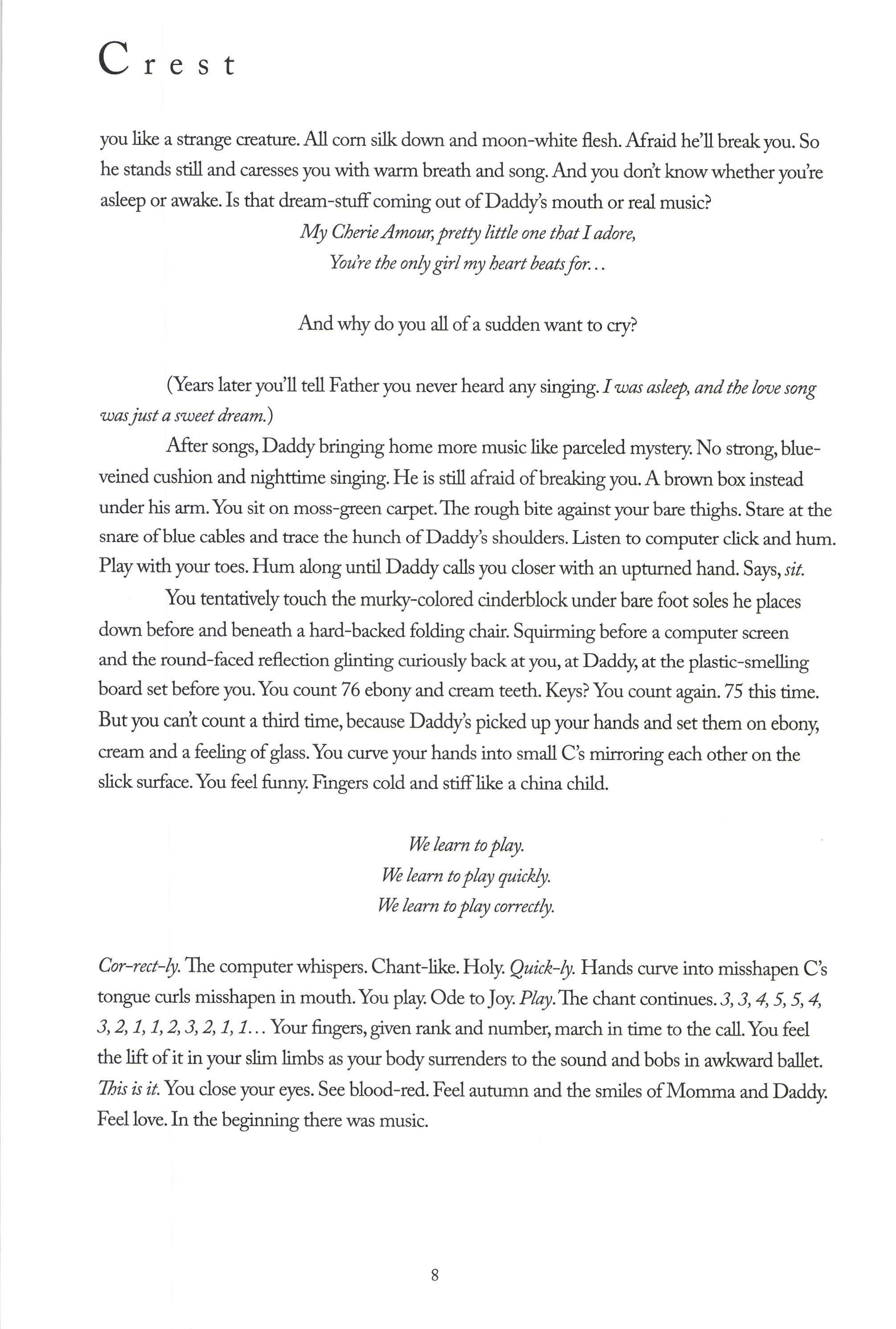
After songs, Daddy bringing home more music like parceled mystery. No strong, blueveined cushion and nighttime singing. He is still afraid of breaking you. A brown box instead under his arm. You sit on moss-green caqpet. The rough bite against your bare thighs. Stare at the snare ofblue cables and trace the hunch of Daddy's shoulders. Listen to computer click and hum. Play with your toes. Hum along until Daddy calls you closer with an upturned hand. Sa1rs, sir. You tentatively touch the murky-colored cinderblod< under bare foot soles he places down before and beneath a hard-backed folding chair. Squirming before a computer screen and the round-faced reflection glinting curiouslyback atyou, at Daddy, at the plastic-smelling board set before you. You count 76 ebony and cream teeth. Keys? You count 4gain. 75 this time. But you carlt count a third time, because Daddy's picked up your hands and set them on ebony, cream and a feeling of glass. You crrve your hands into small C's mirroring each other on the slick surface.You feel funny. Frngers cold and st'rfflike a china child.
W barn toflny. W learn nplay guickly. W learn toplay conutly.
Cor'rect-ly. The computer whispers. Chant-like. Holy. Quick-l.y. Hands curve into misshapen C's tongue curls misshapen in mouth. You play. Ode to Joy. Play.The chant continues. e a 4, 5, 5, 4, 3, 2, 7, 7, 2, 3, 2, 1, 7.. Your fingers, grven rank and number, march in time to the call. You feel the lift of it in your slim limbs as your body surrenders to the sound and bobs in awkurard ballet. Tltis is it.You close your eyes. See blood-red. Feel aunrmn and the smiles ofMomma and Daddy. Feel love.In the beginning there was music.
C rest
8
Untitled
Yasmin Abdalla

As sure as the sun
Burns orange, purple, and pink
Across vacuous skies running
To kiss the earth goodnight
I will love you
Sonnets race to her pen
Under his name written a million times
She hides her molestation under x-large t-shirts
Shoes as worn down, dirry and ran through as she feels Long nails increase busy fingers that pick up weighted knives She feels her nails are the only thing she can do right They still grow, even though she disappears with each skipped meal
TV watches her for hours
She spaces out from thinking about nothing Copasetic no, comatose maybe, cataleptic yeah Disney movies keep her going because A dream is a wish your heart makes She knows someday her prince will come Soliloquies and arias resound in her mind as she hugs her stomach
As sure as the sun
Burns orange, purple, and pink
Across vacuous skies running
To kiss the earth good night She will love herself
2oo7
9
Candy Cane Man
]oy Jones
Candy cane looks cool on the corner selling crackle crackers that pop and make loud sounds like fire crackers exploding on the 46 ofJuly sayrng bye as they sparkle in the dark sky my my I see the light fight against the night and overpower the darkness as it entertains the audience ofyelling screaming kids that stand amused as they see the firecracker pop while cool old candy cane man stands in the corner and tells the kids "you want some fue cracker like the one in the sky then you got to come over and get a handfirl ofthese crackle crackers" and the silly kids buy buy buy and one yells out, "candy cane man these crackle crackers are cool and I'm going to call you cool" as all the kids voice over power the one that yells out by sayrng "cool cool cool" and candy cane man becomes known as the candy cane man that stands in the corner and looks cool as he sells cool crackle crackers.

C rest
10
Untitled
Maggy Kucera
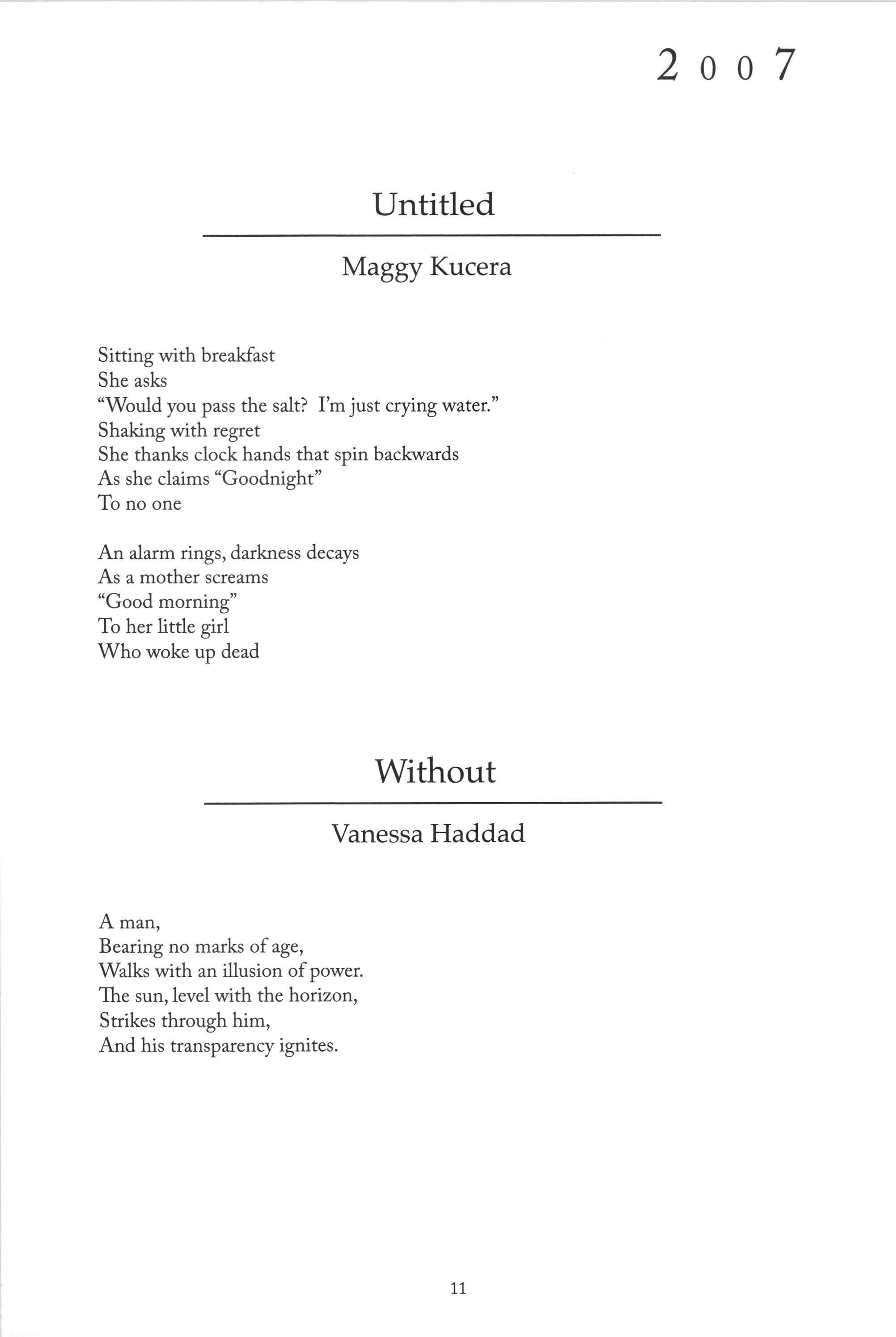
Sitting with brealdast
She asks
"Would you pass the salt? I'm just crying water."
Shaking with regret She thanks clock hands that spin backurards As she claims "Goodnight" To no one
An alarm rings, darkness decays
As a mother screams "Good morning" To her litde girl Whowokeup dead
Without
Vanessa Haddad
A man, Bearing no marlc of age, Walls with an illusion of power. The sun,level with the horizon, Strikes through him, And his transparency ignites.
2 o o 7
71
In a Humble Field
Ashley Dye
A broad field, barely visible from the road, is cozy in its nook of earth. It does not yearn for attention like the rivers and the mountains. A quiet breeze tickles at the grass, bending the blades to its will. Upon this plot are beams and walls set angularly staring at their next opponent in a strategic, obtrusive manner. My talt black boots steal morning dew from the grass and it leaves tear streaks on my toes. The chilled gate screeches as I push it open. My gloves stick for a moment to the icy metal, but then are released. The sand in the arena makes a soft "koosh"with every step I make. I center myself and count in rhythm with my steps, pacing equally each time to ensure accuracy. Seven stridesfrom the stretcb to tbe zoall and two bettaeen each rise of the triple. The pattern is clear. I can see it when I close my eyes and I know, better than I had, what to expect. Strides eguals tirne, plus turning and lead cbanges. Tigbt corners and overlapping ofiumps could be dangerous. My brain analyzes every possibility and finds the most efficient breakdown automatically, for it has been programmed through years of experience. I am ready. Now my better half must be readied too.
Tied to a chipping fence a spirited creature dances, ready to run, ready to jump. I place my hand gendy on her face. She breathes. She is the only warm thing I have touched that day and I keep that warmth with me for as long as possible. The worn tack, molded perfecdy to our bodies, rests unrestricting on her back. I reach under her and tighten the girth. The stirrup leathers snap down and chime against a metal loop attached to the girth. The clang adulterates the silence in the air and its vibrations lasted too long amongst the still wind. It did not belong with the beating noises. Those were welcome and comforting; they bring calmness to my mind and soul. I try to touch her as much as possible while we are getting ready to let her know I'm there and to share our warmth together. I stroke her legs, running my hands over them to make sure I dont feel anything abnormal. Section by section she is checked and rechecked, and she knows I am taking care of her. She always stops dancing for me so I can take care of her. She knows. I wrap my arms around her neck and hug her. I do not want to be unfamiliar to her when we ride. Leather strips are laced in my fingers. I place my foot in an stirrup slowly but deliberately. Hop. Carefully I ease my weight onto her back and find our center of
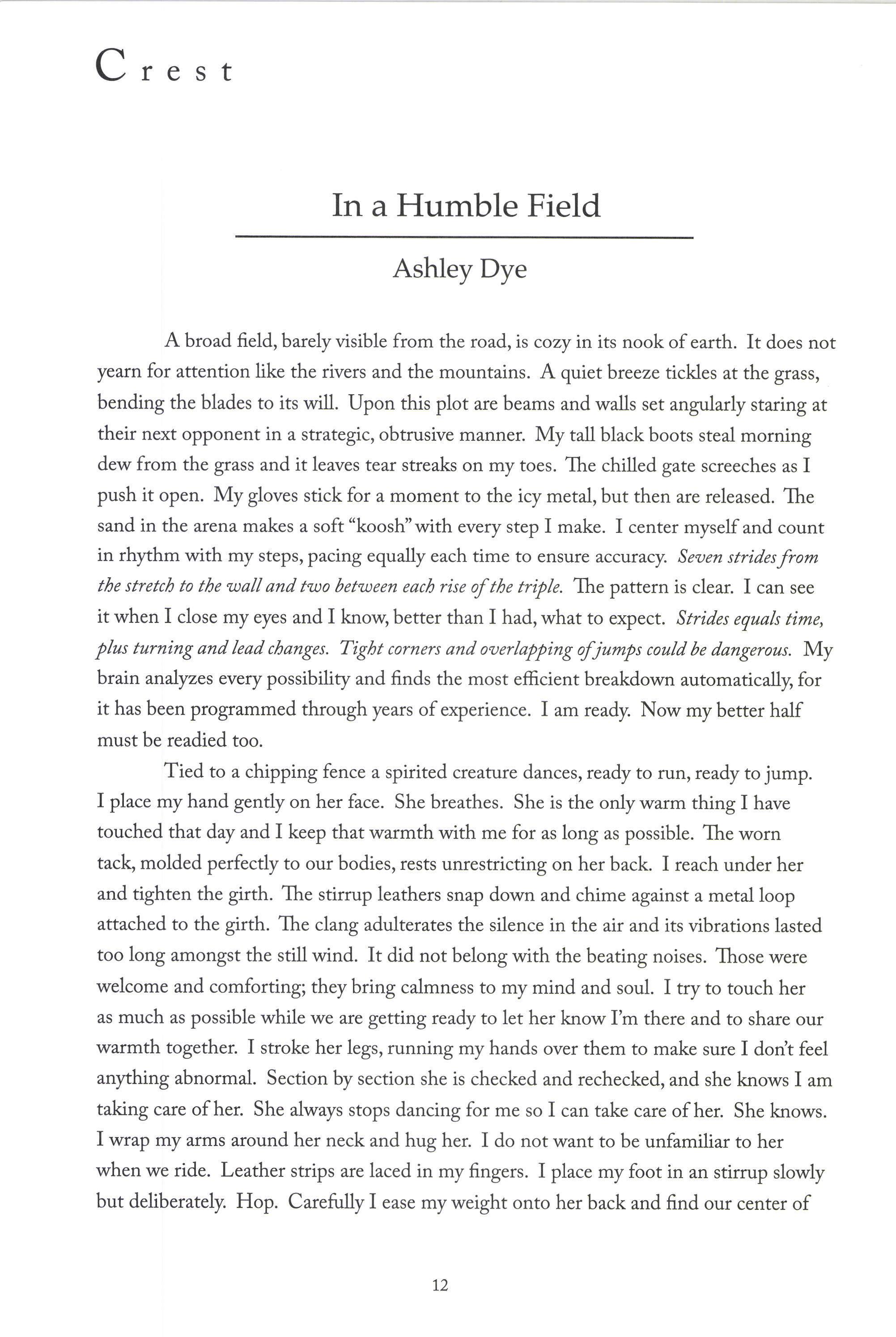
C rest
t2
balance. My feet feel safe in the stirrups and I scan the foreign yet familiar landscape. My new legs, not of me, walk with me, containing a contagious energy. We are one unit now. Like a hook and eye we fit together,locked in. Everything we do must be together and with the other's knowledge. If not, the outcome is irrelevant.
In our warm-up,I notice that her back right hip is sticking out and she's not getting under her stride very well. Maybe tbere's a rock. We stop and I jump off. I firmly run my hand down the back of the leg she is favoring. She shifts her weight for me and I lift her leg. There is a large stone wedged in her hoof I pick it out.
"Better, girl?" I ask as I rub her leg. I get back on and we try everything once more. She's better now. I can feel her under me a lot more and the pressure I feel from her body in motion paints an accurate picture in my mind of what we look like.
Frve couples have completed the obstacles but all with faults. Weak pacing. A dangerousfying lead cbange in a deep corner. Sbarp turns- The dance for this pattern is not loopy or kind, and the trick is to make it elegant. We breathe. It will be elegant. Our insides aren't cold anymore because our hearts are beating with determination, but a chill is still in the air and it nips at our tips. It's time. Adrenaline rushes through us. Our hearts beat so loudly they make noise. We circle in preparation and with a kiss to the air she quickens to a canter. I can feel us getting warmer with every stride. One more circle and a little faster. Adrenaline takes over.
The rush clears our mind. Four strides to thefrst jurnp. One. Tr,to.Three. Four. Lift. We breathe and do not again until we land back on earth. Clean. I must always look forward. Never down. I must be our eyes. Her ears frame our next target. I know this next part will be a trial, but she knows it too. Our lungs breathe as one. Our hearts beat in unison. We are of one mind and spirit for a time. Lift. Breathe. Hold. Clean. No time.We turn and I shift my balance to guide her softly. Qrickly the corner comes and a nudge behind the girth tells her she needs to change leads. Tbere are only tbree strides to tbe next jump and in order to rnake tbat I'll need to increase her stride by about afoot. l cadt hear anything except the beatings. Beating hooves. Beating hearts. Beating lungs. We are in our own world now, completely secluded from reality and zoned into the moment. Nothing applies. Here we can fly. In this magical realm we speak the same language and we have no cares. Time seems to have stopped and all is still. Second by second each frame of life passes with a pause, a breath. I do not think about the end, only each frame pushing time behind: it is not wanted in the future. This is the time I long to pass. We are now approaching the brick wall. It presents itself sternly. She is nervous because she cant see through it, but I can see over it, so we see. It seems more perilous
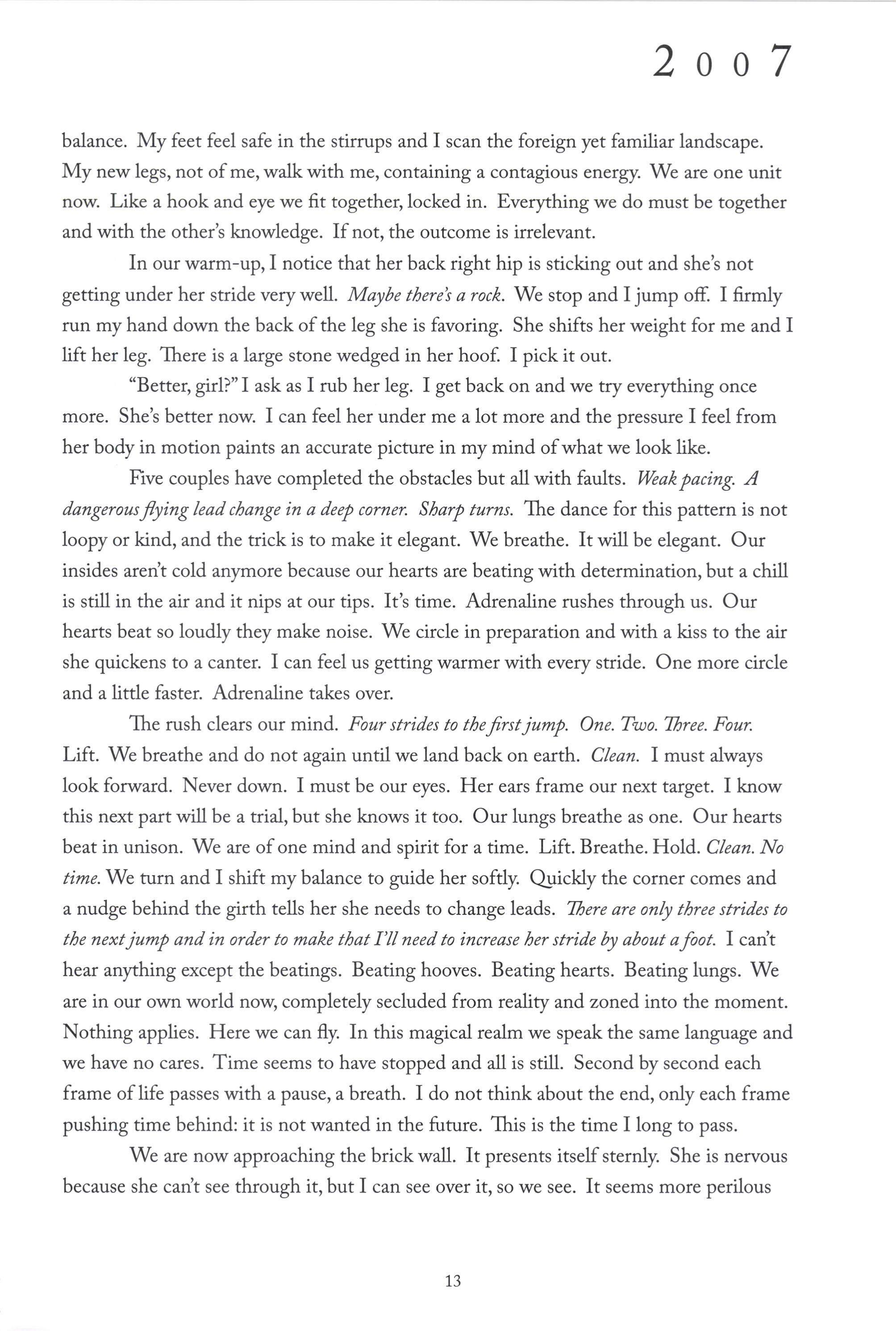
2 o o 7
13
than any other jump and my heart skips. Ob no! She heard it. Her breathing is not with mine anymore. I scared her. I take a deep breath and beg for her forgiveness in silence. We have three strides for her to forgive ma One. I m sorry. I didnl mean it. Ttao. She takes a deep breath and I know we are well again. I almost smrle. 1hree. Lift. We seem to be in the air for minutes. I can tell we were much higher than we needed to be to clear the jump. I thinkwe smile together for that moment. "KOOSH."
As time flies by, so do we. A melodic tune is composed as we imprint our tracks in the sand. Music in our heads plays in tandem, and we weave together like the notes on a staff. We dance for the judge and as we near the end I feel his eyes on us. This pressure of eyes is born of a bright and awed face. We breathe. Clean. The triplets end the pattern and we circle three times to cool down. Each circle brings back more and more mundane and unwelcome noise. Our breathing detaches and we are separated by cheers and clapping that bashes into my ears and clatters sharply against the peace that once was there. It is done.
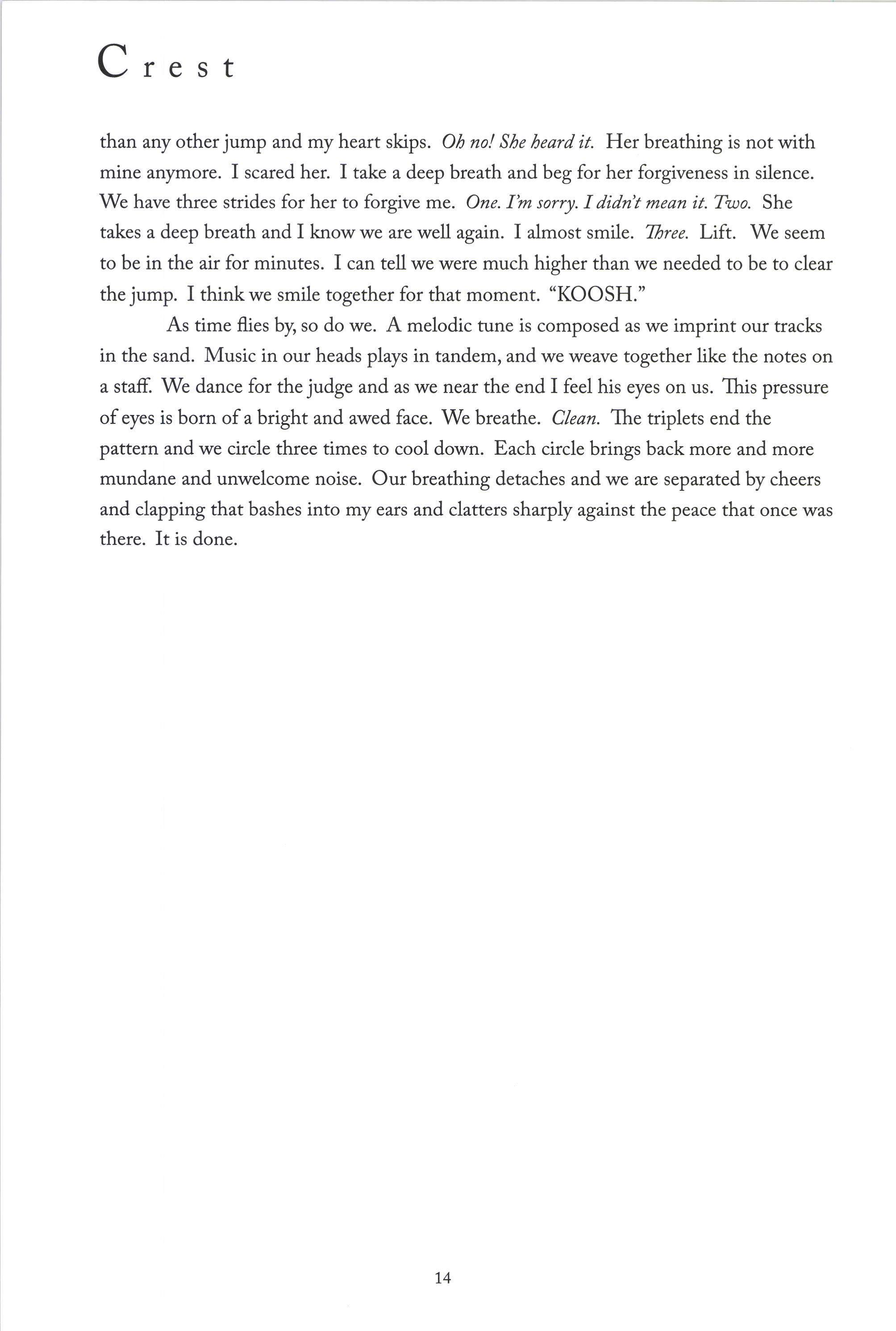
C rest
t4
Stir With Syringes
Deja Taylor
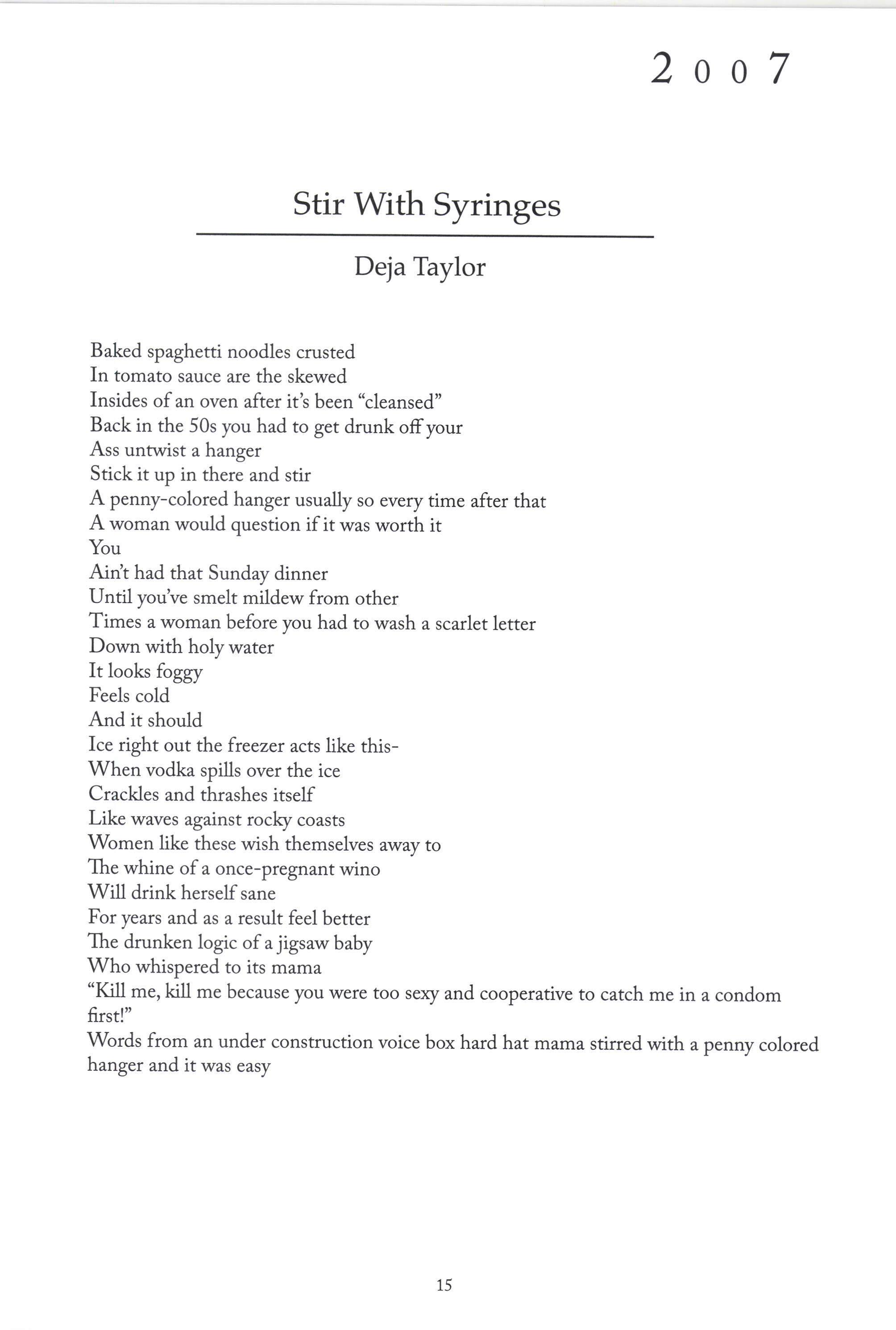
Baked spaghetti noodles crusted
In tomato sauce are the skewed Insides of an oven after it's been "cleansed" Back in the 50s you had to get drunk offyour Ass untwist a hanger Stick it up in there and stir
A penny-colored hanger usually so every time after that A woman would question if it was worth it You
Aint had that Sunday dinner
Until you've smelt mildew from other Times a woman before you had to wash a scarlet letter Down with holywater
It looks foggy Feels cold
And it should Ice right out the freezer acts like thisWhen vodka spills over the ice Crackles and thrashes itself
Like waves against rocky coasts Women like these wish themselves away to The whine of a once-pregnant wino Will drink herself sane
For years and as a result feel better The drunken logic of a jigsawbaby Who whispered to its mama "Kill me, kill me because you were too sexy and cooperative to catch me in a condom fust!"
Words from an under construction voice box hard hat mama stirred with a penny colored hanger and it was easy
2 o o 7
15
Ignore It
Madeline Roberts
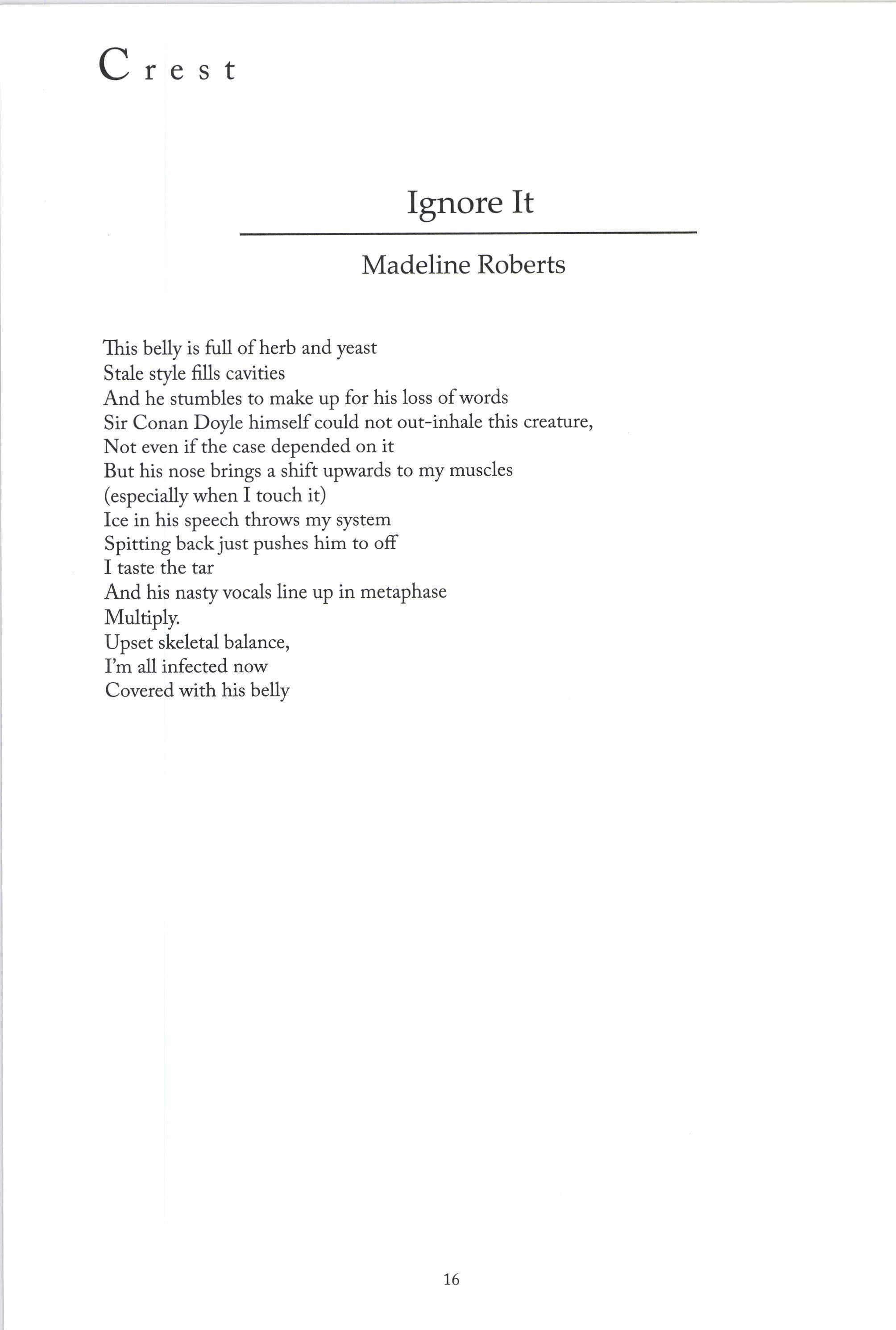
This belly is fuIl of herb and yeast
Stale style fills cavities
And he stumbles to make up for his loss ofwords Sir Conan Doyl" himself could not out-inhale this creature, Not even if the case depended on it But his nose brings a shift upwards to my muscles (especially when I touch it)
Ice in his speech throrvs my system Spitting back just pushes him to off I taste the tar
And his nasty vocals line up in metaphase Multiply.
Upset skeletal balance, I'm all infected now Covered with his belly
C rest
76
Introduction to Natural Chaos and Unification
Steven Ren
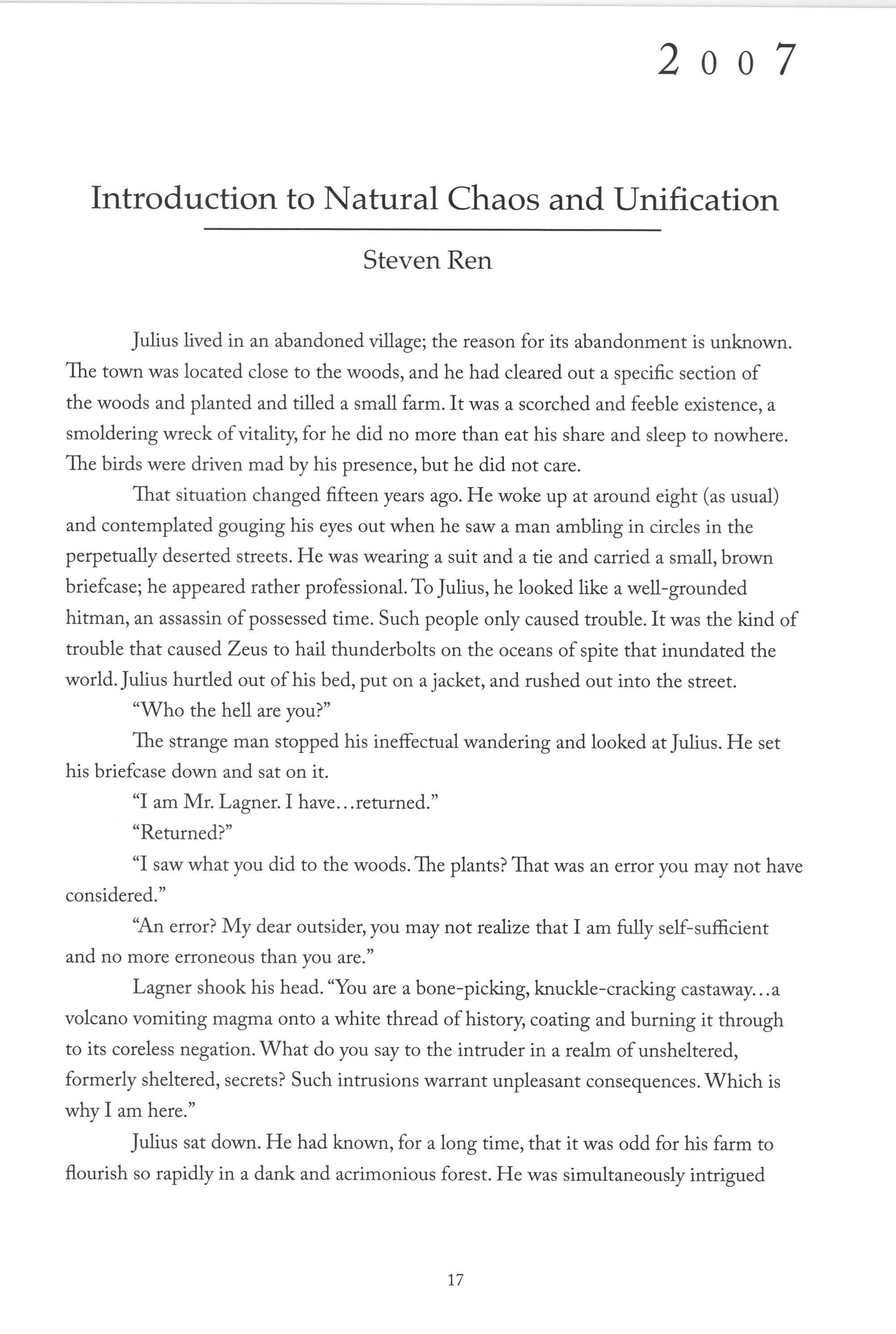
Julius lived in an abandoned village; the reason for its abandonment is unknown. The town was located close to the woods, and he had cleared out a specific section of the woods and planted and tilled a small farm. It was a scorched and feeble existence, a smoldering wreck of vitaliry for he did no more than eat his share and sleep to nowhere. The birds were driven mad by his presence, but he did not care.
That situation changed fifteen years ago. He woke up at around eight (as usual) and contemplated gouging his eyes out when he saw a man ambling in circles in the perpetually deserted streets. He was wearing a suit and a tie and carried a small, brown briefcase; he appeared rather professional. To Julius, he looked like a well-grounded hitman, an assassin of possessed time. Such people only caused trouble. It was the kind of trouble that caused Zens to hail thunderbolts on the oceans of spite that inundated the world.Julius hurtled out of his bed, put on a jacket, and rushed out into the street.
"Who the hell are you?"
The strange man stopped his ineffectual wandering and looked atJulius. He set his briefcase down and sat on it.
"I am Mr. Lagner.I have...returned."
"Returned?"
"I saw what you did to the woods. The plants? That was an error you may not have considered."
'An error? My dear outsider, you may not realize that I am fully self-sufficient and no more erroneous than you are."
Lagner shook his head. "You are a bone-picking, knuckle-cracking castar ray...a volcano vomiting magma onto a white thread of history coating and burning it through to its coreless negation. What do you say to the intruder in a realm of unsheltered, formedy sheltered, secrets? Such intrusions warrant unpleasant consequences. Which is why I am here."
Julius sat down. He had known, for a long time, that it was odd for his farm to fourish so rapidly in a dank and acrimonious forest. He was simultaneously intrigued
2 o o 7
17
and frightened of a man as alien and as uninvited as the black death. He stared ahead and muttered, "I know not what you speak of."
Lagner stood up unexpectedly and said, "I will return tomorrow then. I want you to clear your land out. Do this, and you may understand."
'And if I dorit?"
Lagner gave a sly grimace. "You may never find out if you dont.Just another victim, right?"
That very evening,Julius charged into his farm with a shovel and demolished the only evidence of his existence. It wouldnt matter anryay,he thought. I'm just another spectre in this town...just another victim, as he might say.
Lagner returned early next morning and found the area destroyed. He smiled to himself as he sawJulius approaching. Lagner set his briefcase down and unlocked it, but left it shut. He looked around him at the forest. The trees were marvelous. Nature's incredible eminence never ceased to amaze him. How did such inconsequential objects explode out of previously dirty dirt? Why did things just grow? And who bothered to contemplate their glory anyway? It was all just decay, useless life.
Julius walked toward Lagner and looked at his farm.It was a mound of dirt and ruined crop. His mind's eye sobbed silently as he thought about this white thread of history his unclaimed past.It was as if he had entered a gun shop and purchased the most powerfirl gun in the shop, only to forget why he needed a gun anyway. And to speak of guns...
Lagner flipped open his briefcase and pulled out the pistol. It was a tubular mechanism of unfaithfirl destruction that tore holes into the warring nature of mankind and startled countless horses down at the track. Julius saw the weapon and stopped right before his farm.
"What?"
"Just another victim."
The gunshot rang and the opera ended. Each man took his bow, exited, and removed his fagade.Julius felt his face tear apart, and fell into the dirt. Lagner felt his hand shaking. Each man felt the forest quaking with feverish anger and hapless excitement.
'Just another victim. May you supply the forest with its fertility...forever."

C rest
18
Meet Me
]oanna Evans
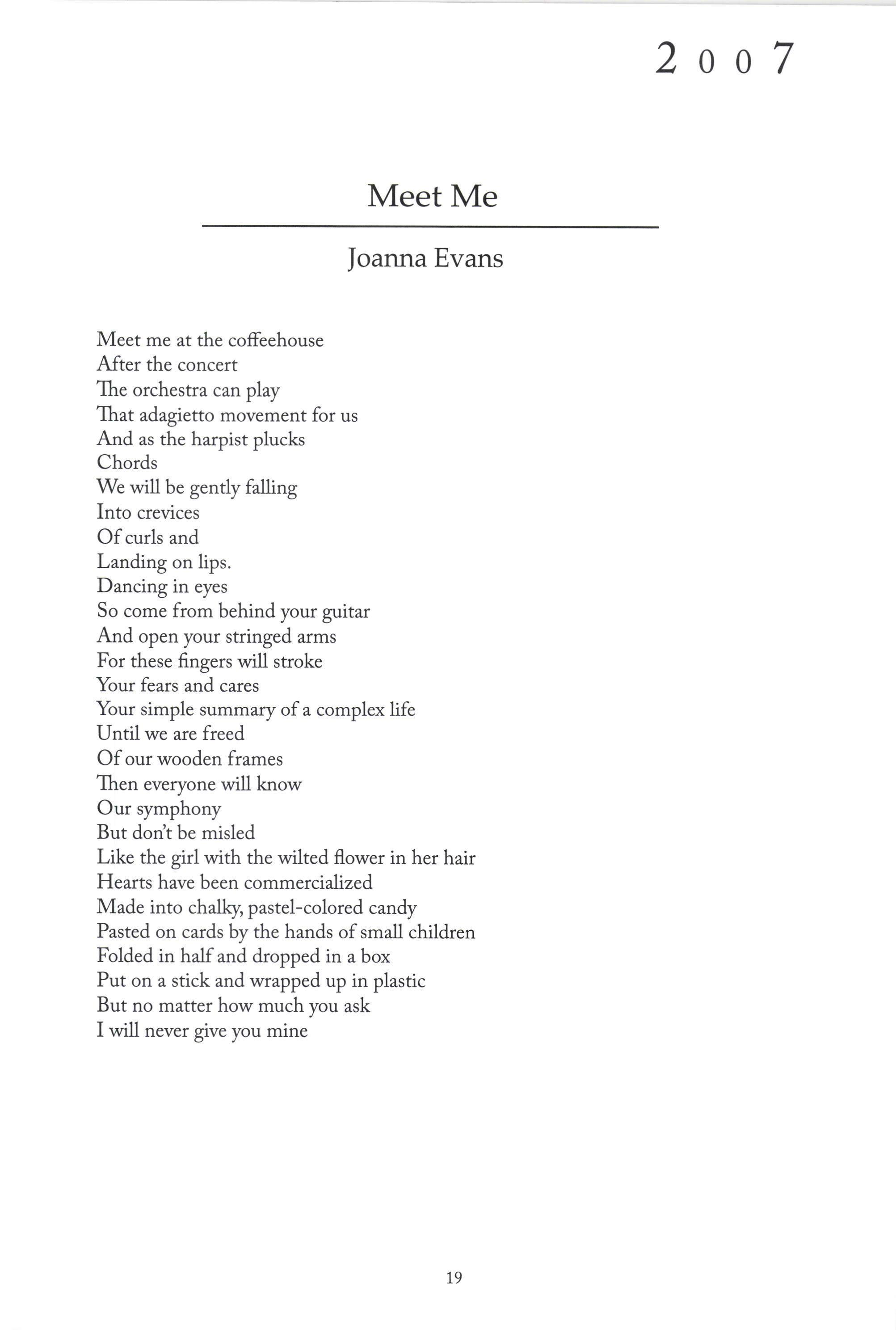
Meet me at the coffeehouse
After the concert
The orchestra can play That adagietto movement for us And as the harpist plucks Chords
We will be gendy falling Into crevices Of curls and Landing on lips. Dancing in eyes So come from behind your guitar And open your stringed arms For these fingers will stroke Your fears and cares Your simple summary of a complex life Until we are freed Of our wooden frames Then everyone will know Our symphony But dont be misled
Like the girl with the wilted flower in her hair
Hearts have been commercialized Made into chalky, pastel-colored candy
Pasted on cards by the hands of small children Folded in half and dropped in a box
Put on a stick and wrapped up in plastic But no matter how much you ask I will never give you mine
2 o o 7
t9
Cadillac
Samantha Stevens
Owning a Cadillac is like wearing a neon sign above your head that says'COOL.' White, black, red, or pink, with bucket seats or leather interior, when you drive a Cadillac every scumbag on the road knows you mean business. When you park it outside of your house, people know you're important, self-made. Those born rich dorit buy Caddies. It's the blue collared, under the rug, Godfather adoring,law breaking that buy Caddies. And my brother just happened to be the Don Juan of the Cadillac owning variety.
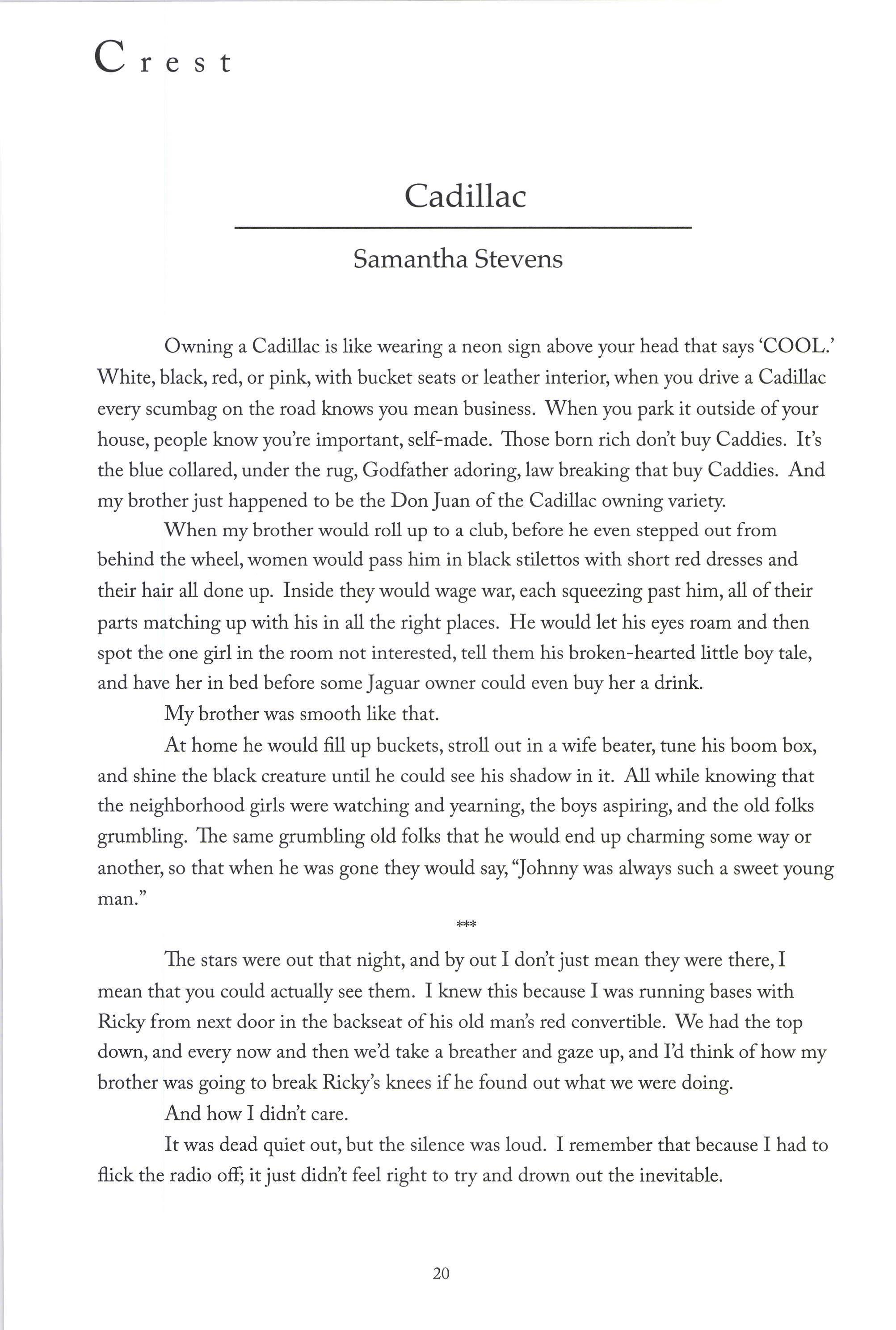
When my brother would ro11 up to a club, before he even stepped out from behind the wheel, women would pass him in black stilettos with short red dresses and their hair all done up. Inside they would wage war, each squeezing past him, all of their parts matching up with his in all the right places. He would let his eyes roam and then spot the one girl in the room not interested, tell them his broken-hearted little boy tale, and have her in bed before some Jaguar owner could even buy her a drink.
My brother was smooth like that.
At home he would fillup buckets, stroll out in a wife beater, tune his boom box, and shine the black creature until he could see his shadow in it. All while knowing that the neighborhood girls were watching and yearning, the boys aspiring, and the old folks grumbling. The same grumbling old folks that he would end up charming some \,'ray or another, so that when he was gone they would say,'Johnny was always such a sweet young man."
The stars were out that night, and by out I dont just mean they were there,I mean that you could actually see them. I knew this because I was running bases with Ri.lry from next door in the backseat of his old man's red convertible. We had the top down, and every now and then we'd take a breather and gaze up, and I d think of how my brother was going to break Riclcy's knees if he found out what we were doing.
And how I didnt care.
It was dead quiet out, but the silence was loud. I remember that because I had to flick the radio off; it just didnt feel right to try and drown out the inevitable.
C rest
20
Johnny was out for the night; he was always out at night. He would make sure I had plans with a lot of girls, kiss my cheek, hop in his car, and then speed off. And then I would change from long to short and baggy to tight. We had a routine going, and it never went wrong. So I never thought much about it.
I knewJohnny had a habit of stirring up trouble, being witness to his temper, but he never got caught or anything like that. Back when he was a youngster he did some time, but it was nothing much. It seemed like three years on the inside was the sentence a lot of fatherless teenagers got back then. He went a fulI ten years without getting booked again.

Johnny rode in his Caddy that night, sleek with black leather interior and tinted windows to protect his already shaded eyes. His suit was pressed, his hair short and perfect, speakers from the trunk pumping beats through his veins, and a loaded gun sitting in the glove compartment.
The bars werebuzzing from what his crew told me, the women were intense and the booze was in large quantities. I begged to know what was different, but nobody knew. They say it was bound to happen sooner or later,Johnny spending more time with Sal and all, but it didnt have a thing to do with Sal. AX that night had to do with was Johnny. There's a diner down on North Street, open all night and greasier than Riclry's hair was. If I ever needed anything,I knew I could walk down there and my brother would come to my rescue. Everyone in the neighborhood knew they could count on Johnny.
Only,I was too busy macking on Ricky to think about visiting my drunk and angry brother. In the diner his voice was escalating and some guy was egging him on. The girls he met feigned worry but enjoyed the show. His backup were all at home, tryi"g to get some from their girlfriends and kissing their children goodnight. Johnny's face was turning red and his veins were popping through, while the other man's insides were drenched with alcohol and failing to rcahze the grave he was digging.
My brother finally had enough, the silence engffing him until he no longer had a conscience. His black baby was parked delicately, for even a drunk man at the wheel of the ninth wonder of the world knows how to treat something so important.
He took the passenger handle and in a swift motion a loaded gun was in his hand, waving around. Ricky was unsuccessfully tryrng to unhook my bra with one hand. As my brother waved a loaded pistol around in the parking lot of a diner worth less than his precious Caddy,I was thinking about Riclcy and his wandering hands.
An off-duty cop's eyes shot up as Johnny stumbled into the diner, his hand going
2oo7
21.
to his radio. The drunken man looked up and laughed at the situation, a delayed response to a young man out for misplaced vengeance.
"You think this is a joke?"he asked.
Two cop cars pulled up to the joint, and doors were heard slamming. Ricky's hand was in my hair. My brother spun around and stalked outside.
"You think this is a--" his arms spread wide, his death in his right hand weighing it down. A rain of bullets struck him, the first penetrating his heart. His e)res went wide, his mouth open. I bit Ricky's lip. Johnny's arms were like wings attempting to fy,before the gun dropped and his arms fell limp at his sides, his knees hitting the pavement. The bullet lodged in his head, caused blood to drip down his face, tears to his shirt. His body thudded on the ground, blood spurting onto the rims of his happiness.
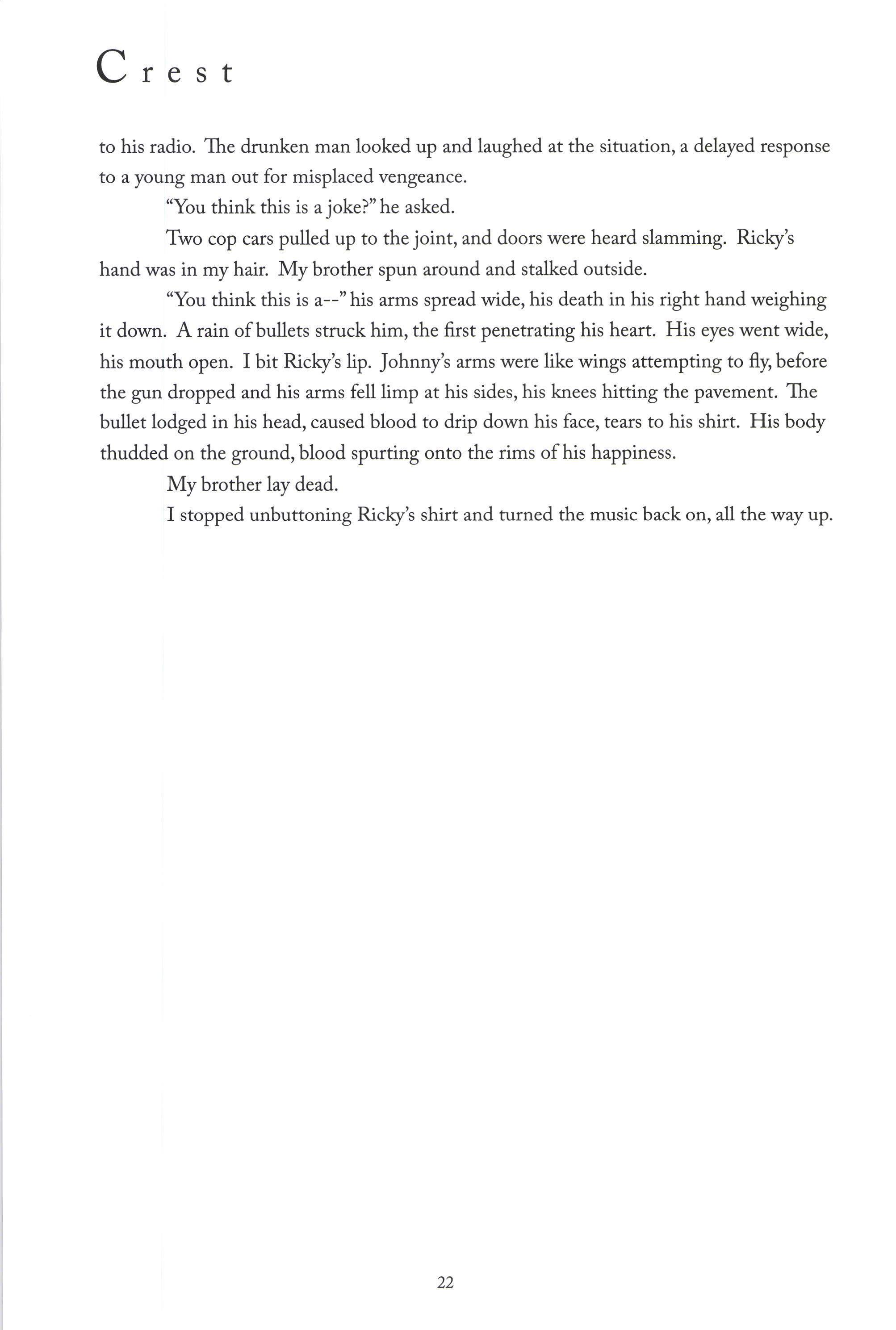
My brother lay dead.
I stopped unbuttoning Ricky's shirt and turned the music back on, all the way up.
C rest
22
Her Voice
Conar Gillard
Her voice stepped its way through the radio speakers, hangrng in the air like a spider on silk, floating gracefi.rlly through the walls rhythmically reverberating against red wdls and the dapper dishes laid on the terrycloth tables, smooth as a chocolate covered cherry, unlike the vocals of the shrimpy bulls that busde around the basement of punk rockers' pasts, the sobbing gurtars not clanging nor screaming, but glidi"g about to the beat of S$rth an innovative build of an elderly tune.The sad song slid happily down the throat of my imagination, striking a nerye within my musical core, immersed in the flow like fingers it a ivetlazzjams just so.
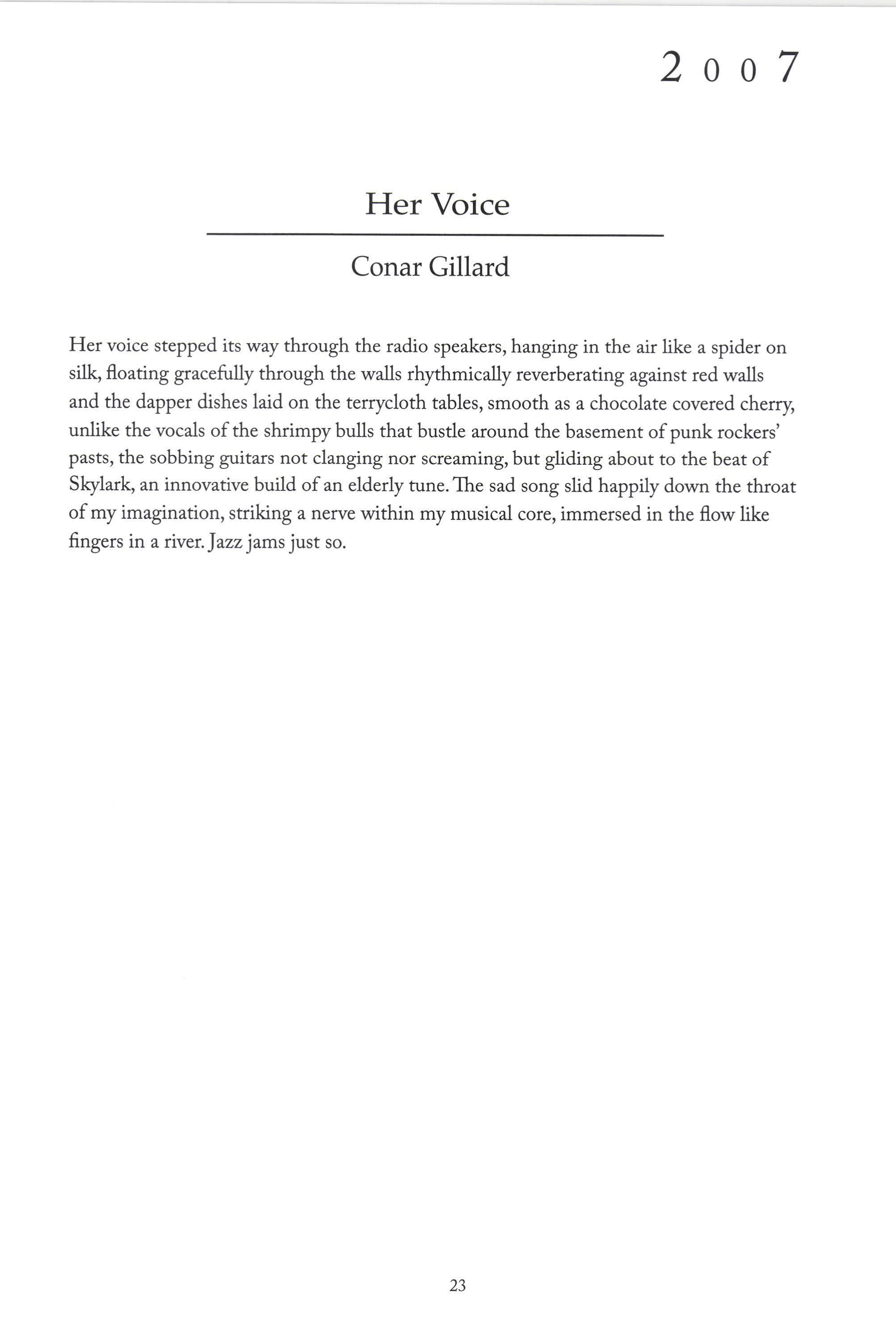
2 o o 7
23
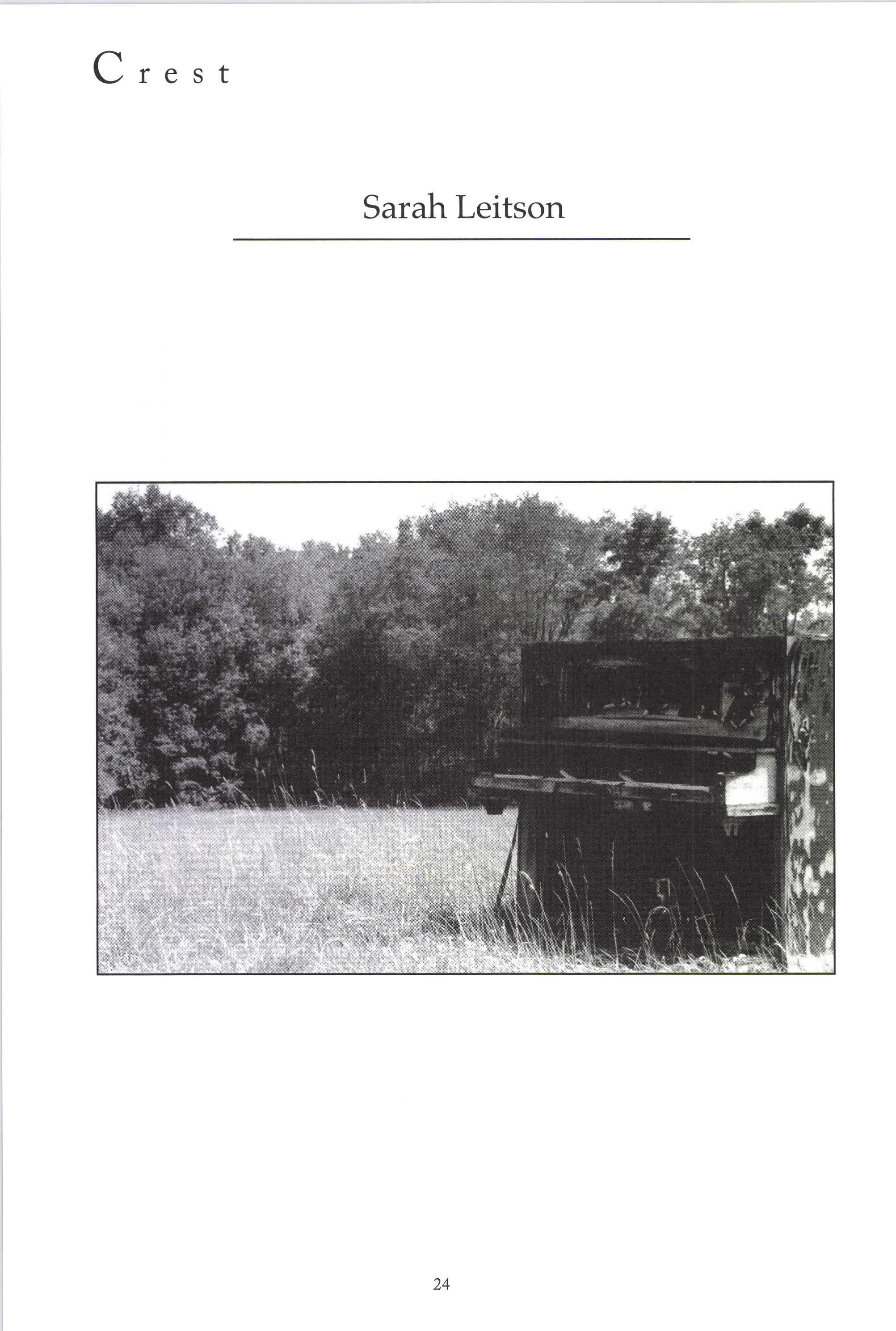
C rest
24
Sarah Leitson
Ellen Drews
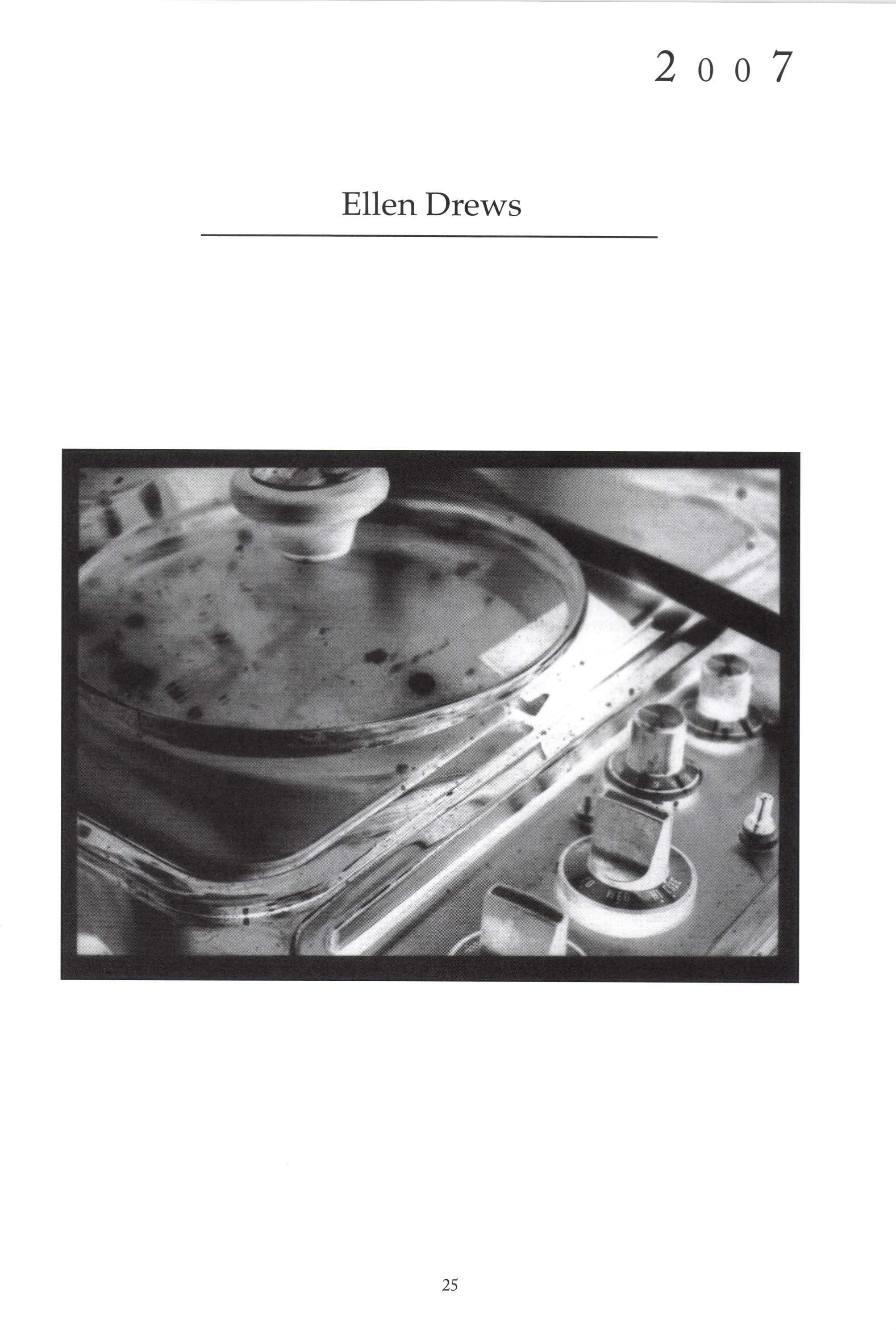
2 o o 7
25
Binary Sunrise
Mike Watkins
Sitting in a coffee shop on a busy corner, he stared into his drink, watching the last of the milk swirl and blend in. He closed his eyes, head resting on his hands.The government mandated stimulant warning stood stark on the side of the tan cup. It was morning, but late enough that he was one of the last lingering customers. He headed for the door and drained his coffee.
John braced against the cold and headed to his apartment. He shoved open the two successive heavy doors in the lobby and walked up the two flights of stairs. Black, bundled cabling ran tfuough a hole in the drywall above the doorframe's chipping paint. Inside, the assortment of fiber and copper ran along the ceiling to the back room, where his computer terminals were splayed out on tables against one wall.The apartment was sparse, save for the wreck of expensive electronics, a bed, which consisted of a mattress and sheets on the foor, and a refrigerator. He didrit need anything else. Everything he did was within the computers and the hard-to-come-by-without-connections cabling. John lived within the virtusphere, he was one of a growing number of converts living entirely virtual, one of the ones who stood to gain much more there than in the physical world. John was hopeless in the real world. He couldnt look people the eye and no one took him seriously in person. He hadnt planned what became of him, and he had taken the path as his only viable option.
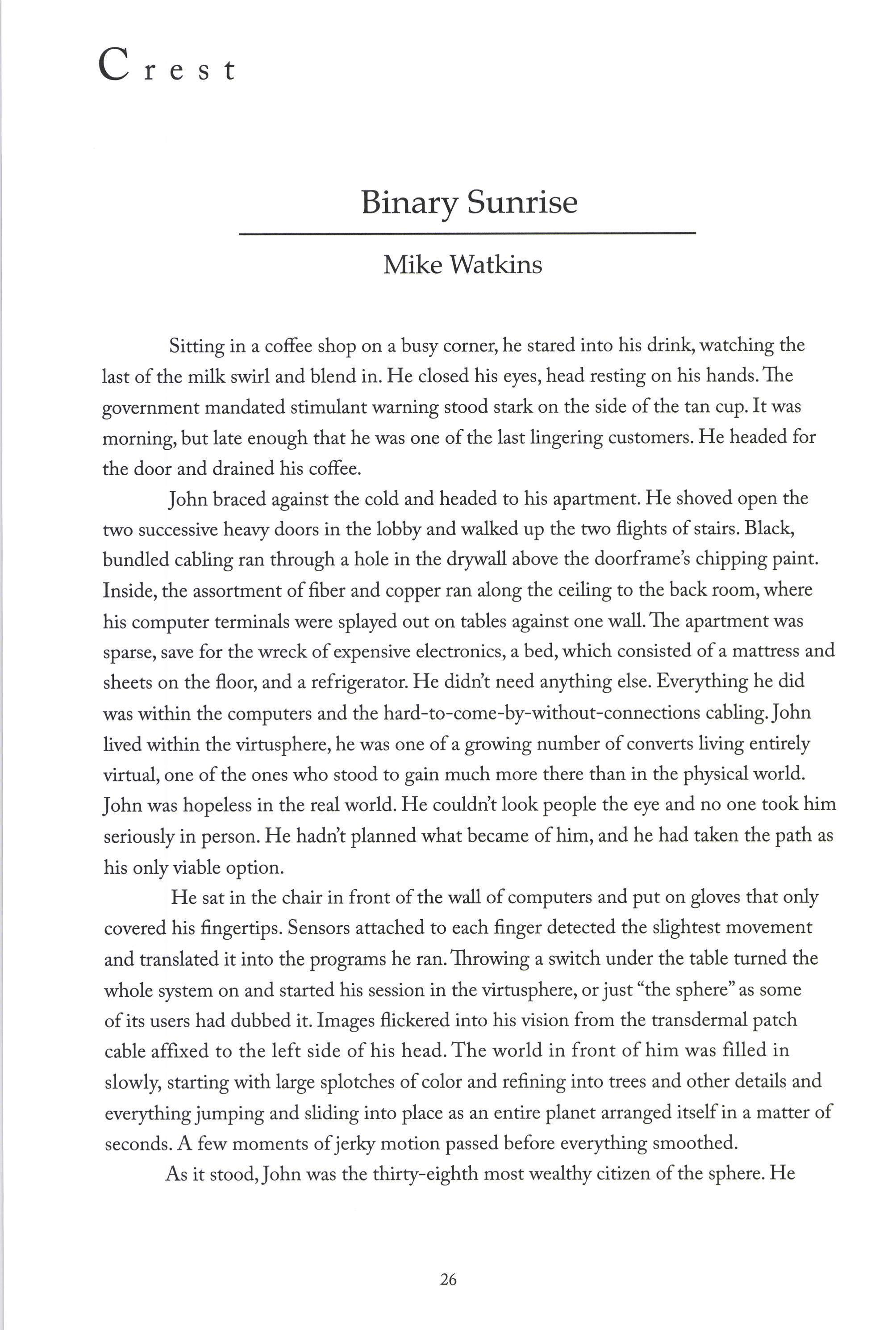
He sat in the chair in front of the wall of computers and put on gloves that only covered his fingertips. Sensors attached to each finger detected the slightest movement and translated it into the programs he ran. Throwing a switch under the table turned the whole system on and started his session in the virtusphere, or just "the sphere" as some of its users had dubbed it.Images flickered into his vision from the transdermal patch cable affixed to the left side of his head. The world in front of him was filled in slowly, starting with large splotches of color and refining into trees and other details and everything jumping and sliding into place as an entire planet arranged itself in a matter of seconds. A few moments ofjerky motion passed before everything smoothed.
As it stood,John was the thirty-eighth most wealthy citizen of the sphere. He
C rest
26
hadnt bothered to size himself up to the rest of the planet, and he never would. He bought, he sold, he traded and bartered. He dealt with everyone and anyone if they had the money. Him and his former colleagues had alt moved to entirely virtual business, though. Some still worked for the same company, but never set foot in the actual building.
When he woke up, his terminal had shut down. Or rather, he woke up because his terminal shut down, as he hadrit noticed anything was wrong until the sofnarare had recognized his inactivity as sleep and logged out.John looked at his watch and rubbed his eyes. He slid his coffee towards him and checked for precious dregs. A11 he found was dry caked residue. Trying to access the sphere again,he was denied twice. He checked for activity and found nothing, switching his attention to the row of leds at the end of the table tying to discern something from them, but he didnt know what.
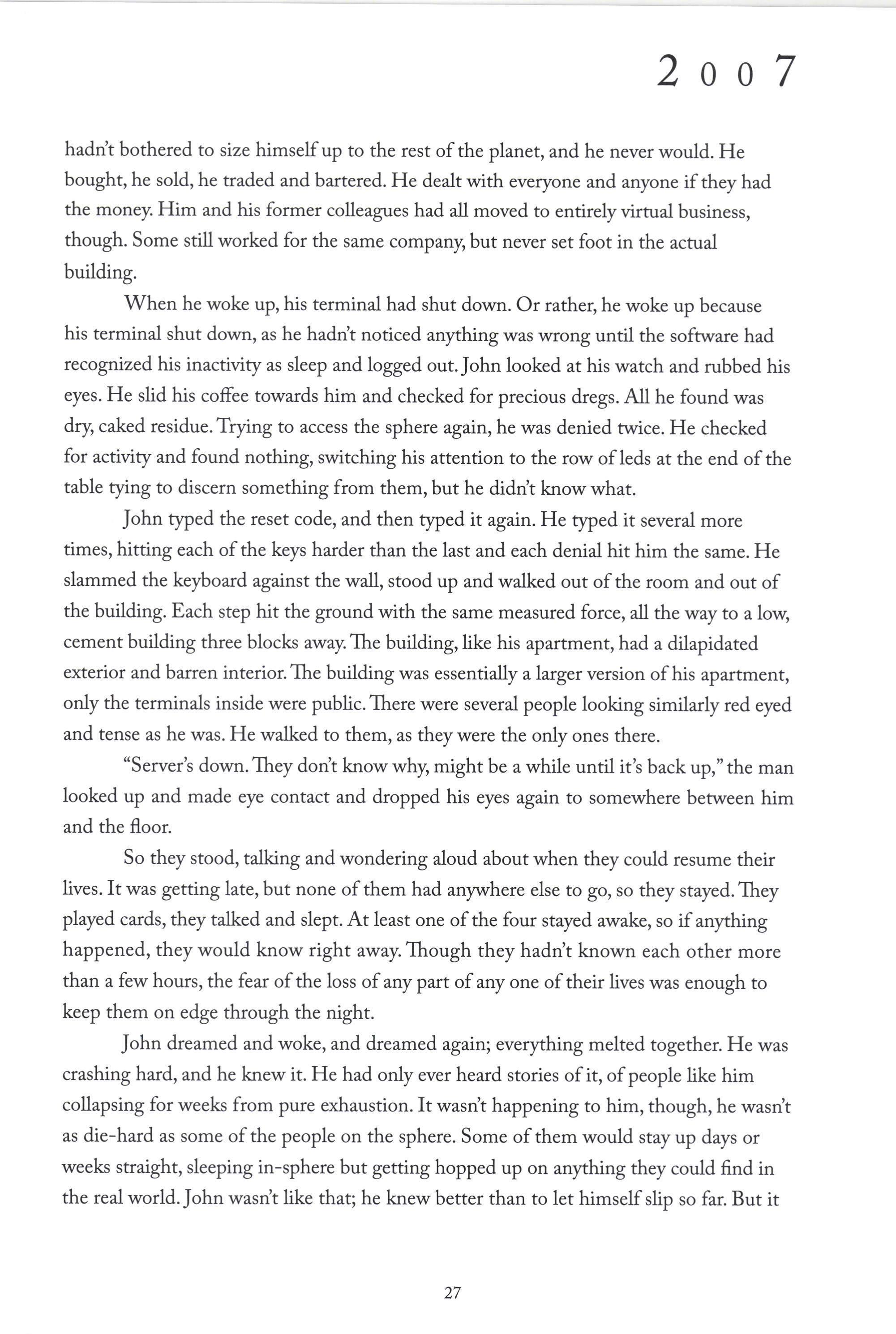
John typed the reset code, and then typed it again. He typed it several more times, hitting each of the keys harder than the last and each denial hit him the same. He slammed the keyboard against the wall, stood up and walked out of the room and out of the building. Each step hit the ground with the same measured force, all the way to a low, cement building three blocks away.The building,like his apartment, had a dilapidated exterior and barren interior. The building was essentially a larger version of his apartment, only the terminals inside were public. There were several people looking similarly red eyed and tense as he was. He walked to them, as they were the only ones there.
"Server's down. They dont know why, might be a while until it's back up," the man looked up and made eye contact and dropped his eyes again to somewhere betrareen him and the floor.
So they stood, talking and wondering aloud about when they could resume their lives. It was getting late, but none of them had anywhere else to go, so they stayed. They played cards, they talked and slept. At least one of the four stayed awake, so if anything happened, they would know right away. Though they hadnt known each other more than a few hours, the fear of the loss of any part of any one of their fives was enough to keep them on edge through the night.
John dreamed and woke, and dreamed again; everything melted together. He was crashing hard, and he knew it. He had only ever heard stories of it, of people like him collapsing for weeks from pure exhaustion. It wasnt happening to him, though, he wasnt as die-hard as some of the people on the sphere. Some of them would stay up days or weeks straight, sleeping in-sphere but getting hopped up on anything they could find in the real world.John wasnt like that; he knew better than to let himself slip so far. But it
2 o o 7
27
wasn't hard to fall. It wasrit rare, either.
He was woken by a jostle, and when he opened his eyes, a nod. He stood upright and walked straight to the back corner where he began the ritual of starting the programs. As soon as he was ready, it was. He checked everything to make sure nothing had been lost; it hadnt.John walked to a hill near where he had been placed in-sphere and looked out across the gray. The machine hesitated as it digested the data is was being force fed. He stood motionless, watching the glowing pink along the horizon. Standing perfecdy still, his virtual breaths hung in the cool morning air in perfecdy rendered real-fi. The pink glow grew and morphed into hundreds ofshades oforange, yellow and red and crescendoed with a faint hint of blue above him.
For the first time in ayezr,he couldnt stand the thought of starting a session. He unhooked and shut down the terminal and walked outside. He had to move and limber up after the last night and shake out his sore limbs.John looked down the street and saw pale blue streaked with wispy orange clouds. He paused and looked through the crisscrossing of overhead wires at the disappearing and morphing gray. He glanced again before turning the corner. It wasn't half as beautifirl as the one he had already seen.
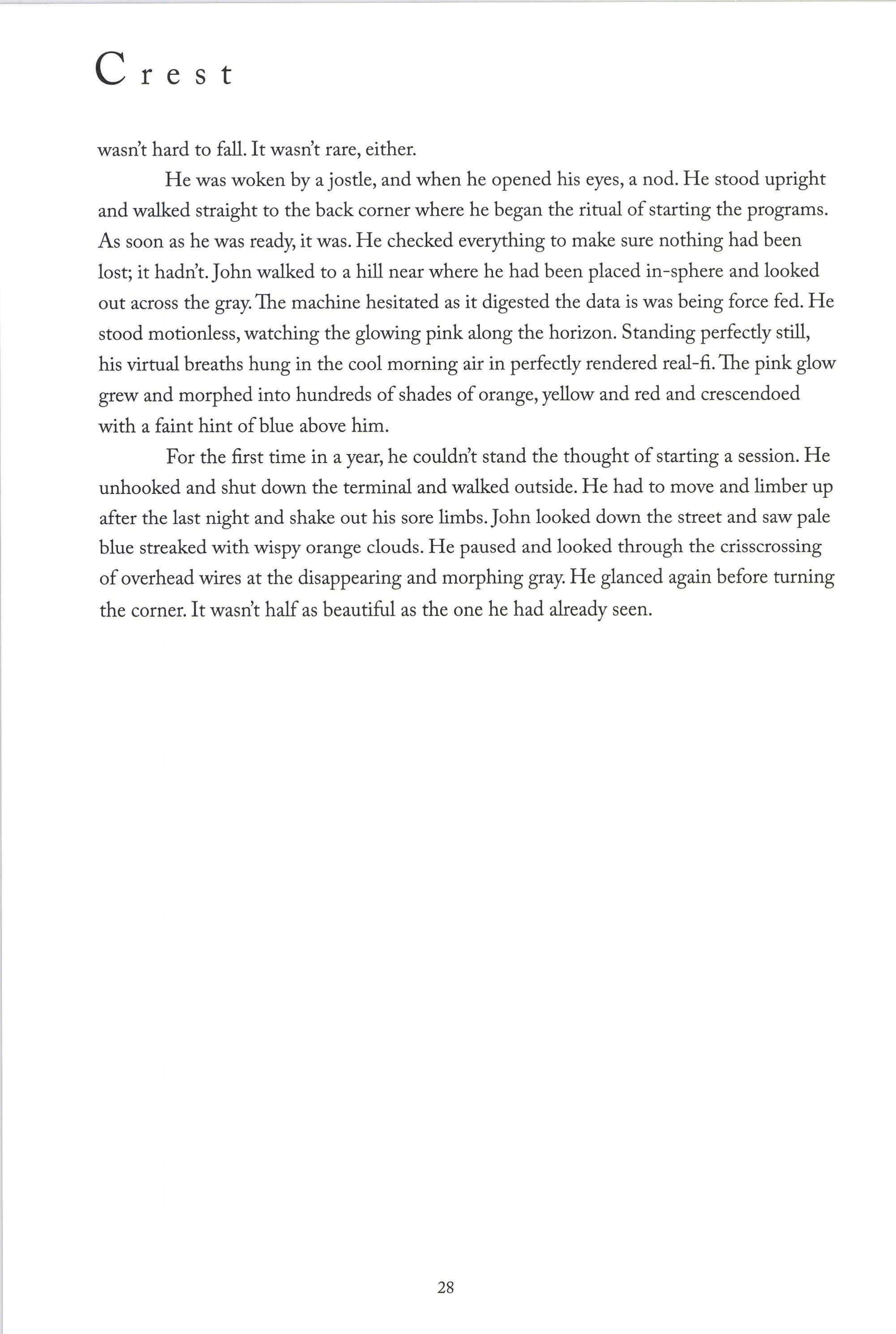
C rest
28
A Letter to Dr. Seuss
Ariana Tuckey

Oh the places you'll go All the things that you'll see But as you go all around Go without me.
You think you're so clever With your litde rhyme schemes But did you have to shatter Mylitde kid dreams?
The Butter Batde Book Was the first book I read Did you laugh over dinner For putting war in my head?
Then there was the Sneech With the star on his belly Thanks to you I learned race. You're worse than the telly.
But for all of your teachings There is one thing you missed For you never taught That ignorance is bliss.
2oo7
29
Home Street
Jeff Kirshman
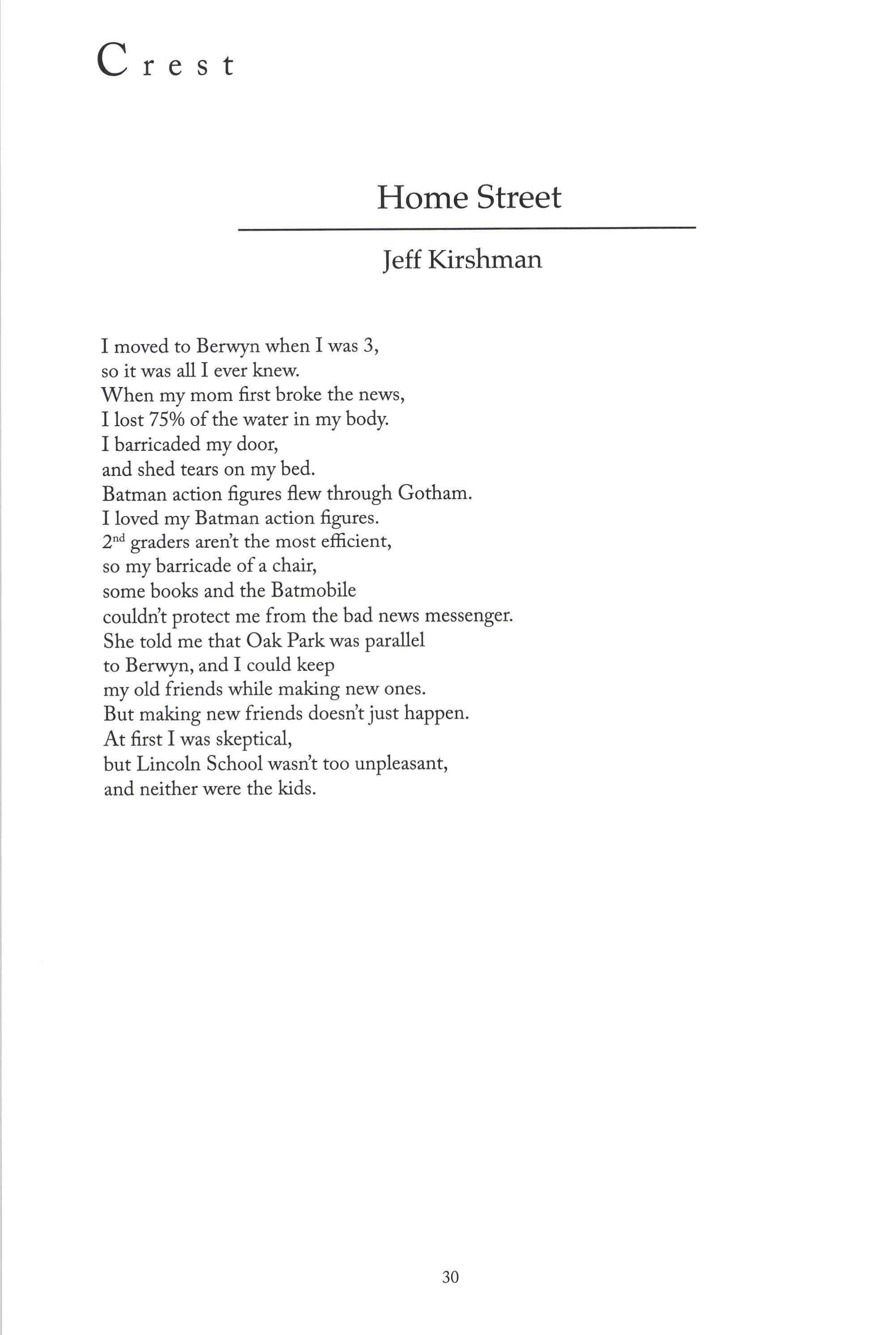
I moved to Berwyn when I was 3, so it was all I ever knew.
When my mom first broke the news, IlostTlo/o of the water in my body. I barricaded my door, and shed tears on my bed.
Batman action figures few through Gotham. I loved my Batman action figures. 2"d graders arent the most efHcient, so my barricade of a chair, some books and the Batmobile couldrt't protect me from the bad news messenger.
She told me that Oak Park was parallel to Berwyn, and I could keep my old friends while making new ones. But making new friends doesnt just happen.
At first I was skeptical, but Lincoln School wasnt too unpleasant, and neither were the kids.
C rest
30
Not Nostalgic
Luke Knanishu

As the celestial girls and cigar toting boys split ways I saw him. Only after he saw me.
But this was a changed him. He traded in vibrant blue eyes for shady grey ones. And a sense of home for white padded walls and lights out hours. While a sly smile and strong features were once his trademark - now neryous hands and a makeshift beard gave him a name.
He let arm rail train tracks rush false elation to the bloodstream. And dirty spoons take him on three minute trips beyond the stars.
He hid it well but I saw the premature toe tag through his muddy black shoes. A loose hug and strung out words made sure old connections were dead and buried. Like he soon would be.
And I actually believe him when he says he'lI be okay.
2 o o 7
31
Push
Colleen Cox

I push you pull
The moment I snap back, A mouse trap easily set off The air around us ignites
The fame fares and I'm the lighter
Fully loaded with an artillery of fluid Just purchased from the convenience store Only a few steps down the concrete, across the gravel and between Yellow lines
That lie on the asphalt like fluorescent strokes of a higtrlighter A few dollars well-spent,I should hope
But what are you Nothing more than the orygen Engulfing the flames that I've kindled Sparking the scorching conflagration It licks the ground like a cat's rough tongue Searching for a bustling boulevard beyond Down the drive of devastation
There are no boundaries, not even the ends of the wodd No gate to stop it From hurting, causing pain, cauterizing The people who stop and stare At that wild libertine
C rest
32
Andy Heriaud
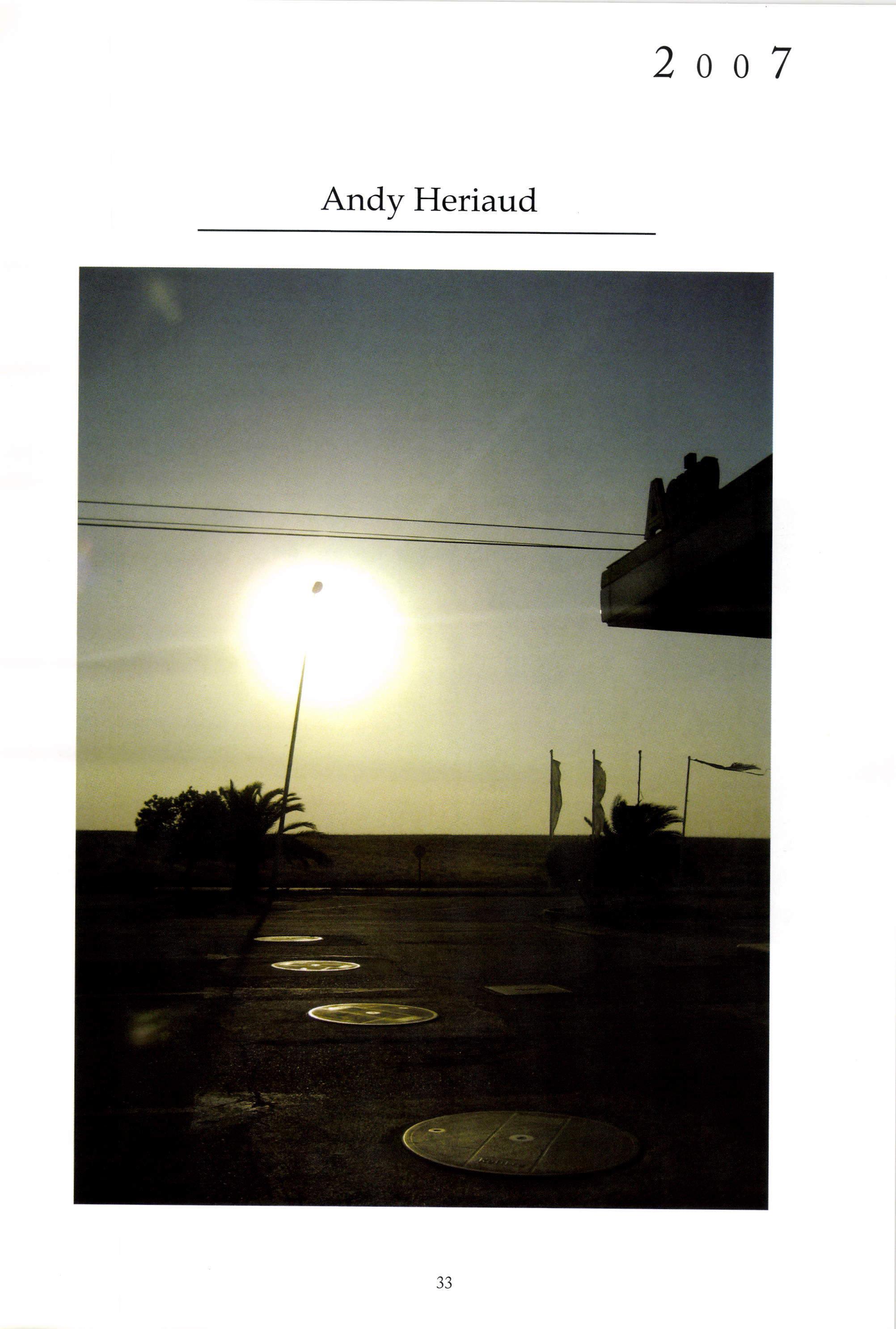
2 o o 7
-). )
Murawski
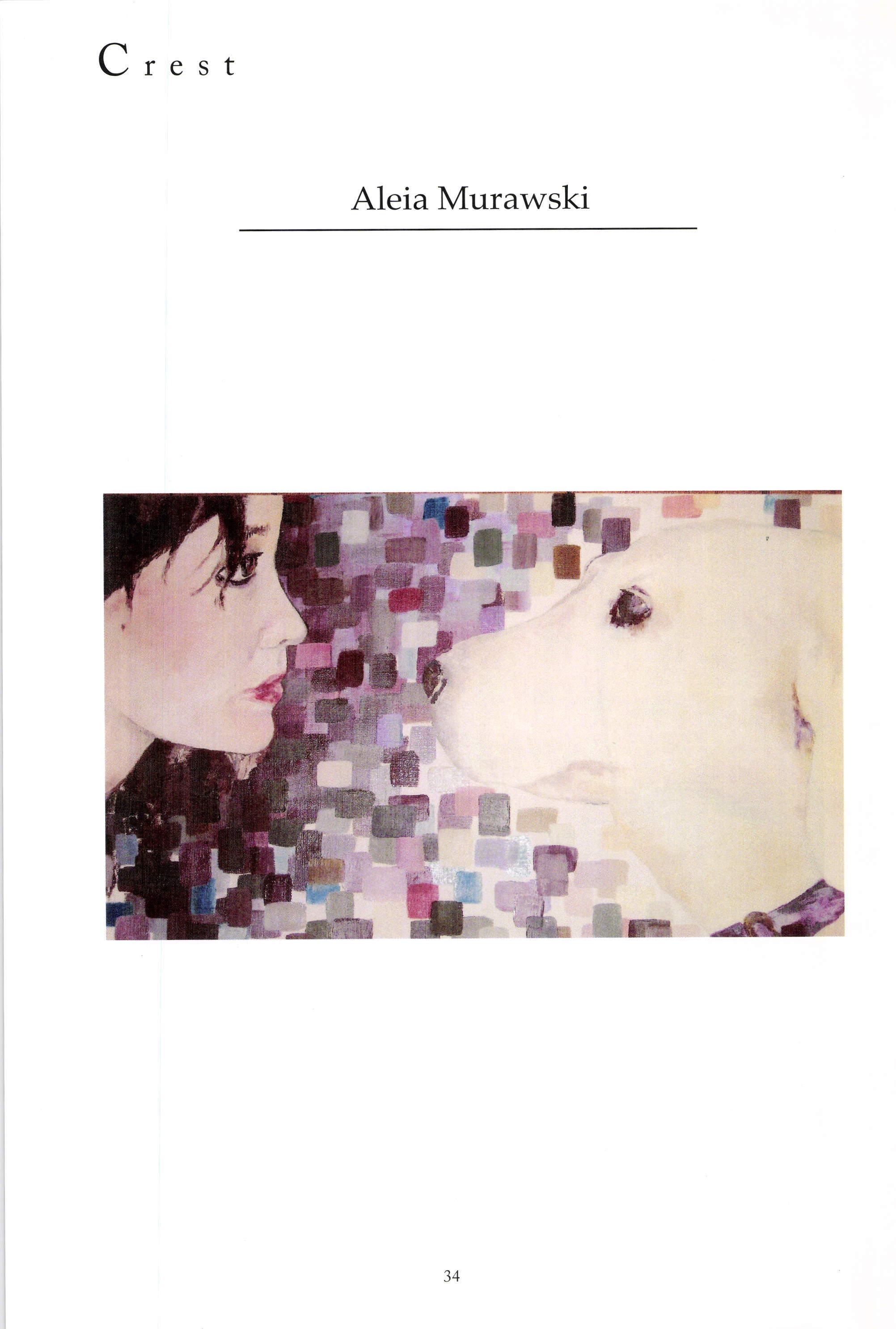
C rest
-"@ .s. 34
Aleia
r s ,fl'!* 'd*, Iffi
Natalya Carrico
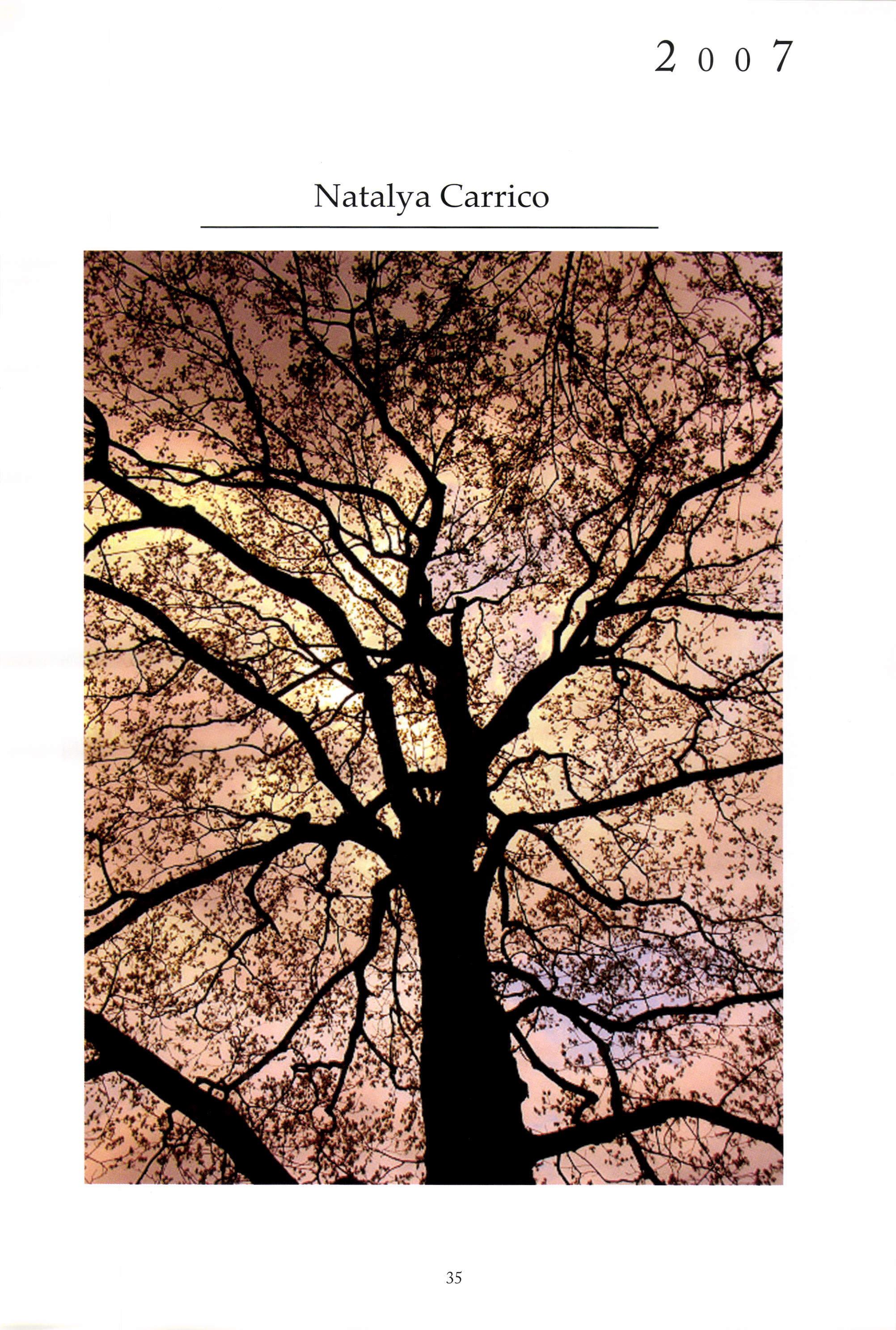
2 o o 7
35
]oel Meyerson
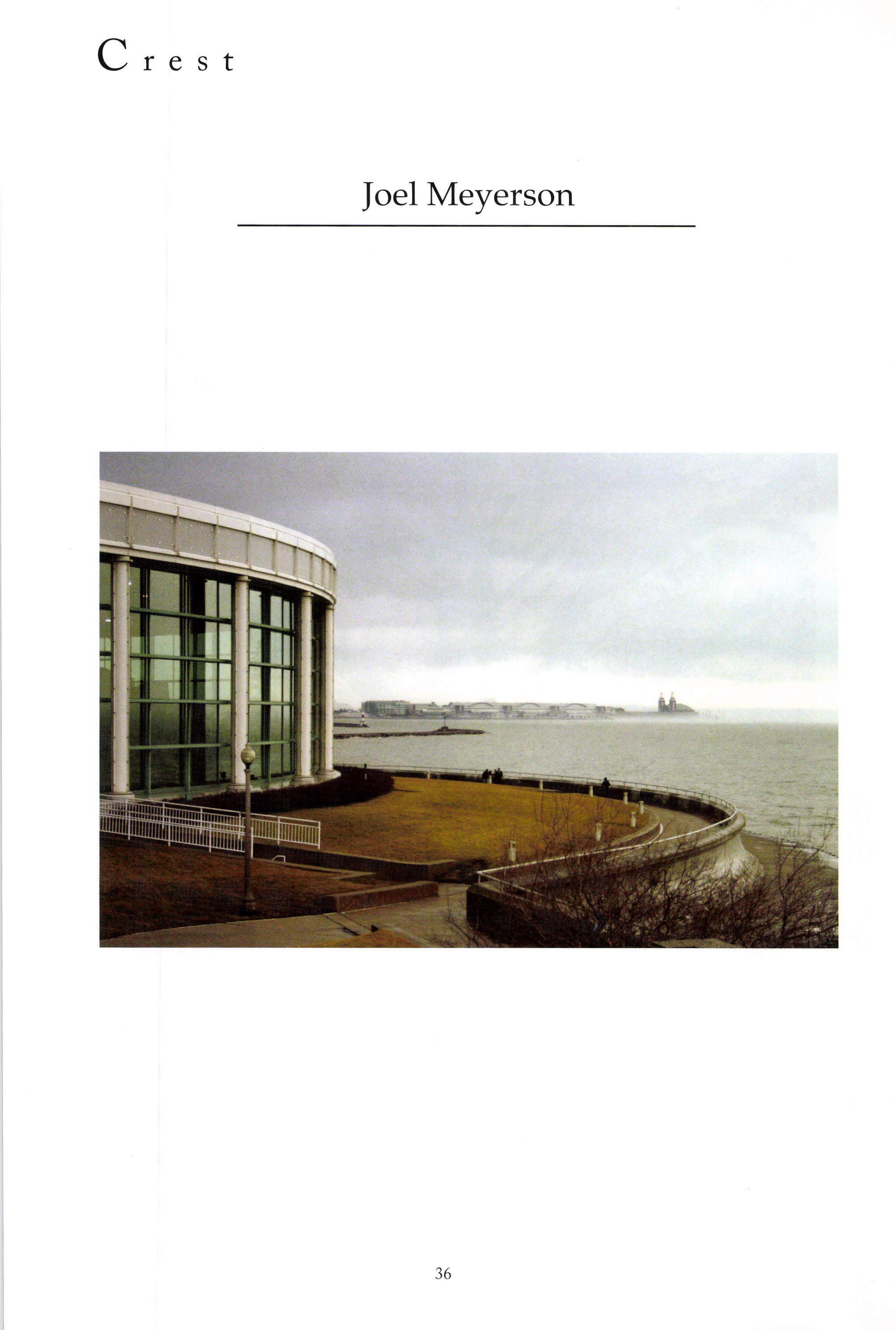
C rest
36
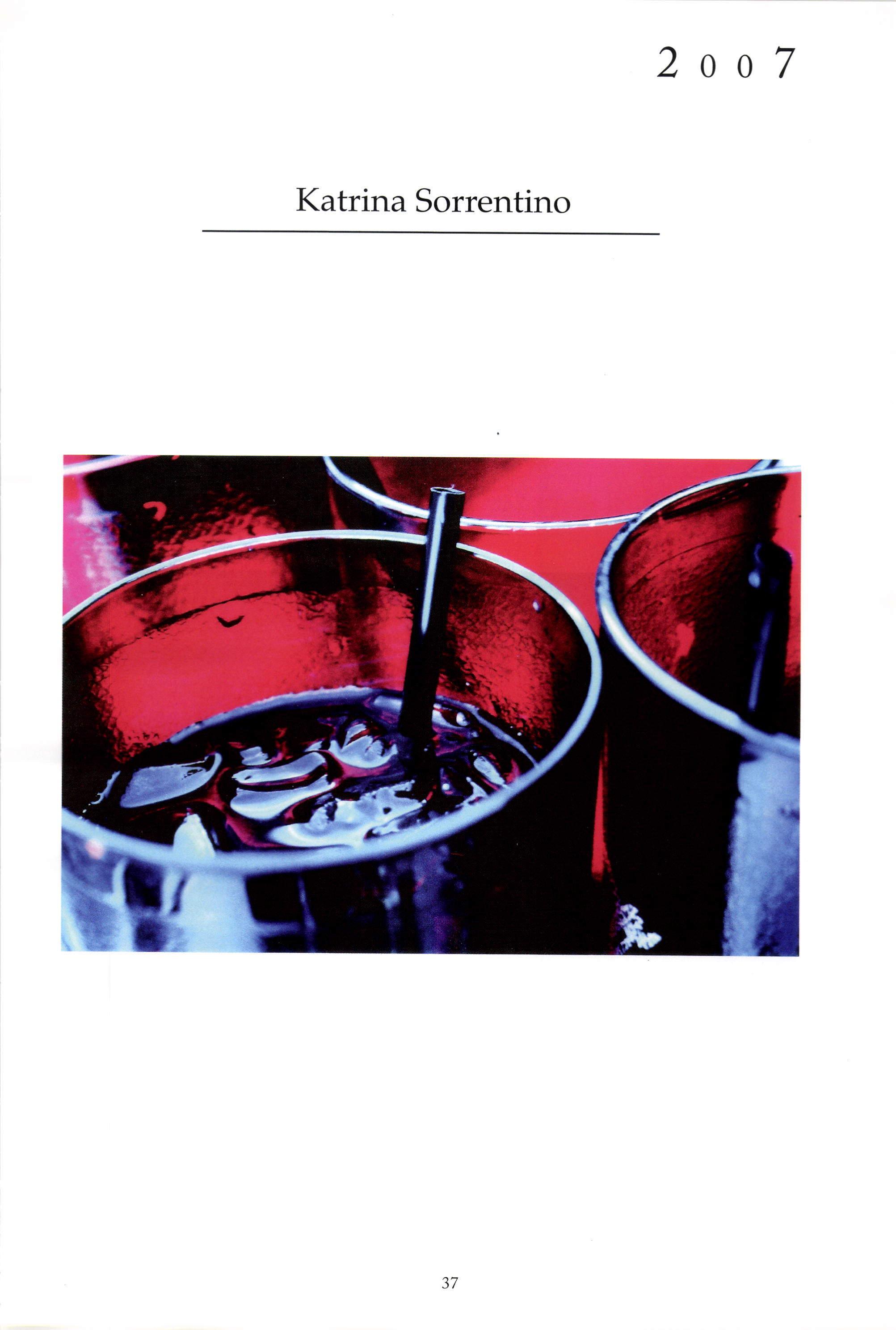
2oo7
-t/
Katrina Sorrentino
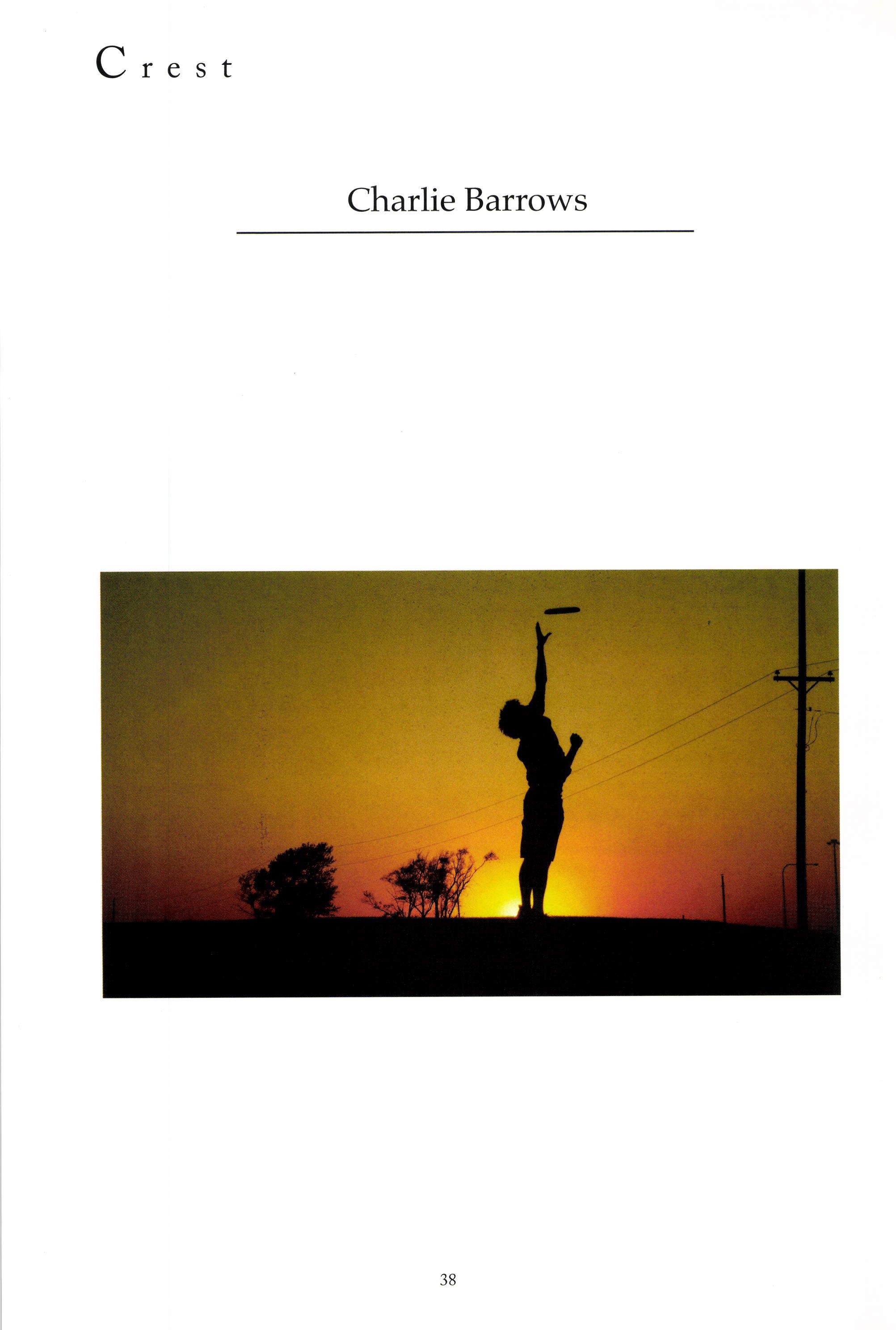
C rest
38
Charlie Barrows
Maddie Labadie
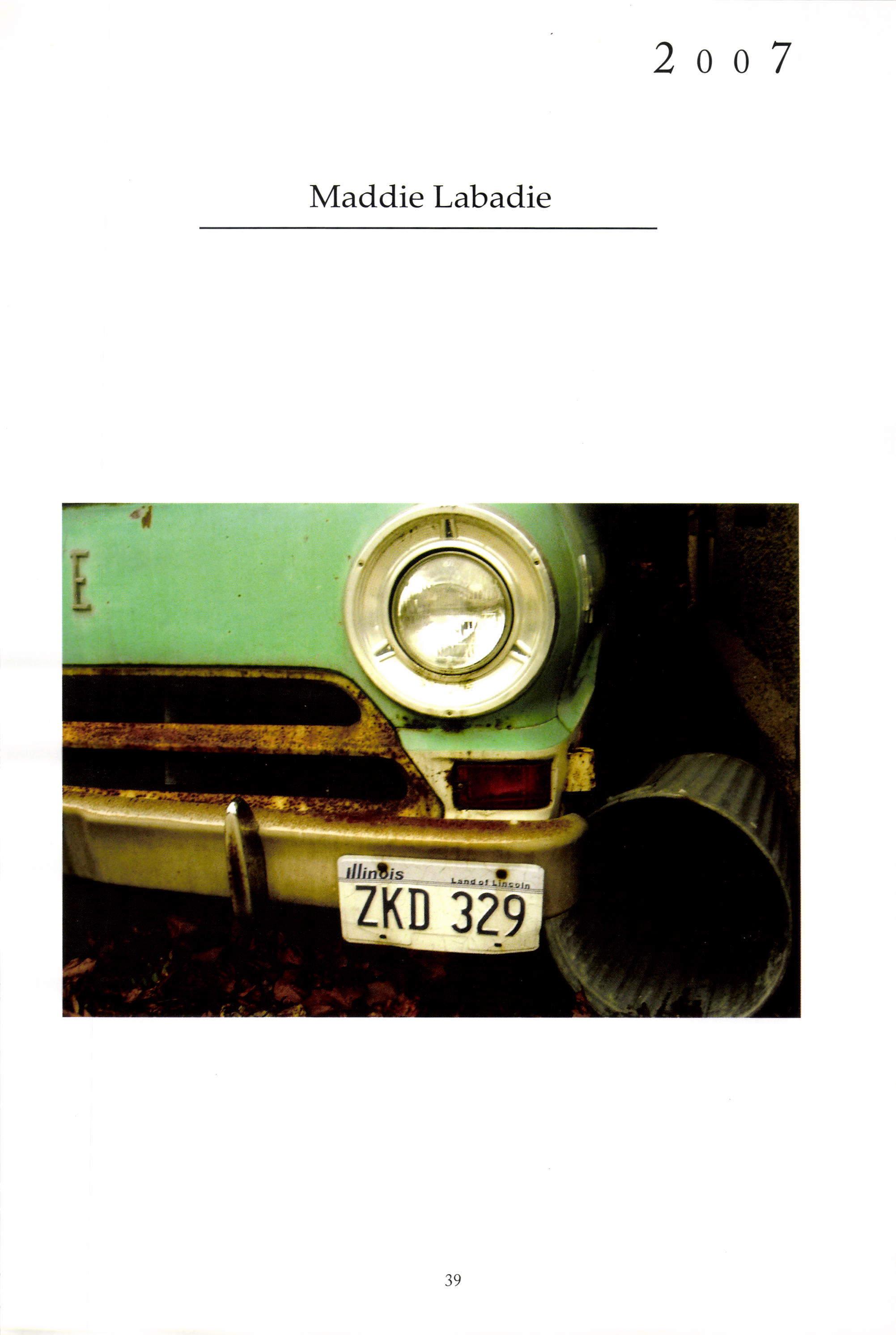
2 o o 7
39
Natalya Carrico
) ,
o t
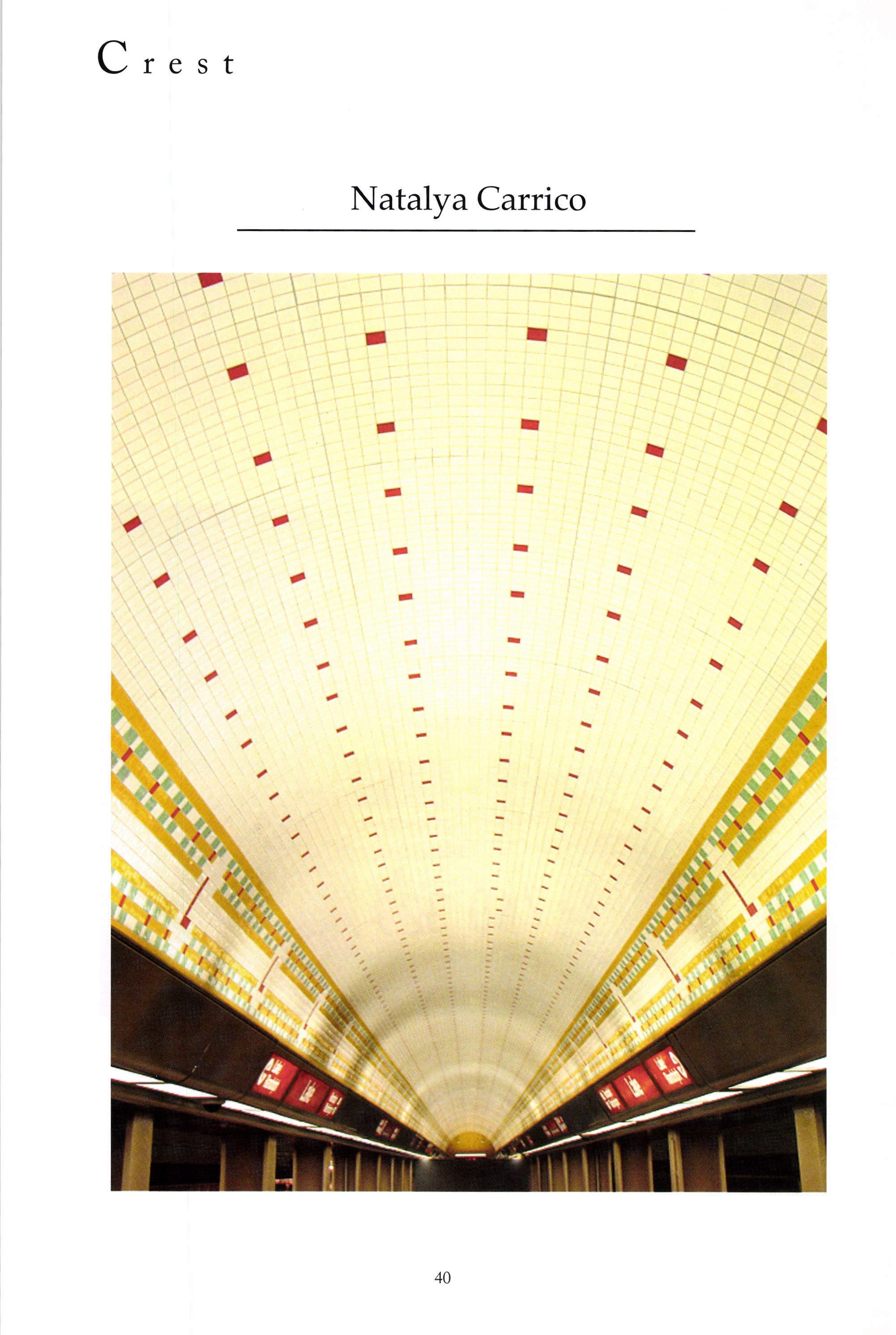
a a t t a t \ \ a a \ a \ \,.
C rest
;
I r r t t
, 40
t
I a a a a
t
t
!, '' , \r\ \ ,
The Sky Rains Music
]eff Solodky
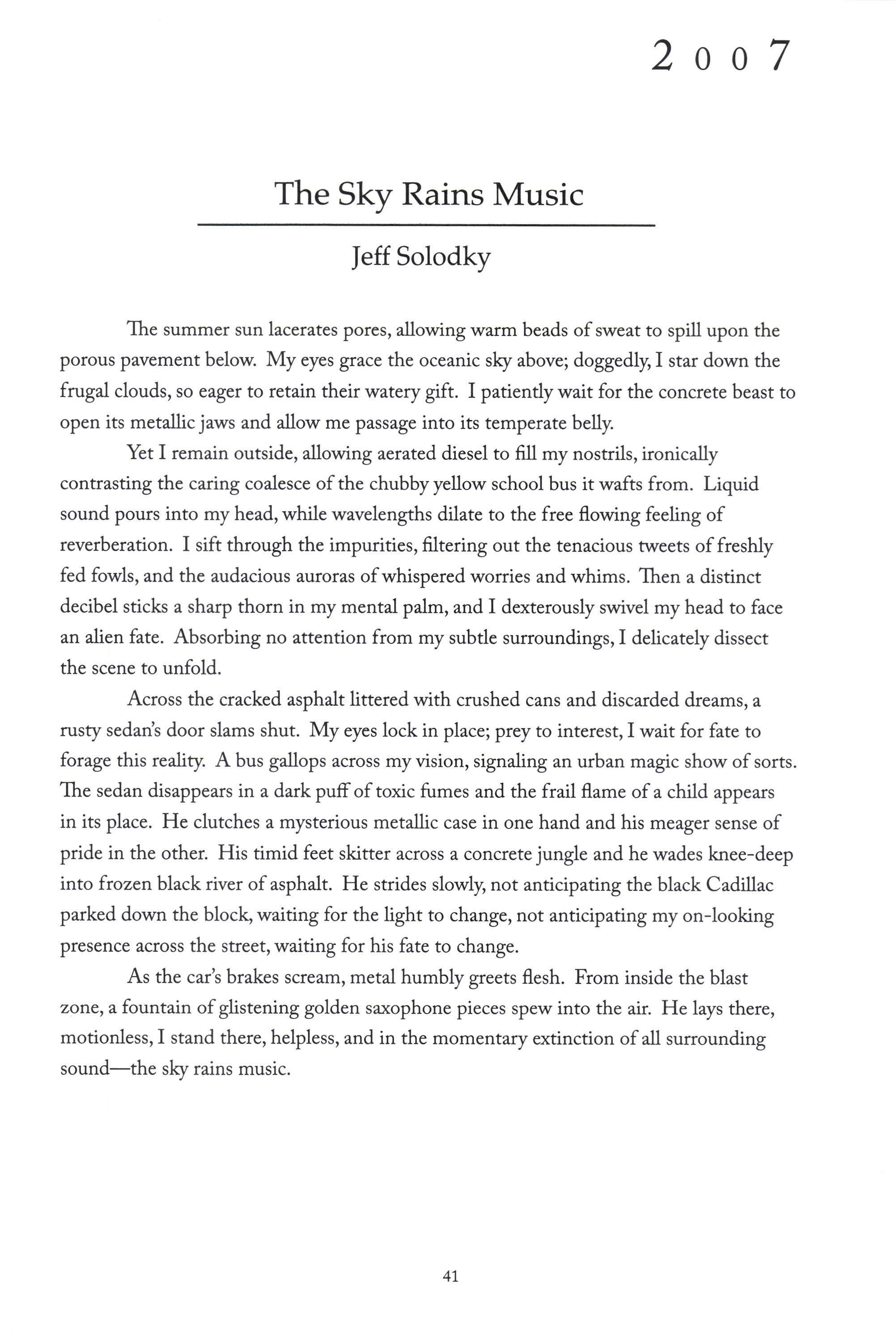
The summer sun lacerates pores, allowing warm beads of sweat to spill upon the porous pavement below. My eyes grace the oceanic sky above; doggedly,I star down the frugal clouds, so eager to retain their watery gift. I patiendy wait for the concrete beast to open its metallic jaws and allow me passage into its temperate belly.
Yet I remain outside, allowing aerated diesel to fill -y nostrils, ironically contrasting the caring coalesce of the chubby yellow school bus it wafts from. Liquid sound pours into my head, while wavelengths dilate to the free flowing feeling of reverberation. I sift through the impurities, filtering out the tenacious tweets of freshly fed fowls, and the audacious auroras of whispered worries and whims. Then a distinct decibel sticks a sharp thorn in my mental palm, and I dexterously swivel my head to face an alien fate. Absorbing no attention from my subde surroundings,I delicately dissect the scene to unfold.
Across the cracked asphalt littered with crushed cans and discarded dreams, a rusty sedan's door slams shut. My eyes lock in place; prey to interest, I wait for fate to forage this realiry A bus gallops across my vision, signaling an urban magic show of sorts. The sedan disappears in a dark puffof toxic fumes and the frail flame of a child appears in its place. He clutches a mysterious metellic case in one hand and his meager sense of pride in the other. His timid feet skitter across a concrete jungle and he wades knee-deep into frozen black river of asphalt. He strides slowly, not anticipating the black Cadillac parked down the blocb waiting for the light to change, not anticipating my on-looking presence across the street, waiting for his fate to change.
As the car's brakes scream, metal humbly greets fesh. From inside the blast zone,z fountain of glistening golden saxophone pieces spew into the air. He lays there, motionless, I stand there, helpless, and in the momentary extinction of all surrounding sound-the sky rains music.
2 o o 7
4t
Permanent Fade
Gabrielle Worley

Krista took me for a walk to teach me about graffiti she is enchanted by the mystery howwords appear with morning and the only thing that doesnt matter
Is who wrote them she calls them superheroes behind moon masls and night capes they compromise identity for spray paint
To speak for brick that's been forgotten like broke tenants sky split into condos so it can be sold by the foot
I stare at bubbled words on glistening townhouses east of Division wonder which is the imposter who gets to decide what's beautifirl?
Fifth floor apartment
I sit with nose pressed to cold glass watch building across the way wait for the flicker of windows to fill me up around 10:30lights become fewer
Every time a room goes dark I fear the loss happening inside me the pages I cant filIwith stories imagination shoved out by math problems till my mind has naro left sides
C rest
42
and it scares me to see so much of myself
When I stare at brick I become quiet teachers wonder where I've gone but dort't ask about the dreams that come backwhen I sleep
I wish I had the courage to be a superhero reclaim mywalls sell every foot of my mind back to the sky
Tell teachers that kids dont sleep in fluorescent classrooms they dream of paintingwindows to jump out of scribbling wings to catch the fall
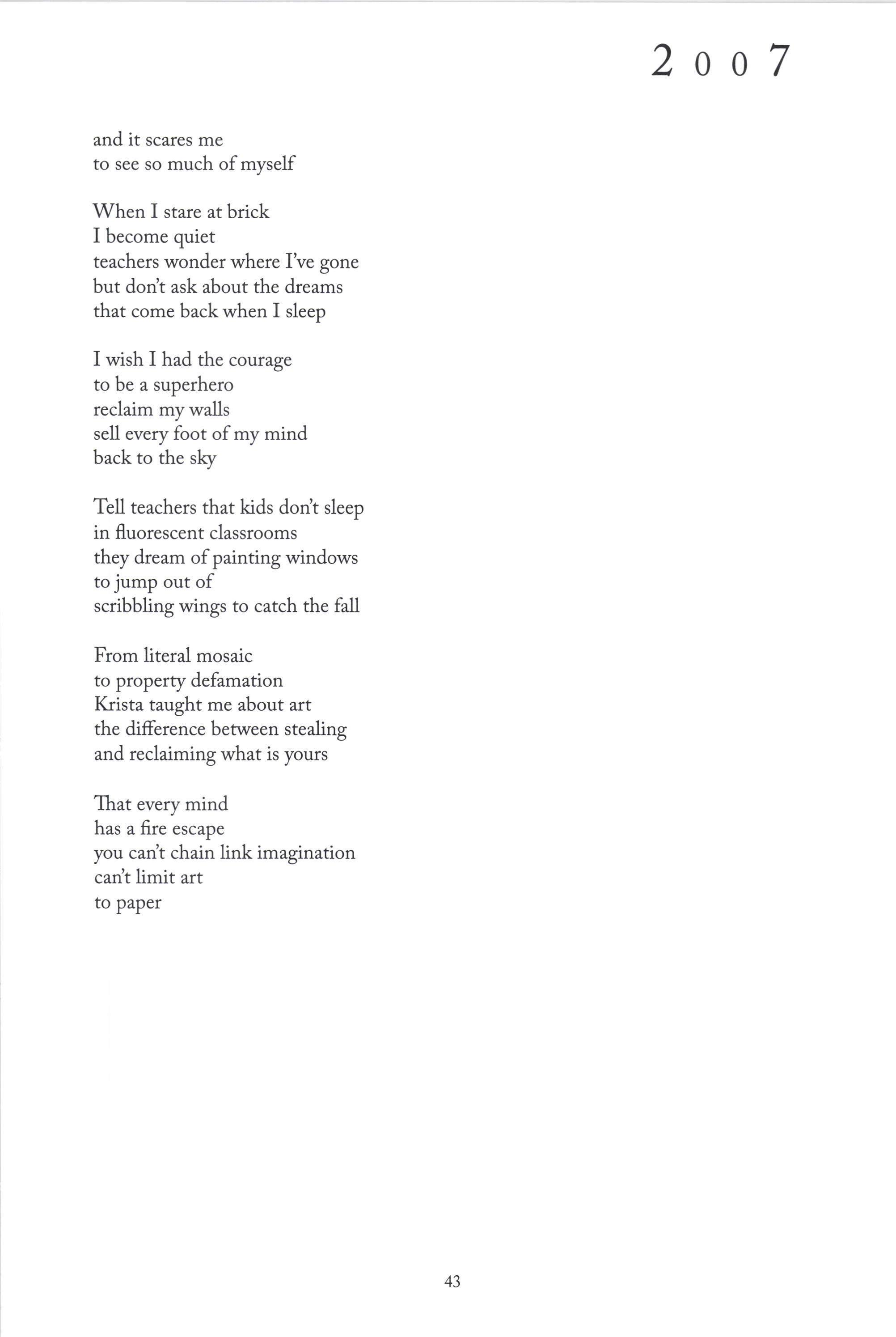
From literal mosaic to property defamation Krista taught me about art the difference between stealing and reclaiming what is yours
That everymind has a fire escape you cant chain link imagination cant limit art to paper
2 o o 7
43
Life
Anne Dubsky
"Life," the letter related, "sometimes doesn't amount to more than a piss-hole in a snow-bank." Raul crumpled the paper, squeezing the letter smaller and smaller into a ball, rolling it until the ball was sogg'y with sweat, then tossing it across the room. Bouncing off two corner walls, it missed, and rolled stopping on a crack in the floor. He traced with his eyes the cracks in the thick, chipped layers of paint on his wall next to his bed. He rolled offthe grey sheets, implanting his feet on the floor, on the front page of Zbe NeutYork Tirnes.Twenry-four, and living by borrowing from his old man, he thought. His ole man was always T-shirted and mowing the lawn or learning over the back fence on Saturday afternoons with a beer in hand. And there were all the other men in T-shirts, and all the other people with houses and two cars and lawns that were mowed every other Saturday afternoonl except in the winter, when all the men came over and watched the football games or basketball game, or the car they wanted to buy next year, as soon as spring came. But Raul was in NewYork,lower Manhattan, Delancey Street and $300 bucks a month. Other pages covered the floor, randomly loose, torn, and folded. Pictures and articles of last week's disasters. Raul wondered if he would ever be in the newspaper, whether he would ever be front-paged, but then decided that he lacked even the ambition to be violent.
Raul was in his underwear. He got on his hands and knees, and began reaching under the bed,looking for his socks. Groping like a blind man, stretching under the bed, he began looking for his black socks among the dust and old newspapers. But they werent there. "Maybe," he thought, "I never had any socks." But then he remembered that, long ago, he had socks. He remembered walking around in his socks when he was four years old, walking the suburban sidewalks in his socks until he wore holes in them and the toes became loose and floppy. Then his mother would slap him, and force Raul to put his shoes on. She would tie the shoes in knots, so that even Raul, no matter how hard he tried, could not pull them off. But then his father would cut the laces before bedtime sa)rtng that wearing shoes in bed would ruin the sheets. The socks had no elastic tops, and seemed to crawl into his flat-bottomed shoes as he walked. No matter how hard he yanked and tugged his socks, they always disappeared into the backs of his shoes. Lost
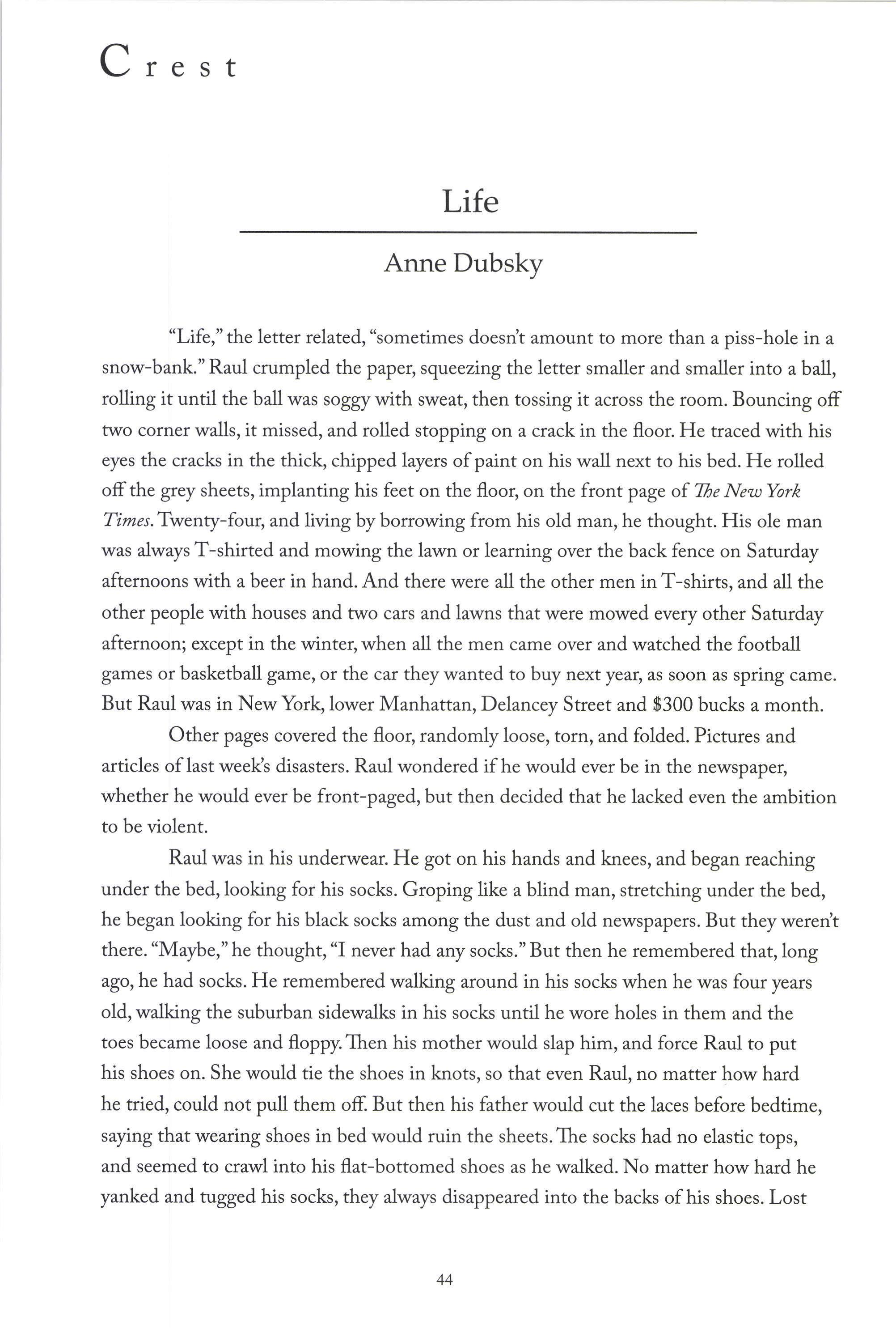
C rest
44
forever, until his father had cut the laces.
Raul was under the bed now, groping among the papers, inhaling the dust. He stood up. "Hell," he thought, "no socks." He went, suddenly dizzy,to the sink, coughed dust and vomited wine and deluxe pizza rnto the sink. The sink was across from his bed, hanging on the wall solidly enough to support Raul, who was now leaning on it. Choking, Raul turned on the faucet, swirling purple pieces of half digest floor into the drain. He stopped choking. Raul walked out, locking the door. "No socks," he thought, hoping his feet wouldn't be rubbed raw by his gym shoes.
Three flights of stairs. Frve turns, forty-r'aro steps. And every floor a different smell, but the smell was always pungent, and always on ever floor, inhaled deeply. Someday, he though,I will count the bars in the railing. Someday. He thought. I will count the white squares in the hallway floor, the tiny porcelain squares separated by thick, black lines. As he went slowly down the stairs, clutching the rail and turning at the flight on stairs, he wondered whether he could count the squares covered by ancient chewing gum.
Raul knew the Wright brothers had invented go*.He had once read about how the Wright brothers would put sugar and flavoring in tar, and chew it. Everyone chewed tar, the book said, but the Wright brothers were smart and put sugar in the tar. He wondered whether the sweet tar had rotted their teeth, and whether their cavities had bothered them when they had flown; but Raul couldnt decide, for he was now squinting at the sun on the sidewalk, and trying to remember where he should go. He thought of getting something to eat that would clean up his glass stomach, or coat it, or stop any dripping little men.
He walked into a bar.It was dark, and Raul tipped over a stool, and it fell on the grimy floor. He stood up, and could only find the doorway. He walked out on the street. Tramc was heavy on the sidewalk. Old mustached women were flady shuffling their feet along. Their shoes were flattened from the pressure of carrying years of fat. They were all dragging two wheeled shopping carts behind them, with one hand. The other hand hung loosely from a massive arm, an arm larger than Raul had ever seen; even in the weighthfter magazines Raul had once admired, gazingfor hours at greasy men with knotty bodies and large jaws, Raul hadnt seen arms as large as the women had. The women all seemed to have Kellogg's corn flakes balanced on top of the brown paper bags in the carts. Underneath, Raul knew; was a cheap bottle of wine, or a special bottle of whiskey to make life tolerable. The liquor was hidden as though it never existed. Raul felt sorry for the old fat women in faded dresses who existed because of wine.
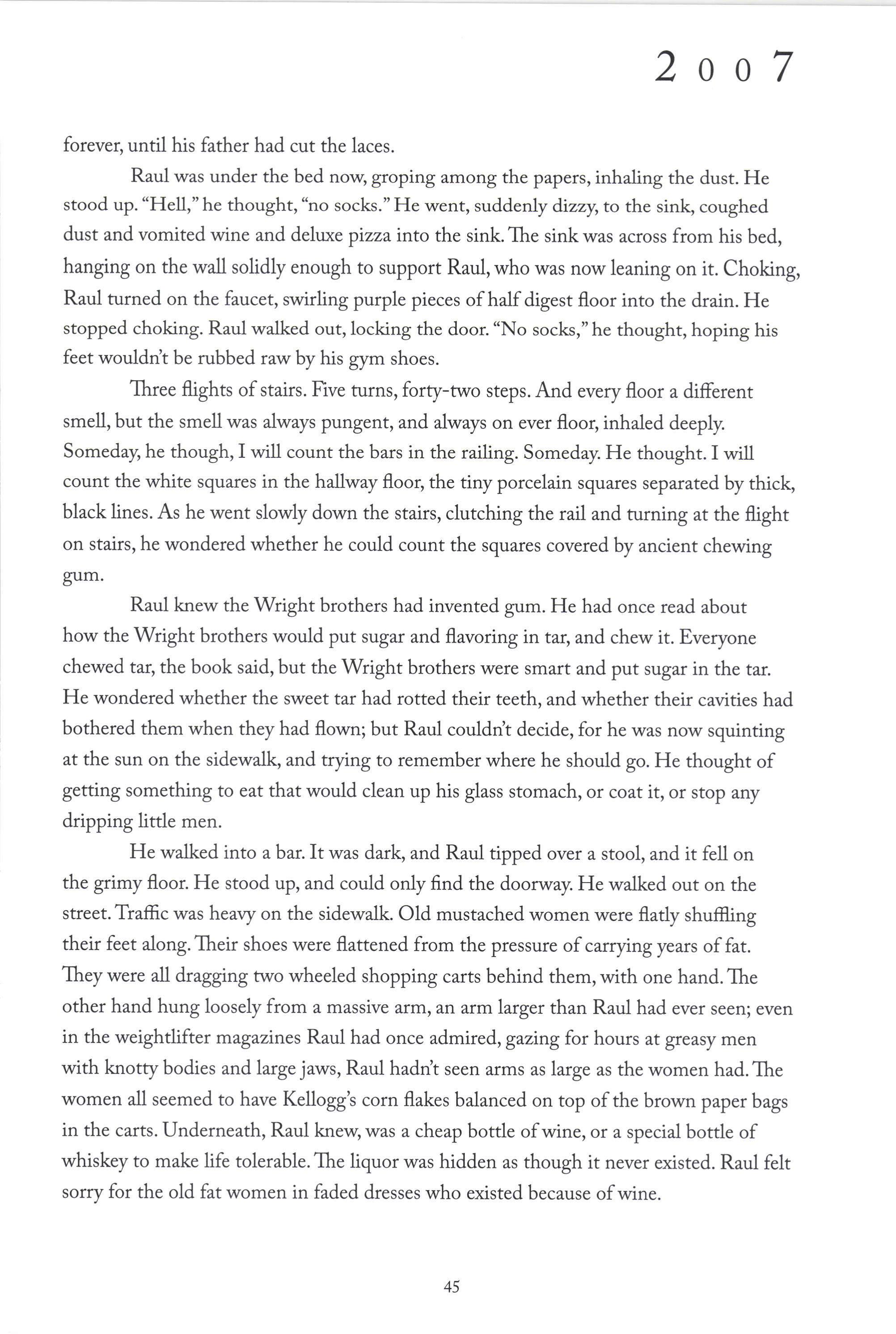
2oo7
45
Walking into an open front restaurant, he perched on a stool, spun around once, and pressed his gum under the counter. It was called a restaurant only because people bought and ate food there; otherwise it was more of a neighborhood feeding center, a place to sit down. A huge glass door was open in the summer, but during the winter a smaller door let people in, keeping the cold out. But nowJuly meant the huge door was open, and the flies and people crowded the counter during their lunch hours. At eleven a.m., though, Raul was alone. Only the Puerto Rican who manned the counter, Raul, an old man asleep with his head on the table in an opposite corner booth, and the flies were there.
Raul spoke. "Hamburger, cupa coffee."
"Everything?"
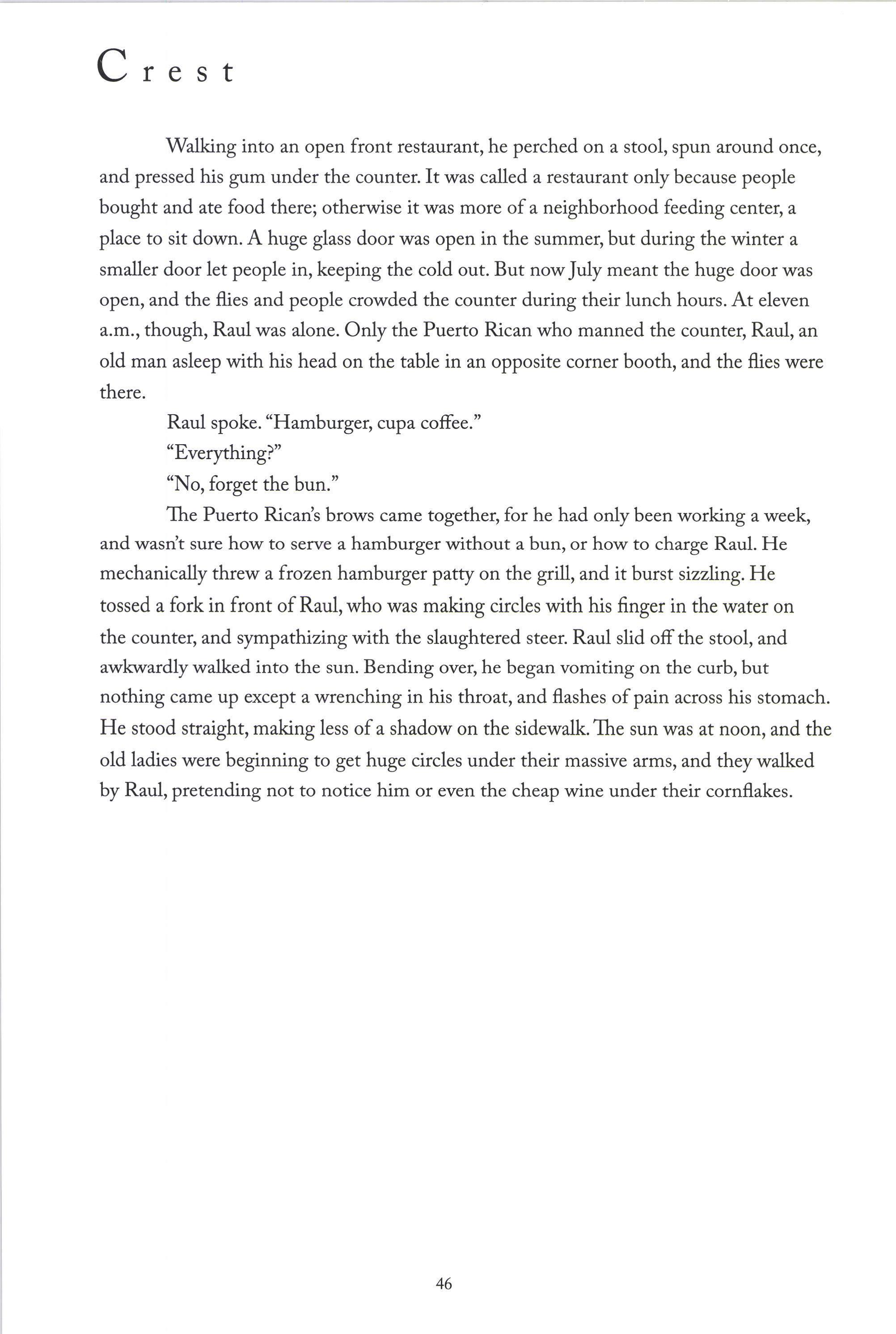
"No, forget the bun."
The Puerto Rican's brows came together, for he had only been working a week, and wasnt sure how to serye a hamburger without a bun, or how to charge Raul. He mechanically threw a frozen hamburger patty on the grill, and it burst sizzling. He tossed a fork in front of Raul, who was making circles with his finger in the water on the counter, and sympathizing with the slaughtered steer. Raul slid offthe stool, and awkr.vardly walked into the sun. Bending over, he began vomiting on the curb, but nothing came up except a wrenching in his throat, and flashes of pain across his stomach. He stood straight, making less of a shadow on the sidewalk. The sun was at noon, and the old ladies were beginning to get huge circles under their massive arms, and they walked by Raul, pretending not to notice him or even the cheap wine under their cornfakes.
C rest
46
The Brightest Knight
]asmine Leslie
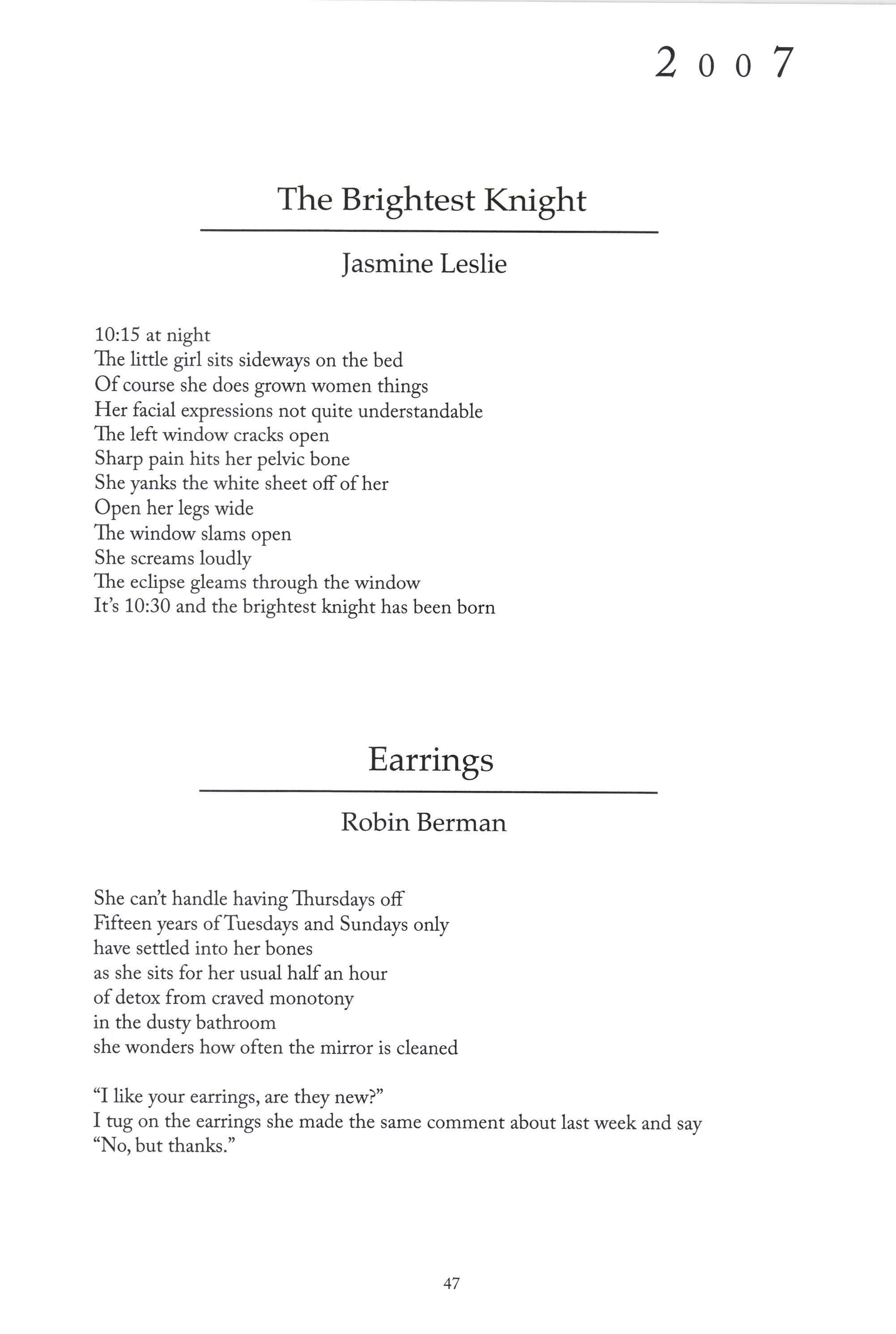
10:15 at night
The litde girl sits sideways on the bed
Of course she does grown women things
Her facial expressions not quite understandable
The left window cracks open
Sharp pain hits her pelvic bone
She yanls the white sheet offof her Open her legs wide
The window slams open She screams loudly
The eclipse gleams through the window It's 10:30 and the brightest k"rght has been born
Earrings
Robin Berman
She cant handle havingThursdays off Frfteen years ofTuesdays and Sundays only have setded into her bones as she sits for her usual half an hour of detox from craved monotony in the dusty bathroom she wonders how often the mirror is cleaned
"I like your earrings, are they new?"
I tug on the earrings she made the same comment about last week and say "No, but thanks."
2 o o 7
47
Drunk
]ules Woodard
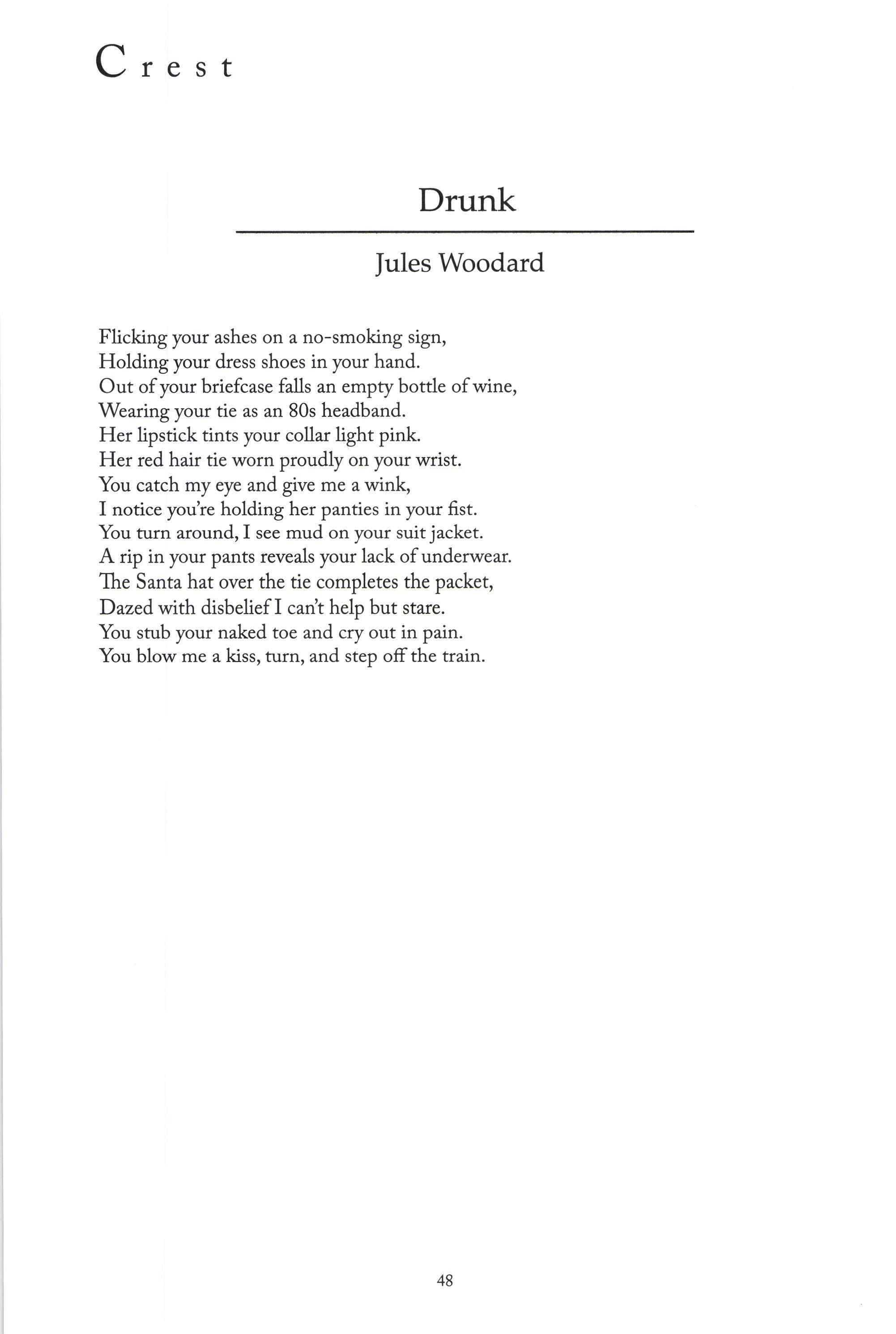
Flicking your ashes on a no-smoking sign, Holding your dress shoes in your hand.
Out of your briefcase falls an empty botde of wine, Wearing your tie as an 80s headband.
Her lipstick tints your collar light pink.
Her red hair tie worn proudly on your wrlst. You catch my eye and give me a wink, I notice youte holding her panties in your fist. You turn around, I see mud on your suit jacket. A rip in your pants reveals your lack ofunderwear.
The Santa hat over the tie completes the packet, Dazedwith &sbelief I cant help but stare.
You stub your naked toe and cry out in pain. You blow me a kiss, turn, and step offthe train.
C rest
48
State of Matter
Ellen Drews
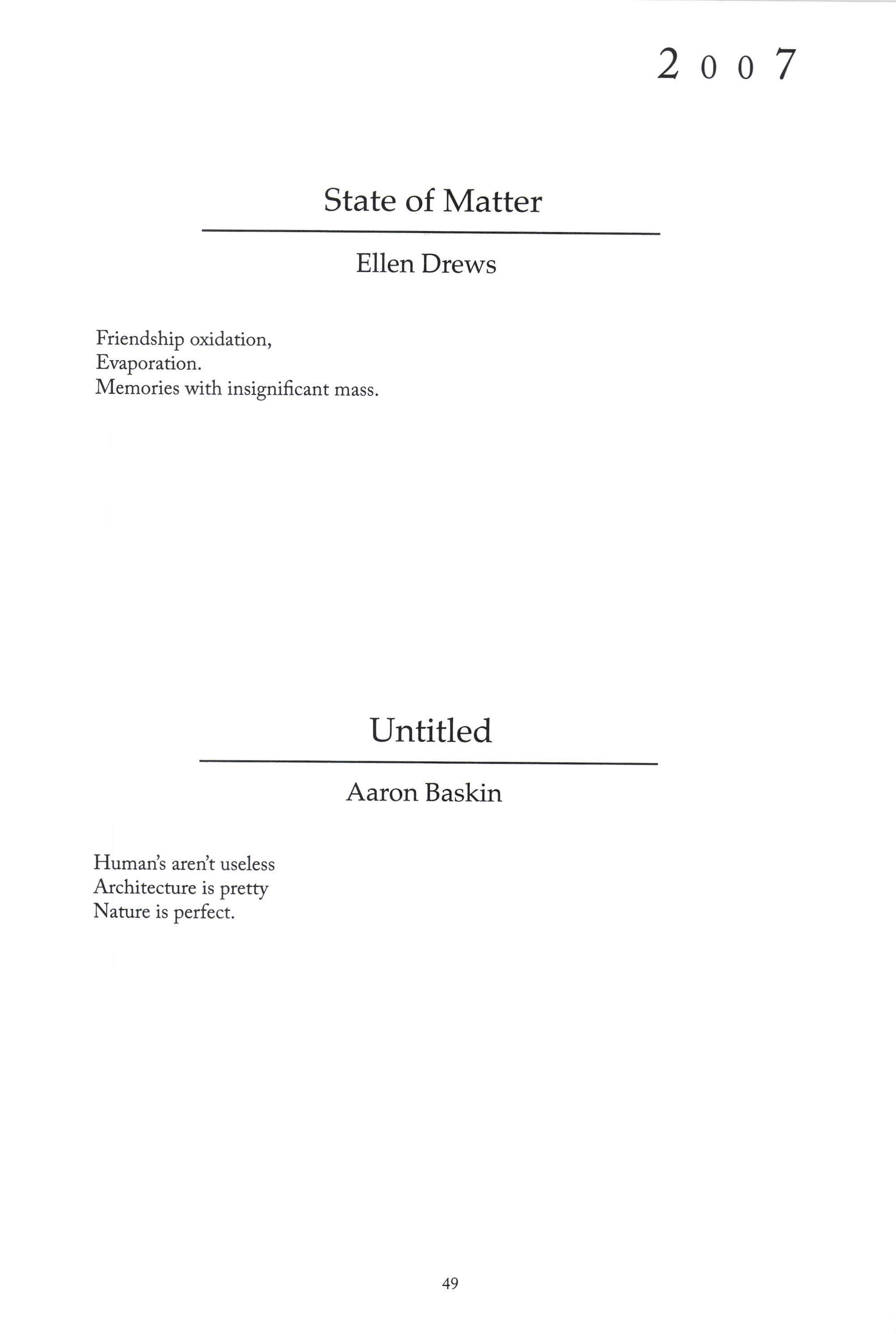
Friendship oxidation, Evaporation. Memories with insignificant mass.
Untitled
Aaron Baskin
Humarls arerlt useless Architecture is pretfy Nature is perfect.
2oo7
49
Haley Burke
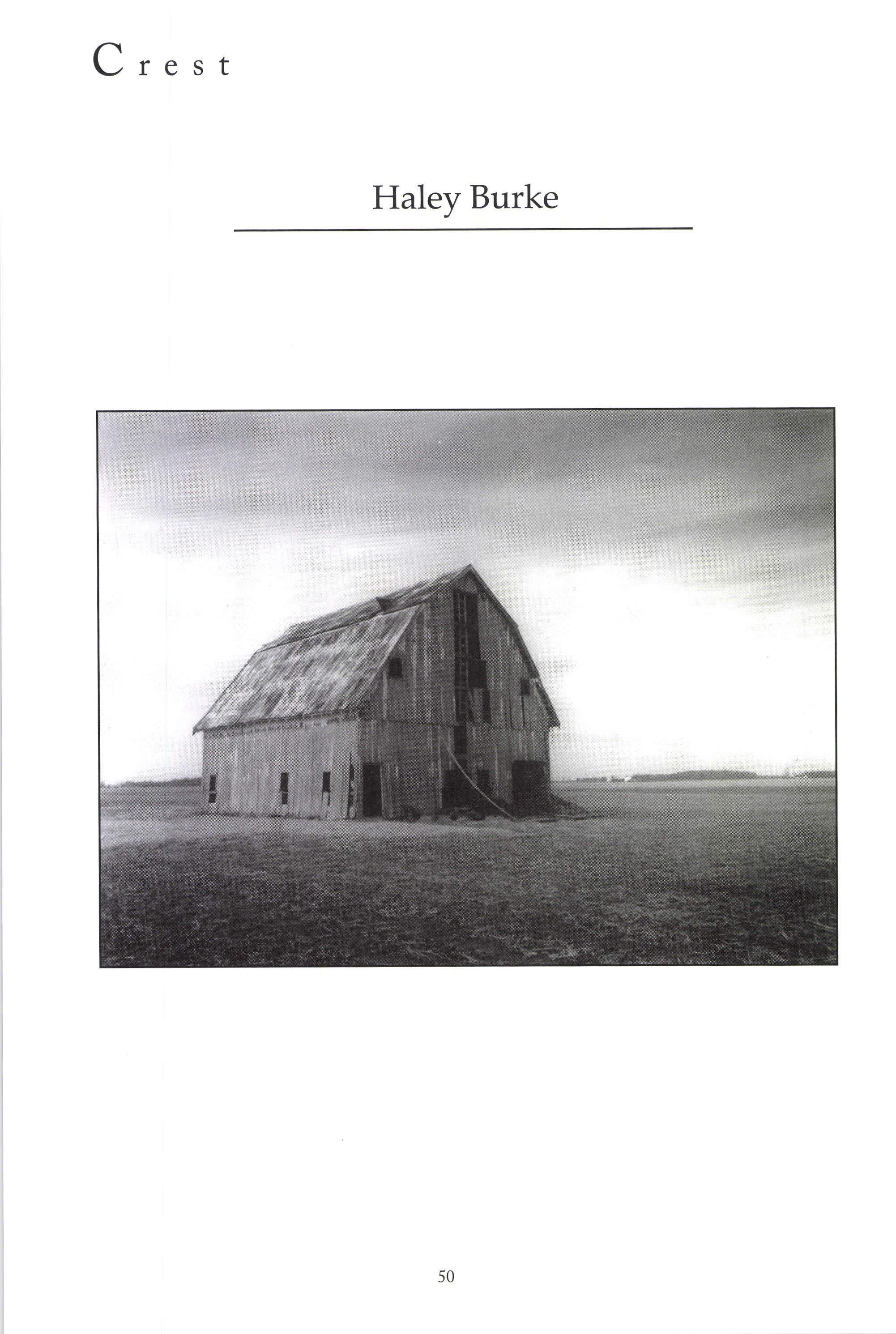
C rest
50
Natalya Carrico
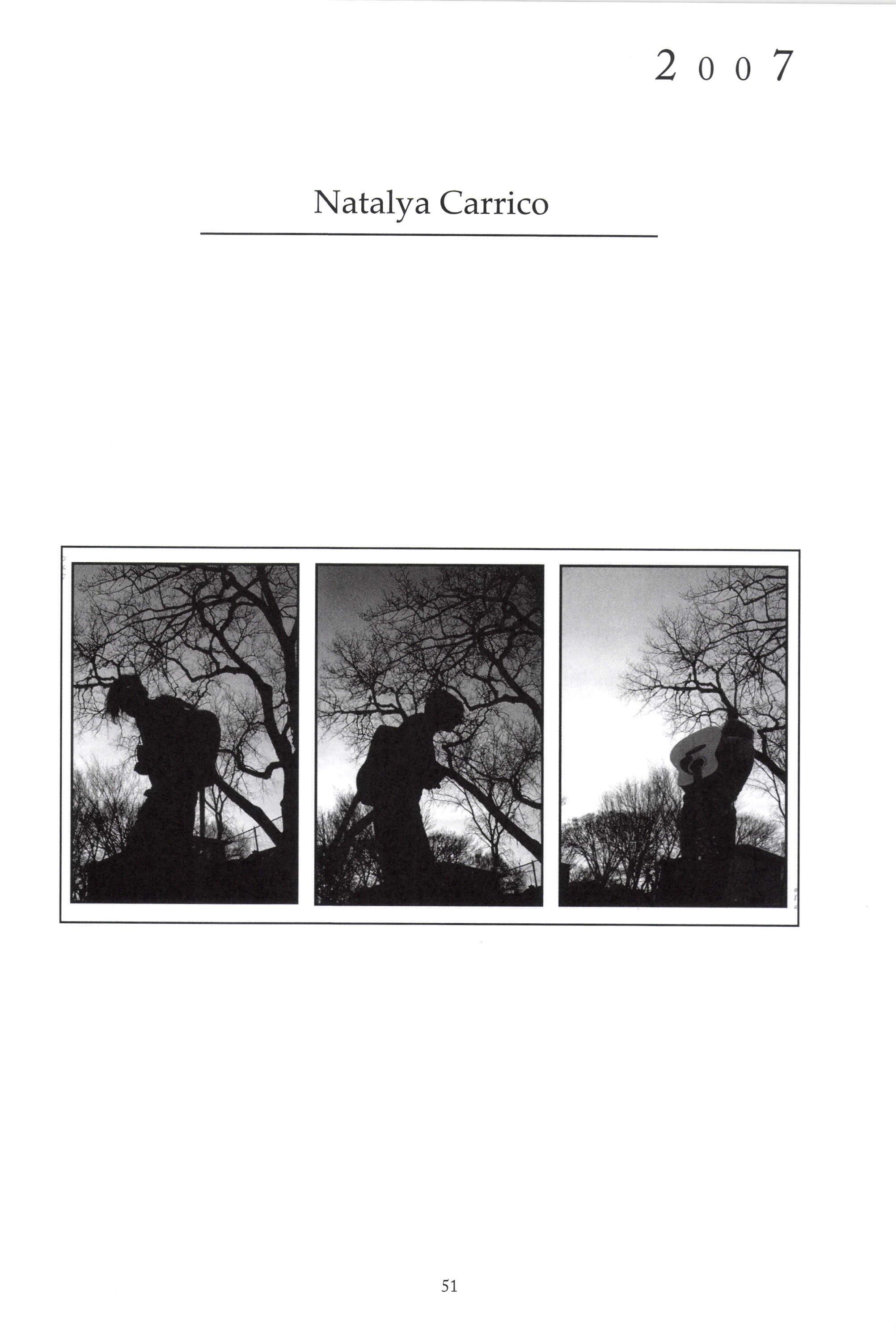
2oo7
51
]ack in the Box
Kylie Pederson
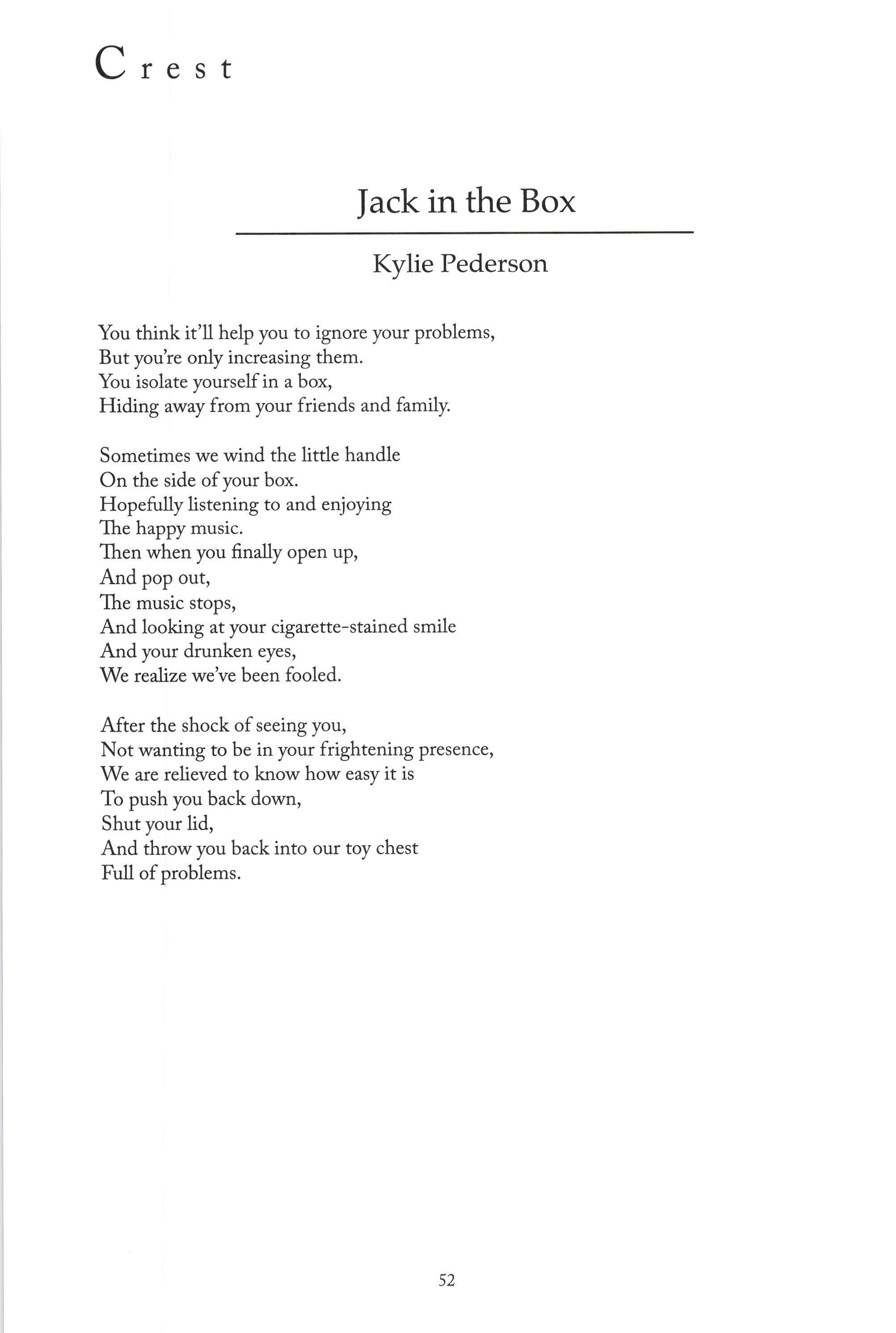
You think it'llhelp you to ignore your problems, But youte only increasing them. You isolate yourself in a box, Hiding away fromyour friends and family.
Sometimes we wind the litde handle On the side of your box. Hopefrrlly listening to and enjoying The happy music.
Then when you finally open up, And pop out, The music stops, And looking at your cigarette-stained smile And your drunken eyes, We realize weVe been fooled.
After the shock of seeing you, Not wanting to be in your frightening presence, We are relieved to know how easy it is
To push you back dorvn, Shut your lid, And throwyou back into our toy chest Full ofproblems.
C rest
52
Bicycle Guys
Lionel Brichi
Recendy, in this dead fall, where the cold froze the trees,I was walking down one of those sidewalks, and I saw two guys riding a bicycle each on the middle of the street, crackling the dead leaves. This,ladies and gentlemen, is more than two people having a ride.This is an evident expression of those two people's friendship.Just see how they are talking, and how they were zigzagglng along during that, not able to focus on their conversation and on the riding. And loolq why were they in the middle of the street? This is a symbol of the almightiness some people display while in the presence of a good friend. See, everything is there, not to be said, but to be shown.
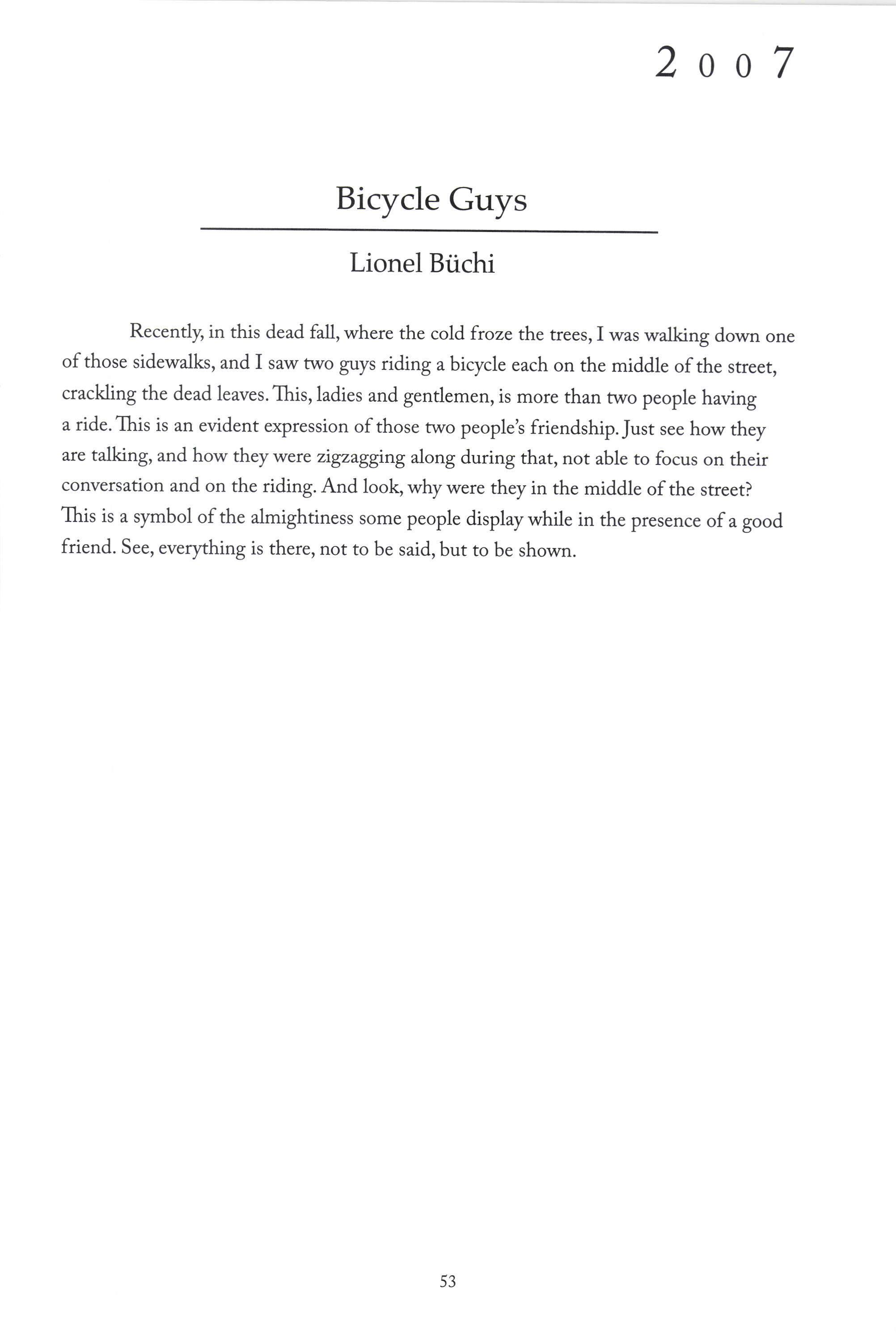
2oo7
53
Untitled
Novana Venerable

Her brain paved with cement
Grass doesnt grow
Wheels rolling across forehead Car tires groove into fesh
Exhaust polluting emotions
Feelings smeared in muffiers. Too many thoughts walking around in high heels
Steps cracking pavement Like light posts City in eyes
No sleep Streetlights replace sky Jeffgot closer than light posts Forced himself into concrete Kept sturdy in her sidewalks
Beat herwith lamps when City grew dark Tony slid in through cracks Found hard way in Mended cement with ice cubes
Stopped her dimples from swelling Head too crowded with footsteps
Couldrlt distinguish high heels from flat tops Tony is her open field
Grass blades beat boxiri
To his free sryles
Sounds as good as hip-hop No need for sidewalks
Let head become fields
Grass grows there No shoes to clog dirt
The sun, new streetlights
Mud covering brain Soft enough to think Yet packed enough to protect
C rest
54
Know the difference between Footsteps and ciphers
Grave1 crushing concern into powder. Country too soft to leave
Eyes swollen like broken cheekbones ButJeffis her city She lives there
Gotten too used to covering her smile
Afraid to show how he played her mouth Like city buildings His fist, the bulldozer
Face distorted like drunken vision
Cant choose between stars And streedights
Between head trauma and love
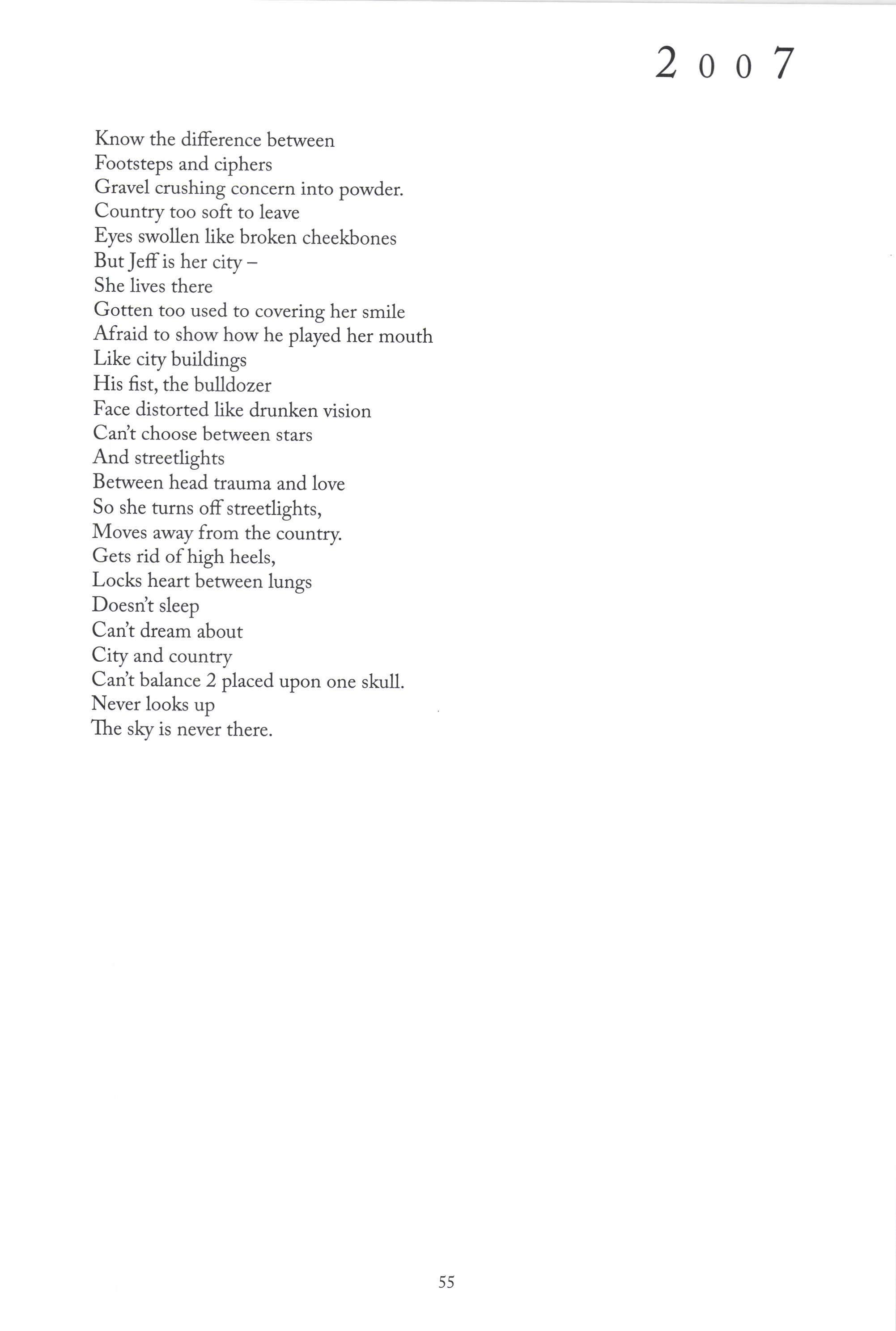
So she turns offstreedights, Moves awayfrom the country.
Gets rid of high heels, Locks heart benareen lungs
Doesnt sleep Cant dream about City and country
Cant balance 2 placed upon one skull. Never looks up
The sky is never there.
2 o o 7
55
Crab-Shell BIue
Lucy Conley-smoucha
At the beach, the sky was blue. Unusually blue. There were waves, too. Waves that were just the right size, completing the picture perfectly. A11 along-the land-y shore, there weri crabs: bright blue, murlcy blue, and green. Gracie was a big fan of crabs. She liked how whenever they got angry or scared, they could ju st pincb whatever was bothering them, and that was ok.
Wh.rr"'r"r she pinched her big sister Marian, she got in trouble. She wished sle was a crab, and then wlien Marian told their mother that she was crabby, she could just say "we11, of course I'm crabby. I'm supposed to be!" And then she could pinch Marian again, just for good measure. Right in front of their mother.
But, alis, she was not a crab. Instead, she was a seven-year-old girl, whose big sister didn't like to play with her anymore. And there she was, on the beach, admiring the crabs and the white, salty waves. And the sea foam. She liked sea foam, too, because it reminded her of the foam on root beer. She hardly ever got to drink root beer, but it was probably her favorite. Probably. - 'The sun was shining bright and hot, and her mother wasrit watching anymore. She had been paying attention btfore, when Gracie didnt have sunscreen on, but now that she was *hite ai a ghost, she was free from her mother's eye. Very free. This was proven true when Gracie tugged at her mother's sundress.
"Mama, come play with me in the waves!"
Her mother sifhed and looked down at her litde white sunscreen girl.
"Gracie, Mommy's wearing her pretty white dress. It cant get wet. Go ask Marian. She'll play with you."
Gracie looked down.
"Marian akeady said no." She tugged lighdy at her mother's swishy white dress. "Please?"

"Gracie, I already told you no." Her mothert eyes had rolled in exaspeJation as she answered the same question a second time. "Go ask Marian." She pointed towards her elder daughter, who lay stretched out in the sand, clearly basking'
Gracie walked over to where Marian lay and stood over her, shadow draping over Marian's face, causing her eyes to open sleepily with the sudden lack of heat. Th.y narrowed.
"Gracie, you're blocking my sun. Move."
Gracie stuck out her lower lip.
"Mama told me to ask you to play with me' In the waves."
Marian squinted, looking unimpressed.
"Gracie, Mama's job is to delegate the less desirable tasks to me. My job is to flady refuse. Go away."
Gracie blinked.
"What's delegate?"
C rest
56
Marian rolled her eyes.
"lt means she doesnt want to play with you, and neither do I. So go away,and get out of my sun." Her eyes snapped shut.
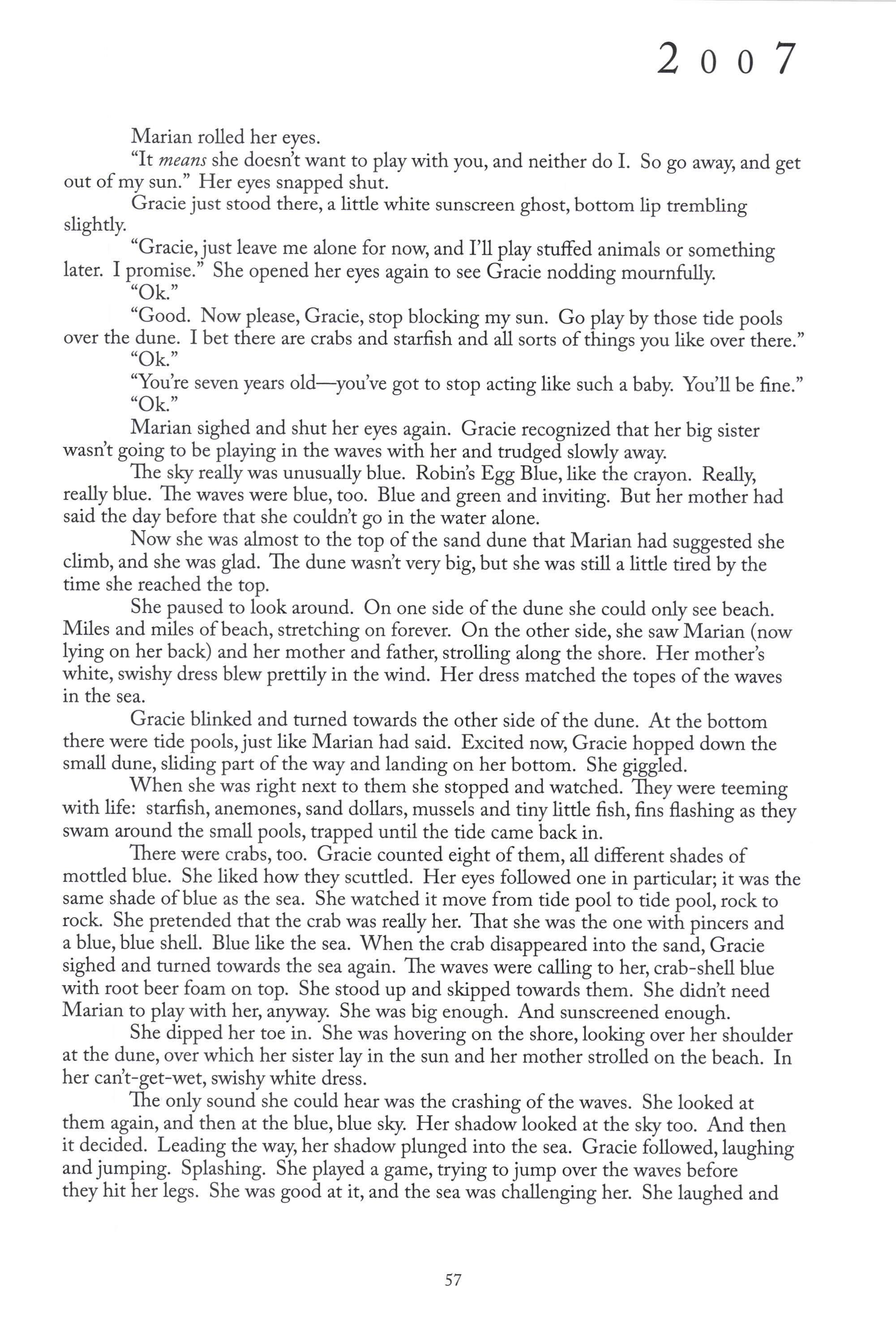
Gracie just stood there, a litde white sunscreen ghost, bottom lip trembling slightly.
"Gracie,.ju_st leave me alone for now, and I'll play stuffed animals or something later. I p-r9Ti!e." She opened her eyes again to see Gracie nodding mournfirlly. "ok."
"Good. Now please, Gracie, stop blocking my sun. Go play by those tide pools over the dune. I bet there are crabs and starfish and all sorts ofthings you like ovei there." "ok."
"You're seven years old-youve got to stop acting like such ababy. You'llbe fine." "ok.'
Marian sighed and shut her eyes again. Gracie recognized that her big sister wasnt going to be playing in the waves with her and trudged slowly away.
.
The sky really was unusually blue. Robin's Egg Blue, like the crayon. Really, really blue. The waves were blue, too. Blue and green and inviting. But her mothei had said the day before that she couldnt go in the water alone.
Now she was almost to the top of the sand dune that Marian had suggested she climb,.and sh9 was glad. The dune wasnt very big, but she was still a litde tired by the time she reached the top.
She paused to look around. On one side of the dune she could only see beach. Miles and miles of beach, stretching on forever. On the other side, she sawMarian (now lying on her back) and her mother and father, strolling along the shore. Her mother's whi_te, swishy dress blew prettily in the wind. Her dress matched the topes of the waves in the sea.
Gracie blinked and turned towards the other side of the dune. At the bottom there were tide pools, just like Marian had said. Excited now, Gracie hopped down the small dune, sliding part of the way and landing on her bonom. She giggled.
When she was right next to them she stopped and watched. Iiey were teeming with life: starfish, anemones, sand dollars, mussels and tiny litde fish, fins fashing as they swam around the small pools, trapped until the tide came back in.
There were crabs, too. Gracie counted eight of them, all different shades of motded blue. She liked how they scutded. Her eyes followed one in particula$ it was the same shade of blue as the sea. She watched it move from tide pool to-tide pool, rock to ro_c_k. lhe pretended that the crab was really her. That she waJthe one witL pincers and a blue, blue shell. Blue like the sea. When ihe crab disappeared into the sani, Gracie sighed and turned towards the sea again. The waves wslg 6alling to her, crab-shell blue with root beer foam on top. She stood up and skipped towards them. She didrit need Marian 1o playwith her, anyway. She was big enough. And sunscreened enough.
She dipped her toe in. She was hovering on the shore,looking over her shoulder at the dune, over which her sister lay in the sun and her mother strolled on the beach. In her cant-get-wet, swishy white dress.
The only sound she could hear was the crashing of the waves. She looked at them again, and then at the blue, blue sky. Her shadow looked at the sky too. And then it decided. Leading the way, her shadow plunged into the sea. Gracie followed,laughing and jumping. Splashing. She played a game, tryirg to jump over the waves beforethey hit her legs. She was good at it, and the sea was challenging her. She laughed and
2 o o 7
57
laughed as she jumped over the waves, higher and higher, as they came a litde faster each time.
They were starting to be too high to jump over now; and she was up to her waist in water. If she looked down, her legs were blue, just like the sea. Her arms were still white, but not as white as before. The water had helped that.
She laughed loudly again as the water hit her shoulders, making them blue too. Now she was a blue-shelled crag girl instead of a sunscreen ghost.
She pinched her fingers together underwater, imagining they were claws More loud, delighted laughter as another wave hit her face, and she went under.
The laughter stopped, but the waves didnt. Blue on blue, on green. With root beer foam on top.
On the other side of the dune, Marian shrieked as a little blue crab pinched her baby toe, jolting her awake. She pulled her legs up to her chest, examining her nowthrobbing toe. It was red, and the thought of lying back down on the sand and shutting her eyes like bait for the crabs terrified her.
She stood up. Maybe Gracie still wanted to play in the waves. Because now that she was standing up and looking at the sea, she noticed just how blue it was. (Really blue. Green, too.) The sky was blue, also.
She hiked easily to the top of the dune, scanning the other side for her baby sister. She saw rocks and tide pools (disappearing slowly, as the tide came in) and crabs, but no Gracie.
She scanned the shoreline again. "Gracie!" She was calling out, curious as to where here Iitde sister could be. Marian turned around and saw her mother and father climbing the dune as well.
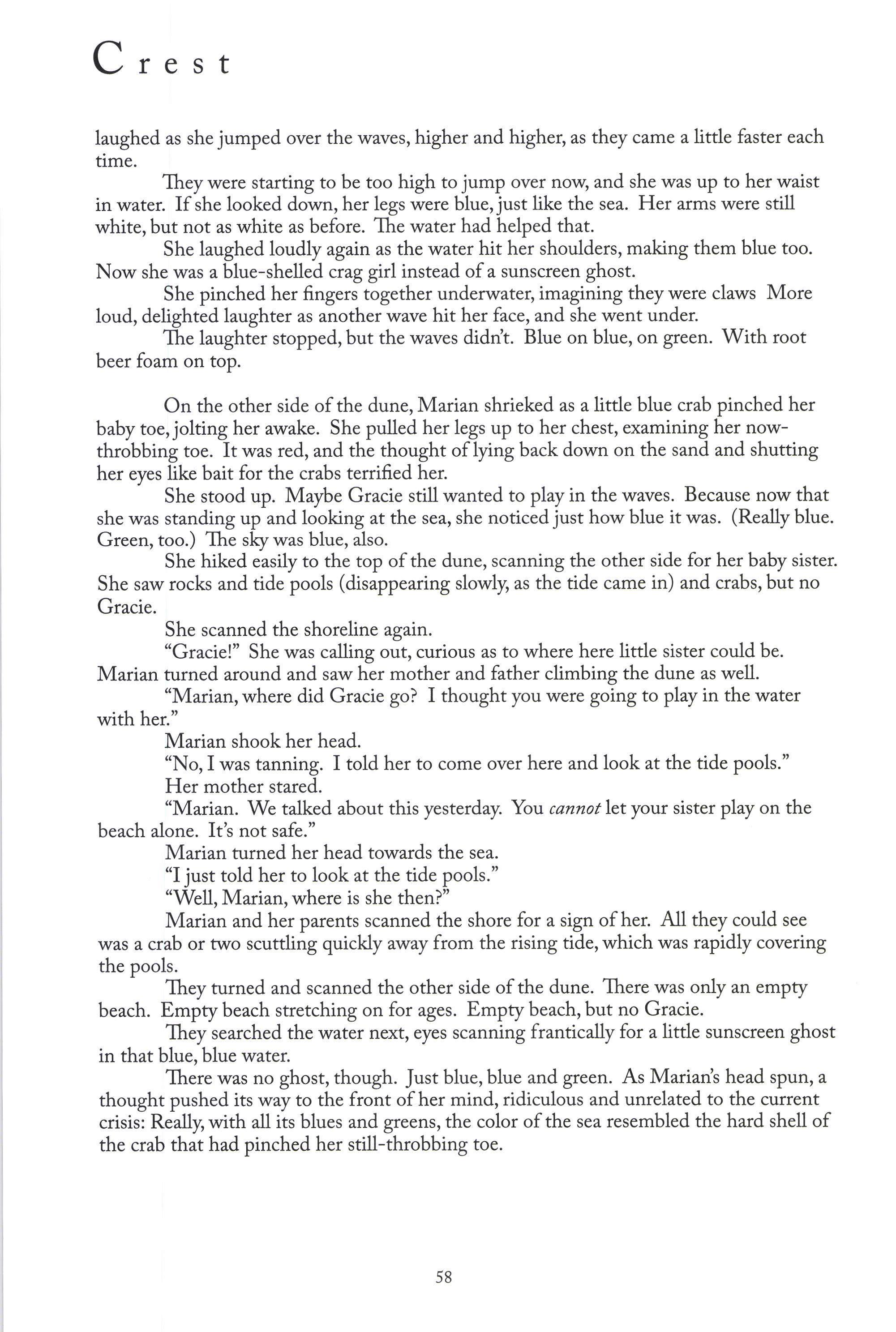
"Marian, where did Gracie go? I thought you were going to play in the water with her."
Marian shook her head. "No,I was tanning. I told her to come over here and look at the tide pools." Her mother stared. "Marian. We talked about this yesterday. You cannot let your sister play on the beach alone. It's not safe."
Marian turned her head towards the sea. "I just told her to look at the tide pools."
uWell, Marian, where is she then?"
Marian and her parents scanned the shore for a sign of her. All they could see was a crab or two scuttling quickly away from the rising tide, which was rapidly covering the pools.
They turned and scanned the other side of the dune. There was only an empty beach. E-pty beach stretching on for ages. E.t pty beach, but no Gracie.
They searched the water next, eyes scanning frantically for a little sunscreen ghost in that blue, blue water.
There was no ghost, though. Just blue, blue and green. As Marian's head spun, a thought pushed its way to the front of her mind, ridiculous and unrelated to the current crisis: Really, with all its blues and greens, the color of the sea resembled the hard shell of the crab that had pinched her still-throbbing toe.
C rest
58
Yearning for Freedom
Keenan Smith
Drut Lust for Emancipation caused him to bargain for The Governmentt semi-sweet toffee. He said it was his only alternative given that his GPA was like a phone with no bars; the colleges couldnt use him. So he left that day for the United States Ar*y. Was it because of his GPA? Or because of his envy of others'liberty? That day he gave farewell address to air force ones, and gave welcome address to booted and spit shined dreams. Three years later they pressed stop on his life, and ejected him out of what he feared was the only place he could be free. After that he went from captivity to liabiliry from2 babies to instability. From honorable discharge to discharges from hospitals and the penitentiary. See my brother chased liberry until he ran out of his mind. But the tables are not twisted, and the liberty is not lusting for him.
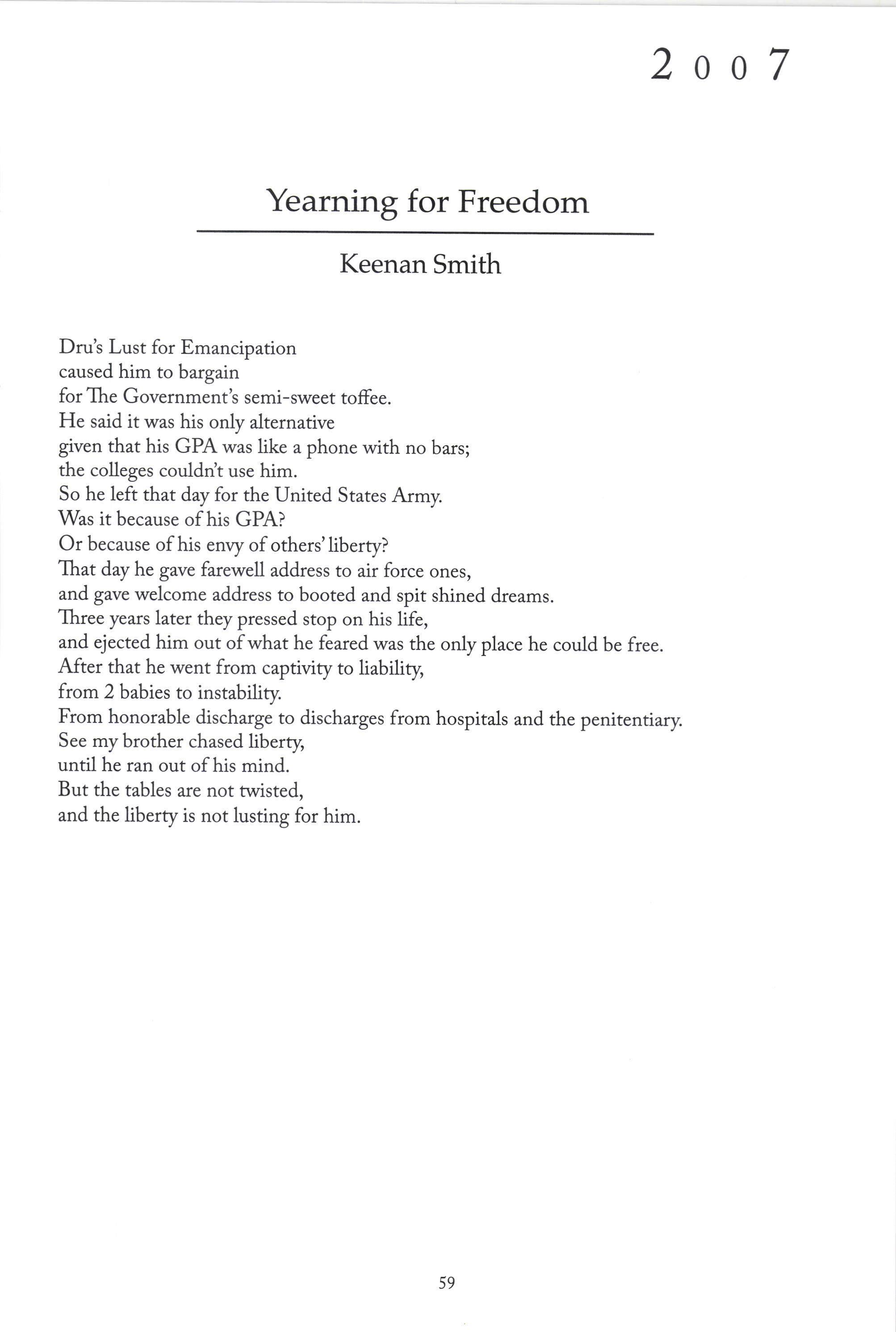
2 o o 7
59
I Remember
I remember the cool tranouil nishts
The forts in the endless cirnfiefds
The super-secret hideout in the hayloft
The un'disturbed peace The only father I ever knew And the best friend I ever had
Those years were a shimmering untouched Haven isolated from misery. But I didnt know how bad it would all hurt
Not getting to say goodbye was like Brushing my teeth with a disposable razor I still remember sitting in the backseat Of our old rundown station wagon
As we pulled out of our family driveway My dad screaming and throwing apples
At the car
I remember my soul being the apple That split on the windshield that day Heck, Low could I forget.
I remember staying in Sarah's Inn
For battered women But hiding is what we really did I remembEr whenever I woirld throw A tantrum there I would shout "Mary Welch is using violence!" But she never did.

I also remember despising Oak Park I still do
To me it is and always has been a cage A cage oflost hope and despair Only allowing me glimpses of happiness
Through the cold iron bars
I remember all of this But I can remember all I want It won't make a difference What happened, happened for a reason I just hope it's a good one.
C rest
60
Kendell Welch
North Challenger
Olivia Japlon
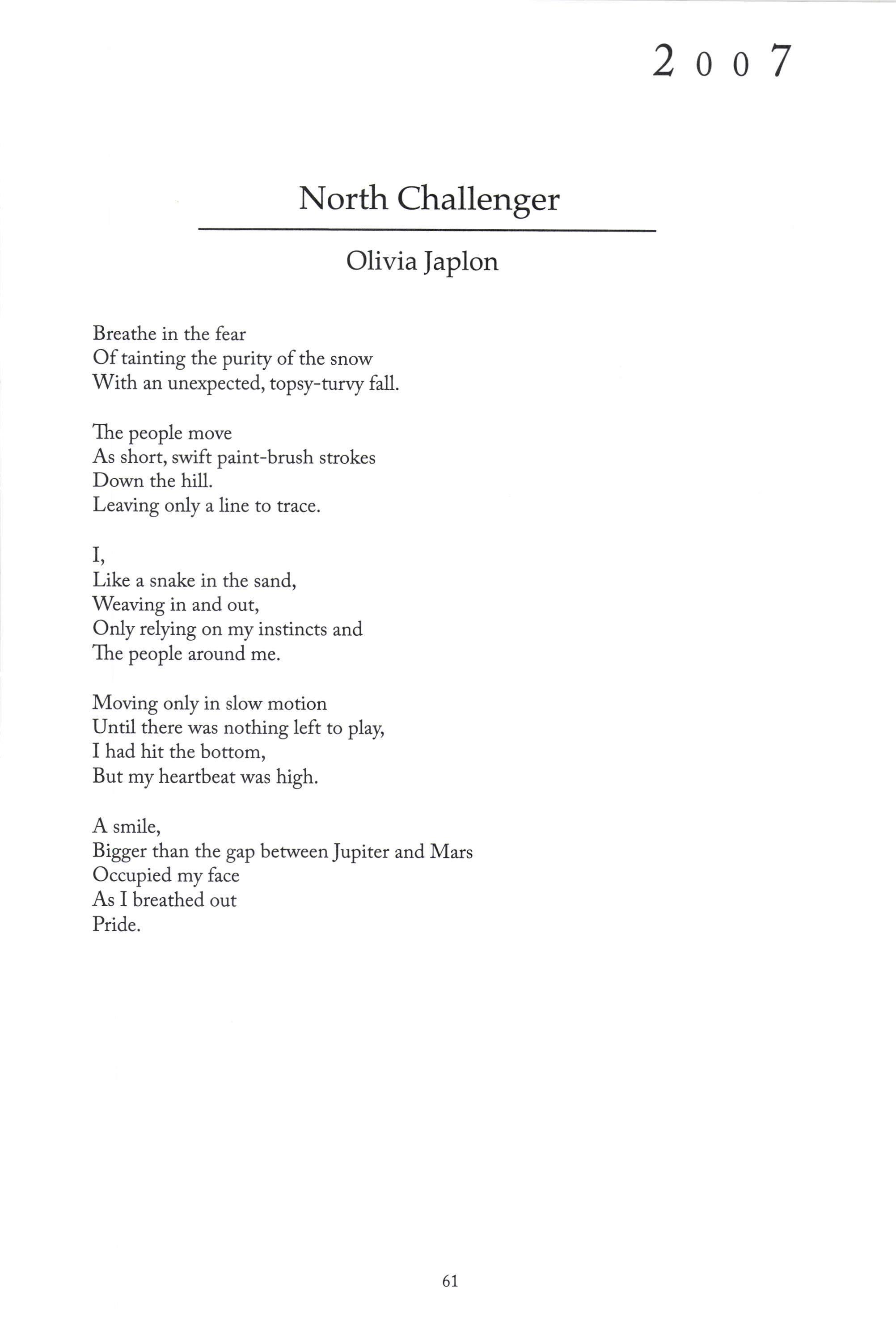
Breathe in the fear
Of tainting the purity of the snow
With an unocpected, topsy-turqy fall.
The people move
As short, srift paint-brush strokes Dov,,n the hill. Leaving only a line to trace.
I,
Like a snake in the sand, Weaving in and out, Only relying on my instincts and The people around me.
Moving only in slow motion
Until there was nothing left to play, I had hit the bottom, But my heartbeat was high.
A smile, Bigger than the gap benineenJupiter and Mars Occupied my face As I breathed out Pride.
2 o o 7
6l
The Mute
Richard Zabransky
I give this assignment in Creative Writing: Write about the ugliest thing you have ever seen. So many ugly things. So many. So many...just yesterday. Thirty seconds on CNN. Gunfire befween the coalition forces and the militias (Sunnis? Shiites? Could we tell? I dumbly use war terminology from having heard it so much on TV.) Mortar rounds from just outside the buildings. Cries. Shrieks. I press MUTE. Now the soundless reports from small arms fire. Open mouths and no screams. Footage of an IED and its dumb detonation. A boy of about six or seven, skinny legs with shiny bloody shins, white bone of kneecaps and silence from between his white, white, even white teeth. And now the silent rotor of Black Hawks swirling up white Baghdad dust. Another noiseless explosion. Plume of silence. Mute shrapnel. Muzzle flash. A silent casualty blanketed in white Iraqi dust. (I wonder which of these students might learn war firsthand, which might die, which might return differently.) Then air strikes. Lightning without thunder. Thunder beneath my thumb. Thunder about to peal. Thunder beneath the trigger of the MUTE.
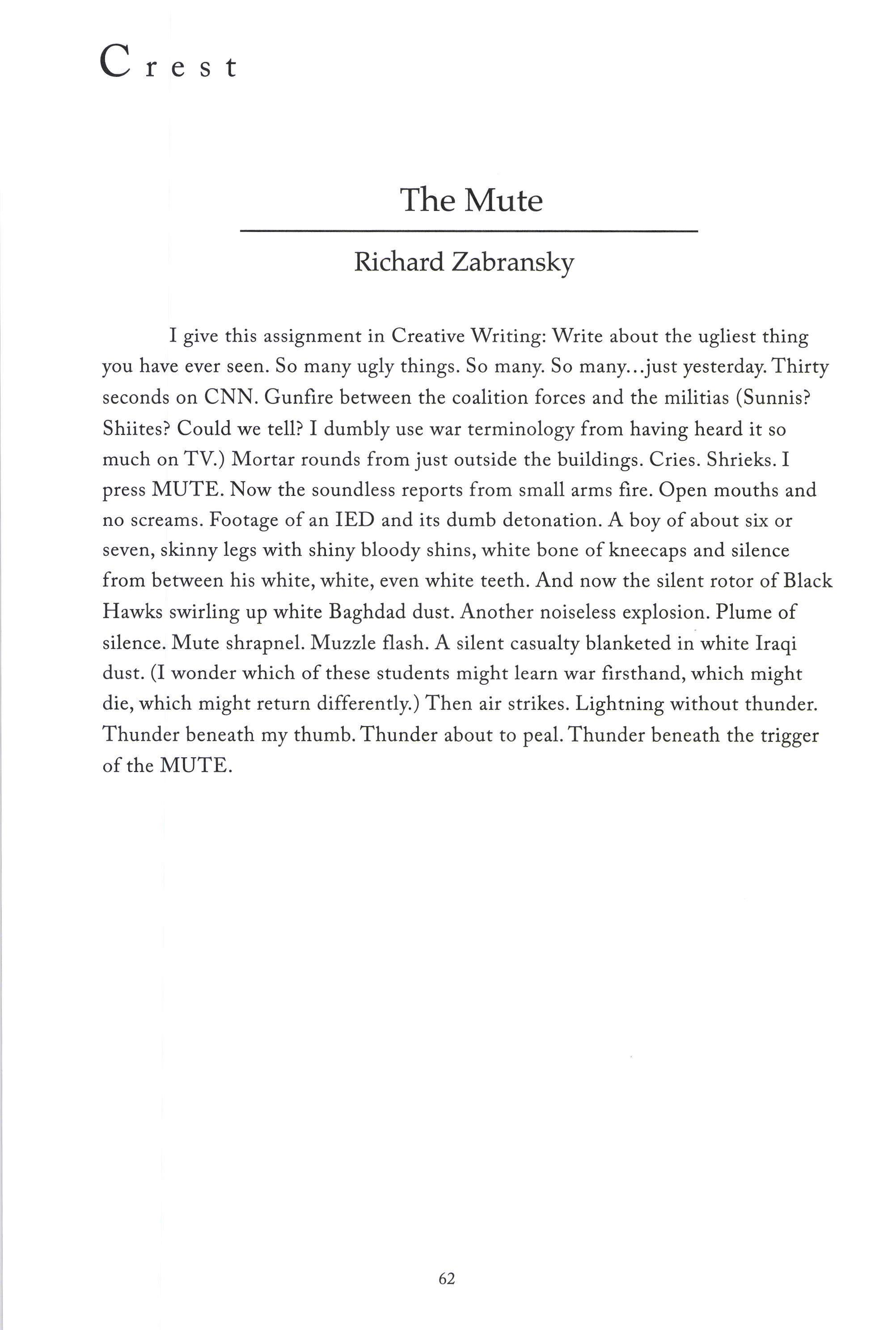
C rest
62
Accident Prone Soldier
Andy Heriaud
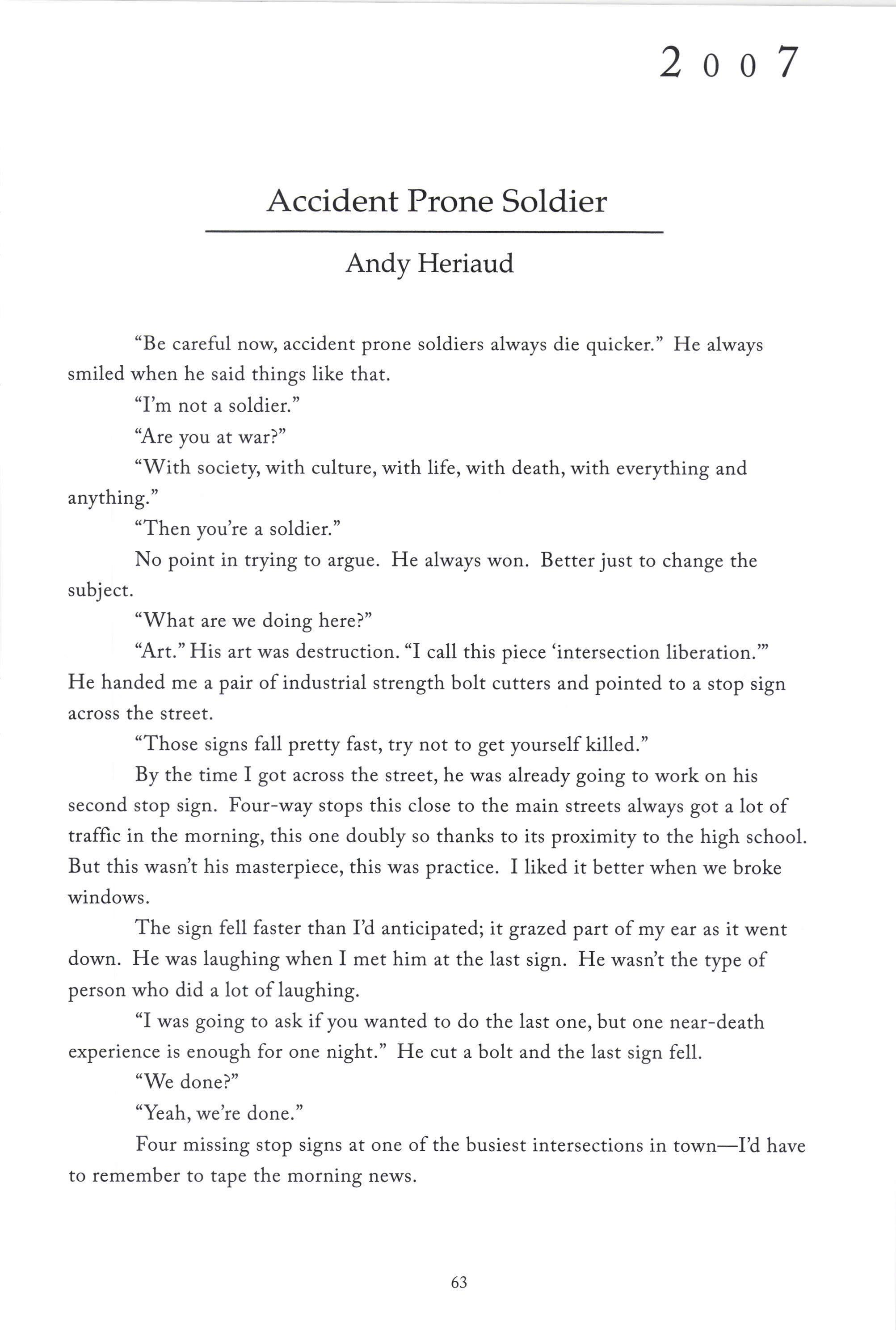
"Be careful now, accident prone soldiers always die quicker." He always smiled when he said things like that.
"I'm not a soldier."
'Are you at war?"
"\Mith society, with culture, with life, with death, with everything and anything."
"Then you're a soldier."
No point in trying to argue. He always won. Better just to change the subject.
"What are we doing here?"
'Art." His art was destruction. "I call this piece 'intersection liberation."' He handed me a pair of industrial strength bolt cutters and pointed to a stop sign across the street.
"Those signs fall pretty fast, try not to get yourself killed."
By the time I got across the street, he was akeady going to work on his second stop sign. Four-way stops this close to the main streets always got a lot of traffic in the morning, this one doubly so thanks to its proximity to the high school. But this wasn't his masterpiece, this was practice. I liked it better when we broke windows.
The sign fell faster than I'd anticipated; it grazed part of my ear as it went down. He was laughing when I met him at the last sign. He wasn't the type of person who did a lot of laughing.
"I was going to ask if you wanted to do the last one, but one near-death experience is enough for one night." He cut a bolt and the last sign fell.
"We done?"
"Yeah, we're done."
Four missing stop signs at one of the busiest intersections in town-I'd have to remember to tape the morning news.
2 o o 7
63
]oel Meyerson
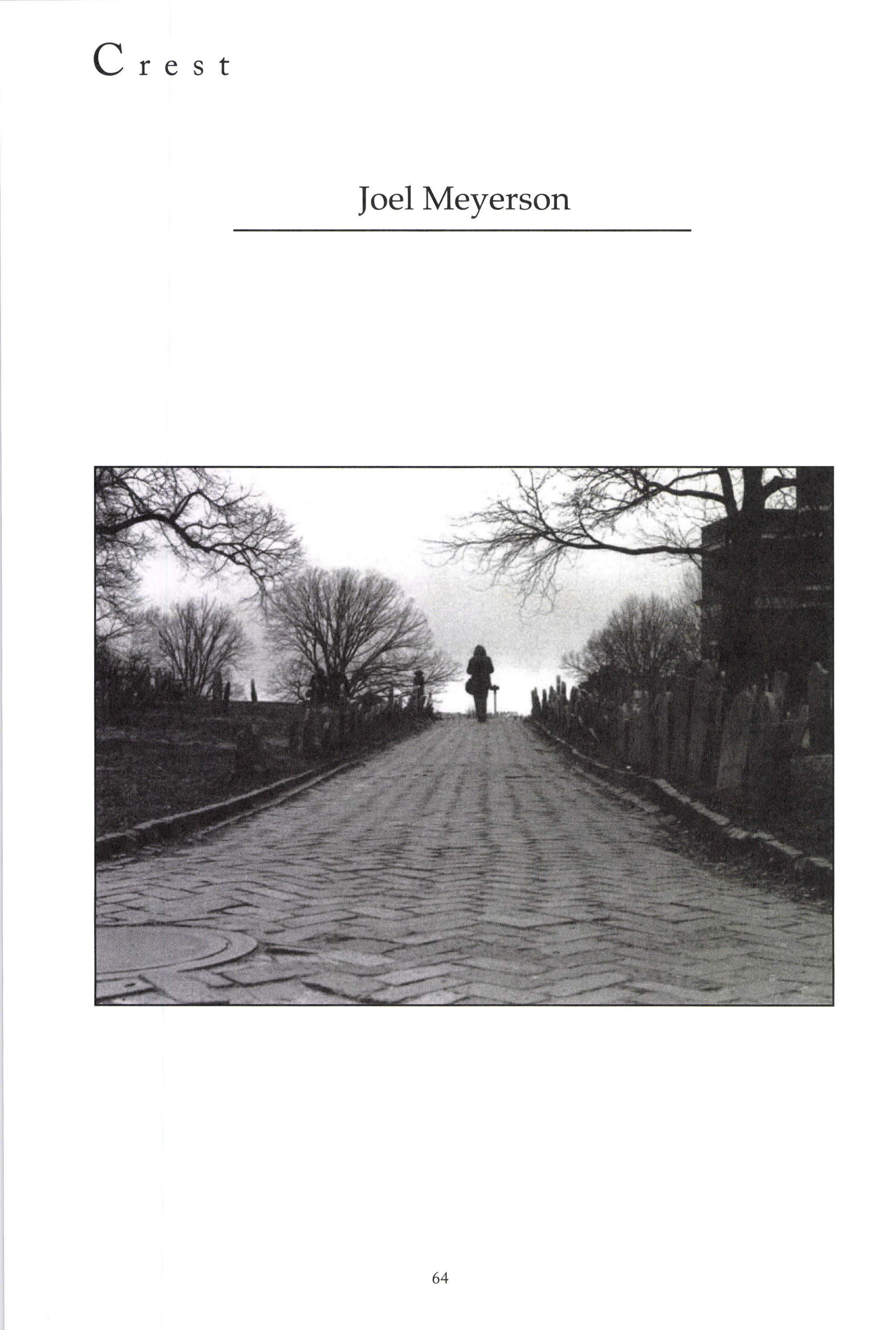
C rest
64
Noah Epstein
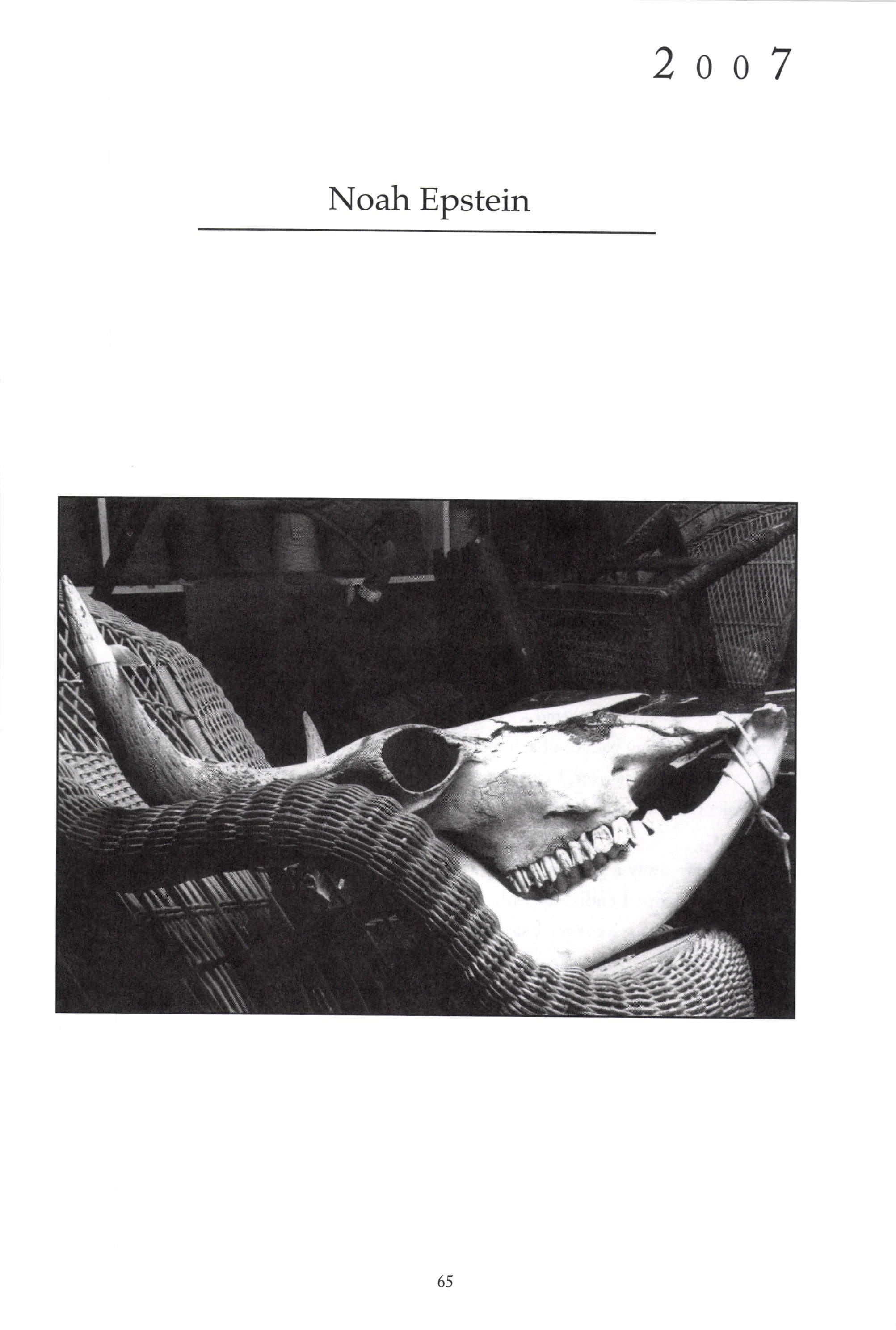
2 o o 7
55
No Artist is Normal
Bethany Kibblesmith
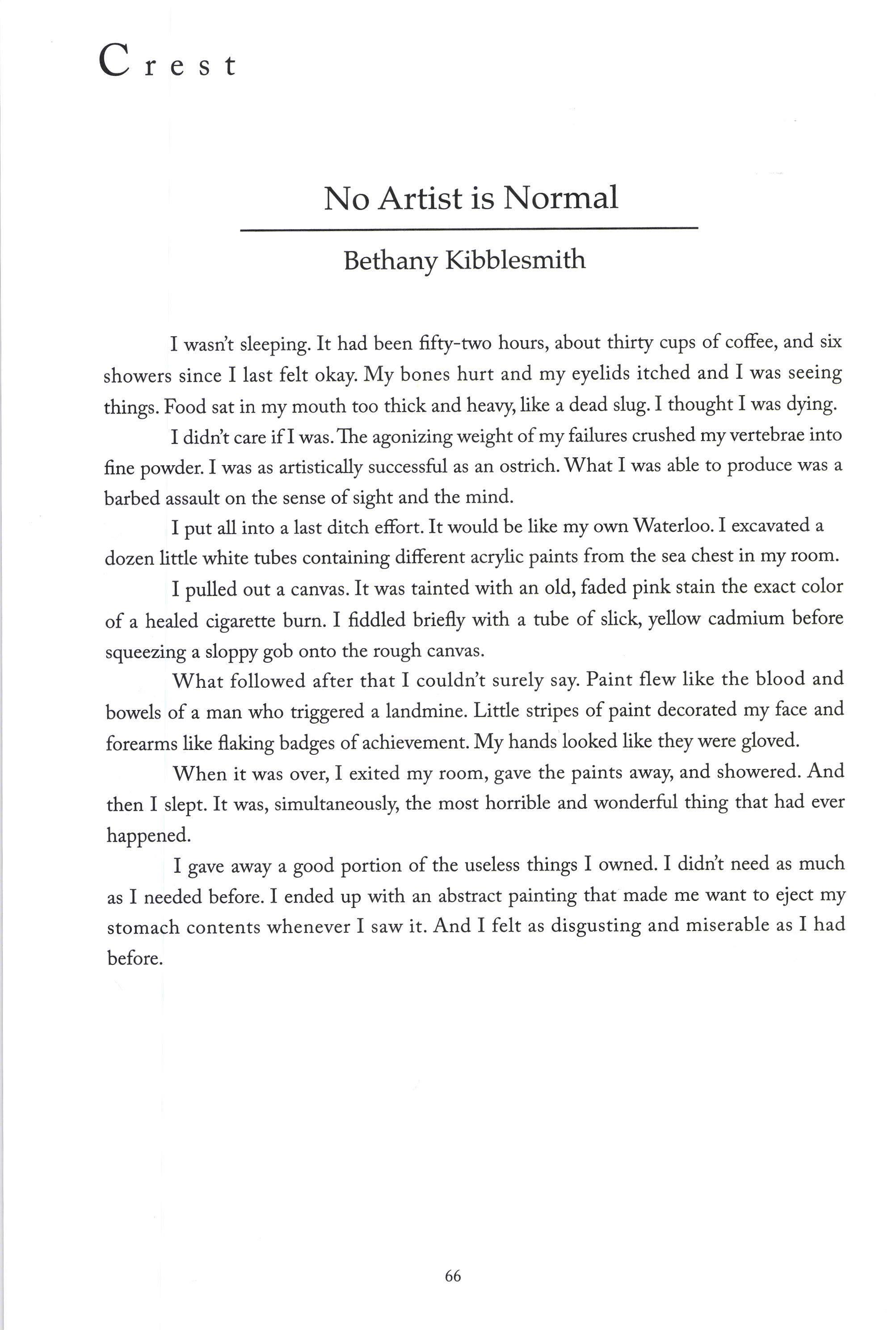
I wasnt sleeping. It had been fifty-two hours, about thirty cups of coffee, and six showers since I last felt okay. My bones hurt and my eyelids itched and I was seeing things. Food sat in my mouth too thick and heavy,like a dead slug.I thought I was dying.
I didnt care if I was. The agonizing weight of my failures crushed my vertebrae into fine powder. I was as artistically successful as an ostrich. What I was able to produce was a barbed assault on the sense of sight and the mind.
I put all into a last ditch effort. It would be like my own Waterloo.I excavated a dozenlittle white tubes containing different acrylic paints from the sea chest in my room.
I pulled out a canvas. It was tainted with an old, faded pink stain the exact color of a healed cigarette burn. I fiddled briefy with a tube of slick, yellow cadmium before squeezing a sloppy gob onto the rough canvas. What followed after that I couldn't surely say. Paint flew like the blood and bowels of a man who triggered a landmine. Litde stripes of paint decorated my face and forearms like flaking badges of achievement. My hands looked like they were gloved. When it was over, I exited my room, gave the paints away, and showered. And then I slept. It was, simultaneously, the most horrible and wonderful thing that had ever happened.
I gave awary a good portion of the useless things I owned. I didnt need as much as I needed before. I ended up with an abstract painting that made me want to eject my stomach contents whenever I saw it. And I felt as disgusting and miserable as I had before.
Crest
66
I Saw TWo Women Kiss
Laura Osterlund
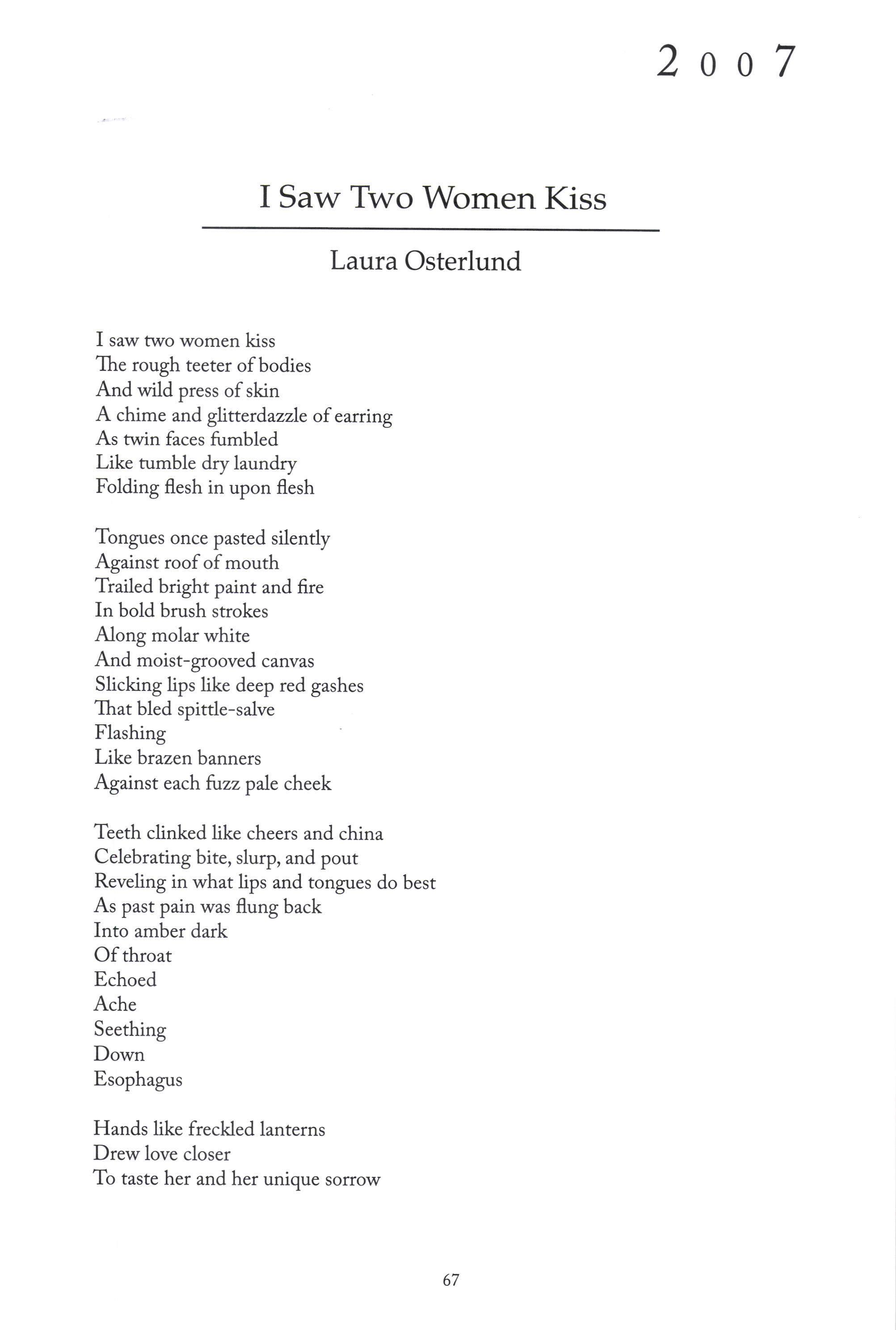
I saw two women kiss The rough teeter ofbodies And wild press of skin A chime and glitterdaz.zle of earring As rwin faces fumbled Like tumble drylaundry Folding flesh in upon flesh
Tongues once pasted silendy Against roof of mouth Tiailed bright paint and fire In bold brush strokes Along molar white And moist-grooved canvas Slicking lips like deep red gashes That bled spitde-salve Flashing Like brazen banners Against each fuz,z pale cheek
Teeth clinked like cheers and china Celebrating bite, sluqp, and pout Reveling in what lips and tongues do best As past pain was flung back Into amber dark Of throat Echoed Ache Seething Down Esophagus
Hands like freckled lanterns Drew love closer To taste her and her unique sorrow
2 o o 7
67
And tear past to pieces
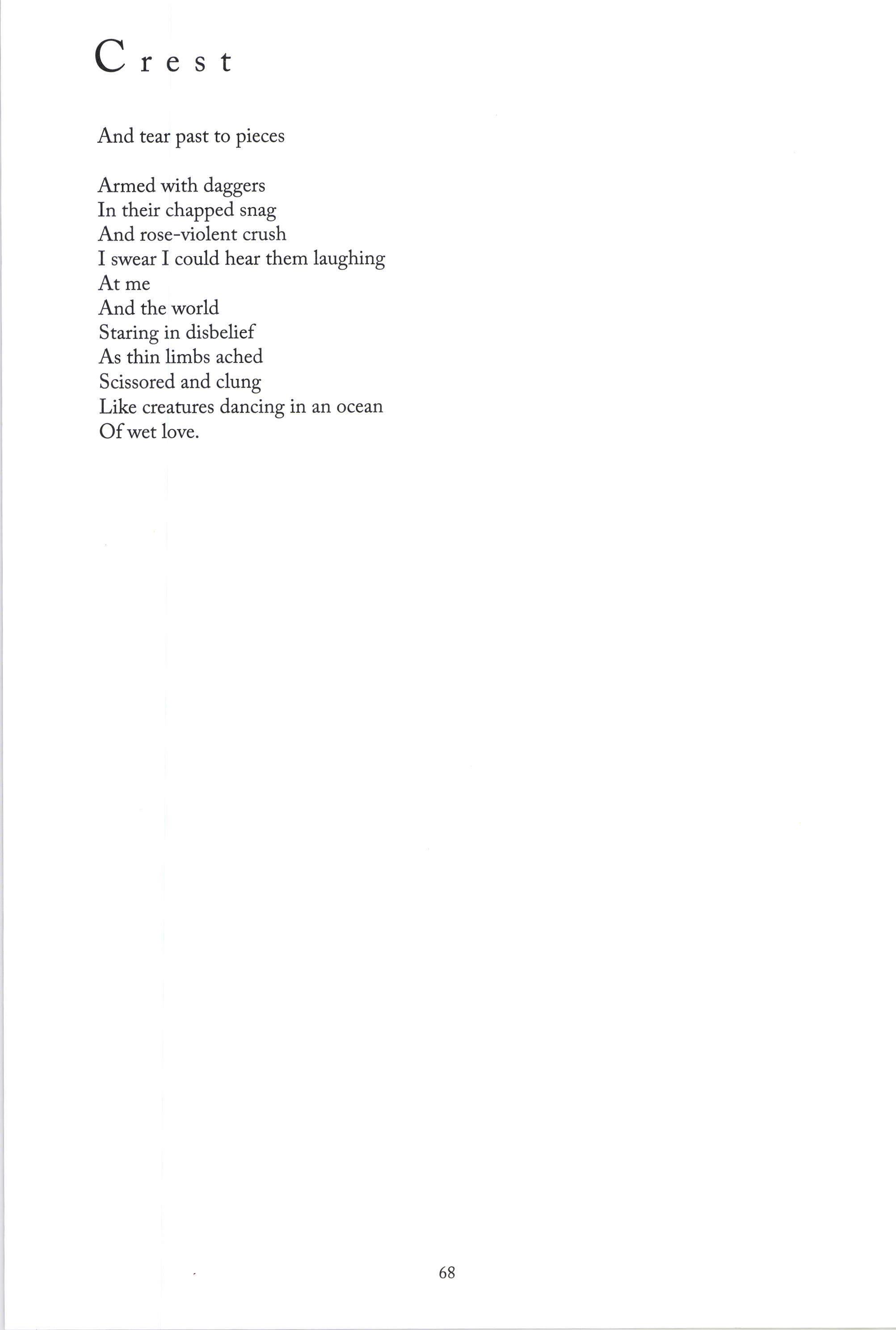
Armed with daggers In their chapped snag And rose-violent crush
I swear I could hear them laughing At me
And the world Staring in disbelief As thin limbs ached Scissored and clung Like creatures dancing in an ocean Ofwet love.
C rest
68
"The Lurking Hint of Kinship"
Anne Kenealy
In 1899,Joseph Conrad wrote Heart ofDarkness, a novella about the civilized journeyman Marlow, who travels down the Congo River into the heart of Africa. As he continues on his expedition, Marlow realizes, in contrast to the physical darkness of the Congo, the moral darkness and blindness of the European man, and of himself Acclaimed author Chinua Achebe harshly criticized Heart ofDarkness in a lecture in 1975,6alling Conrad a "thoroughgoing racist" and arguing that the novella was far from a classic, but rather a bigoted portrait of Africa and the African people. However, at the close of the novella, Conrad has also devalued the premises of European culture as well and proves himself not simply prejudiced against the African people.Joseph Conrad emphasizes the failings of both African and European society in Heart of Darknessand, thus, comments upon humanity as a whole by using the African Congo as a backdrop to societal conflict. Chinua Achebe protests Conrad's use of the African continent as an uncomplicated setting for one European man's development. Achebe said in his lecture at the University of Massachusetts in 7975:
Heart ofDarkness projects the image of Africa as 'the other world,'the antithesis of Europe and therefore of civilization, a place where man's vaunted intelligence and refinement are finally mocked by triumphant bestiality.
He also spoke of Conrad's comparisons of the African and the European, saying that Heart ofDarkaess'focus was not on the differences between the naro peoples, but on the haunting similarities, those little "hint[s] of kinship".
However, in a disparate essay by C.P. Sarvan, the author questions Marlow's relationship to Conrad. While Achebe assumes that Conrad uses Marlow as a vehicle to exPress Conrad's racism, Saravan asserts that because Heart of Darkness is a story within a story with both Marlow and a shadowy shipmate telling stories, it cannot be assumed that Marlow is a reflection ofJoseph Conrad's personal views. To this Achebe counters: But if Conrad's intention is to draw a cordon sanitaire between himself and the moral and psychologicd, malaise of his narrator, his care seems to me totally wasted because he neglects to hint, clearly and adequately, at an alternative frame of reference by which we may judge the actions and opinions of his characters. It would
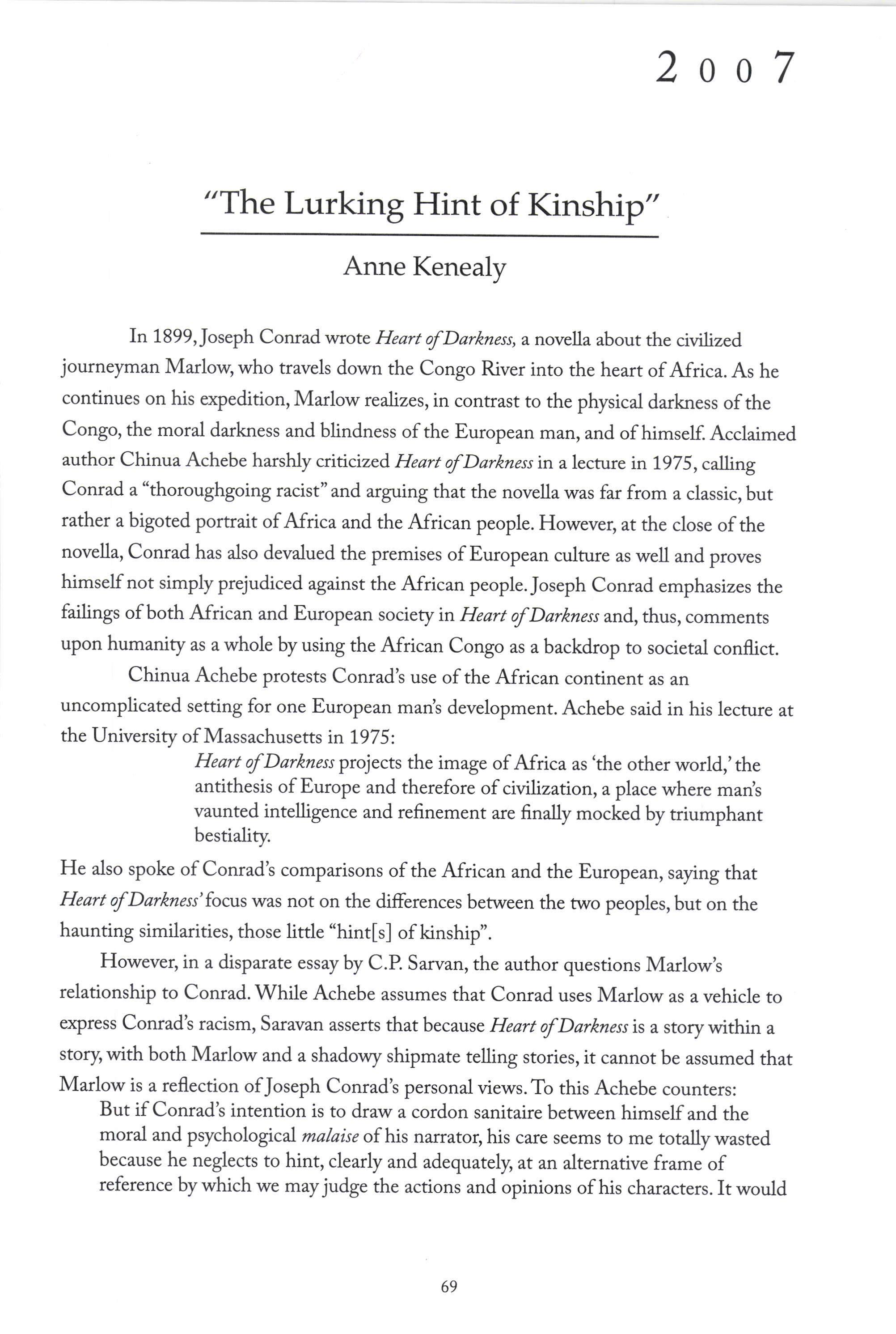
2 o o 7
69
not have been beyond Conrad's power to make that provision if he had thought it necessary. Conrad seems to me to approve of Marlow, with only minor reservations... a fact reinforced by the similarities between their two careers. However, Achebe's argument has little support, and Sarvan's unbiased article makes better claims for an argument of Conrad's disapproval of humanity as a whole. Thus, Achebe's main argument is summarlruedwith an eloquent comparison to another "hteraty classic.""Africa is to Europe as the picture is to Dorian Gray-a carrier on to whom the master unloads his physical and moral deformities so that he may go forward, erect and immaculate."
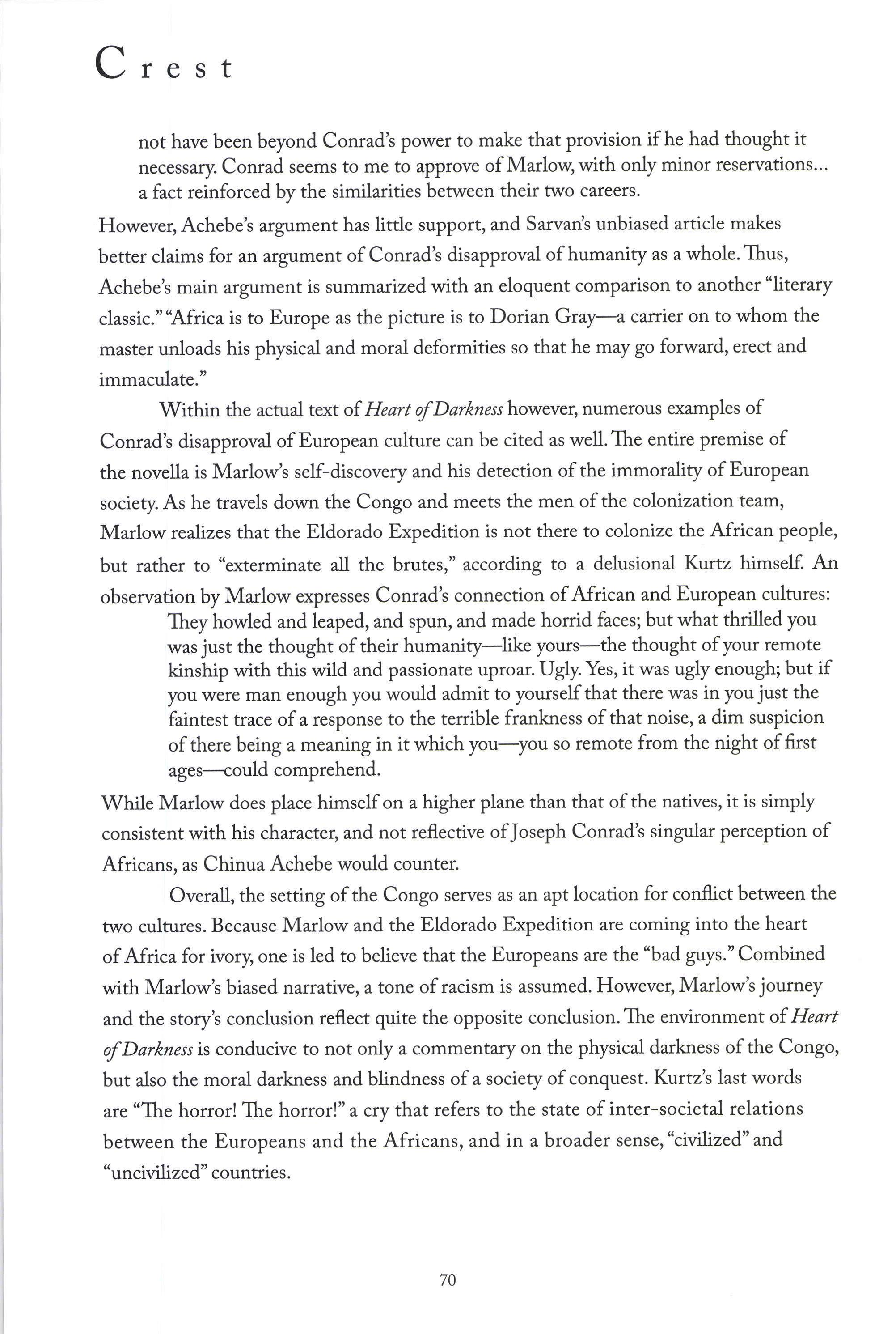
Within the actual text of Heart of Darkness however, numerous examples of Conrad's disapproval of European culture can be cited as well. The entire premise of the novella is Marlow's self-discovery and his detection of the immorality of European society. As he travels down the Congo and meets the men of the colonization team, Marlow rea)tzes that the Eldorado Expedition is not there to colonize the African people, but rather to "exterminate all the brutes," according to a delusional Kurtz himself An observation by Marlow expresses Conrad's connection of African and European cultures: They howled and leaped, and spun, and made horrid faces; but what thrilled you was just the thought of their humanity-like yours-the thought ofyour remote kinship with this wild and passionate uproar. Ugly. Yes, it was ugly enough; but if you were man enough you would admit to yourself that there was in you just the faintest trace ofaresponse to the terrible frankness ofthat noise, a dim suspicion of there being a meaning in it which you-you so remote from the night of first ages-could comprehend.
While Marlow does place himself on a higher plane than that of the natives, it is simply consistent with his character, and not reflective ofJoseph Conrad's singular percePtion of Africans, as Chinua Achebe would counter.
Overall, the setting of the Congo serves as an apt location for confict between the two cultures. Because Marlow and the Eldorado Expedition are coming into the heart of Africa for ivory, one is led to believe that the Europeans are the "bad guys." Combined with Marlow's biased narrative, a tone of racism is assumed. Howeveq Marlowt journey and the story's conclusion reflect quite the opposite conclusion. The environment of Heart of Darkness is conducive to not only a commentary on the physical darkness of the Congo, but also the moral darkness and blindness of a society of conquest. Kurtz's last words are "The horror! The horror!" a cry that refers to the state of inter-societal relations between the Europeans and the Africans, and in a broader sense, "civilized" and "uncivilized" countries.
C rest
70
Thus,with the African Congo providing a means towards conflict,Joseph Conrad is able to effectively comment upon the poor condition of humanity's interactions through the Africans and the Europeans. While Chinua Achebe maintains that Heart of Darkness is a racist text, there are also numerous oramples of Conrad's reproachful Portrayals of Europeans, which allows for a mediating conclusion that Conrad frowned upon societal relations as a whole.
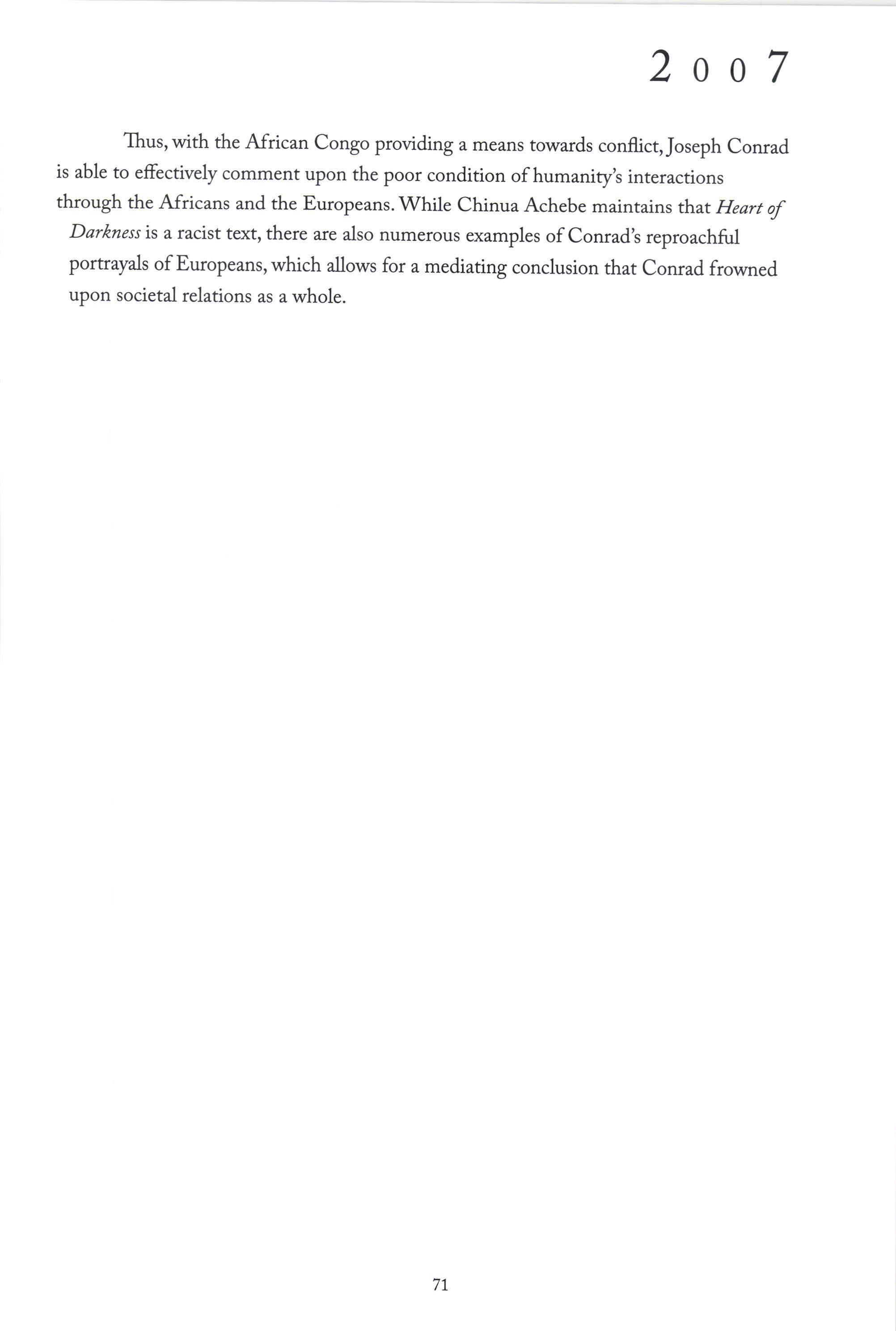
2oo7
77
"The End of Something"
Stephanie Sam
In Ernest Hemingway's "The End of Something,"the removal of the most basic elements of any system results in change and even destruction. Hortons Bay used to be a lumbering town, yet when "there were no more logs to make lumber" and the "big mill building had all its machinery that was removable taken out," the town became nothing but deserted. Similarly, Nick and Marjorie's relationship previously had what relationships require to survive, but lost it.The couple appears to have been bonded together by agreement, fun love, and intimacy. However, as their relationship loses the fuel that made it what it initially was, it becomes nothing, just like the "broken white limestone of fthe mill's] foundations." Nick and Marjorie are forced to perceive the differing views each one have on their relationship, which eventually ends as the mill had done ten years earlier. Thus, annihilation results when the characteristics that makes anything unique, whether a mill or a relationship, is removed, for it needs fuel to maintain what it originallywas. Nick and Marjorie are fishing along the shore near the old m ill that long ago was Hortons Bay.They admire the ruins of the mill, when Marjorie says "it seems more like a castle." However, Nick does not agree when he keeps silent, and instead, changes the subject to how the fish are not striking. Moreover, there is distance on Niclis part. When a "trout lbreaks] water, feeding."Marjorie confums that they are feeding, but Nick responds by sapng that they will not strike.In addition, Marjorie "[is] intent on the rod...even when she [talks]" because "she [oves] to fish with Nick" On the contrary, it is not evident that Nick likes to fish with her, considering the fact that he appears to have a pessimistic attitude towards Marjorie and fishing altogether.They do not have the "logs"to keep their relationship moving. Another example of the discord in their relationship is when Nick pulls up a bucket of perch and catches three to cut their heads offand skin them while Marjorie catches only one. Nick criticizes her for taking the ventral fin out. Afterwards, Marjorie senses something is wrong and asks Nick, "What's the matter?" He claims he does not know, but at that moment, it is apparent their relationship will be ending considering the fact that Nick withholds by asserting he does not knowwhat is troubling him.Their relationship now lacks honesty as well. Nick claims he is not hungry and onlywhen Marjorie persuades him to, does
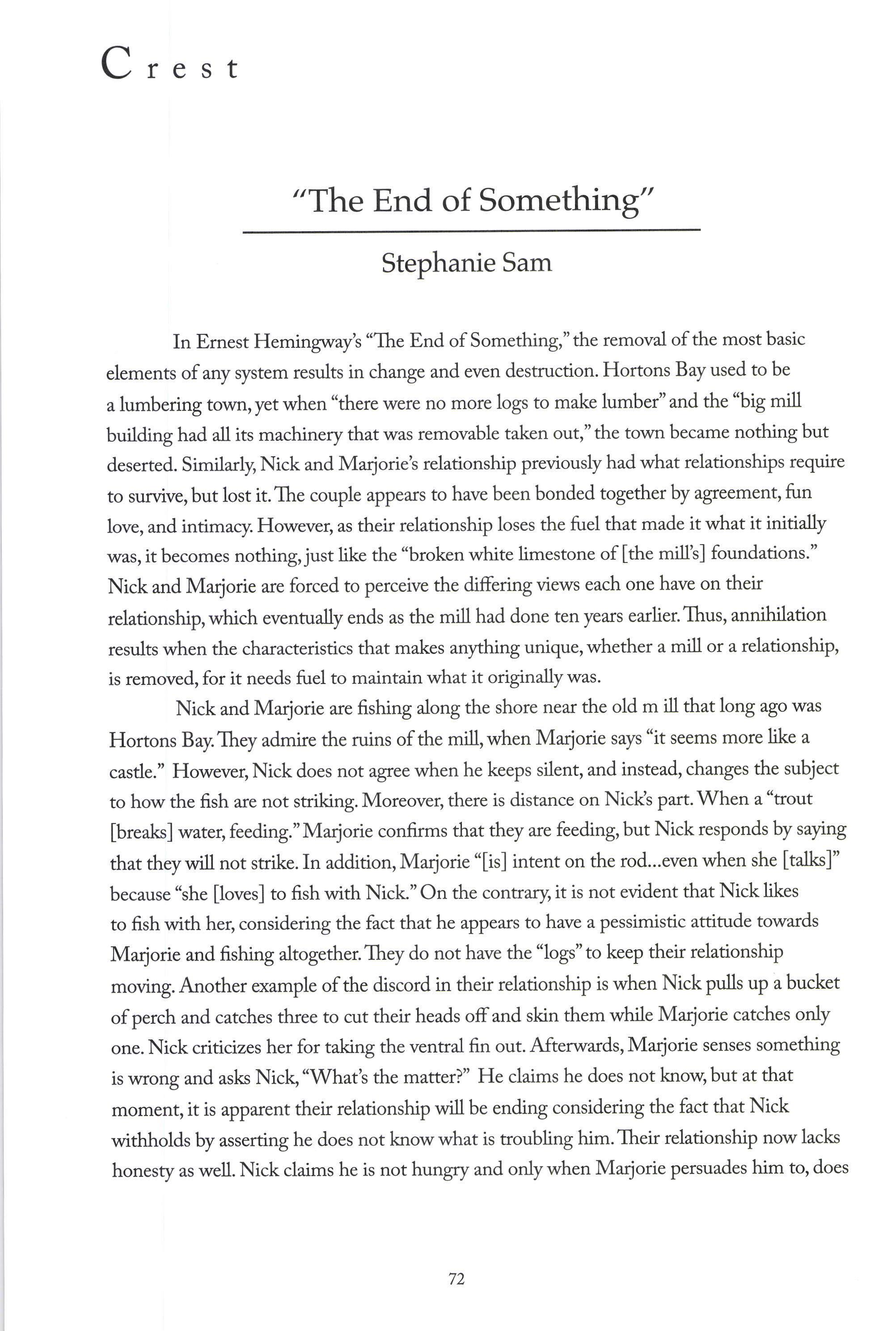
C rest
7'.)
he decide to eat. Nevertheless, the two "[eat] without talking" and they "[sit] on the blanket without touching each other,"emphasizing the lack of intimary and suggesting the end of their relationship.
After Nick "[knows] the moon [is] coming up," he informs Marjorie that "there is going to be a moon."Marjorie excitedly explains she already knows it, but Nick bursts and argues she knows everything and that she is knowledgeable of the fact that she knows all. Perhaps when he claims that he taught everything to her, he is implying that she did not know as much before she met him, and that he realizes the upbringing of Marjorie's intelligence was his doing. Over time, one of the factors that appears to have made love fun for Nick,which was perhaps his superiority over Marjorie, disappeared.In a way, Nick appears to be jealous that his girlfriend is knowledgeable about everything he knows and is discouraged by her assertiveness. He implies love is not fun for him when he is dating a girl who is equal to him. Moreover, when Nick asks, "what dorit you know, anyway," it is as if he is competing with her in the pursuit of knowledge. Nick also adds that Marjorie's knowing everything is the trouble, indicating that this dilemma has been botded up in him,which explains why he planned the breakup with his friend, Bill. Clearly, the fact that his girlfriend has reached a level where she is an equal has been bothering Nick In short, he desires dominance,which is no longer present in their relationship. Marjorie obviously disagrees for she changes the subject as Nick had done. She evidently misunderstands the seriousness of Nicks accusations for she once again repeats her question concerning the real problem with him and tells him he does not "have to talk silly."Eventually, Nick reveals love "isnt fun anymore." Obviously, an intimate relationship will not suwive where there is not mutual love. He adds he "[feels] as though everything [has] gone to hell inside of [him]," indicating his disheartened view towards their relationship. In response, Marjorie asks, "isrit love any fun?" suggesting that she is attempting to understand exacdywhat Nick is saying, bur cannot make it out.The two have lost their understanding of the other's views as their companionship deteriorates.
In Ernest Hemingway's "The End of Something,"the destruction of Hortons Bay's mill and Nick and Marjorie's relationship is the result of the elimination of the characteristics that made each what it was.The lack of logs and machinery "that had made the mill a mill" left behind a deserted location with no common features as the original mill.The removal of compliance, fun love, honesty, and inequality in Marjorie and Nick's love relationship results in its ultimate end. As with the mill and the lack of logs, the lack of fun for Nick ends his relationship with Marjorie. And leaves two people with broken hearts.
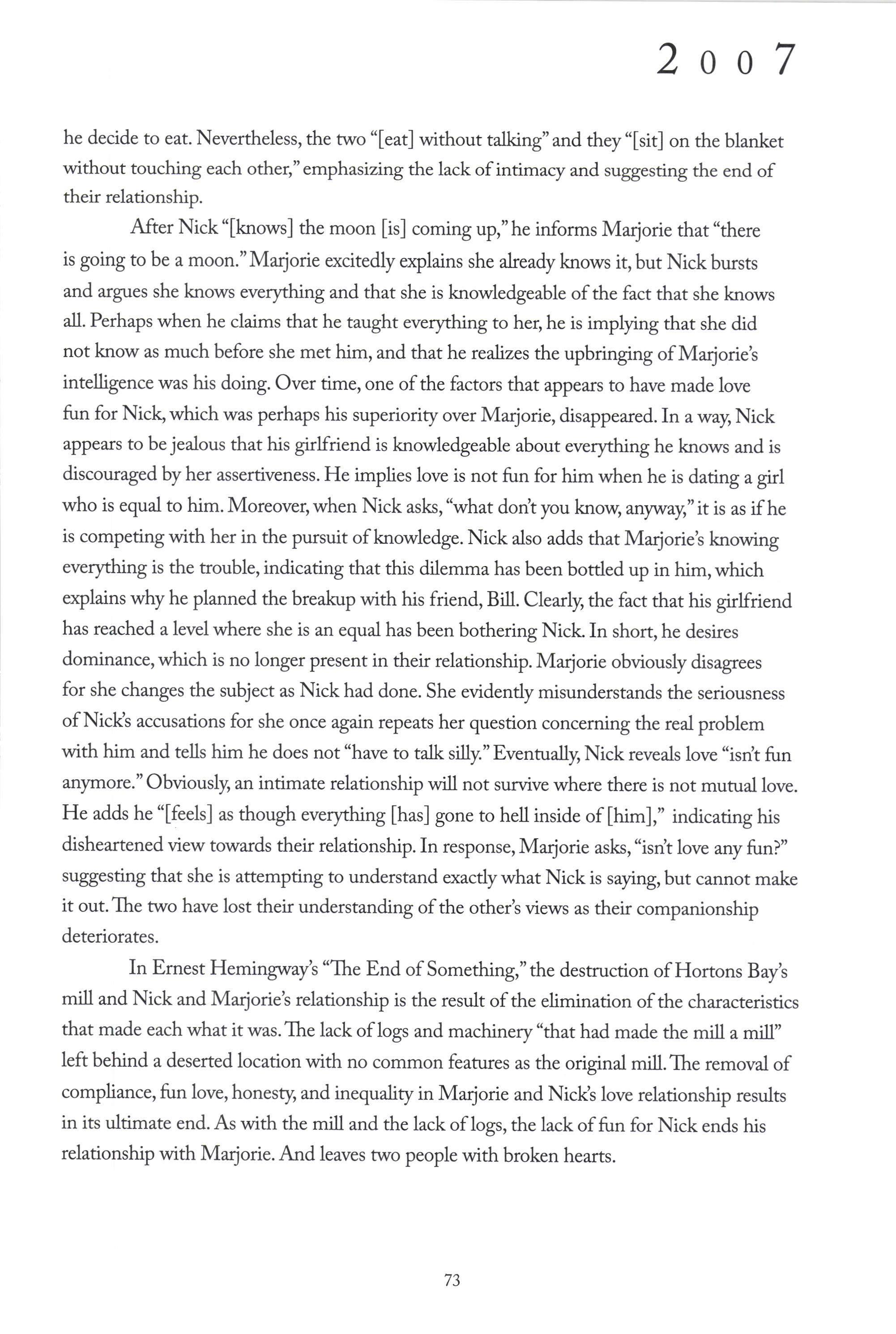
2oo7
73
Salvation
]ohanna Strouse
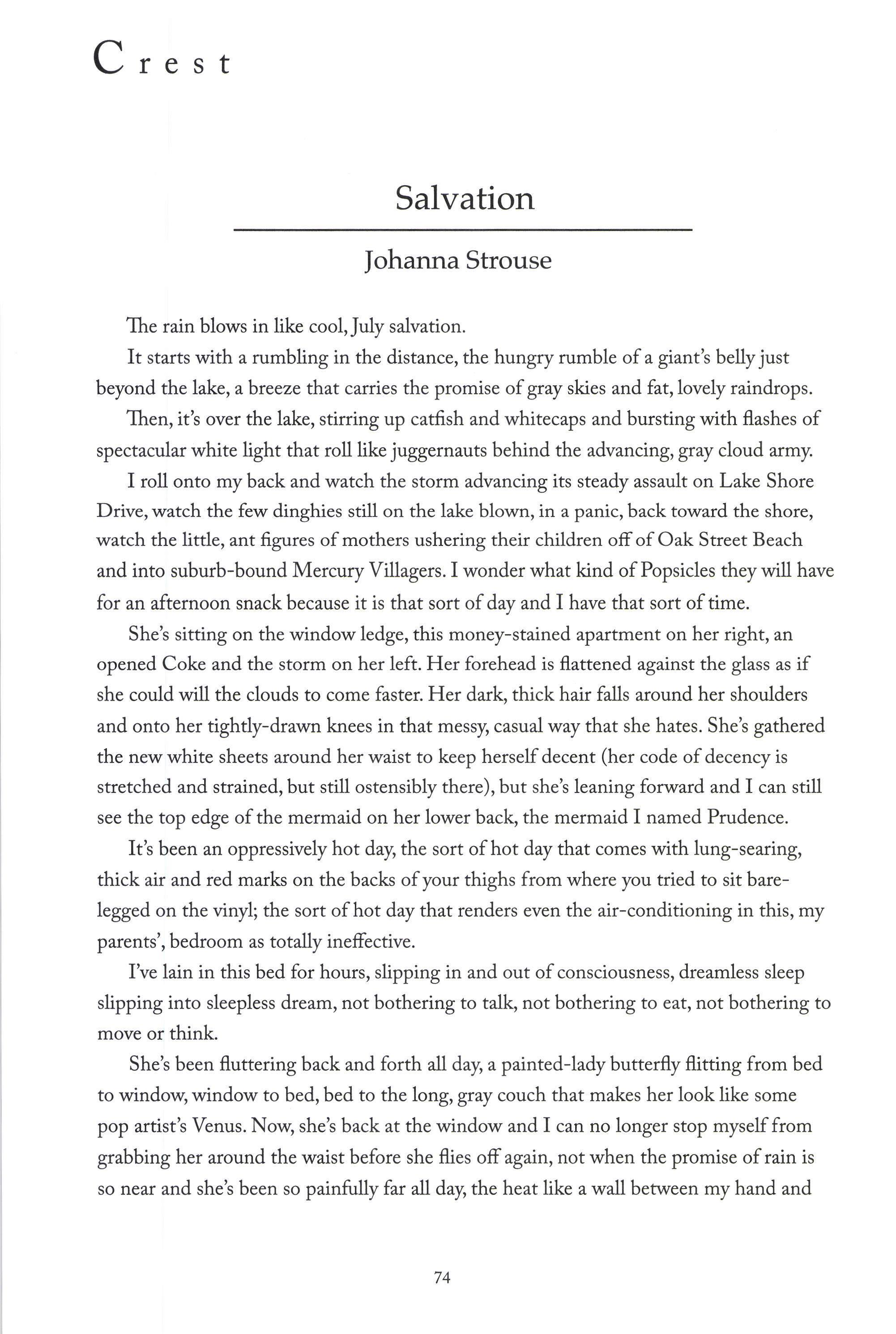
The rain blows in like cool,July salvation.
It starts with a rumbling in the distance, the hungry rumble of a giant's belly just beyond the lake, abreeze that carries the promise of gray skies and fat,lovely raindrops.
Then, it's over the lake, stirring up catfish and whitecaps and bursting with flashes of spectacular white light that ro11 like juggernauts behind the advancin g, ffay cloud army. I ro11 onto my back and watch the storm advancing its steady assault on Lake Shore Drive, watch the few dinghies still on the lake blown, in a panic, back toward the shore, watch the litde, ant figures of mothers ushering their children offof Oak Street Beach and into suburb-bound Mercury Villagers.I wonder what kind of Popsicles theywill have for an afternoon snack because it is that sort of dry and I have that sort of time.
She's sitting on the window ledge, this money-stained apartment on her right, an opened Coke and the storm on her left. Her forehead is flattened against the glass as if she could will the clouds to come faster. Her dark, thick hair falls around her shoulders and onto her tighdy-drawn knees in that messy, casual way that she hates. She's gathered the new white sheets around her waist to keep herself decent (her code of decency is stretched and strained, but still ostensibly there), but she's leaning forward and I can still see the top edge of the mermaid on her lower back, the mermaid I named Prudence.
It's been an oppressively hot day, the sort of hot day that comes with lung-searing, thick air and red marks on the backs of your thighs from where you tried to sit barelegged on the vinyl; the sort of hot day that renders even the air-conditioning in this, my parents', bedroom as totally ineffective.
I ve lain in this bed for hours, slipping in and out of consciousness, dreamless sleep slipping into sleepless dream, not bothering to talh not bothering to eat, not bothering to move or think.
She's been fluttering back and forth all day, a painted{ady butterfly flitting from bed to window; window to bed, bed to the long, gray couch that makes her look like some pop artist's Venus. Now, she's back at the window and I can no longer stop myself from grabbing her around the waist before she fies offagain, not when the promise of rain is so near and she's been so painfully far ail. day,the heat like a wall between my hand and
C rest
74
the small of her back, my lips and the curve of her clavicle when she spread out beside me at the sun's peak.
I crawl towards her across the sea of tangled, ivory sheets, snake my arm over her soft stomach and pull her back on top of me away from her window vigil. She doesnt protest, only slumps against my offense and allows herself to be pulled backwards, back to rumpled linen and the cool underside of an abandoned pillow.
M"yb. if it were cooler she would have made any noise at all just to let me think Id actually surprised her. But it is not cooler weather, and instead, she rolls off of me and onto her stomach, turning her face back toward the clouds.In return for my trouble I receive a face-full of dark, wavy hair that smells like the citrusy conditioner she left in the shower yesterday morning, the conditioner my father was very confused to discover next to his aftershave.
I might feel spurned, knowing that she would rather watch the rain, but I know enough by now to appreciate the warmth of her back under my raindrop-light fingertips as I shift onto my side and fit my face into the perfect corner where her neck meets her sun-colored shoulders.
My fingers paint invisible masterpieces on her back, her side, the curve of her jaw.
The rain pitches dark, pretty waves against the white shore below.
She brings her knees to her chest again, so slowly and naturally that she may not notice she's doing it at all, and relaxes back into me. I can feel her heart, her breathing, her toes tangling and untangling in the disordered pile ofsheets beneath her feet.The freckles on her shoulders spell out constellations and declarations of similar days spent by a jewelcolored pool.
My breath on her neck makes the short hairs at its nape dance in waving, gentle bursts of motion that probably tickle more than she would ever admit.
Her fingers fit like five keys into the spaces between mine, unlocking something warm and finzy right behind my belly button, a fisherman's hook dragging me deeper into the citrus-scented crook where her neck meets the constellations on her shoulders.
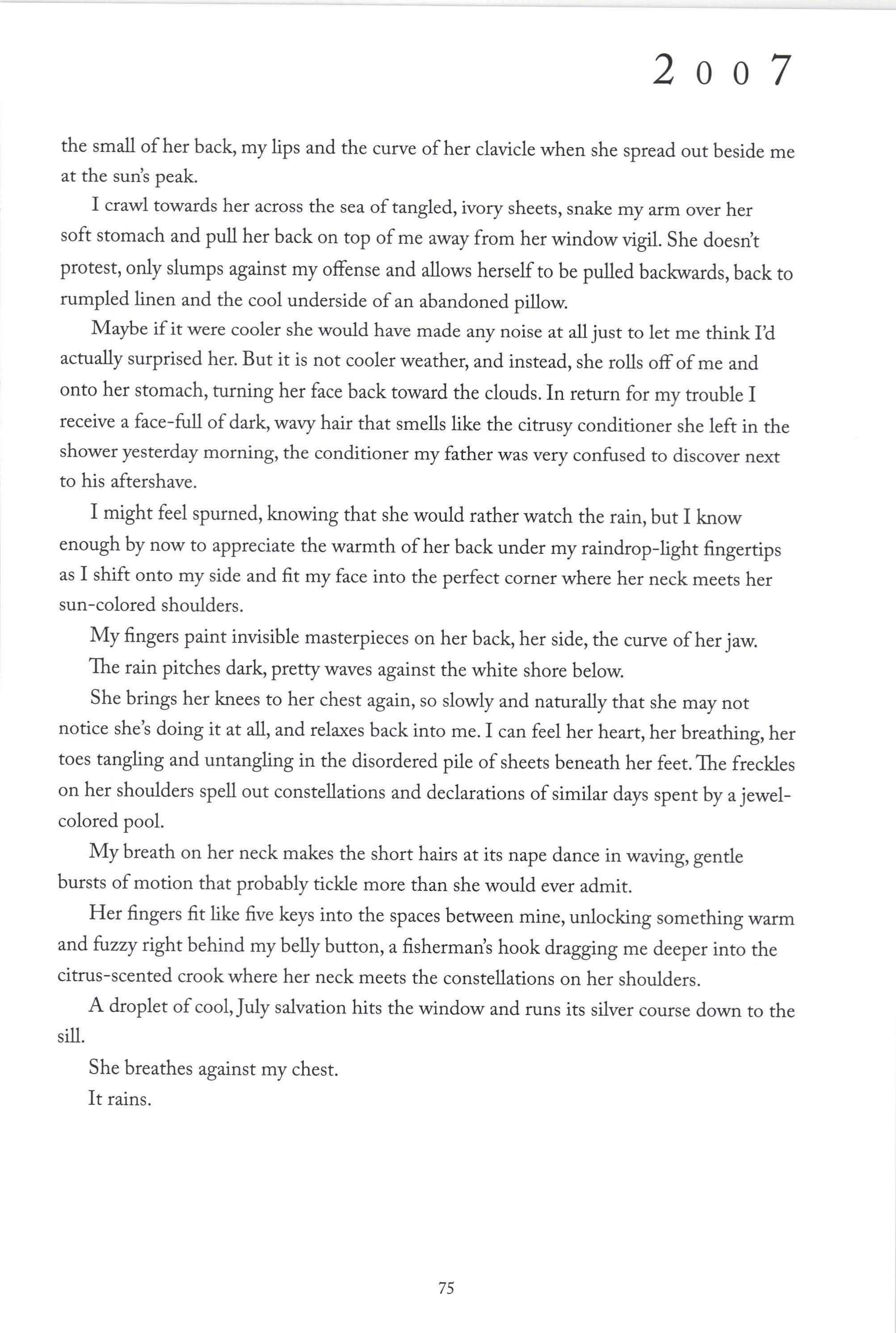
A droplet of cool,July salvation hits the window and runs its silver course down to the sill.
She breathes against my chest.
It rains.
2oo7
75
God's Small Things
Natalya Carrico
The house clicked Soft and ready Into dark. Dim blue seeped Through glass panes, Flooded empty rooms, Curled around two Tired bodies Like a silken cocoon.
For the fust time, Night heldThem Alone And GiddyThey breathed in The silver of the moon, Laughed stars onto the ceiling, And whispered Secrets That floated and setded like smoke.
Her hair (in his hands, though his fingers) Flowed like whale songs In deep blue. Her hands, her fingers (in his hair)
Bowed before the flames; messengers In rows of five Prayed with night-burdened thoughts. (Their voices crumbled the silence and slid through cracks.) Then diving into The dark blasphemy of a drowning cry (awishing
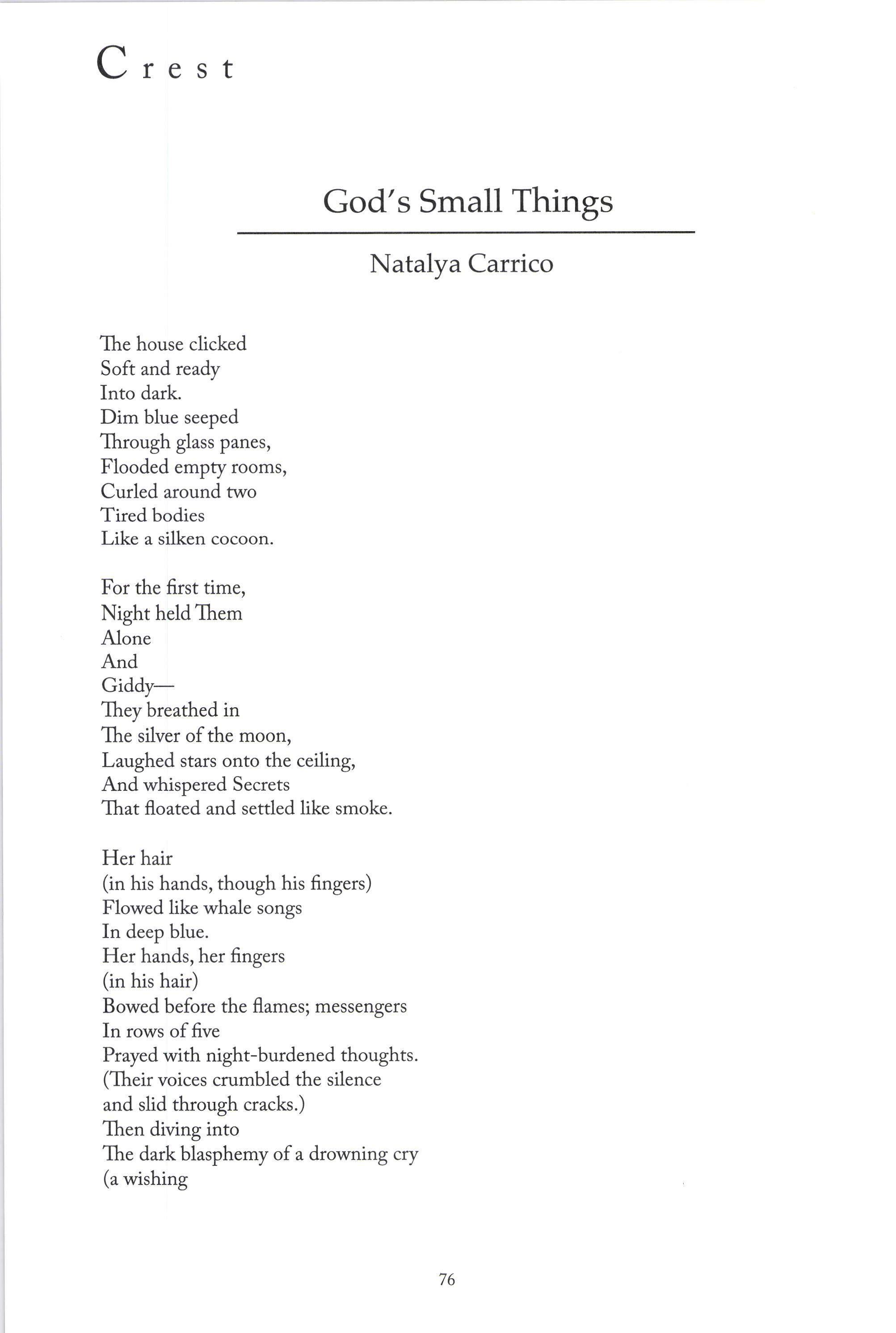
C rest
76
aching moment)-
the silence shuttered as His flames consumed cocoon and Her
Fearfirl fesh Swam in a sea Of sounds Clutched by a silverblue promise Writhing in the dark
He didnt speak With words As she begged the messengers To pray harder (*rybe god would lift them up) She left behind her charred body Though she could still taste The silence burned along her throat.
He rose like a night-bloom (satiated to embers) in her red hat that she had offered him with trembling hands. The gurgling Br:zing House-belly Spat him out Up.
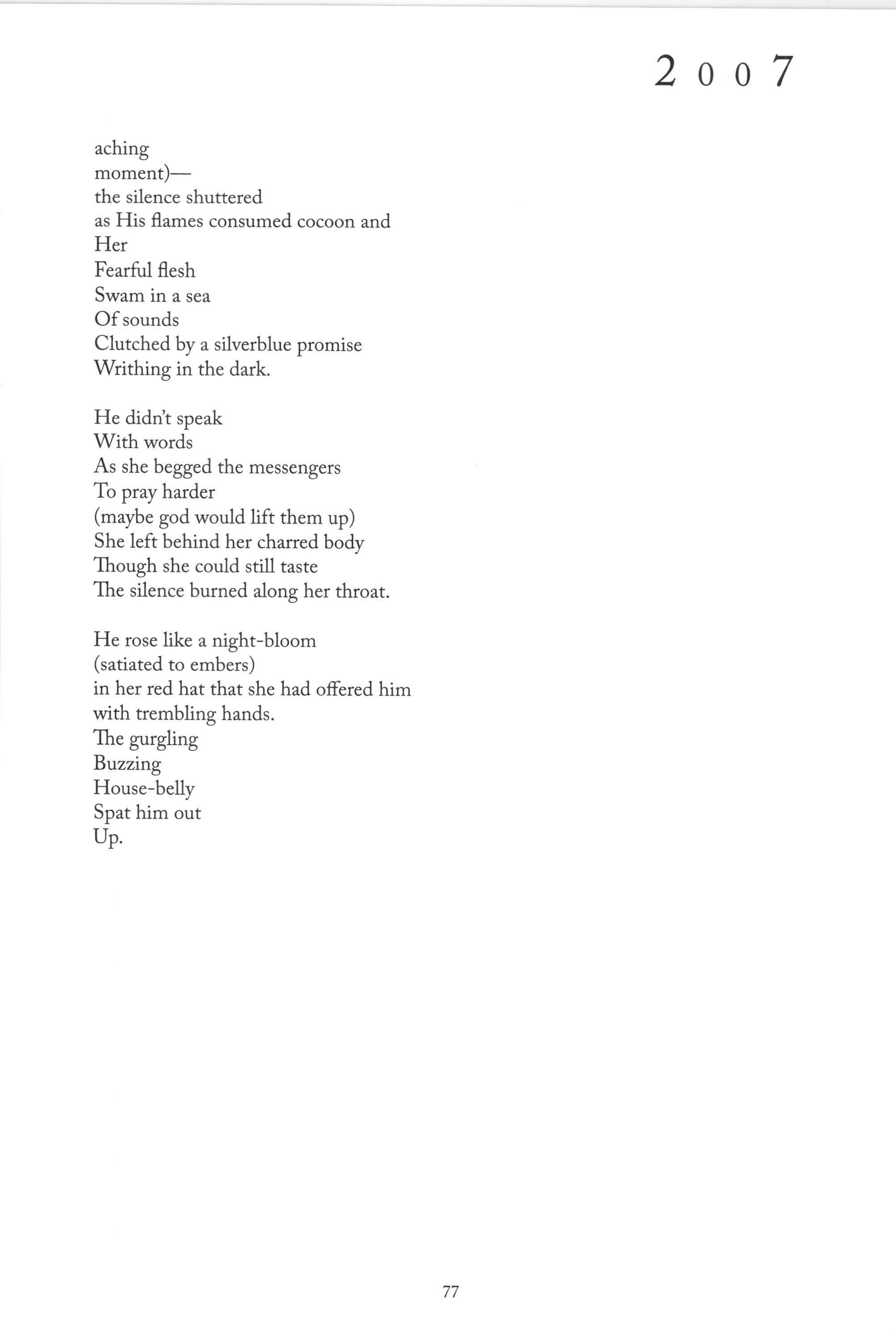
2 o o 7
77
Before You Meet My Father
Matt Brown
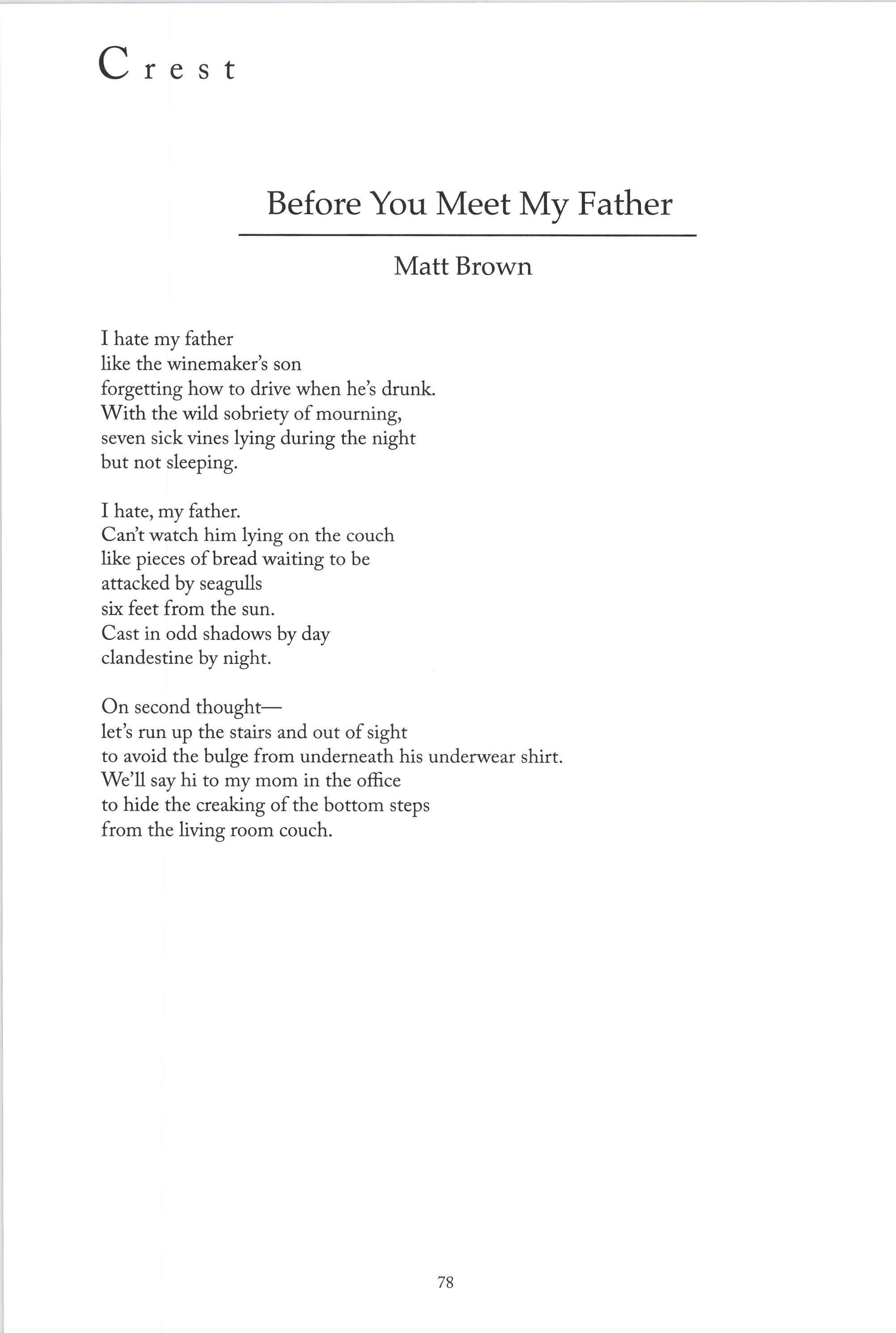
I hate my father like the winemaker's son forgetting how to drive when he's drunk. With the wild sobriety of mourning, seven sick vines lying during the night but not sleeping.
I hate, my father. Cantwatch him lying on the couch like pieces of bread waiting to be attacked by seagulls six feet from the sun. Cast in odd shadows by day clandestine by night.
On second thoughtlet's run up the stairs and out of sight to avoid the bulge from underneath his underwear shirt. We'll sayhi to mymom in the office to hide the creaking of the bottom steps from the living room couch.
C rest
78
'92: When Chicago's ]aw Dropped Adam Levin
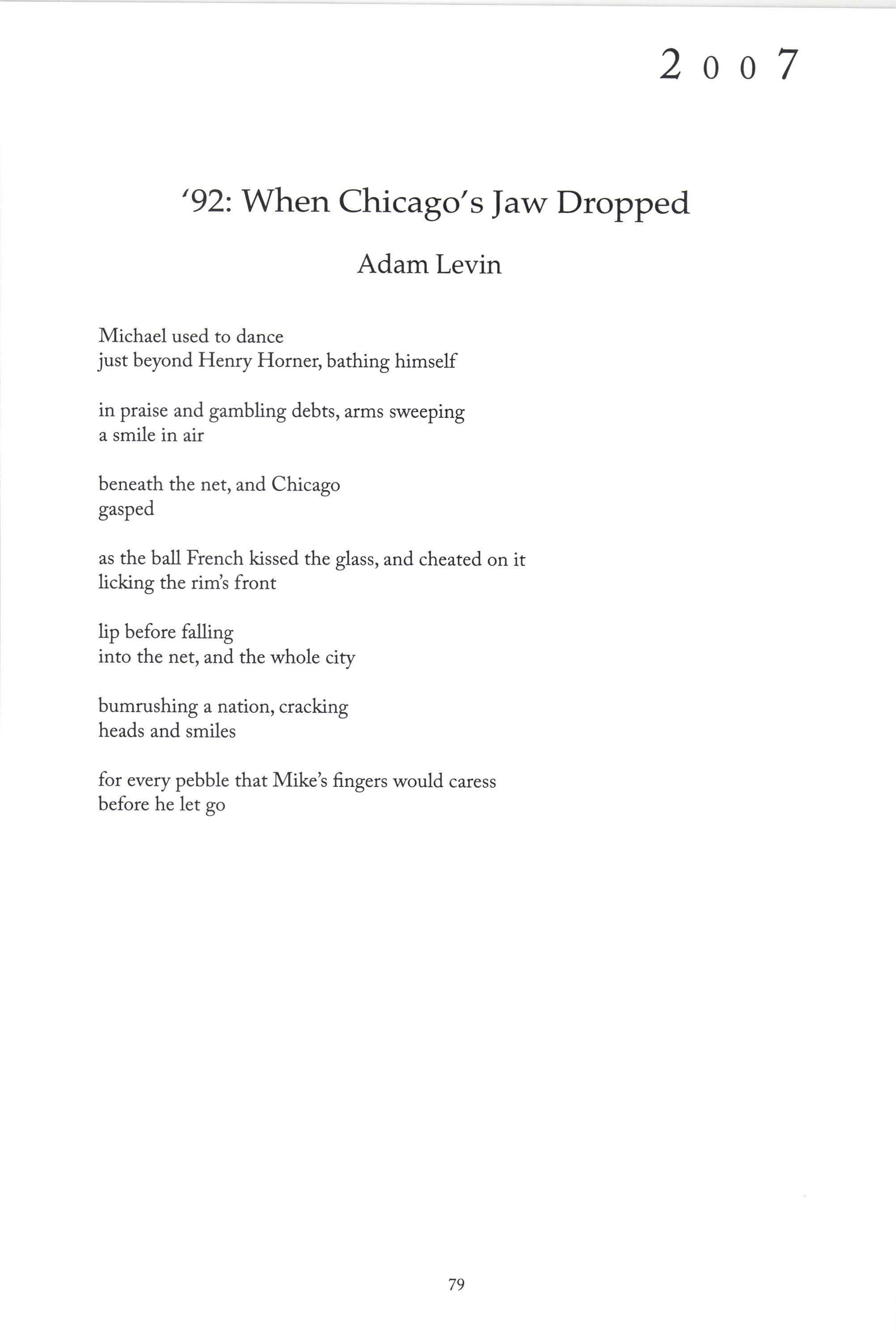
Michael used to dance just beyond Henry Horner, bathing himself in praise and gambling debts, arms sweeping a smile in air beneath the net, and Chicago gasped as the bdl French kissed the glass, and cheated on it licking the rim's front
Iip before falling into the net, and the whole city bumrushing a nation, cracking heads and smiles for every pebble that Mike's fingers would caress before he let go
2 o o 7
79
Expectations
Emily Smith
(Ongwoman, Emily, sire atabar alone. Bartender enters from behind the bar and almost looks over the fact that anyone is there and starts to wipe glasses. Enter Ctu-isty in a long black coat and sits neirt to Emily.Though neither of them seems to notice each other both seem comforcable. Ctuisty ukes out a book of matc.hes and slowly lights a matdr and then drops it into an abandoned crrp of coffee on the bar. [She continues this throqghout the plry])
Barc Can I get you a &ink?
Emily: Coffeewith sugar,no cream
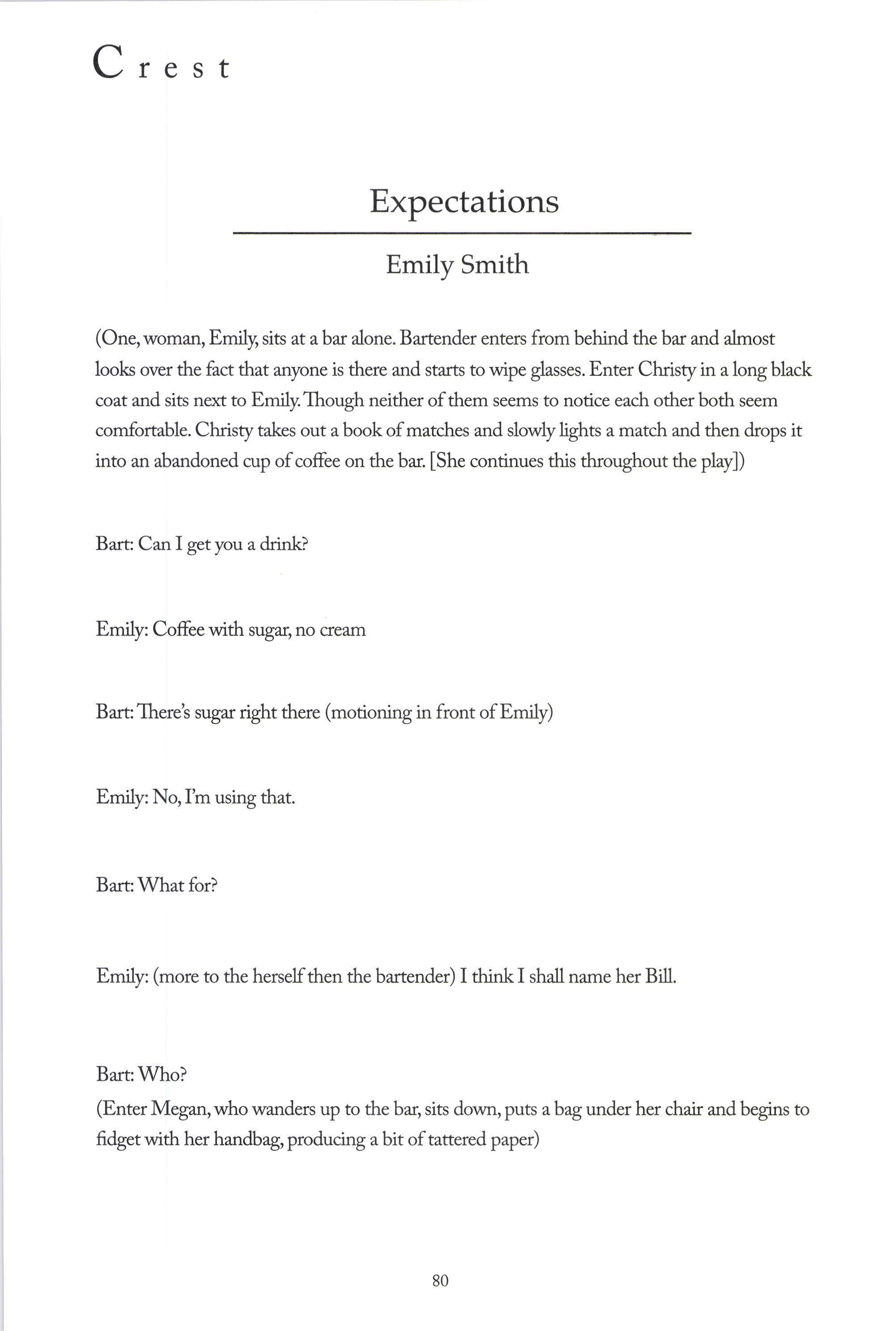
BarcThere's sugar right there (motioning in front of Emily)
E*ib" NqIm using that.
BarcWhatfor?
Emily: (more to the herselfthen the bartender) I think I shall name her Bill.
Bart}\/ho?
(Enter Megan, who wanders up to the bar, sits dovrn, puts a bag under her chair and begins to fidget with her handbag, producing a bit of attered paper)
C rest
80
Barr Excuse me. (tums to face the newcomer at the bar) (to Megan) can I getyou anything? (Starded, Megan cnrnches the attered paper in her hand.)
Megan: No, nq I'm fine, well maybe water. (bartender raises his grebrows) Yes water, now that I think about it,with lemon?
(The bartender slides Megan her water and tums his badqwiping glasses with a damp cloth. Megan fidg.t more with her bags. Emily gazrs at the sugar, Chxisty continues to silently drop matches into her coffee, unnoticed by anyone around her. Megan drinlc her water slowly, but in fast nervous sips, as if she forgets shes thirsty mid gulp then remembers a bit later. She also keeps playing with that tattered bit ofpaper, glancing at the dock on the wall and then at her watch, then the coaster.)
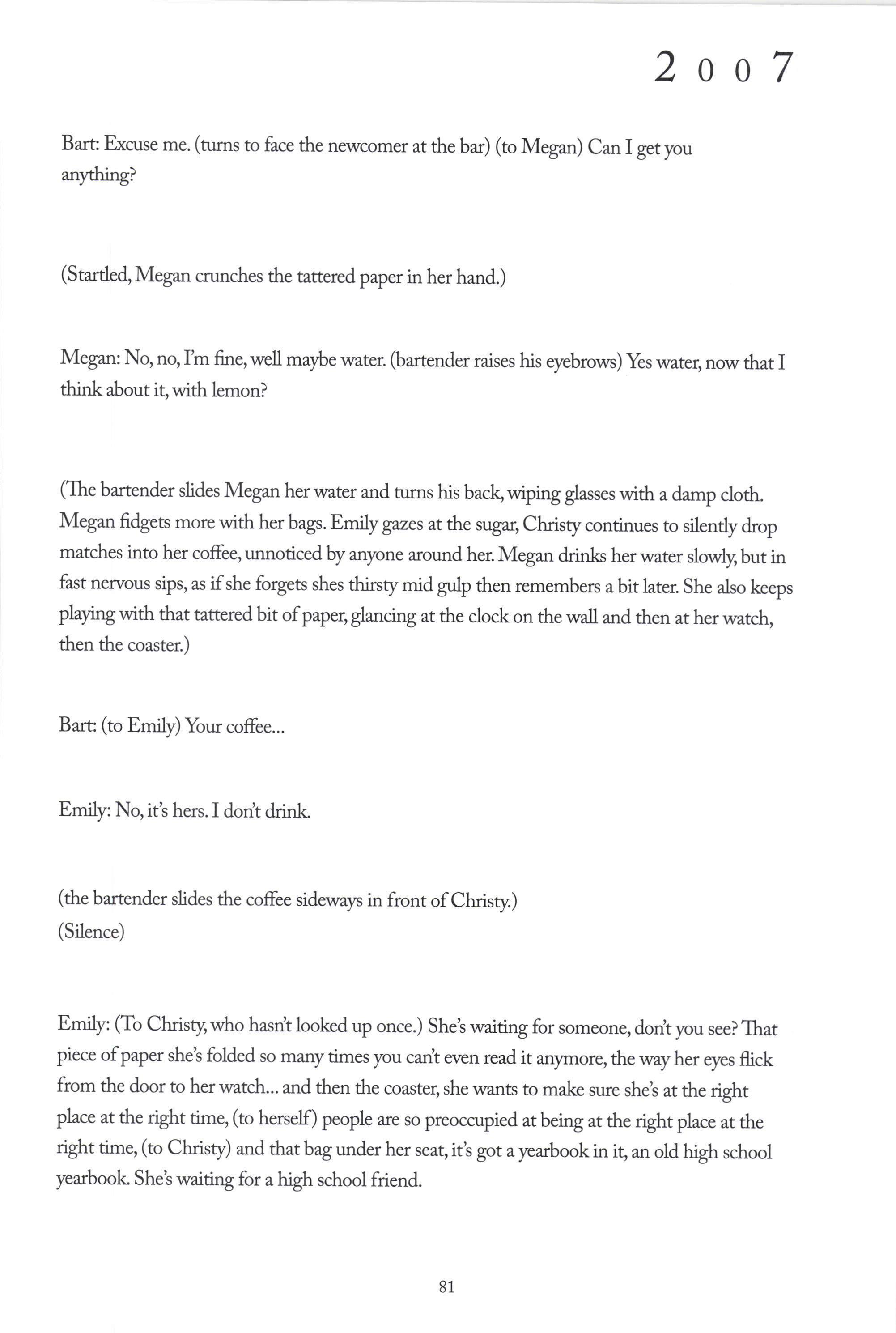
Barr (to "-r) Your coffee...
Emily: Nq it's hers.I dorit drink
(the bartender slides the coffee sidewap in front of Ctristy.) (Silence)
Emily: (To Ctuisty,who hasrit looked up once.) She's waiting for someone, dont you see? That piece ofpaper she's folded so marrytimes you carit even read it anlrmore,thewayher eyes flick from the door to herwatch... and then the coaster, she wants to make sure she's at the right place at the right time, (to herself) people are so preoccupied at being at the right place at the right time, (to Christy) and that bag under her seat, it's got a yearbook in it, an old high school yearbook She's waiting for a high school friend.
2 o o 7
81
(Silence)
(Inwalks Anne,looks around for a slight second eps adjusting to the light and theq her feet following her qres, goes up to bar. She sits down on the left ofMegan,whom shifts and smiles at her. Anne removes her scarf and setdes in, taking no note of her surroundings bqrcnd the smorgasbord ofbercrages before her. Bartender looks up at her.)
Anne Haqp,draft.
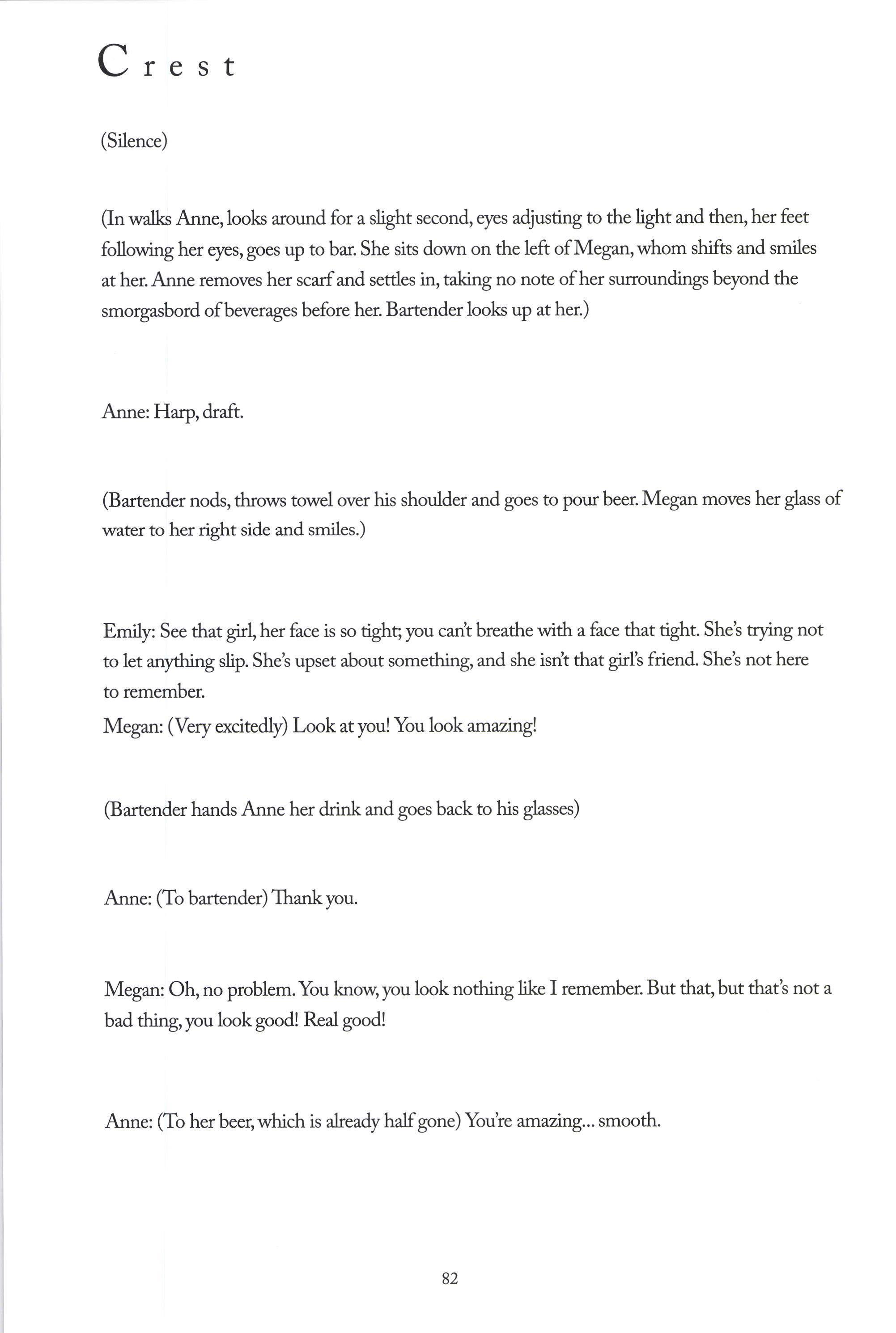
(Bartender nods, throws towel orrcr his shoulder and goes to pour beer. Megan moves her glass of water to her right side and smiles.)
Emily: See that girl, her face is so tighq you carit breathe with a face that tight She's trying not to let anything slip. She's upset about something, and she isrft that girl's friend. She's not here to remember.
Megan: (Very excitedly) Look at you! You look amazing!
(Bartender hands Anne her drink and goes back to his glasses)
Anne (To bartender) Thank you.
Megan: Oh, no problem. You know, you look nothing like I remember. But that, but that's not a bad thing,you lookgood! Real good!
Anne: (To her beer, whidr is akeady half gone) You're amaztng... smooth.
C rest
82
Megan: Oh well I dont know about that, but yes... How have you been? Man! ( Lool$ Anne up and down) I cant get over how long it's been.
Anne: (Looking up and suring ahead, but speaking to the bartender) Give me another. (The bartender takes no notice)
Megan: Oh um, ok So I dort't know what other question I should aslq isrit this what your suPPose to do? The proper protocol erren? Ha, im4gine that, there's even proper protocol for this, everything has rules now-a-days. (Gigles) But yeah,I haverit seen you in such a long time I guess I'm kinda nervous.
Anne: Hey,I want another.
Megan: Oh yes, uh... (very flustered) How's your brother? (Anne is handed beer, and she nods in recognition and takes a laqg gulp.Then begins mnning her finger through a ring ofwater on the bar.)
Emily: (To Cfuisty) Theyte not even listening to eac}r other,you know. But nobody ever does, not anymore. Not evenyou. (Ctristy seems not to notice but keeps on dropping matches into the abandoned coffee, not touching her own. )

2 o o 7
83
Bare (To t*r) Are you gonna drink that? It's getting cold.
Emily: Of course not,it's hers.
BartWell,she should drinkitthen. (walks off)
Emily:Muyb..(To the sugar) Be quiet Bill. Nq you carit go swimming,yorJre water soluble. (silence)
(Emily watching the sugar, not wanting it to escape, Megan smiJing oblivious to her ignorance, and Anne, playing with water, stone faced, not wanting to add her tears to the pool that has gathered on the bar.The phone rinp, Bartender goes to answer it.)
Megan: You know,I was moving packing boxes and suc-h and your name just fell out of a book I think it was A Separate Peace. A note you had written me about that girl who never wore any makeup, (Bartender retums and stands in front ofAnne, putting glasses in a bin) what was that girl's name?...Amanda Daley, that's right,you called herThe Amish One.I dorit think she was reallyAmish though, those people dorit use electricity.What ever happened to her? I saw her at the reunion but I didrit talk to her. (Megan bends over to retrieve her yearbook from her bag.)
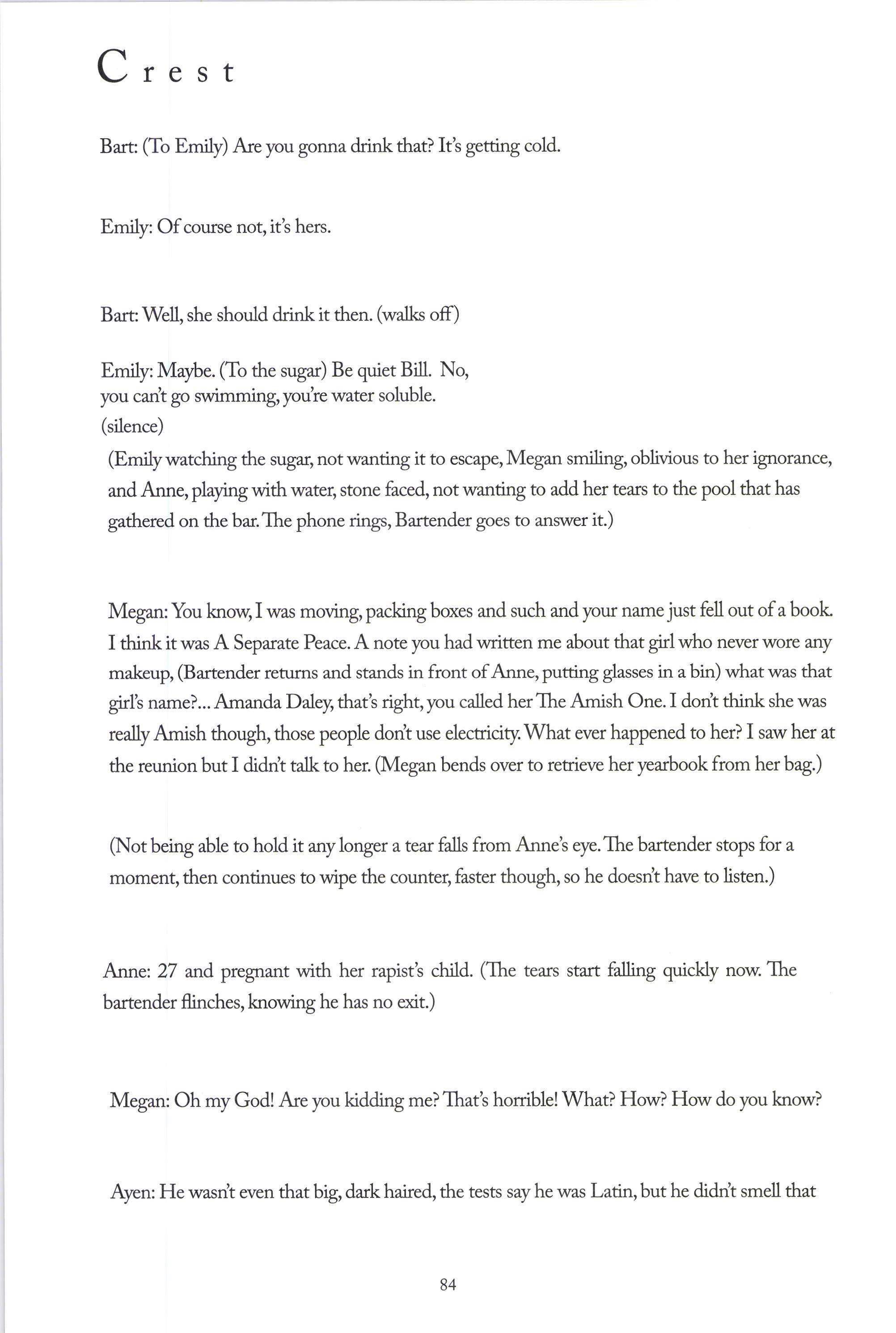
(Notbeing able to hold it anylonger a tear falls from Anne's eye.The bartender stops for a momenq then continues to wipe the counter, faster though, so he doesrit have to listen.)
Anne:27 and pregnant with her rapist's ctrild. (The tears sta"rt falling quickly now. The bartender flinches, knowing he has no o<it.)
Megan: Oh my God!fue you kidding me?That's horrible!What? How? How do you know?
Ayen: He wasrit even that big, dark haired, the tests say he was Latin, but he didn't smell that
C rest
84
vny.lt happened behind the Prudential building. Grabbed from, behind. It was lunch time. You would have thought he would have been more carefi.rl, but he wasrit. Right there in the middle of the day, behind a truck that had just come down from a branch in New Hampshire. It was cold, damp cold, air that sticks to your skin.It wasrit a pleasant feeling.The ar, not the rape, but that wasnt pleasant either, but it wouldrit have been so bad if it hadnt been for the air.
Megan: That is honifying, right here, behind the Prudential building? tat's not far from where my sister works! Is she alright? (at this point it's hard to tell if she's talking about the rape victim or her sister) I carit believe something like that happened.
(The bartender relaxes, knowing that someone will listen, but knowing that they dont really hear each other he continues to hover in front ofAnne, humoring her. He removes the empty beer glass from the counter and replaces it with a botde ofgin)
Emily: LookBill,he knows. He knows she's talking about herself He knows she shouldritbe drinking when she's pregnant. She doesrit want the baby. He knows he cant stop her. AII he can do is help. And after all, business is business.
Anne:There was big dient coming in that day, no time to go to the hospital. No regrets, the job was landed, the bank made money, everyone was hrppy.Diddt get to the hospital t'rll eight that night.te hospitalwas a kind ofyellowgreyblur. Only still frames ofthe pristine white bed sheets. (Anne grabs hold of the gin botde, not even acknowledging the fact that her qlass has tumed into a botde, unscrelvs the cap, and chugs.)
Megan: When did this happen? Is she having the baby? I should send her flowers,yes, something happy, yellow or orange. Mums? You know that girl was in my chemistry class toq and she tried out for cheerleading our junior year, didnt make it though.

2 o o 7
85
Anne:There didrit seem to be a need to abort the child.There didrit seem to be a child.The force in which that ctrild was made was so violent that nothing could be alive after that. (Anne holds her belly gingerly with her hands then digs her nails into it. Megan sees this.)
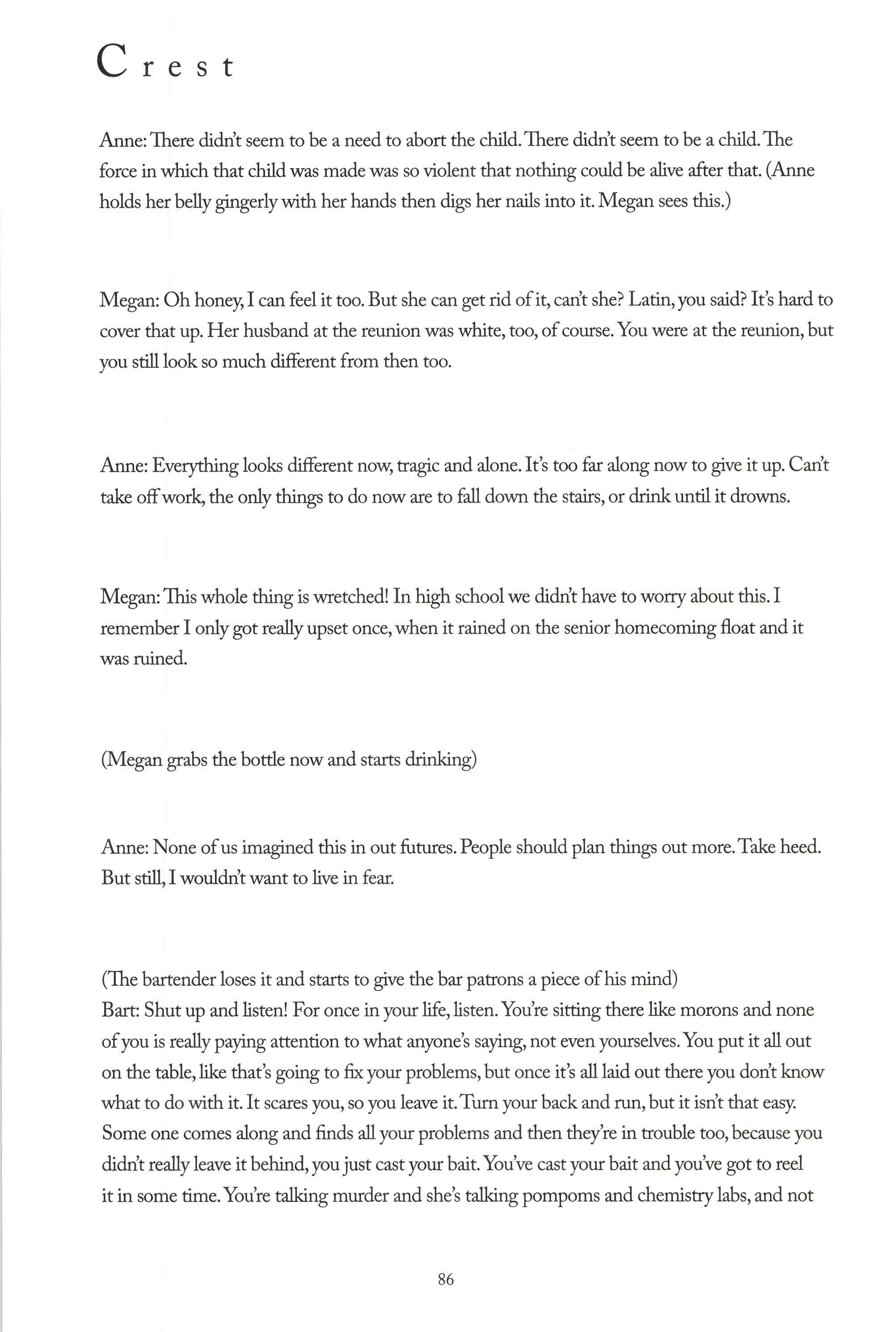
Megan: Oh honey, I can feel it too. But she can get rid of it, carit she? Latin, you said? It's hard to cover that up. Her husband at the reunion was white, too, of course. You were at the reunion, but you still look so much different from then too.
Anne: Everything looks different now, tragic and alone.It's too far along now to give it up. Carlt take offworlq the only things to do now are to fall down the stairs, or drinkuntil it dror,vns.
Megan: This whole thing is wretched! In high sctrool we didrit have to worry about this.I remember I only got really upset once, when it rained on the senior homecoming float and it was ruined.
(M"g* grabs the botde now and starts drinking)
Anne: None ofus imagined this in out futures. People should plan things out more.T[ke heed. But sdll,I wouldrit want to live in fear.
(The bartender loses it and starts to give the bar patrons a piece of his mind)
Bart Shut up and listen! For once in your life,listen.You're sitting there like morons and none of you is really paying attention to what anyone's saying, not even yourselves. You put it dl out on the table,like that's going to fix your problems, but once it's all laid out there you dont know what to do with it. It scares you, so you leave it.Tum your back and run, but it isrit that easy. Some one comes along and finds all your problems and then they're in trouble too, because you didrit really leave it behind, you just cast your bait. You've cast your bait and youVe got to reel it in some time. You're talking murder and shet talking pompoms and chemistry labs, and not
C rest
86
only are you not listening to each other you dont even notice each other. (looking at Megan but speaking to Anne) You dorit even notice that neither ofyou gives a damn.You dont even know she's alive, the only person you know is alive, is you, and you keep talking about how dead you are.'. (This time bending over in front ofMegan and peering down upon her) Andyou...you Iive alone, because you are never wrong. She's not your friend from high school, she's not your friend at all, she's not even her or,vn friend. But youte never wrong, so regardless of the fact that she doesnt knowyou, or even look the part,you continue on, because you dorit even know how to admit to yourself that sometimes things dont work out, and that you're alone in a bar when you made plans to be talked to.
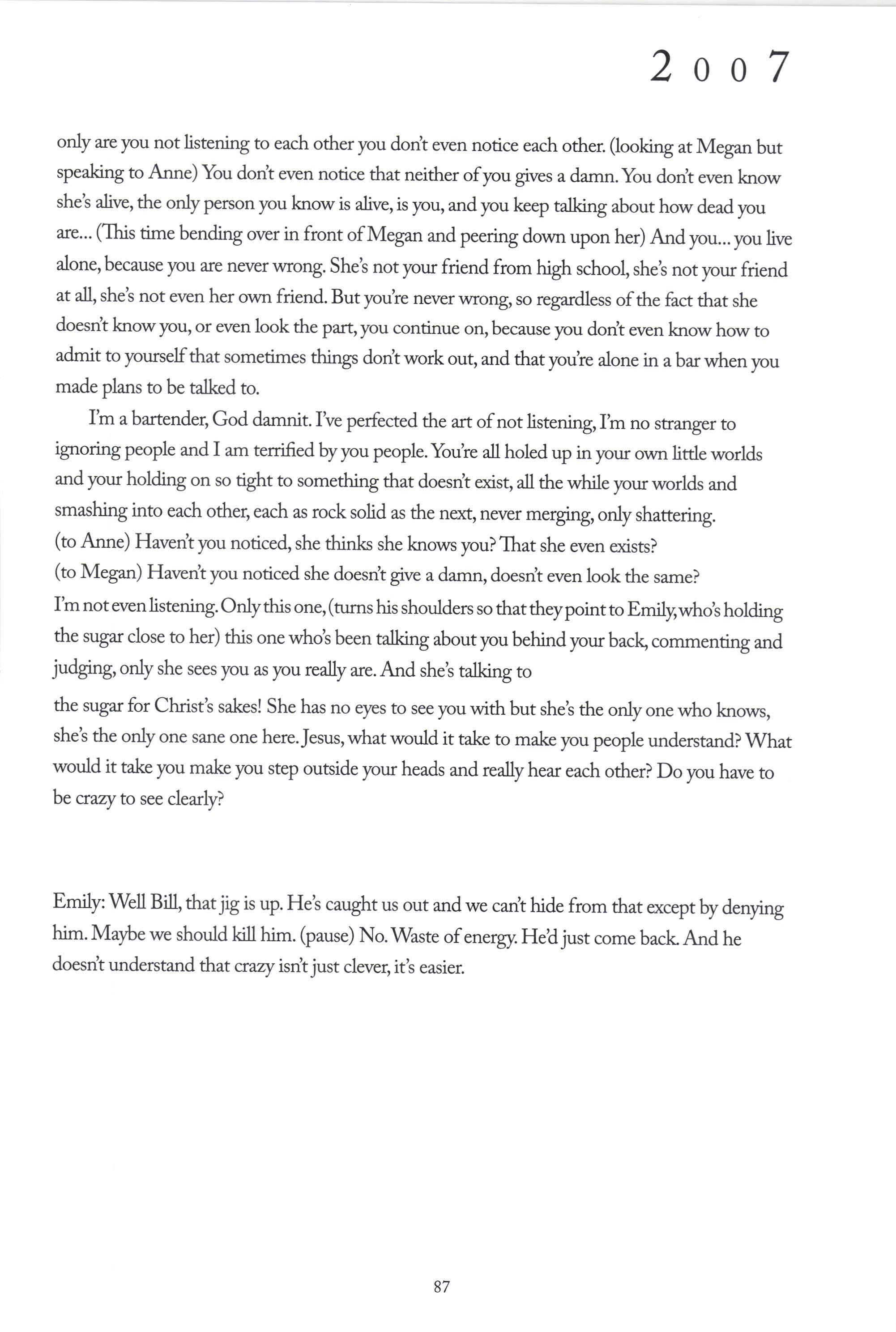
I'm a bartender, God damnit. I've perfeaed the art of not listening,I'm no stranger to ignoring people and I am teffied by you people. You're all holed up in your own little worlds and your holding on so tight to something that doesrit orist, all the while your worlds and smashing into each other, each as rock solid as the next, never merging only shattering. (to furne) Haverit you noticed, she thinks she knows you? That she even orists? (to Megan) Haverit you noticed she doesrit give a damn, doesnt even look the same? I'm notevenlistening.Onlythis one,(tums his shoulders sothattheypointto Emily,who's holding the sugar close to her) this one who's been talking about you behind your baclg commenting and judging, only she sees you as you really are. And she's talking to the sugar for Christ's sakes! She has no eyes to see you with but she's the only one who knows, shet the only one sane one here.Jesus, what would it take to make you people understand? What would it take you make you step outside your heads and really hear each other? Do you have to be uazy to see clearly?
Emily:Well Bill, that jig is up. He's caught us out and we carlt hide from that except by denying him. Maybe we should kitl him. (pause) No.Waste of energy. He'd just come back And he doesrit understand that crazy isritjust clever, it's easier.
2 o o 7
87
Pompagoose
To.y Lazzerettr
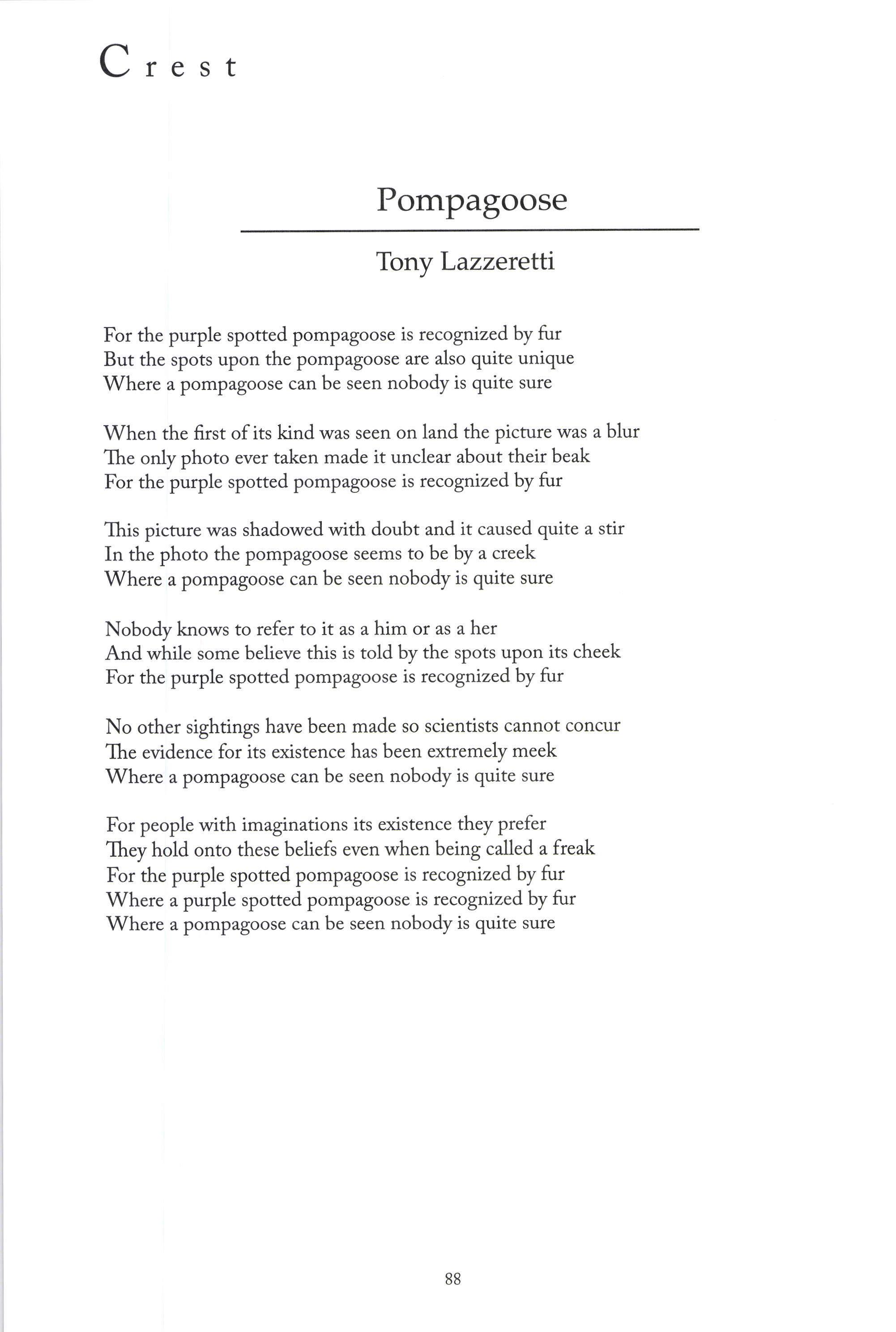
For the purple spotted pompagoose is recognized by fur But the spots upon the pompagoose are also quite unique Where a pompagoose can be seen nobody is quite sure
When the first of its kind was seen on land the picture was a blur The only photo ever taken made it unclear about their beak For the purple spotted pompagoose is recognized by fur
This picture was shadowed with doubt and it caused quite a stir In the photo the pompagoose seems to be by a creek Where a pompagoose can be seen nobody is quite sure
Nobody knows to refer to it as a him or as a her And while some believe this is told by the spots upon its cheek For the purple spotted pompagoose is recognized by fur
No other sightings have been made so scientists cannot concur The evidence for its existence has been extremely meek Where a pompagoose can be seen nobody is quite sure
For people with imaginations its existence they prefer They hold onto these beliefs even when being called a freak For the purple spotted pompagoose is recognized by fur Where a purple spotted pompagoose is recognized by fur Where a pompagoose can be seen nobody is quite sure
C rest
88
A Midsummer Sonnet: The Fairy Queen Returns
Liz Davis

Now comes the day I am home after many days gone And meet my farry king upon arrival. From both our hearts the curtains are finally drawn, And so we attempt to speak of love's revivi. Yet jealousy doth brew within they unfaithfirl heart; As time doth pass, inevitably it doth bring change. Our differences make apparent the time we've spent apart, Yet firtatious words and glances still o<change. Our love was strong and doth still hold thee so close. Yet nay, I cannot give what you request, And so your jealousy is green and ever grows. Control yourself my handsome fairy king, For I return and still my heart I bring.
Untitled
Derek Baron
Behind the waterfall, I mistake your formless Naked body for an Orange cat6sh. An eager puddle of light. Your impenetrable voodoo Your zala dijei, Divine ag'we chaos
You begin to dance More and more violently I am more and more enlightened.
2 o o 7
89
Ixtla Arceo-Wrtzl

C rest
90
il l' ilki&s,!a;
Rachel White
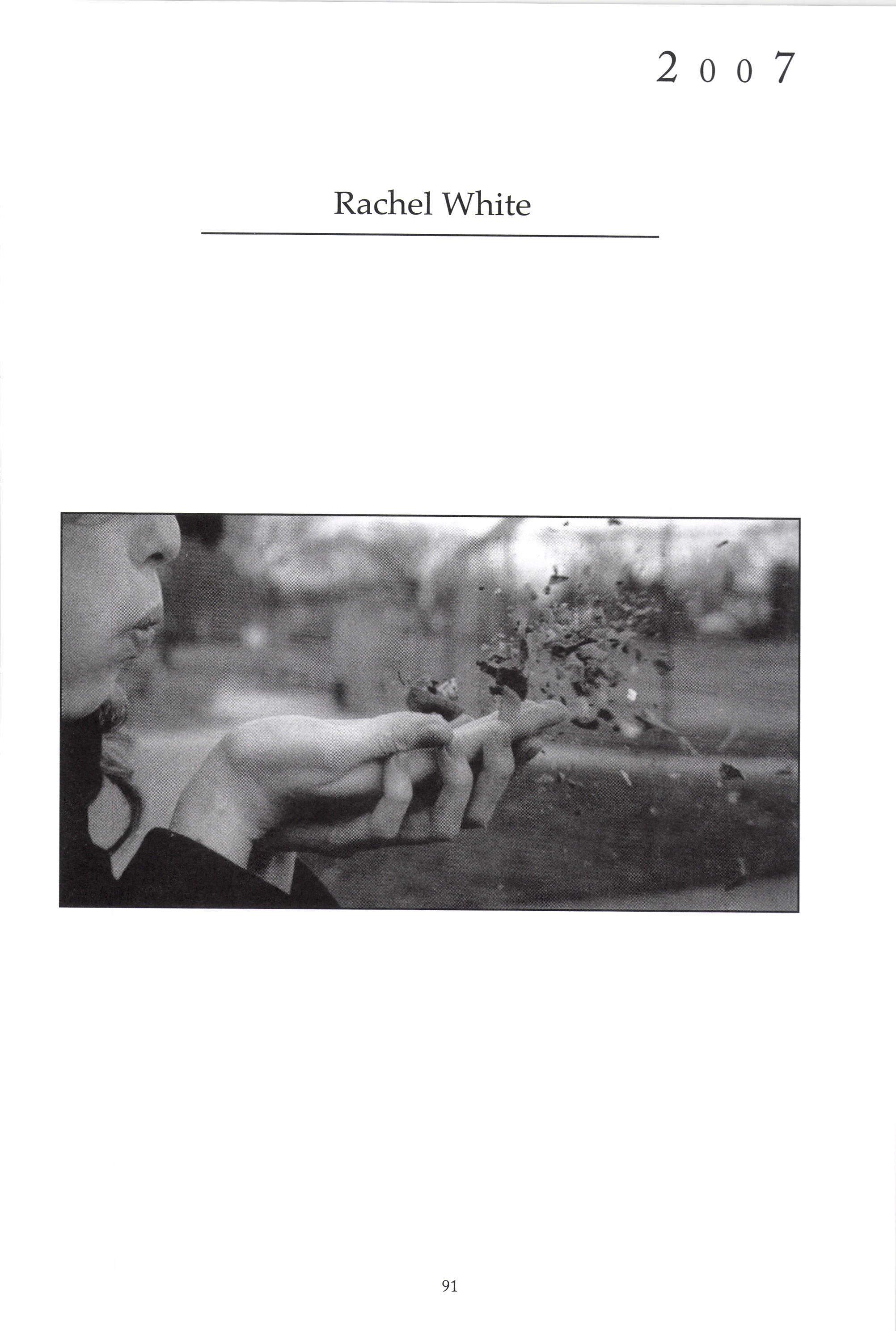
2 o o 7
97
The Security of Solitude
Maddie Labadie
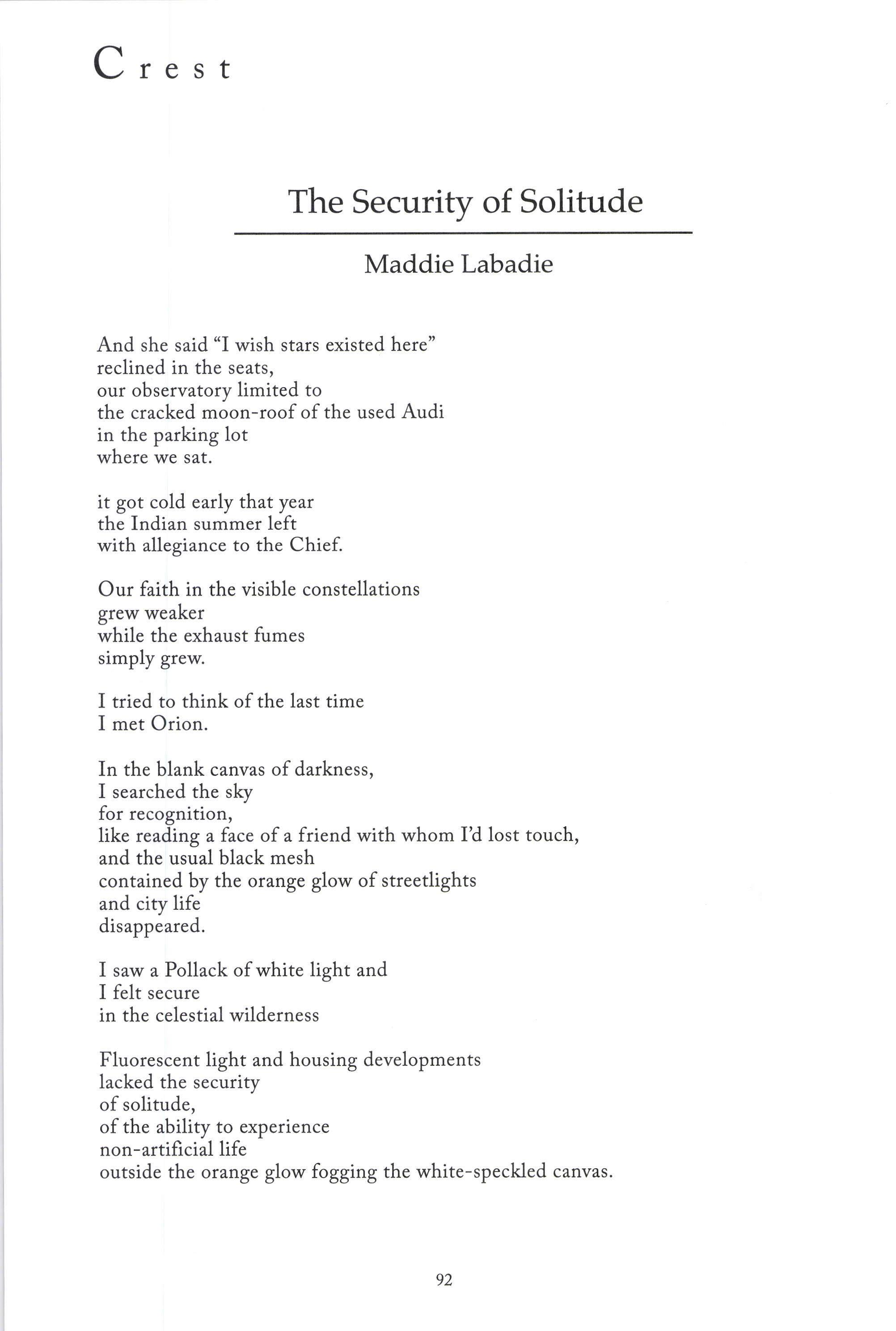
And she said "I wish stars existed here" reclined in the seats, our observatory limited to the cracked moon-roof of the used Audi in the parking lot where we sat.
it got cold early that year the Indian summer left with allegiance to the Chief.
Our faith in the visible constellations grew weaker while the exhaust fumes simply grew.
I tried to think of the last time I met Orion.
In the blank canvas ofdarkness, I searched the sky for recognition, like reading t face of a friend with whom I'd lost touch, and the usual black mesh contained by the orange glow ofstreetlights and city life disappeared.
I saw a Pollack of white light and I felt secure in the celestial wilderness
Fluorescent light and housing developments lacked the security of solitude, ofthe ability to experience non-artificial life outside the orange glow fogging the white-speckled canvas.
C rest
92
Pieces
Alicia Plomin
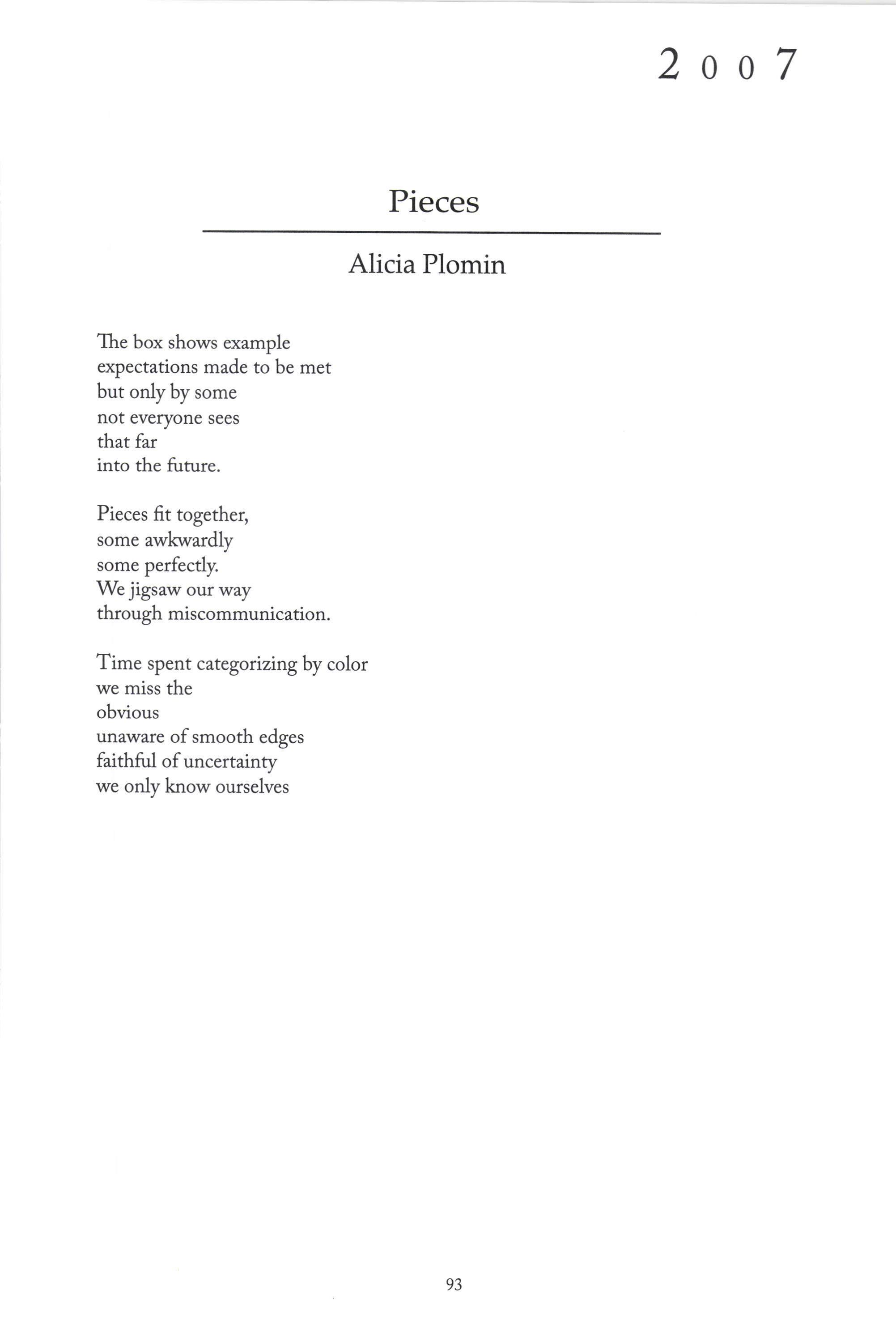
The box shows enample orpectations made to be met but onlyby some not everyone sees that far into the future.
Pieces fit together, some awlsnrardly some perfecdy. We jrgsaw ourway through miscommunication.
Time spent cutegoljzingby color we miss the obvious unaware of smooth edges faithful of uncertainty we only know ourselves
2oo7
93
"Soldier's Home": The Decay of Individual Truth
Brian Stratton
In the short story "Soldier's Home," Ernest Hemingway probed the shattered psyche of Harold Krebs, a solder in the Great War who "came back much too late." The story's meandering examination of a life devoid of meaning or purpose tacidy warns the reader of contemporary society's relendess assault on identity and individual truth. Krebs lives in a world dominated by institutions with no respect for individual experience, and despite repeated attempts to combat those institutions, he is repeatedly rebuffed and ultimately succumbs to the will of the institutions.
From the very first, the story depicts Krebs'losing struggle with institutional dominion. In the past, one prevalent native belief contended that photography stole souls; the initial photograph of lGebs with his identically dressed fraternity brothers can be understood in this context. College, often a place of emotional growth and sel-f-definition, is instead merely another institution which traps Krebs in the mire of conformity. Motivated by the need for a truth individually discovered rather than institutionally mandated, Krebs leaves the stifling atmosphere of his college and enlists in the Marines.
In the army, Krebs acquires some semblance of an independent identity. While fighting in the war, there are moments which later "had been able to make him feel cool and clear inside himself when he thought of them." What transpired during those times is kept purposefully nebulous; however, Krebs unequivocally acknowledges their value, for he lingers at the site of those moments of truth for several years afterward. Only far away in a foreign land is Krebs given breathing room to discover his identity, and thus his insistence on remaining in Europe long after most of the heroes have returned is an extension of Krebs' ineffectual strategy of fending off institutional infuence. For several years Krebs seels to resolye the conflict between his fragile fledgling identity and the repressive institutions of his "soldier's home"by running away from them. This tactic flounders because in spite ofKrebs'discovery ofindividual truths and his extended stay in Germany, he never develops a will of his own. Krebs has many vacuous flings with French and German girls who "did not need to talk," and finally, acceding to the volition of his division members, returns home to confront the institutions that dominated the

C rest
94
early years of his life.
The nascent glimmers of individual will and identity are prompdy purged from Krebs upon his return home. His moments of truth are tarnished by a town which "had heard too many atrocity stories to be thrilled by actualities"; Krebs lies desperately in order to be heard. Trapped in a society that values cheap and easy falsehoods over rich but difficult truths, he abandons every vestige of his identiry and "in this way he lost everything."
Despite his incipient sense of self-worth being crushed like a bug under heel, Krebs still tries feebly to resist the will of society by withdrawing from it completely. He detaches himself from his family, from the church and from the rest of the world, sitting on the front porch and thinking small thoughts. His aim is nothing less than to disassociate himself from the corrupt institutions that foisted falseness upon him: "He did not want to tell any more lies. It wasn't worth it."
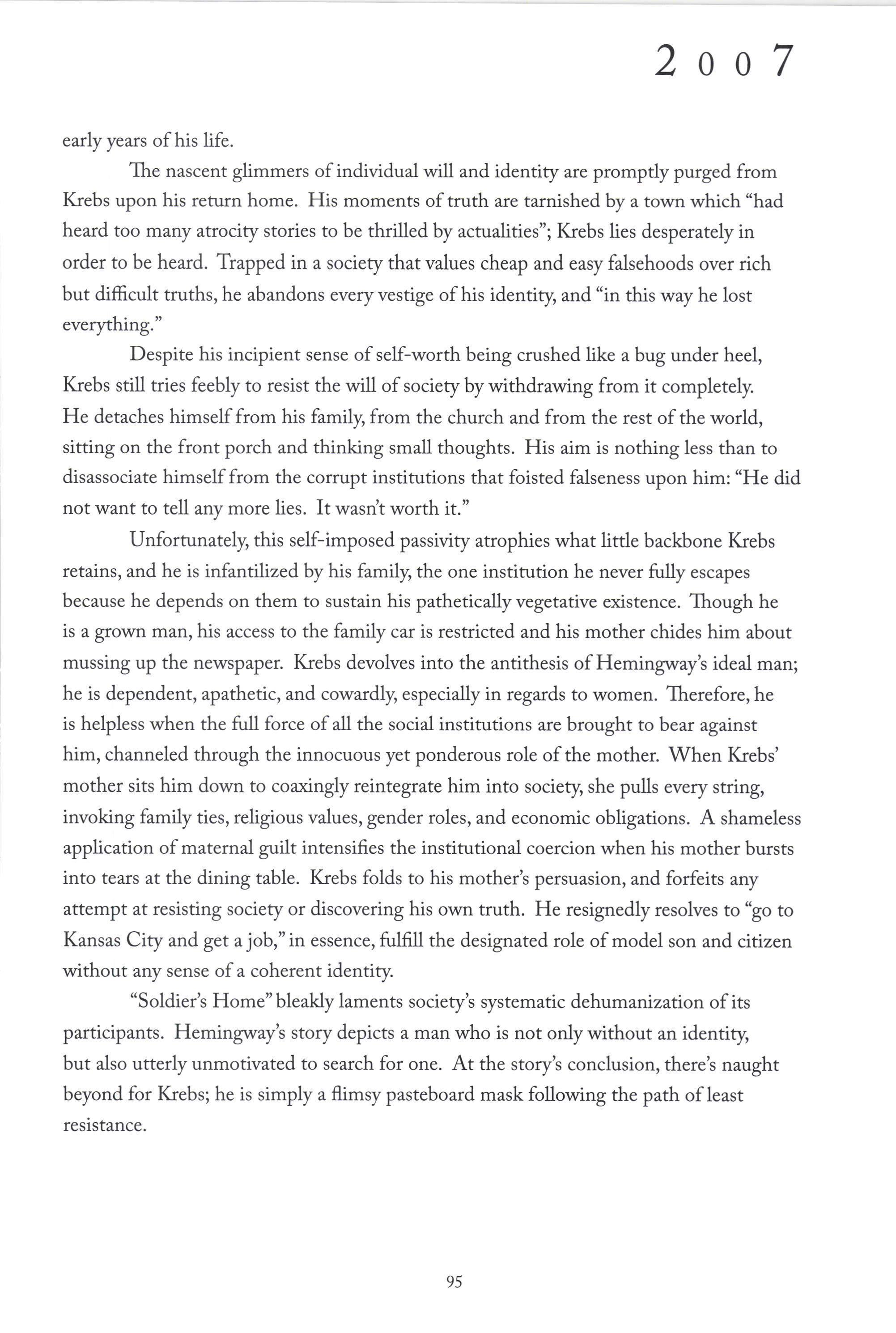
Unfortunately, this self-imposed passivity atrophies what litde backbone Krebs retains, and he is infantilized by his family, the one institution he never firlly escapes because he depends on them to sustain his pathetically vegetative existence. tough he is a grown man, his access to the family car is restricted and his mother chides him about mussing up the newspaper. Krebs devolves into the antithesis of Hemingway's ideal man; he is dependent, apathetic, and cowardly, especially in regards to women. Therefore, he is helpless when the firll force of all the social institutions are brought to bear against him, channeled through the innocuous yet ponderous role of the mother. When Krebs' mother sits him down to coaxingly reintegrate him into society, she pulls every string, invoking family ties, religious values, gender roles, and economic obligations. A shameless application of maternal guilt intensifies the institutional coercion when his mother bursts into tears at the dining table. Krebs folds to his mother's persuasion, and forfeits any attempt at resisting society or discovering his own truth. He resignedly resolves to "go to Kansas City and get a job," in essence, fulfill the designated role of model son and citizen without any sense of a coherent identity.
"Soldier's Home" bleakly laments society's systematic dehumanization of its participants. Hemingway's story depicts a man who is not only without an identiry but also uttedy unmotivated to search for one. At the story's conclusion, there's naught beyond for Krebs; he is simply a flimsy pasteboard mask following the path of least resistance.
2oo7
95
At the Swingse! September L7h,4:00 p.m.
Crescentia Ste gner-Freitag
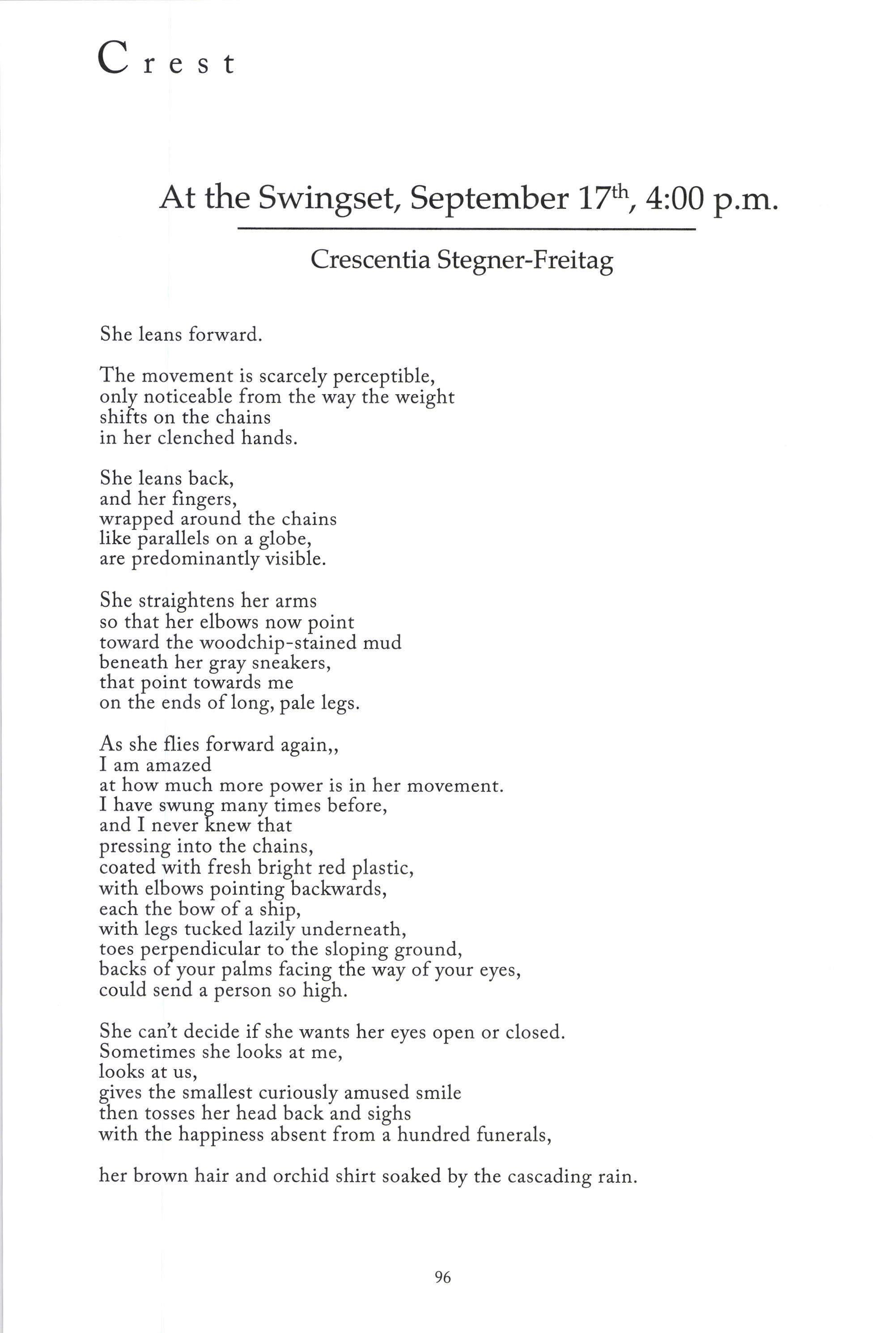
She leans forward.
The movement is scarcely perceptible, only noticeable from the'way th'e weight shifts on the chains in her clenched hands.
She leans back, and her fingers, wrapped around the chains like parallels on a globe, are predominantly visible.
She straightens her arms so that her elbows now point toward the woodchip-stained mud beneath her gray sneakers, that point towards me on the ends of long, pale legs.
As she flies forward again,, I am amazed at how much more power is in her movement. I have swung many-times before, and I never knew that pressing into the chains, coated with fresh bright red plastic, with elbows pointing backwalds, each the bow ofa ship, with legs tucked lazily underneath, toes perpendicular to the sloping ground, backs of your palms facing the way of your eyes, could send a person so high.
She can't decide if she wants her eyes open or closed. Sometimes she looks at me, looks at us, gives the smallest curiously amused smile then tosses her head back and sighs with the happiness absent from a hundred funerals, her brown hair and orchid shirt soaked by the cascading rain.
C rest
96
Carbage-Can Gorgeous
Jillian Merrifield
she was garbage-can gorgeous, all done up in an array of muted dirtydark colors and so full of variety that a man just couldn't help himself he was compelled to fall for her like a piano off the roof. Deadly fast and hard until your brains are smashed out because there's a piano landing on your head and your blood is a muted dirtydark red on the sidewalk next to her, and she's all surprised like she's never seen anybody fall so fast and hard for her before. She was walking down the street holding my hand when I fell for her like a piano, and her lips screamed toucb meinbright redbold words that swirled around my head. The winter wind shot through my ears and her fingernails that were the same bright redbold as her lips cut into my hand and released small amounts of muted dirtydark redblood. Finger-plucking music in my head with those nails. She smiled at me, still surprised with higharch eyebrows.I smiled back and she ruffied my hair and I grabbed her wrist and pulled her in because I wanted her so bad that I was willing to jump off the roof. And when I kissed her I hated her. For being so garbage-can gorgeous, for being so innocent-seeming when I knew what she was up to. Out to get me, she was. or my money, rather. It was in her cheap clothing that came from somewhere thrifty, her cheap clothing that whispered to me that some person or place had taught her to be both delicious and devious. To catch big men like me. Me in my designer coat that swirled in the winter wind. When I kissed her I hated her because she wasn't my wife and she didn't really play the keyboard. But I fell for her anyway because her hair swirled with my designer coat in the winter wind in a vortex behind her skull and her bright redbold lips whispered touch rne in my eyes. And it made me hate her all the more. Because I was trapped, and she knew it, forced me to confront it. And she kept it like a secret within herself. Like the memoryplague. I could smell Italy and winter in her hair, and she could probably smell chocolate in her future. Chocolate and kisses and a good night is what she wanted. What she expected in a bed with pillows to fall onto and silk sheets to rival her skin. She'd never been to my house before. There are six locks on the door and there is no butler, no cleaning service hired, even though with the size of my house...well,I spend a lot of time cleaning. Dusting. Everything has to be
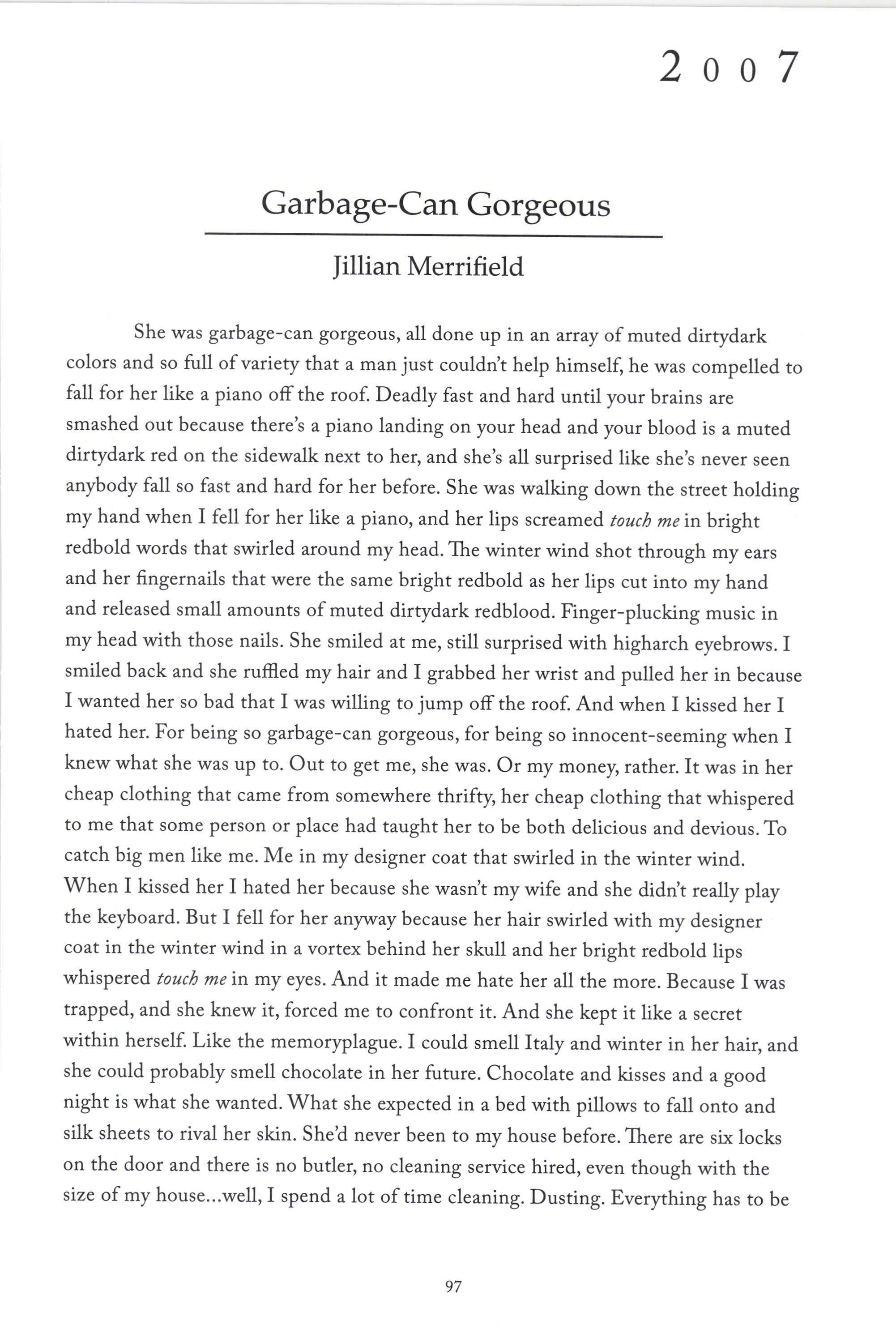
2 o o 7
97
immaculate. But nobody else can come in. I don't want them to. This girl for example. I know she's not immaculate. And normally...under normal circumstances...when I'm in control...she would not be allowed in. I don't trust people, but this girl in the muted dirtydark green dress who made me fall for her and hate her in the same instant has somehow made her way in here. My wife left me shakingscared because I didnt like people. She wanted to entertain. It was her job. She was an events planner. But I couldn't stand having people in the house. They were only there to get me but they were there for her party too and it confused me. She told me I could keep my emptiness and stormed out. She never came back for her things. For her memoryplague. But I can tell this girl worit leave because she likes this kind of thing, it's in her eyes when they rove over the blank-faced outer walls of my house and in her higharch eyebrows that only glance for an instant at my six locks with their six different keys that I painstakingly open with all due speed, still holding her wrist because I don't want her to get away and I dont want her to walk into my house. Out to get my money, she is. Smiling like that and pulling me \nto rny hortse. Overeager like a virgin. Out to get me. My house has a lot of bright colors. So I can see people. So they stand out stark in their muted dirtydark hues or their brightbold shades. So that they can't get by me, so that I can see them and expel them because I don't want them in my house, I dont want them near me. I don't trust them. She stands out stark in her muted dirtydark green dress that whispers (slightly louder than her hps) touch rne.l touch her.I run a finger along her jawshadow and offer her some wine. She's already had a lot,I smell it on her breath in her hair along with the Italian food and the winter wind but I get her more because she wants it and I've fallen for her.I have that fluttery feeling in the pit of my stomach like overcooked scrambled eggs so I try to think of a subtle w^y to make her follow me to the kitchen so that I dont have to trust her alone here, but I can't so once I'm around the corner I run to get the wine and get back. In the living room she's staring at a painting on my wall and I'm slightly relieved, but wait, what if she wants to steal it? I put the wineglass in her hands and draw her away from it, and she laughs at me,lips drawn back into a smile over brightbold white teeth. Her makeup is smeared, imperfect. Cheap and poor. But I'm still falling and hating her for being able to play me so well, so I can't do anything about it because I'm trapped in my own house that she's somehow gotten into. My wife's keyboard still stands in the corner in her office that she hasn't come back to clear out, despite my somewhat strong urgings, and I decide that I won't bring my bright redbold-mouthed girl into that room and hurry her past that door as we walk
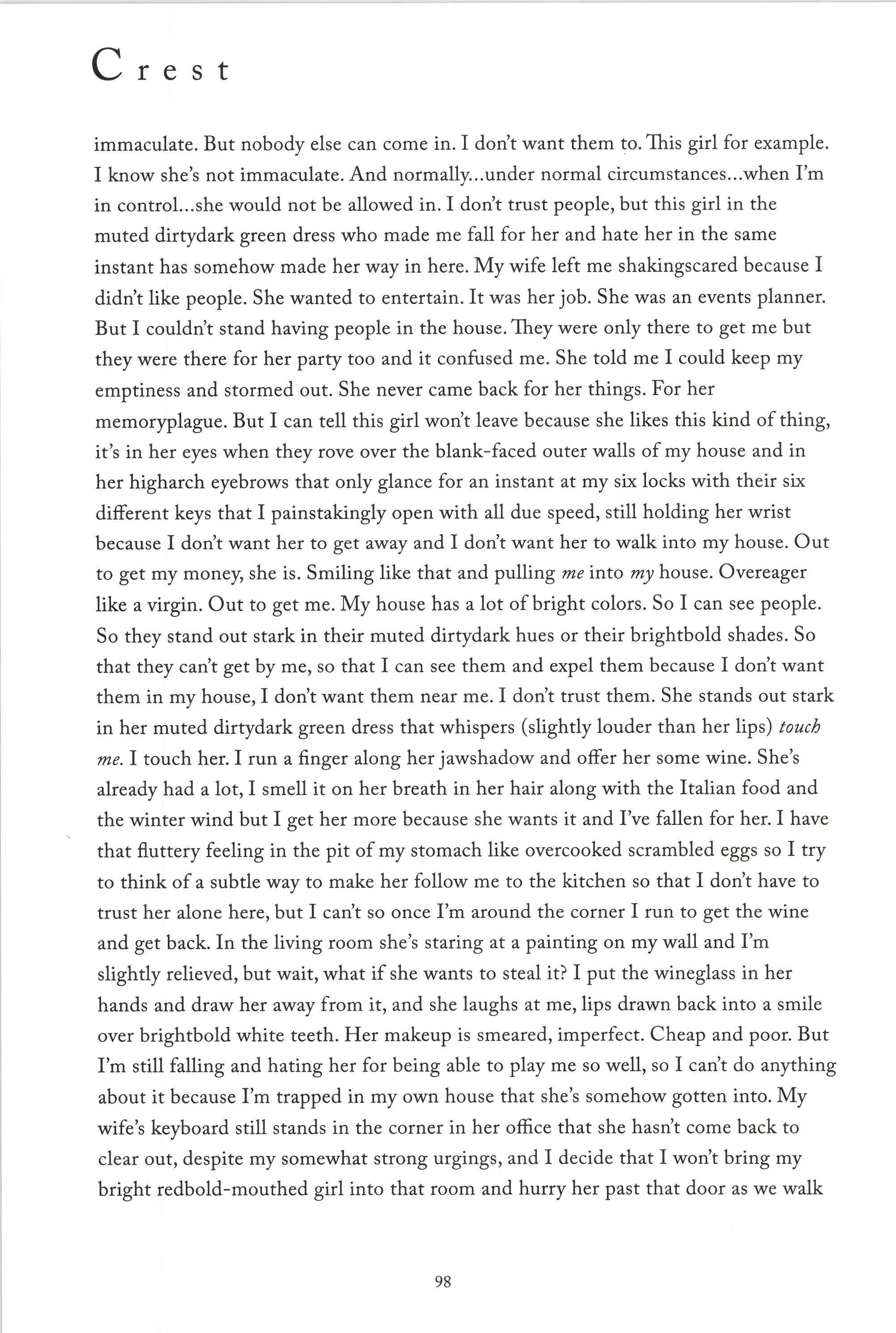
C rest
98
towards the stairs. Like it holds a memoryplague. All mine to kill me in a secret death. She may be here, but she won't get to me. She won't get to the things that matter to me, the memories of finger-tinkling music. Except she's already in my house and it makes me nervous that she looks at the paintings (which didn't come cheap, by the way, not like her) with tigerhunger in her eyes. Wild. I'm nervous and my hands sweat and I surreptitiously, sneakily, look around the room to make sure that it's just the two of us. I wouldn't put it past someone else to be in here. Here to get me. Another glass of wine downed on the way down the hall (I didnt have any,I want to be alert because she's in my house and I hate her already even though I want to be at her lips'command) and she's asking me where my bedroom is and I'm excited and too eager like she was to see my paintings so we go upstairs except I hate that she has so much power over me, that she's controlling me and that she's out to get me. Hate hate hate it and I watch behind me to make sure that theret nobody there and at the last minute I turn and dash back down the stairs and lock all six locks and arm the security system. I knew there was a reason I felt like I was being watched. Stupid stupid stupid for being forgetful. For being distracted. She had already found my bedroom and was sitting on my bed awkurardly waiting, higharch eyebrows surprised that she's gotten here with me, and so fast too. But I couldn't help but give her what she wanted which is why there's chocolate for her, because I know that she wants it. And eventually she takes off her dress and I fall even harder for her icecreamshoppe figure and her maraschinocherry mouth that whisperscreams touclt me in my eyes. And in my bed I smell Italian food winter wind wine chocolate in her hair. I don't want her to spend the night.I don't.I'11 take her,I want her so bad like the suicidal piano ,tDants the ground, cra,t)es the ground. Otherwise she wouldn't be here to take my house and my money and hurt me, I wouldnt have let her in because I know that she's garbage-can gorgeous, not jewelry-store decadent like my wife was. So I'11 take her, oh God I'11 take her, but I don't want her to spend the night. But she spends the night anyway, and there's nothing that I can do so I lie there awake, waiting for her to get up and steal my paintings and credit cards and keyboard and let her band of thieves into the house and take everything from me.I listen for a door to open or a window to creak.I don't blink.In the morning I let her shower first, and when she's done I love her less because she's less garbage-can gorgeous in a dress that's already been worn and no makeup to make her mouth whisperscre am toucb ze. But I still hate her, for taking me this way. Her hair smells like a man's shampoo, not Italian food winter wind wine chocolate. She's no longer the things I bought her, the things I

2 o o 7
99
gave her. I liked her better when she smelled like our date. I try to shower fast and I can't shower fast enough and it frustrates me because I dont know what she's doing, I don't know what she's stealing from me, and I'm coming up on the ground now, my fall is almost over and soon I'll be muted dirtydark blood on the sidewalk next to her. All used up. I burst out of the bathroom, all excited and scared and run through the house in a towel looking for her and I finally fmd her in my wife's office, fingerplucking soundless music on the keyboard the keyboard that belongs to my wife and I shudder and hit the ground with anger because she taas out to get me, out to steal from me I know it now for certain. My memoryplague wraps itself around her, and I stride across the room with arms outstretched and her eyebrows aren't higharch eyebrows anymore, they're not surprised and she believes, fully believes that I want her again now, but I don't. I don't want her. I hate her. And when my fingers embrace her neck with seductiondeath and she starts to struggle her eyes surge back upwards into higharch surprise and her garbage-can gorgeous face contorts and her bright boldred mouth whisperscreams let me gountll I do and she falls to the ground deadmuted and dirtydark next to me in my coppercrimson bloodstate on the sidewalk, and I know that I was right. She was ovt to get me. And I took care of her. She can't get me anymore. I wash the sheets we slept on (first with Lysol, then bleach, whole bottles in the washing machine) and dump her body in the trashcan outside. She fits nicely there.
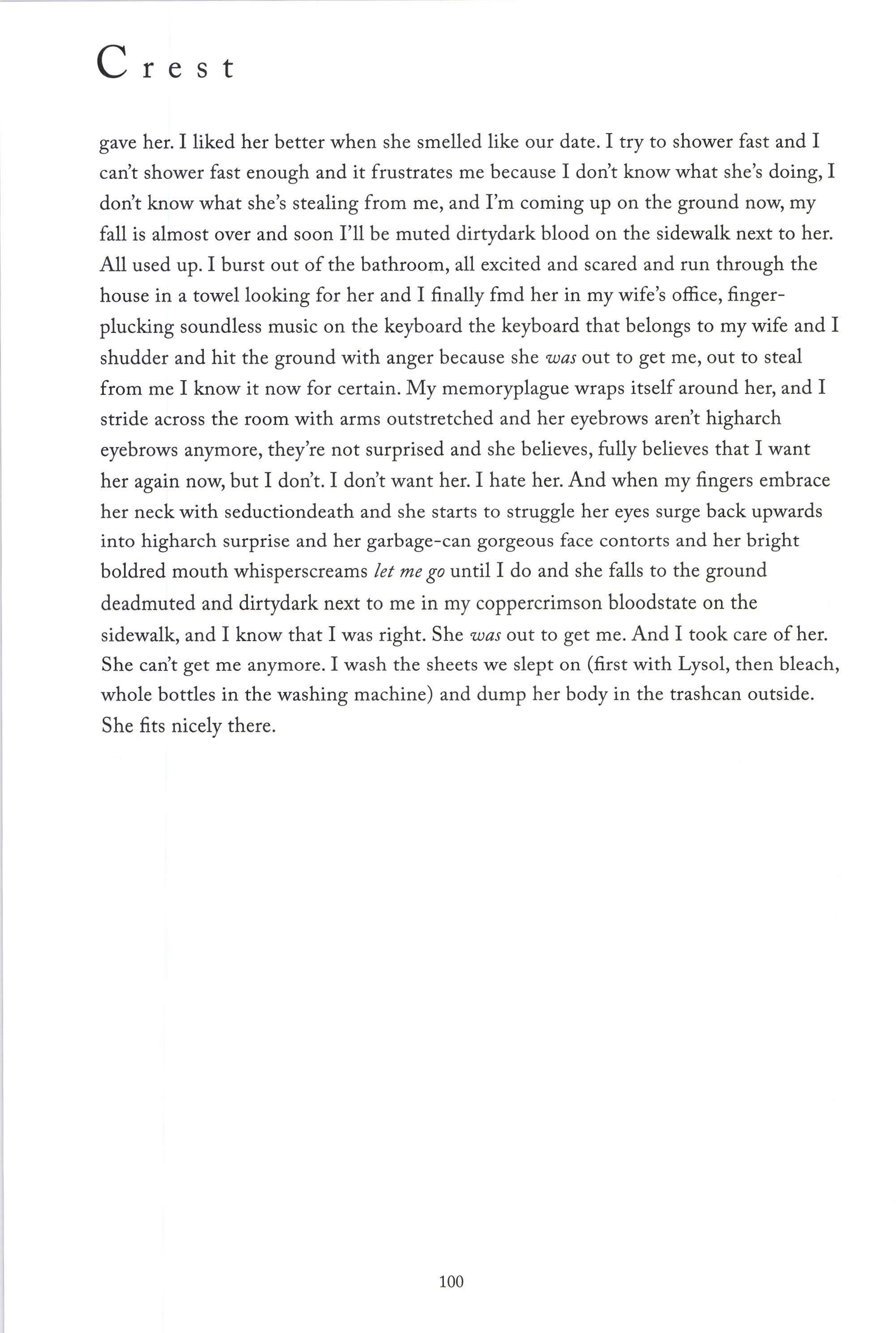
C rest
100
Billie Holiday
Deja Taylor
Should I rub Christmas ornaments on my heartache Billie or leave a flower behind an ear lobe like you &d when you sang fruit-of-the-noose lullabies because sometimes the scorch of burnt flesh and the iron press ofyour face on a t-shirt aint so different so how can I celebrate you, sing jazz on the anniversary of your death grab microphones and squeeze 'til saliva soaks my wrists and bleeds blues or prop my posterior so my posture can help me belt what's in what's been the cuds coiled around a fower stem like birthday ribbons, yours, should I rub Christmas ornaments on my heartache Billie like you did yours or tell it'good mawning'like you did yours and be celebrated through t-shirts and corkscrew textured records and pop some champagne and light a clgar and watch you sang in the midst of it all.
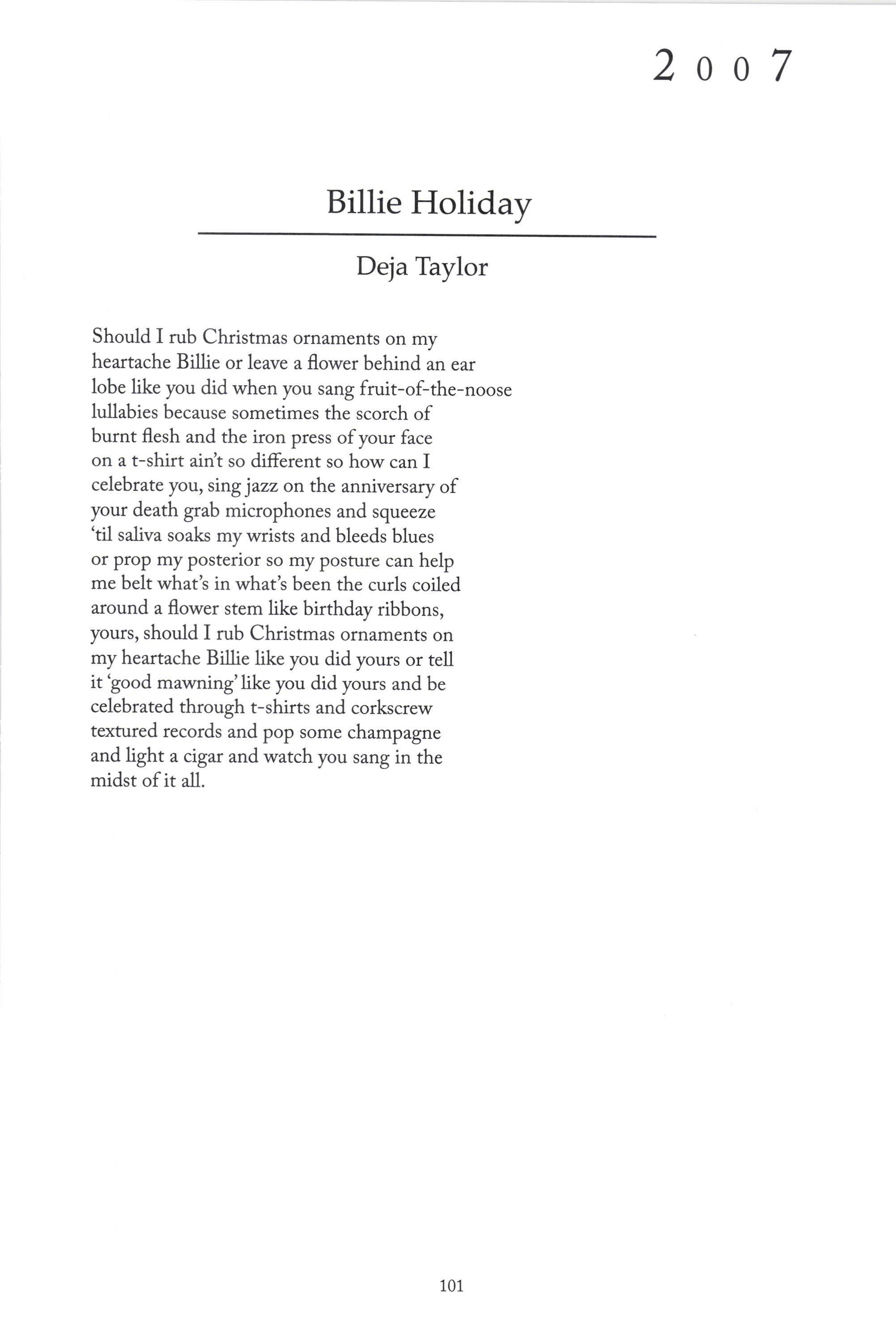
2 o o 7
101
\Valk Man
Camille Erickson
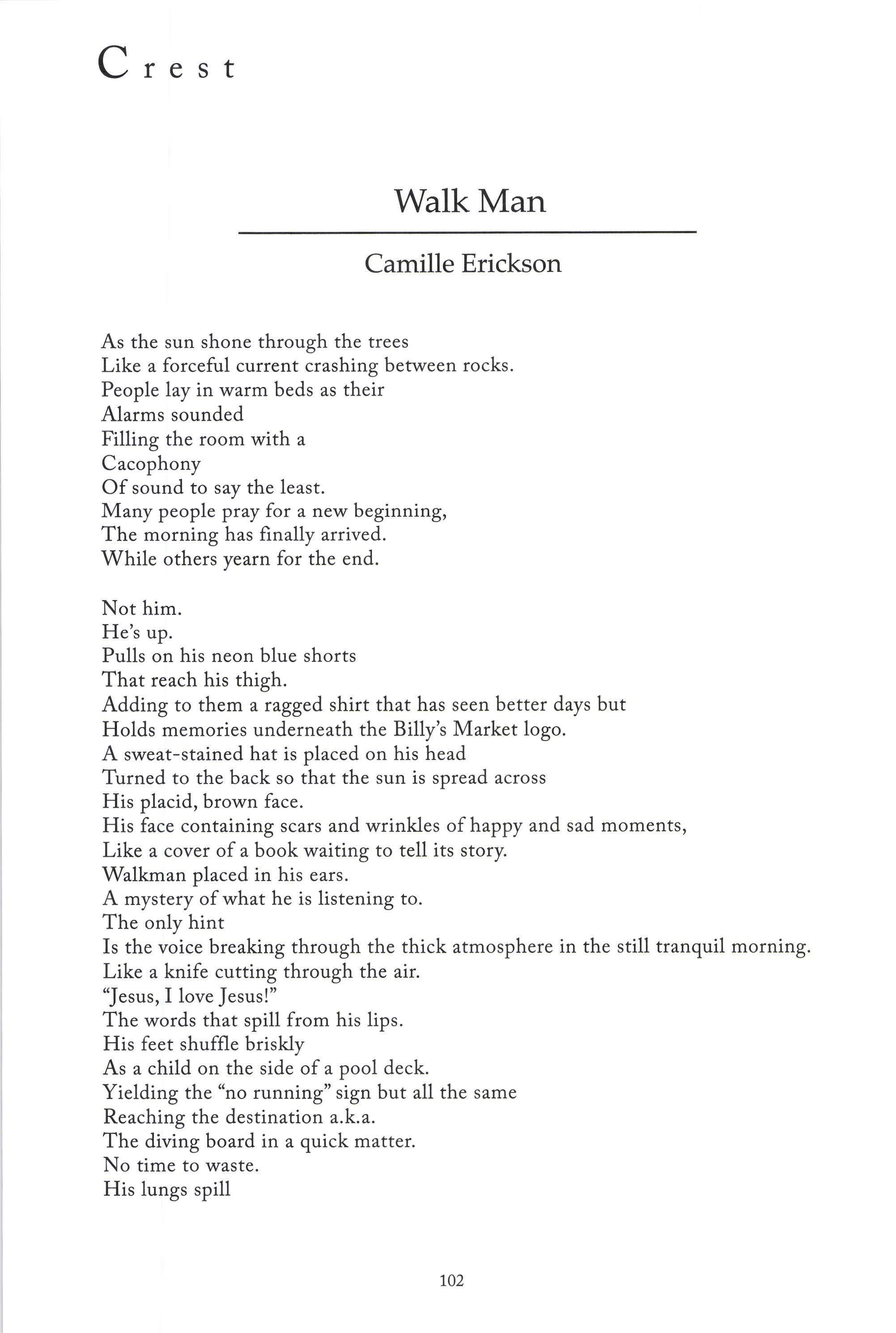
As the sun shone through the trees
Like a forceful current crashing between rocks People lay in warm beds as their Alarms sounded Filling the room with a Cacophony
Of sound to say the least. Many people pray for a new beginning, The morning has finally arrived. While others yearn for the end.
Not him. He's up. Pulls on his neon blue shorts That reach his thigh.
Adding to them a ragged shirt that has seen better days but Holds memories underneath the Billy's Market logo.
A sweat-stained hat is placed on his head Turned to the back so that the sun is spread across His placid, brown face.
His face containing scars and wrinkles of happy and sad moments, Like a cover of a book waiting to tell its story. Walkman placed in his ears. A mystery of what he is listening to. The only hint Is the voice breaking through the thick atmosphere in the still tranquil morning. Like a knife cutting through the air.
'Jesus, I love Jesus!"
The words that spill from his lips. His feet shuffle briskly As a child on the side of a pool deck. Yielding the "no running" sign but all the same Reaching the destination a.k.a.
The diving board in a quick matter. No time to waste. His lungs spill
C rest
702
His soul.
In this world
There is not much to depend on.
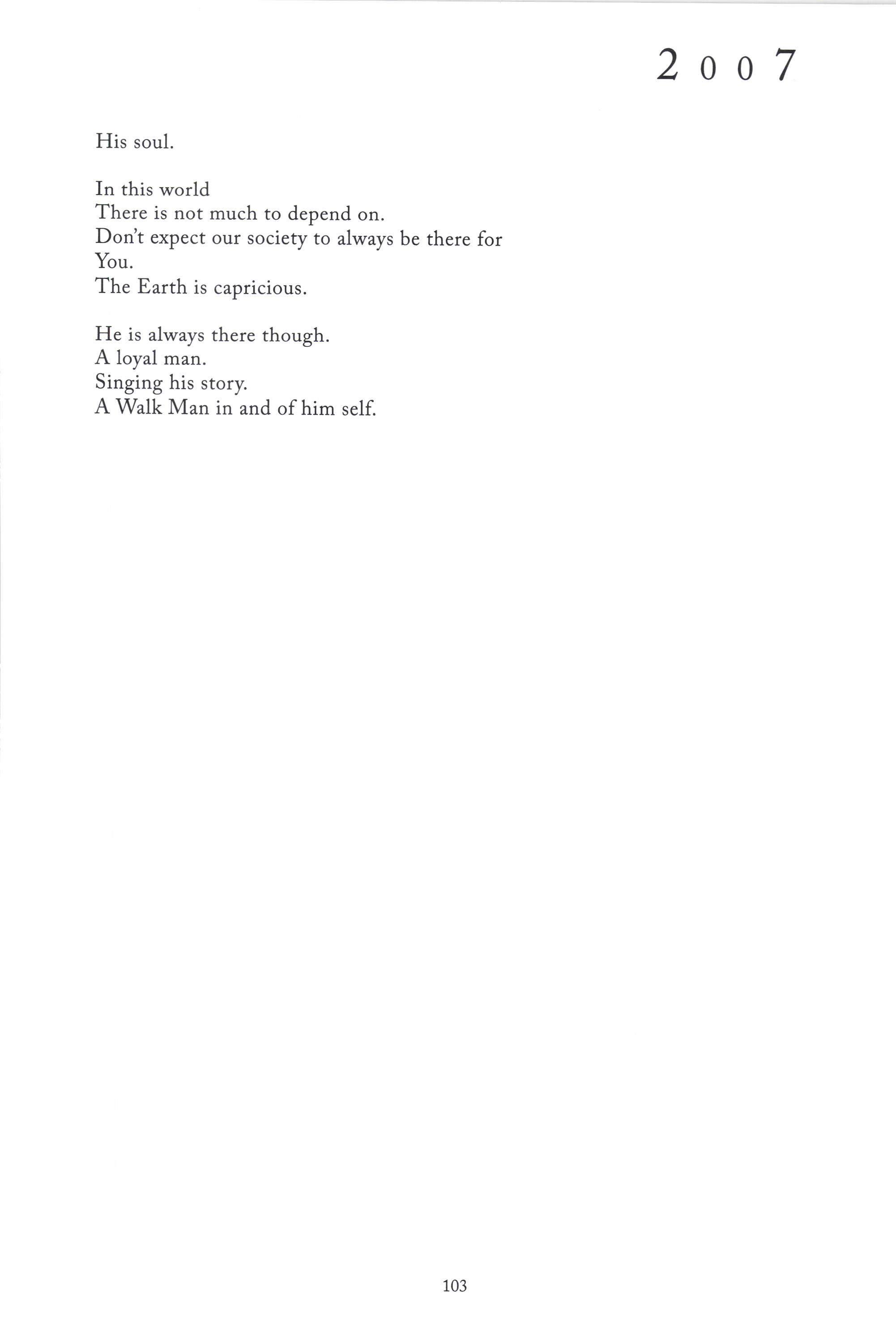
Don't expect our sociefy to always be there for You.
The Earth is capricious.
He is always there though.
A loyal man.
Singing his story. A Walk Man in and of him self.
2oo7
103
Definitions
Vicky Raymond

She wdks five blocks To listen and to chat Greets me with a hug That Is still gende But
She doesrlt ffeat me Like that frail pale Tiagica[y beautifirl China doll, Like the nurses Do
She is the U.N. that intervenes And stops mother and I From going on warpath. She walks like the U.S. postal service thro"gh flurries, raindrops Or sun
Just to plop in a chair To listen and to chat About "girl stuff" Sometimes being Santa Claus Bringing me a Box of gourmet Chocolate cupcakes That are our dessert
After she cuts up my Pot roast, with a knife of kindness And being the hand that Lifts a milk carton to Parched lips. When I begin to feel nauseous From the meds she transforms Into mother, forcing ginger-ale
C rest
104
Down my throat
She refuses to leave (fntil rescue teams
Come in the shape of ice packs
Another night she dawns the cap of A bell boy bringing up a cinnamon roll
To a starving stomach
The nort night she is the elf
Helping the shoe maker
Thank you cards are the new shoes
She skillfully becomes the artist's assistant using the gold and red glitter pen
Forming legible letters
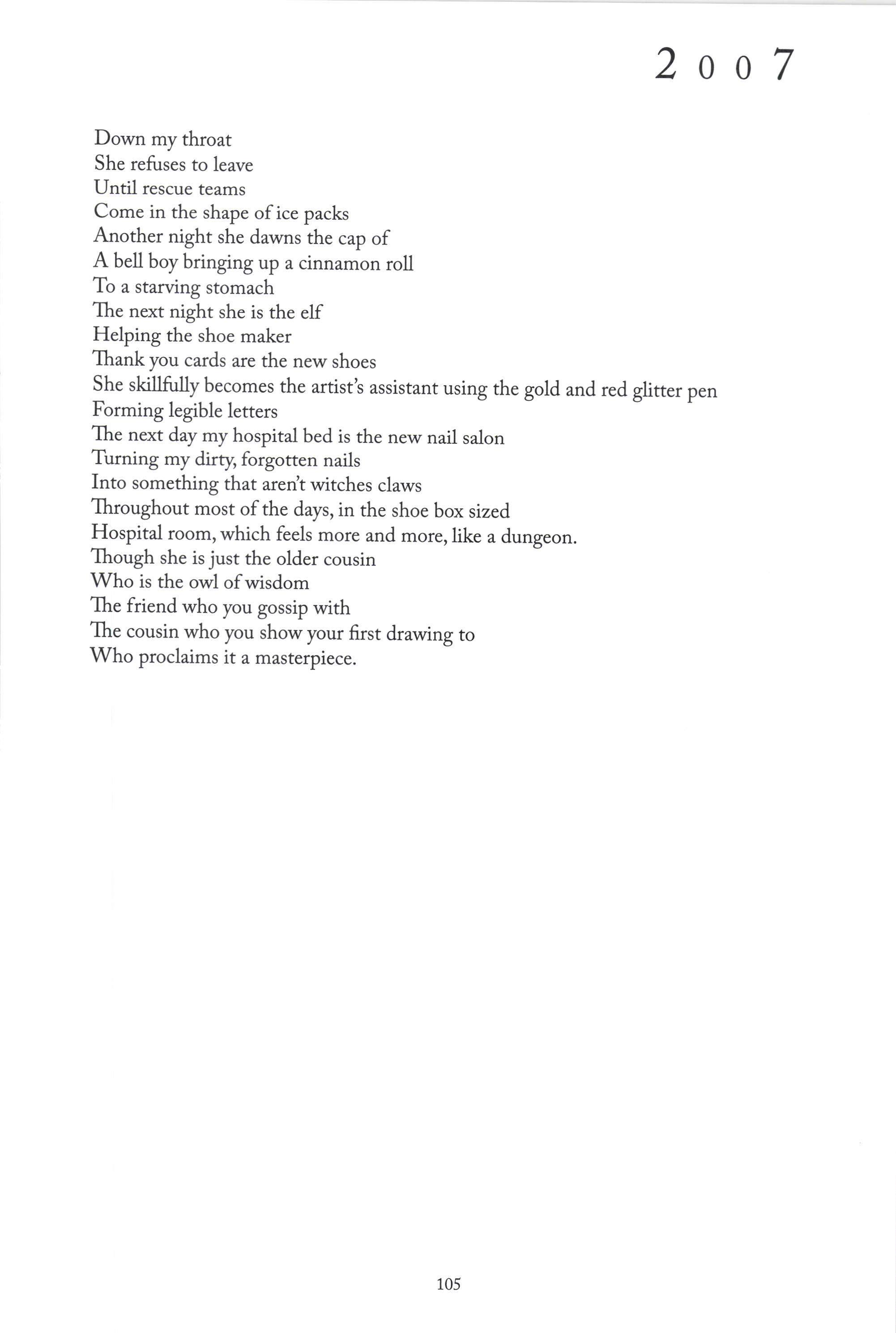
The next day my hospital bed is the new nail salon
Turning my dirty, forgotten nails Into something that arent witches claws
Throughout most of the days, in the shoe box sized Hospital room,which feels more and more,like a dungeon. Though she is just the older cousin Who is the owl ofwisdom
The friend who you gossip with The cousin who you showyour first drawing to Who proclaims it a masterpiece.
2 o o 7
105

C rest
106
Madeline Roberts
David Rubin

2 o o 7
t07
Maggie McDowell
Conrad's use of the luminance and darkness within a natural environment serves initially to isolate and elevate developed English culture above chaotic African culture in his novella Heart of Darknest And while it appears that Conrad later refutes such cultural disparity through the idea of connection between all humaniry in fact he is subtly furthering the notion of white Western supremacy. The use of superficial literary devices in describing physical setting in Conrad's Heart of Darkness ultimately gives way to far deeper and more disturbing psychological and historical tendencies ofwhite Westerners and are conveyed through Conrad's singular focus on protagonist Marlow's personal struggle rather than on the context in which he develops as a character.
In his explicit depiction of Marlow's journey "toward the center of the earth," particularly when juxtaposed against his descriptions of European voyages, Conrad implies the Congo's lack of validity and sophistication through the idea of darkness in environment. Using the theme of darkness, Conrad creates distinct differences between Westerners and "savage" Africans. The "lower reaches of the Thames" is described as the epitome of light and life: "The daywas ending in a serenity of still and exquisite brilliance. The water shone pacifically; the slcy...was a benign immensity of unstained light; the very mist on the Essex marsh was like a gauzy and radiant fabric." On the other hand, Marlow details his expedition into Africa's center as lugubrious and suffocating: "as if Nature herself had tried to ward off intruders... streams of death in life, whose banks were rotting into mud, whose waters, thickened into slime, invaded the contorted mangroves..." Notions of light, freedom, placidiry and purity evoked in the English setting establish European nature as superior to that of Africa-dark, hostile, chaotic, and untamed.
We were wanderers on a prehistoric earth, on an earth that wore the aspect of an unknown planet...The steamer toiled along slowly on the edge of a black and incomprehensible frenzy...we were traveling in the night offirst ages, ofthose ages that are gone...

C rest
"Joseph Conrad was a Thoroughgoing Racist"
108
Such descriptions of Marlow's navigation through the Congo suggest primordial darkness-both of setting and of innate human spirit. Particularly when witnessed from the steamer guided by Marlow-an entity apart from nature completely and representative of all of the West's technological progress-nature in its purest form is rendered in a negative light (or lack thereof) simply because control and sensibility do not reign as they do in Marlow's "civilized" society. Around every bend of the river can be found a paradigm of white Western wealth, puriry and enlightenment in a land of primal mystery and ignorance: it is the precious white ivory only found deep in the "monstrous," dank forest; it is the mysterious 'toll of drums behind the curtain of trees" in the midst of the river's heavy silence "like a state of trance;" it is the sole "luminous" object-an "enthralling book" about ships-amidst a nation of darkness and ignorance.
Conrad employs such stark opposites in physical environment that distinguish blacks from whites, the civilized from the uncivilized, partly to illuminate the few unexpected intrinsic similarities between peoples that Marlow discovers while on his journey. This literary tactic ultimately portrays Conrad and his novella as unbiased toward Westerners, at least superficially.
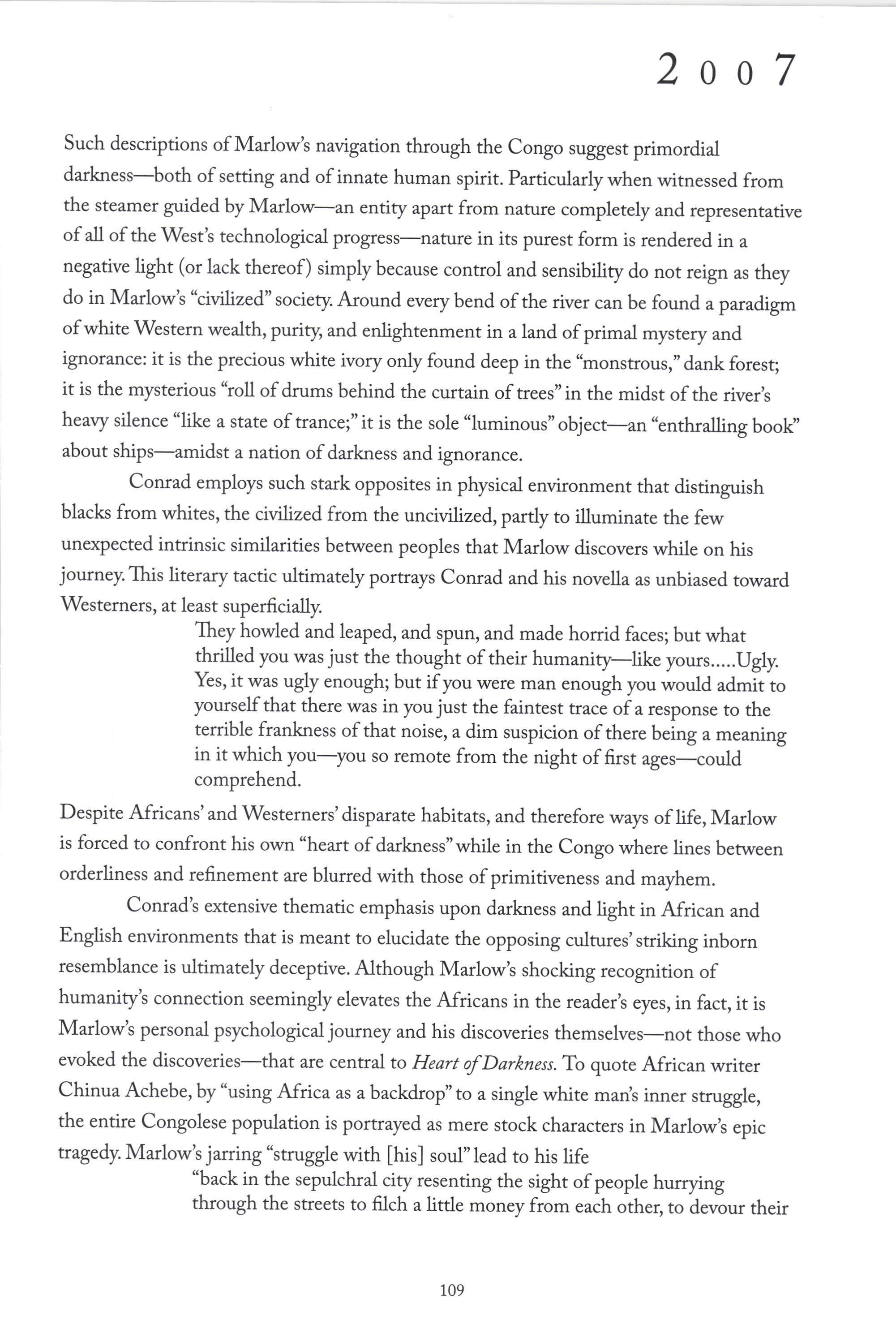
They howled and leaped, and spun, and made horrid faces; but what thrilled you was just the thought of their humanity-rike yours.....Ugly. Yes, it was ugly enough; but if you were man enough you would admit to yourself that there was in you just the faintest trace of a response to the terrible frankness of that noise, a dim suspicion of there being a meaning in it which you-you so remote from the night of first ages-could comprehend.
Despite Africans'and Westerners'disparate habitats, and therefore ways of life, Madow is forced to confront his own "heart of darkness"while in the Congo where lines between orderliness and refinement are blurred with those of primitiveness and mayhem.
Conrad's extensive thematic emphasis upon darkness and light in African and English environments that is meant to elucidate the opposing cultures'striking inborn resemblance is ultimately deceptive. Although Marlow's shocking recognition of humanity's connection seemingly elevates the Africans in the reader's eyes, in fact, it is Marlow's personal psychological journey and his discoveries themselves-not those who evoked the discoveries-that are central to Heart ofDarkness.To quote African writer Chinua Achebe, by "using Africa as a backdrop" to a single white man's inner struggle, the entire Congolese population is portrayed as mere stock characters in Marlow's epic tragedy. Marlow's jarring "struggle with [his] soul" lead to his life "back in the sepulchral city resenting the sight of people hurrying through the streets to filch a litde money from each other, to devour their
2 o o 7
109
infamous cookery to gulp unwholesome beer..'..They were intruders whose knowledge of life was to [him] an irritating presence, because [he] felt so sure they could not possibly know the things [he] knowls] [he] had no particular desire to enlighten them, but [he] had some difficulty in restraining fhimself] from laughing in their faces so full of stupid importance.
Upon his return to Europe, Marlow's personal realizations do not motivate him to share his woddly experiences with others, but simply drive him to a state of arrogant pride. Achebe notes that although Marlow's perceptions are forever altered by his encounters in "the heart of darkness," he is unwilling to accredit a simple human behavior such as language to the "savages" in the Congo. Because Marlowb internal struggle-and not the significant encounters with the African world-is the focus of Conrad's novella, Conrad implicitly places the white Westerner, Marlow; on an cultural pedestal, as the Africans (to whom he is supposedly akin) and their home simply serve as a dark location at which a single mind is enlightened.
Conrad's pervasive use of darkness in nature as a theme throughout his novella Heart of Darkness superficially serves as the primary tool with which he elevates white Westerners above savage Africans. However, Conrad's attempt to portray himself and his work as non-racist becomes clear when he employs such a light/dark thematic dichotomy to actually illuminate the two cultures'innate similarities. Ultimately, Conrad's use of insignificant literary devices to equalize blacks and whites is futile as the focus of the novella after Marlow begins to uncover the depths of his own "heart of darkness" implicidy refutes the idea of Africans as legitimate human beings, as they become simply "a backdrop" to Marlow's personal journey.
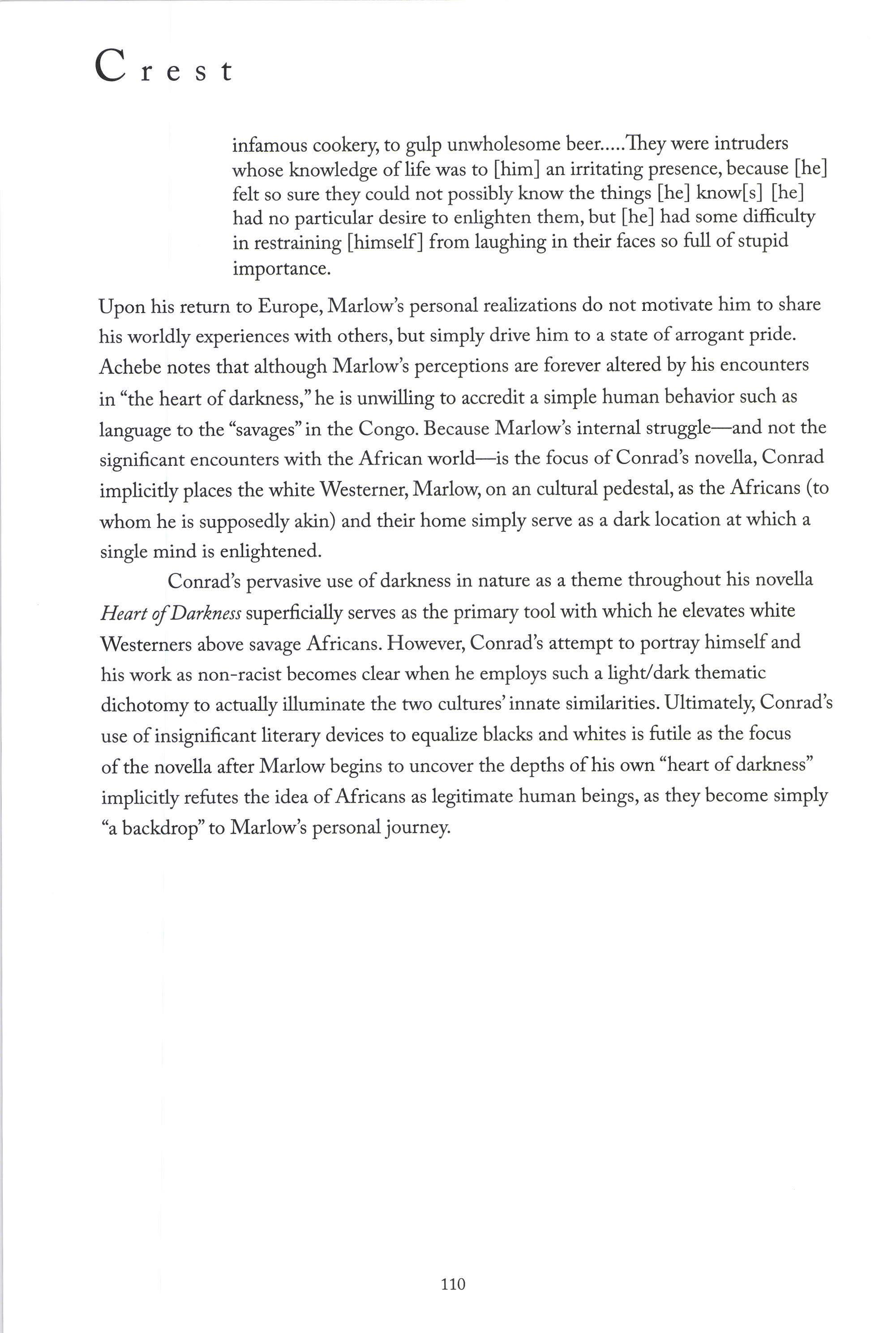
C rest
110
Grandpa Willie
Stephanie Hadden
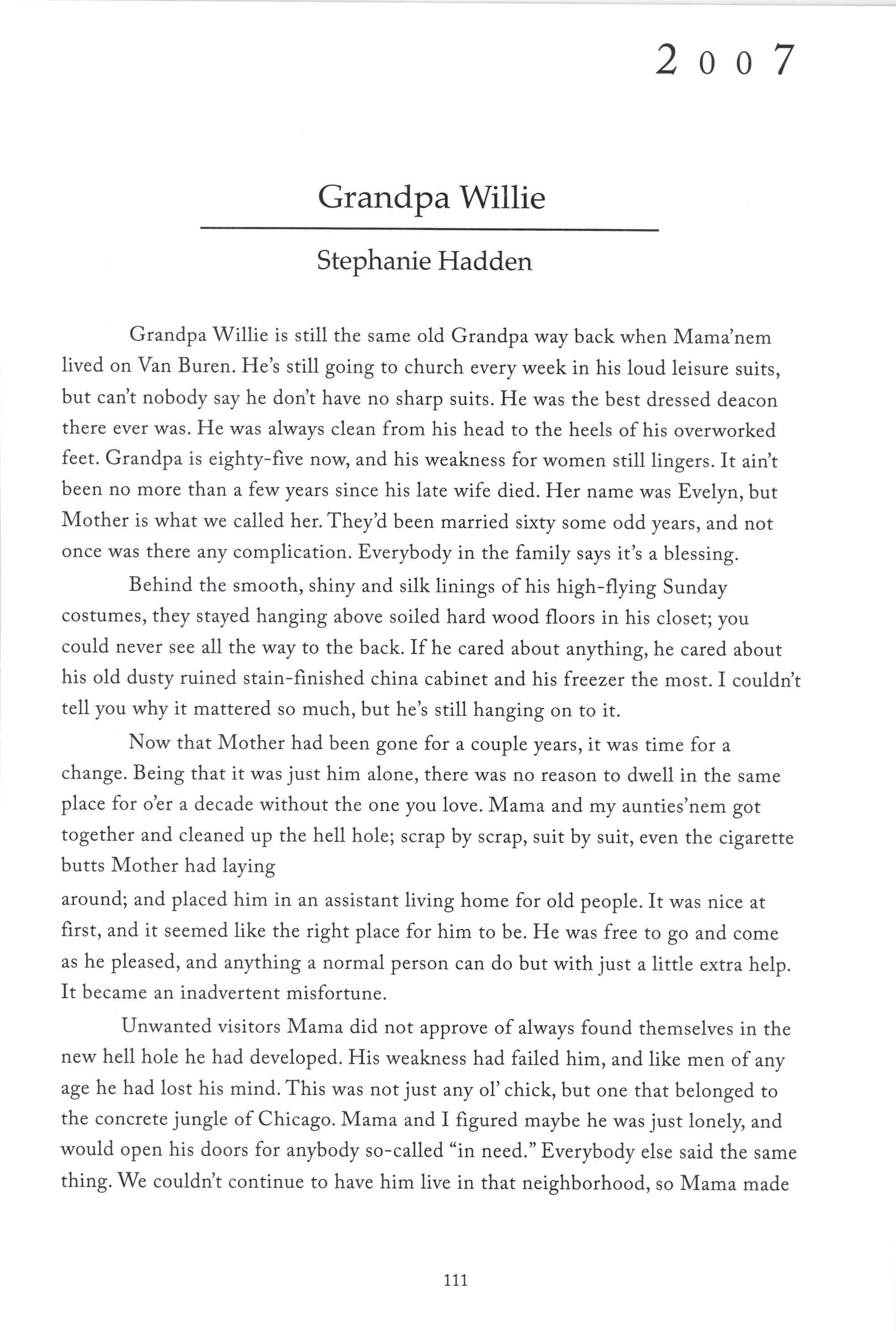
Grandpa Willie is still the same old Grandp a way back when Mama'nem lived on Van Buren. He's still going to church every week in his loud leisure suits, but can't nobody say he don't have no sharp suits. He was the best dressed deacon there ever was. He was always clean from his head to the heels of his overworked feet. Grandpa is eighty-five now, and his weakness for women still lingers.It ain't been no more than a few years since his late wife died. Her name was Evelyn, but Mother is what we called her. They'd been married sixty some odd years, and not once was there any complication. Everybody in the family says it's a blessing. Behind the smooth, shiny and silk linings of his high-flying Sunday costumes, they stayed hanging above soiled hard wood floors in his closet; you could never see all the way to the back. Ifhe cared about anything, he cared about his old dusty ruined stain-finished china cabinet and his frcezer the most. I couldn't tell you why it mattered so much, but he's still hanging on to it.
Now that Mother had been gone for a couple years, it was time for a change. Being that it was just him alone, there was no reason to dwell in the same place for o'er a decade without the one you love. Mama and my aunties'nem got together and cleaned up the hell hole; scrap by scrap, suit by suit, even the cigarette butts Mother had laying aroundl and placed him in an assistant living home for old people.It was nice at first, and it seemed like the right place for him to be. He was free to go and come as he pleased, and anything a normal person can do but with just a little extra help. It became an inadvertent misfortune.
Unwanted visitors Mama did not approve of always found themselves in the new hell hole he had developed. His weakness had failed him, and like men of any age he had lost his mind. This was not just any o1'chick, but one that belonged to the concrete jungle of Chicago. Mama and I figured maybe he was just lonely, and would open his doors for anybody so-called "in need." Everybody else said the same thing. We couldn't continue to have him live in that neighborhood, so Mama made
2 o o 7
111
it her duty to find some place new for him; and she did. She found a place right down the street from the church. So now, he can be seen in his suits and not get'em wrinkled from sittiri down too long. He's always hated that 'cause it took too long just to put'em in the cleaners.
One early Sunday morning before church,I got up to go and help my Mama clean up his place. He had to be out by the first. The unwanted visitor nobody could stand was found lurking in the bedroom. All hell broke loose. Obscenities tearing hearts apart and police sirens shook my soul. He'd chosen her over the kids he'd raised most of their lives. He shouted, "I have no kid, no grandkids. All I got is a brotha in California and a nephew in Milwaukee!" I had never encountered so much drama at a day's beginning. We left. Grandpa Willie went on ahead to church. He's said he's sorry. Now he's even lonelier, because now, nobody speaks to him.

It probably had to be a week later after the outbreak occurred that Grandpa Willie called the house. Every since my stepdad came into the picture, that's usually who he calls for now. Honestly I really don't think he knows his name. He says, "Hello, lemme speak to uh, Beverly's husband." I laughed at his country accent, but I know he meant Charles, so I went to give him the phone. I never actually heard what he said through the receiver, but he wanted to meet and apologize to everybody in the family he'd hurt. Shortly after their brief conversation, mom arbitrated the scattered voices: "Everybody has probably been telling him to apologize like I did, but he should want to do it because it's the right thing to do. Only he believes he doesn't have to because he raised us. Raisin'somebody doesn't excuse ignorant behavior nor does it mend the situation." Mama sure was mad. But she got over it. There wasn't much more she could say or do about it, or that she wanted to, rather. She was just too overwhelmed by the situation that it did not make sense to maintain such an unfortunate predicament.
I remember going to my aunt's house a few days after that phone call. There was another one of my aunts, Lisa, who was present when it happened, my sister, and me. We gathered around the big round dining room table to talk just like we usually do. I told her what the phone call was about and it made her mad all over again.The tone in her voice seemed to escalate after every sentence. Her face began to look rosy red like a scorching sun beaming on her light complexion.It was that very moment when she said, "I don't care anymore! He can do what he wants, but I won't be part of it." I couldn't blame her. He pranced around and threw his arms up
C rest
1t2
in rage like the backsliding Christian that he is. He seemed to think he was being thrown away. He forgot he was top Deacon. My aunt Lisa too was there to witness. She shared with us the most awful thing she d ever seen walking the frenzied streets of downtown Chicago. You could tell by the "sista girl" tone in her voice she was about to say something that would further piss us off, but knowing that it wouldn't surprise us. She went on to say, "Girl, guess who I saw downtown on my lunch break?" Of course we wanted to know, "Ooh, who you done ran into?" She'd seen Grandpa Willie and the unwanted visitor nobody could stand at the bank. She was too infuriated to actually approach the situation, so she snapped a quick flick from her cell phone. That woman was asked to leave the premises of his home and to never return. He let her go for that one second, but you can't tell a stubborn eighty-five year old man nothing to save his life. We sat in awkurard silence at the table. i{.nybody want something to drink while I'm up?" I said, merely to break the silence. I knew that both my aunts would say, "Pour me some Pepsi with cubed ice, please." We never mentioned it after that, not again. Grandpa Willie still hadn't moved. I guess his hell hole is home, for now.
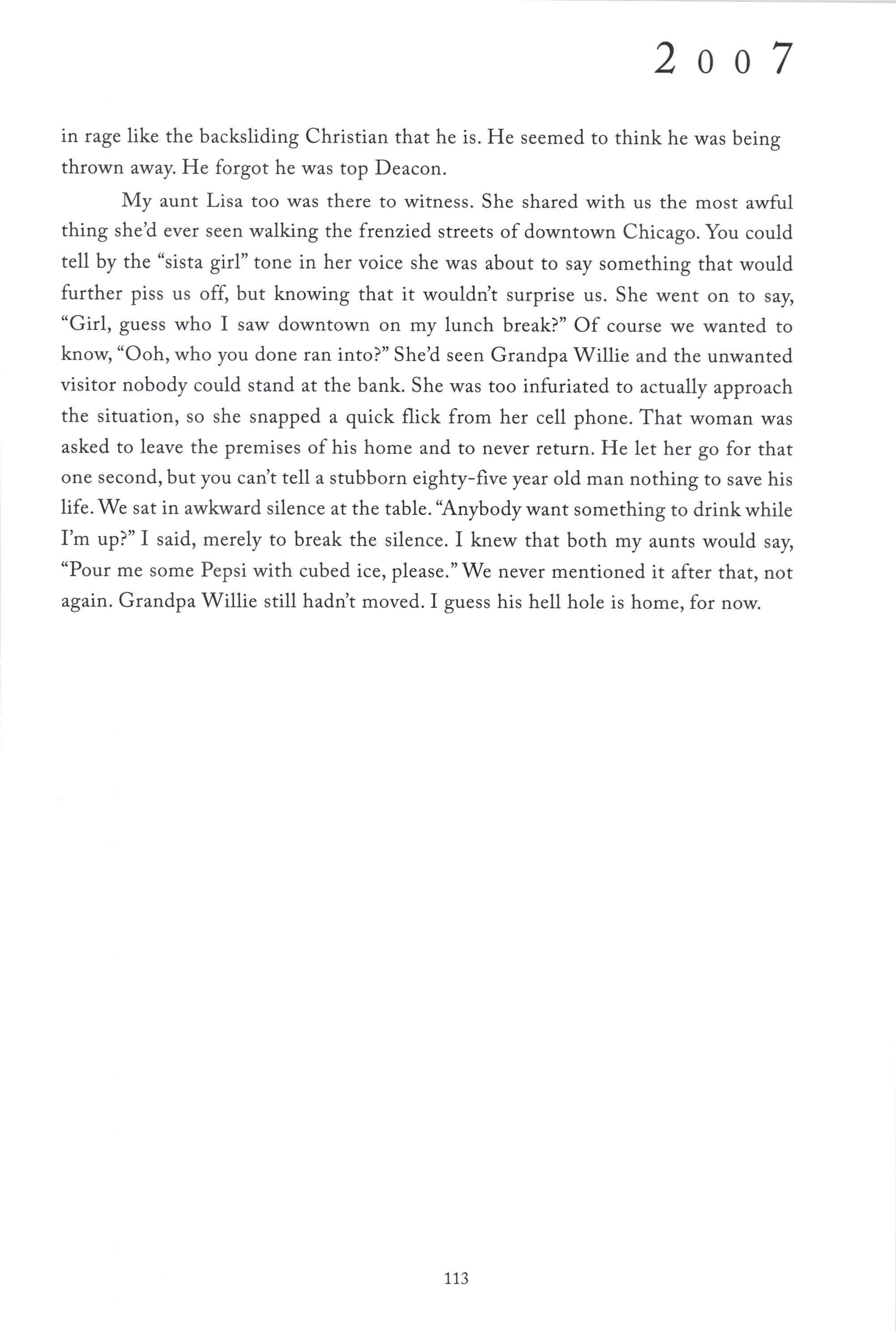
2 o o 7
113
Seams
Claire Lombardo
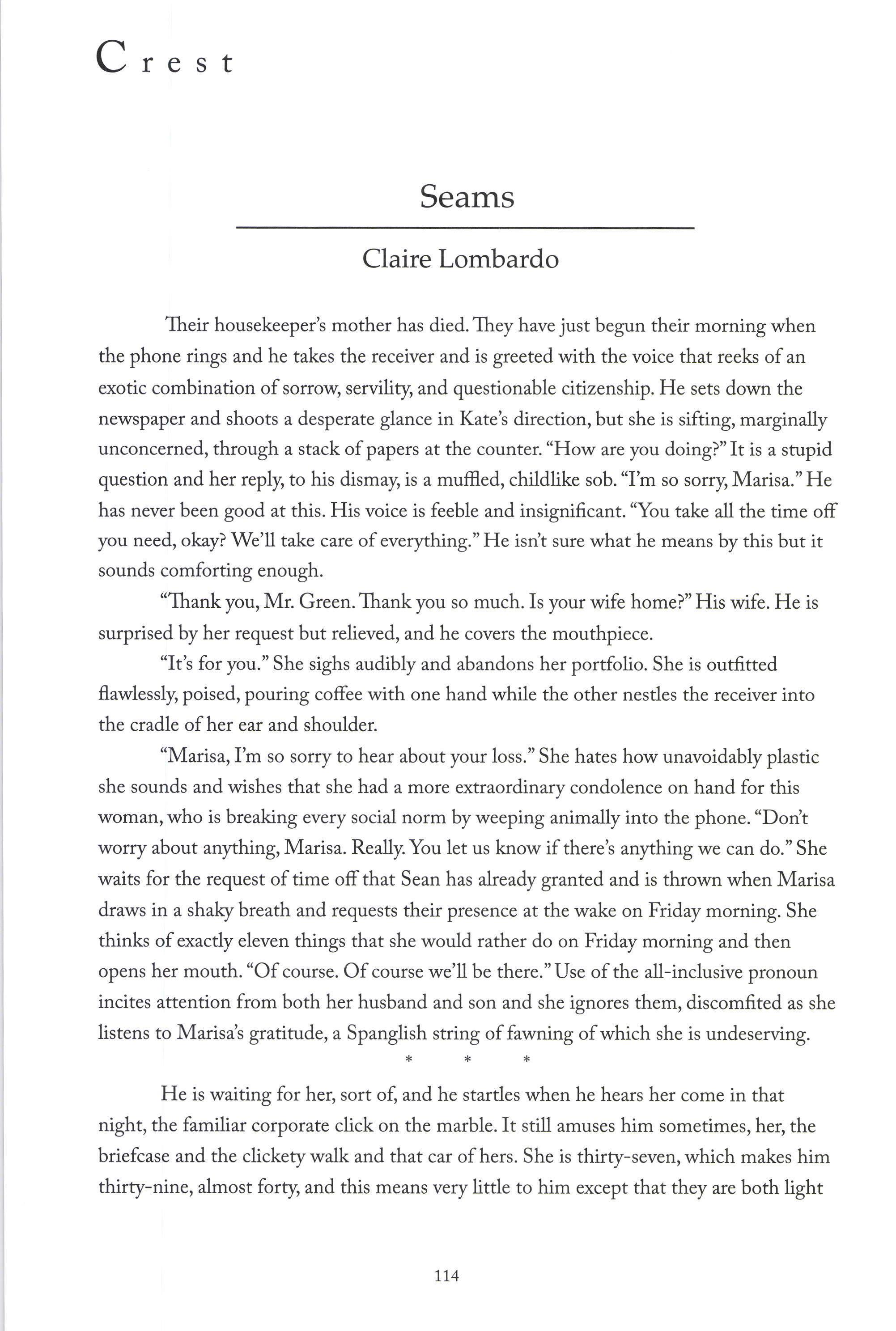
Their housekeeper's mother has died. They have just begun their morning when the phone rings and he takes the receiver and is greeted with the voice that reeks ofan exotic combination of sorrow, serviliry and questionable citizenship. He sets down the newspaper and shoots a desperate glance in Kate's direction, but she is sifting, marginally unconcerned, through a stack of papers at the counter. "How are you doing?" It is a stupid question and her reply, to his dismay, is a mufled, childlike sob. "I'm so soffy, Marisa." He has never been good at this. His voice is feeble and insignificant. "You take all the time off you need, okay? We'll take care of everything." H. isn't sure what he means by this but it sounds comforting enough.
"Thank you, Mr. Green. Thank you so much. Is your wife home?" His wife. He is surprised by her request but relieved, and he covers the mouthpiece.
"It's for you." She sighs audibly and abandons her portfolio. She is outfitted flawlessly, poised, pouring coffee with one hand while the other nestles the receiver into the cradle ofher ear and shoulder.
"Marisa,I'm so sorry to hear about your loss." She hates how unavoidably plastic she sounds and wishes that she had a more extraordinary condolence on hand for this woman,who is breaking every social norm byweeping animally into the phone. "Don't worry about anlthing, Marisa. Really. You let us know if there's anything we can do." She waits for the request of time offthat Sean has already granted and is thrown when Marisa draws in a shaky breath and requests their presence at the wake on Friday morning. She thinks of exactly eleven things that she would rather do on Friday morning and then opens her mouth. "Of course. Of course we'Il be there." IJse of the all-inclusive pronoun incites attention from both her husband and son and she ignores them, discomfited as she listens to Marisa's gratitude, a Spanglish string of fawning ofwhich she is undeserving.
He is waiting for her, sort o{, *O n. ,r-r., *.n he hears her come in that night, the familiar corporate click on the marble.It still amuses him sometimes, her, the briefcase and the clicketywalk and that car of hers. She is thirty-seven,which makes him thirty-nine, almost forty, and this means very little to him except that they are both light
C rest
tt4
yeaurs away from his dorm room, from the corkboard excuses for walls that eavesdropped on what was possibly the last time he ever really liked her, all of her. The house now, despite its vague contrived air, softens her in ways that confuse him. Outside she is quiet and pensive, severe and deliberate in her execution of things, but inside at night with them and with all that marble she is blurred, flowery never quite maternal but comforting nonetheless.
"Hi," she says, falling down next to him. She pulls at the heels of her shoes and lets them clack to the floor with an echo that surprises him.
"Long day?"
"Oh." She releases the syllable with a breath of air, closes her eyes and drops her head onto his shoulder. "There arent words." She is being overly dramatic but her delivery is flawless, almost convincing him that perhaps maybe therc aren'twords, at least not in the English language, that are capable of describing life in her glassy box. He wants to-in the most appropriate sense of the word-take advantage of this admission, this vulnerability. He isn't sure how, though, and then he remembers the noteworthy being that is locked in his bedroom upstairs and he knows she will want to know.
"I think something happened to Henry today. He seemed pretry down again. And he's still not talking." She tightens involuntarlly at again,tense arms gripping each other, feeling hollow and sick and sad. "It's a rough time," he textbooks. 'A lot of kids just go through a rough time." She is dissatisfied with this response and pulls away gently, standing up.
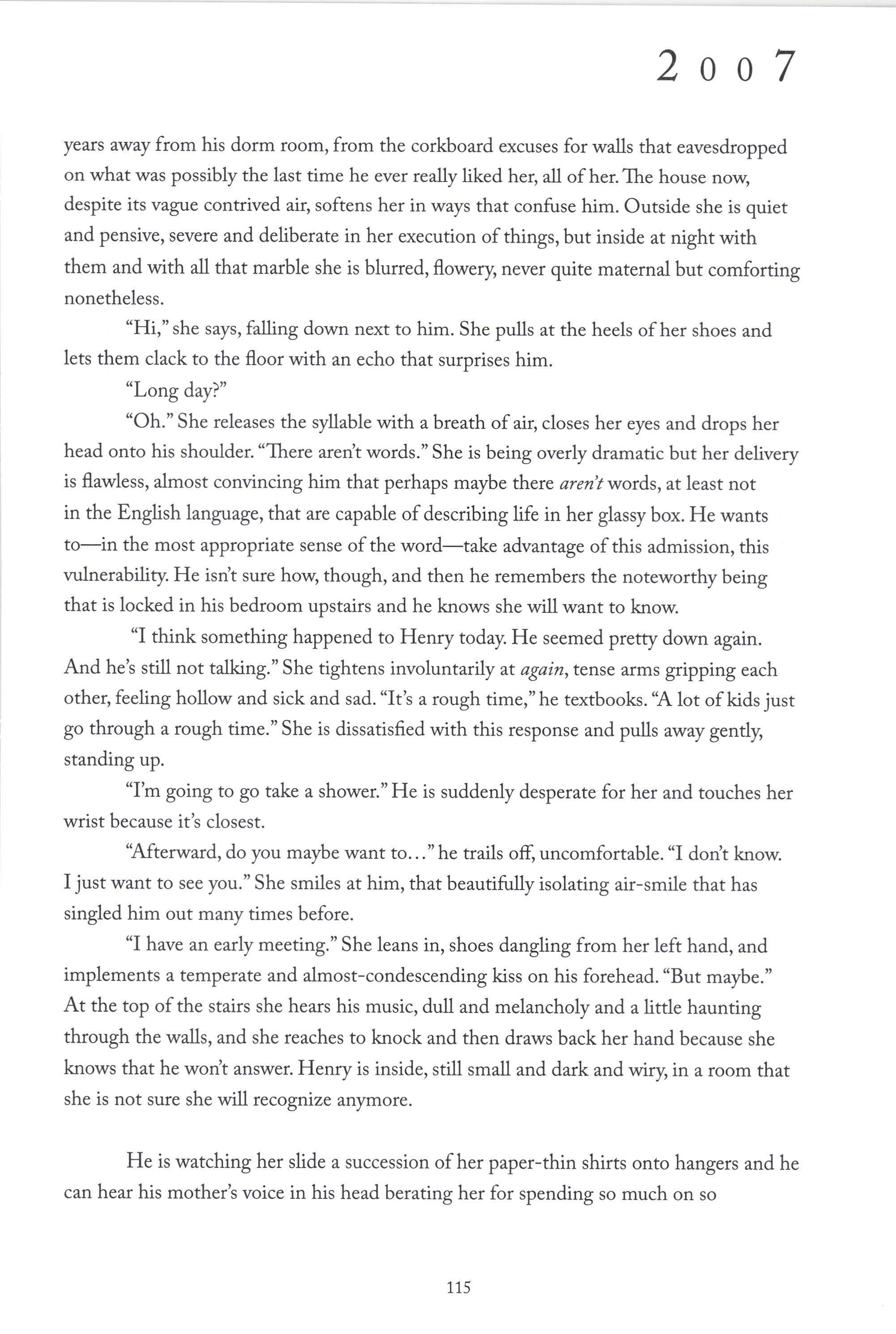
"I'm going to go take a shower." He is suddenly desperate for her and touches her wrist because it's closest.
"Afterward, do you maybe want to..." he trails off, uncomfortable. "I dont know. I just want to see you." She smiles at him, that beautifully isolating air-smile that has singled him out many times before.
"I have an early meeting." She leans in, shoes dangling from her left hand, and implements a temperate and almost-condescending kiss on his forehead. "But maybe." At the top of the stairs she hears his music, dull and melancholy and a little haunting through the walls, and she reaches to knock and then draws back her hand because she knows that he wont answer. Henry is inside, still smail and dark and wiry in a room that she is not sure she will recognize anymorc.
He is watching her slide a succession of her paper-thin shirts onto hangers and he can hear his mother's voice in his head berating her for spending so much on so
2 o o 7
115
little. Kate is speaking absendy, kind of to him but more to the duvet, as she handles the laundry that Marisa abandoned in mid-load. He has never seen her fold clothes but he isnt surprised by her precision, by the tower of his white shirts with perfecdy symmetrical sleeves. This is the first Friday that she has been home since he can remember and he is slighdy thrown by her domesticity. He sees her discover one of his t-shirts, badly sweatstained, and she stops muttering about funereal flower arrangements and looks up at him with the wrinkled nose of a nine-year-old.
"Why do we still have this?" She rises and the next thing he knows his shirt is in the wastebasket and her constant activity is almost nauseating.
"I wear it to the gym," he explains, thinking that maybe other people might be embarrassed by having their still-dirty clean laundry become a topic of conversation.
"I'11 have Marisa pick some new ones up for you when she gets back." She stops to examine her reflection and he, too, studies her elegant, appropriate black dress. "Hx my zipper?" she asks, and he assumes a position behind her, toying with the tiny black apparatus that has snagged unevenly near her shoulder blades. She is glaring at herself in the miror and brushes delicately at her eyelashes. "Or maybe I could do it." He has fixed the zipper and is confused, tracing down her back with his finger.
"I did it."
"No, the shirts."
"What shirts?" She sighs his least favorite sigh, the horribly put-upon one that makes him feel as though he has committed heinous crimes against her, and turns to him. "Maybe I could go buy you some new white shirts." He blinks and she seems to think that this is an inspired idea and so he nods at her.
"Sure you could."
Marisa likes Kate. She looks up to Kate. This is what she is thinking about as they are driving there in the car that Marisa, she thinks, certainly envies. It's weak of her. It's classless and tasteless and completely inappropriate, but she is dimly eager for this wake. Fondly fingering the hem, she is eager for the conspicuousness of her Chanel. She is eager for her introduction, for looks that she knows that she will get from Marisa's sisters, her friends. She is gratefrd for the fact that Sean is so handsome, such a seamless, agreeable man, and for his height and his shoulders and his strong handshake. She glances at Henry in the back and takes a moment to appreciate his exterior, as well. Henry is stunning, she thinks, and not just in that was that all mothers are supposed to find their sons. He is almost pretty, but there is something overwhelmingly masculine about his bone structure.
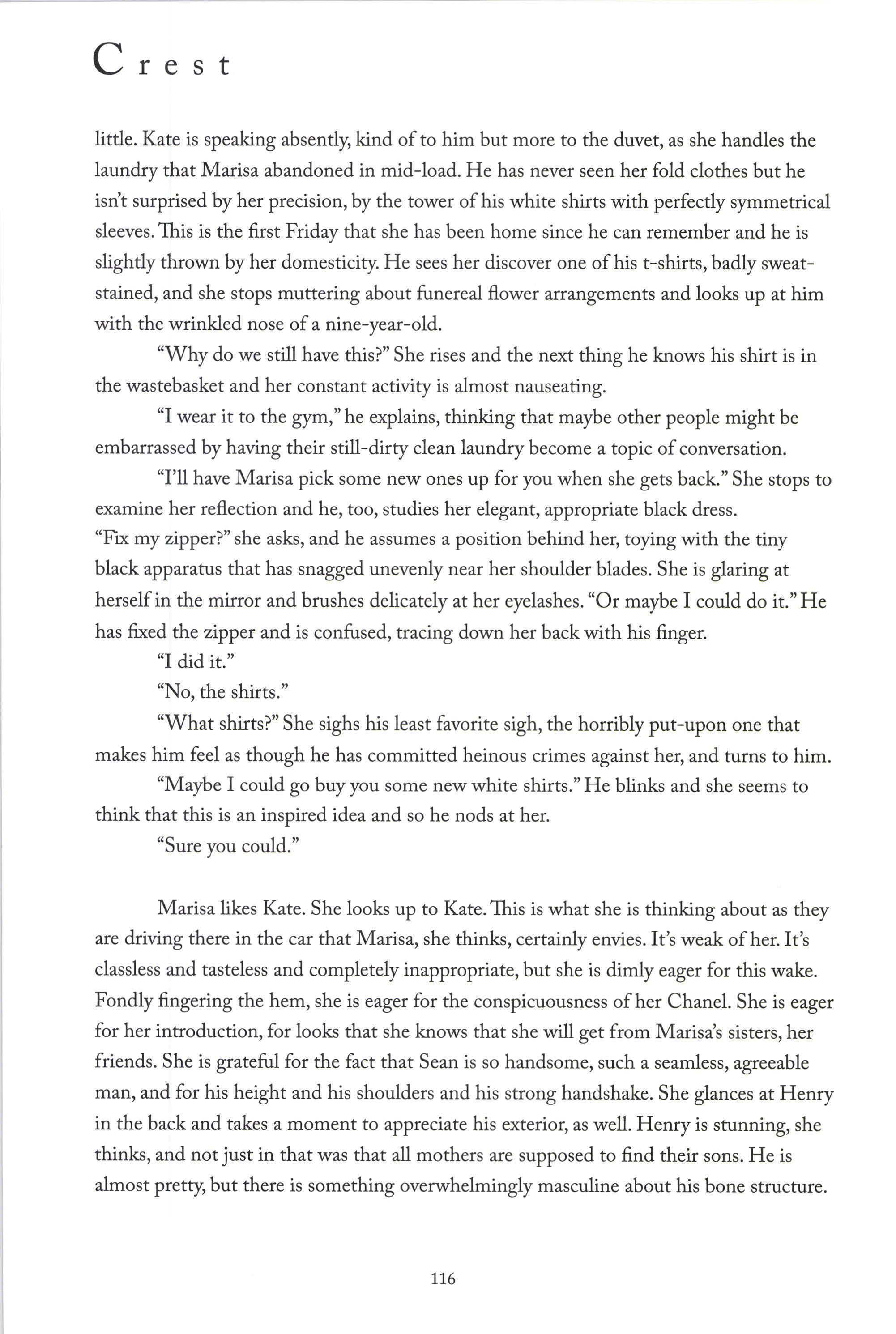
C rest
t76
He is refined, understated.
'You look lovely, sweetheart," she says, and his enquisite wood grain eyes glare at her. "You too, honey." Sean barely glances at her and nods.
"Wete here."They climb out and he starts to feel guilty and so he approaches her. He reaches and puts a hand on the small of her back and is about to tell her that she, too, looks lovely when she kisses him quickly and sffis away from his touch.
"Carefirl, sweetheart, it's delicate." She smoothes the material of her dress once more and ducks to offer the side mirror a preview of the practiced, melancholy ecpression with which she will greet Marisa. "We should go."
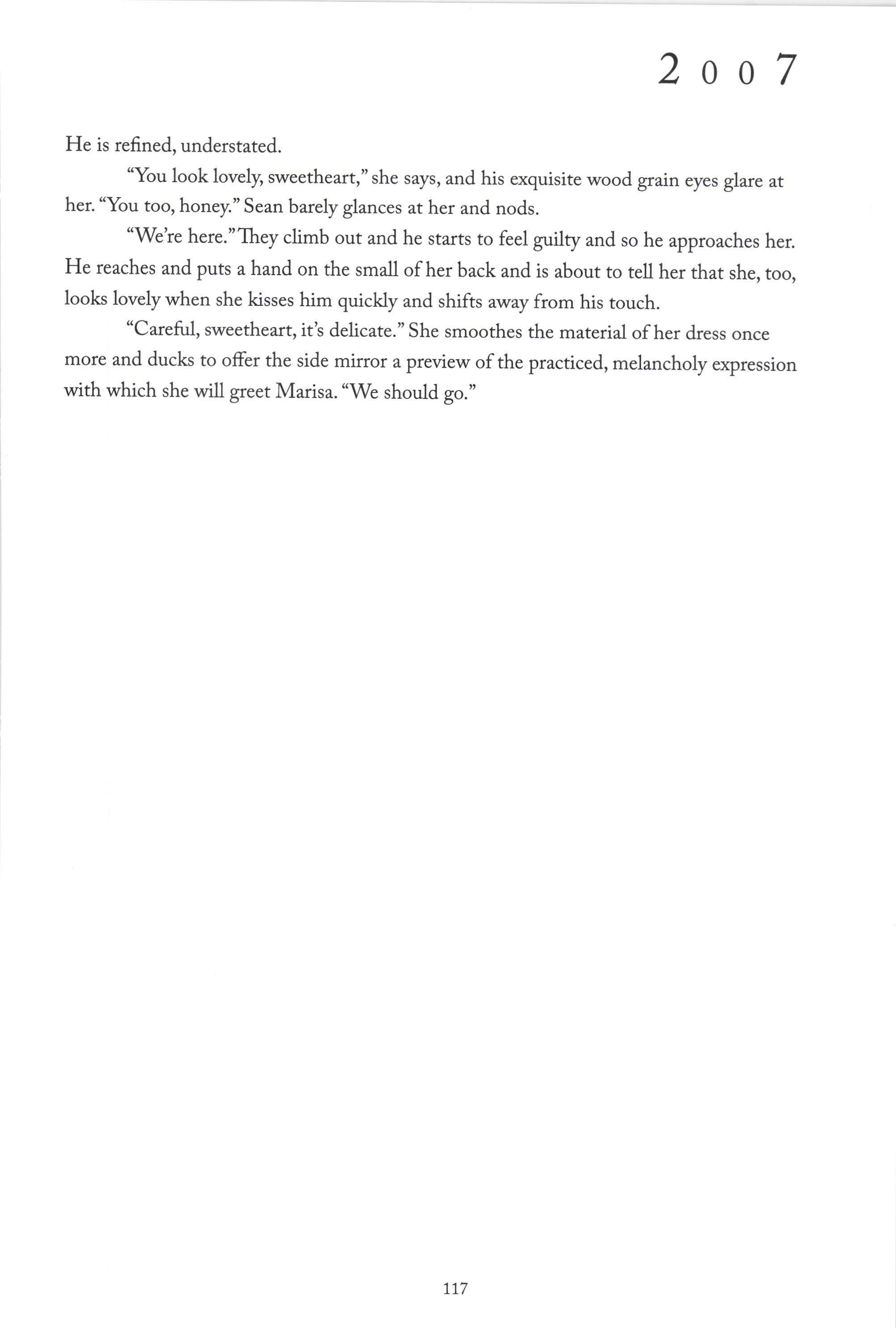
2 o o 7
117
They A11 Broke the Rules
]ulia Locascio
Arundhati Roy's 'Ihe God of Sru.all Things communicates the human condition through two mediums: the narrative of the characters'experiences in Ayemenem and a parallel experience created for the reader by resisting chronology.'Ihus, Zhe God of Small Tltings is not only a description of the human condition, but also an active experience of it. Roy guides both the reader and the characters to moral revolution,while emphasizing each moment of the process and heightening her message in an amplified setting. This moral revolution begins with forced acceptance of social stigma, progresses to an explosion of repressed desires, and setdes on a new; adapted morality. Tlte God of Small Tltings addresses mankind's most emotionally potent moraliry the morality of the "Love Laws," the morality ofjustified passion, affection, and connection, "the laws that lay down who should be loved and how."

Roy's setting,20'h century India, strengthens the power of socially-imposed morality over her characters. At the start of the novel, we learn that May in Ayemenem is a hot, brooding month.The days are long and humid. The river shrinks and black crows gorge on bring mangoes in still, dustgreen trees. Red bananas ripen. Jackfruits burst. Dissolute bluebottles hum vacuously in the fruity air. Then they stun themselves against clear windowpanes and die, fatly baffied in the sun. May, a month usually associated with rejuvenation, hope, life and prosperiry is entirely different in Ayemenem. Every aspect of the landscape-the river, the crows, the trees, the bananas, the bluebotdes-seems to falter under intense pressure. This snapshot of India is gorging ripening bursting, bumrning oacuously, stunning ixelf and dyizg. Roy paints a picture of overuse and weariness, emptiness and unarticulated exasperation.
This "brooding" atmosphere is a reflection of the pressure on India's dying political and social systems. Each stubborn influence ignores its own infirmity; each struggles to hold its head above the water as it keeps its feet tied to the sea floor. First is India's caste system, the origin of most "Love Laws."Though the system has been widely challenged by the 1960s, Zbe God of SmallThings'primary time-period, older members of the society swear by their belief in the castes. A11 they can do is watch as Untouchables gain rights, such as
C rest
118
the right to education supported by "[Estha'sJ gteat-grandfather" who built "the village school... for Untouchable children." Second is India's Marxist enthusiasm. Outrage against the caste system supports the Communist movement in India,which succeeds in capturing the passion of the working class. The movement, howeve! does not accomplish its intended effect: swift and lasting social revolution. By the 1990s, as Roy narrates, "the flag that fluttered on the roof had grown limp and old. The red had bled away." The last stubborn influence, the tenets of British and American imperialism, is the most dangerous.
Unlike the caste system and Marxist enthusiasm, British and American imperialism grows silendy and infiltrates minds subconsciously. Baby Kochamma and Maria enslave themselves to American television; Baby Kochamma presides "over the world in her drawing Medi Oti satellite TV... while her ornamental garden wilted and died, Baby Kochamma followed American NBA league games, one-day cricket and all the Grand Slam tennis tournaments."Television's effect on Baby Kochamma is just as powerfi.rl as it is emptyi television becomes her new delightfirl escape into the eager hands of American culture. A second phase of American cultural domination appears when "Hotel People" force kathakali dancers to perform their "ancient stories... collapsed and amputated... while fathers played sublimated sexual games with their nubile teenaged daughters."A new, more forgiving but less justified culture suffocates an old, sometimes beautifirl, sometimes painful culture. Such is Roy's setting for moral revolution. Estha, Rahel, and the reader all start their moral revolution overwhelmed but still accepting social stigma. As young children, Rahel and Estha do not understand the complicated events swirling around them. They, however, do feel the sadness that their loved ones feel and sense the importance of choosing the rigltt decision.They are burdened by their ancestry and their culture's "Love Laws."Their guilt is an immutable stone building without foundation.The twins cope in complimentaryways: Estha occupied very litde space in the world...A quiet bubble floating on a sea of noise...Numb...Gradually the reason for his silence was hidden away, entombed somewhere deep in the soothing folds of the fact of it.
While Rahel has a sort of enforced optimism. And a hollow where Estha's words had been... the emptiness in one twin was only a version of the quietness in the other. Estha and Rahel's smallworries-the worries that define them and their interactions with others-are forgotten and their family's big worries dominate their lives. They have no choice but to submit to what they do not understand: their family's struggle to uphold or
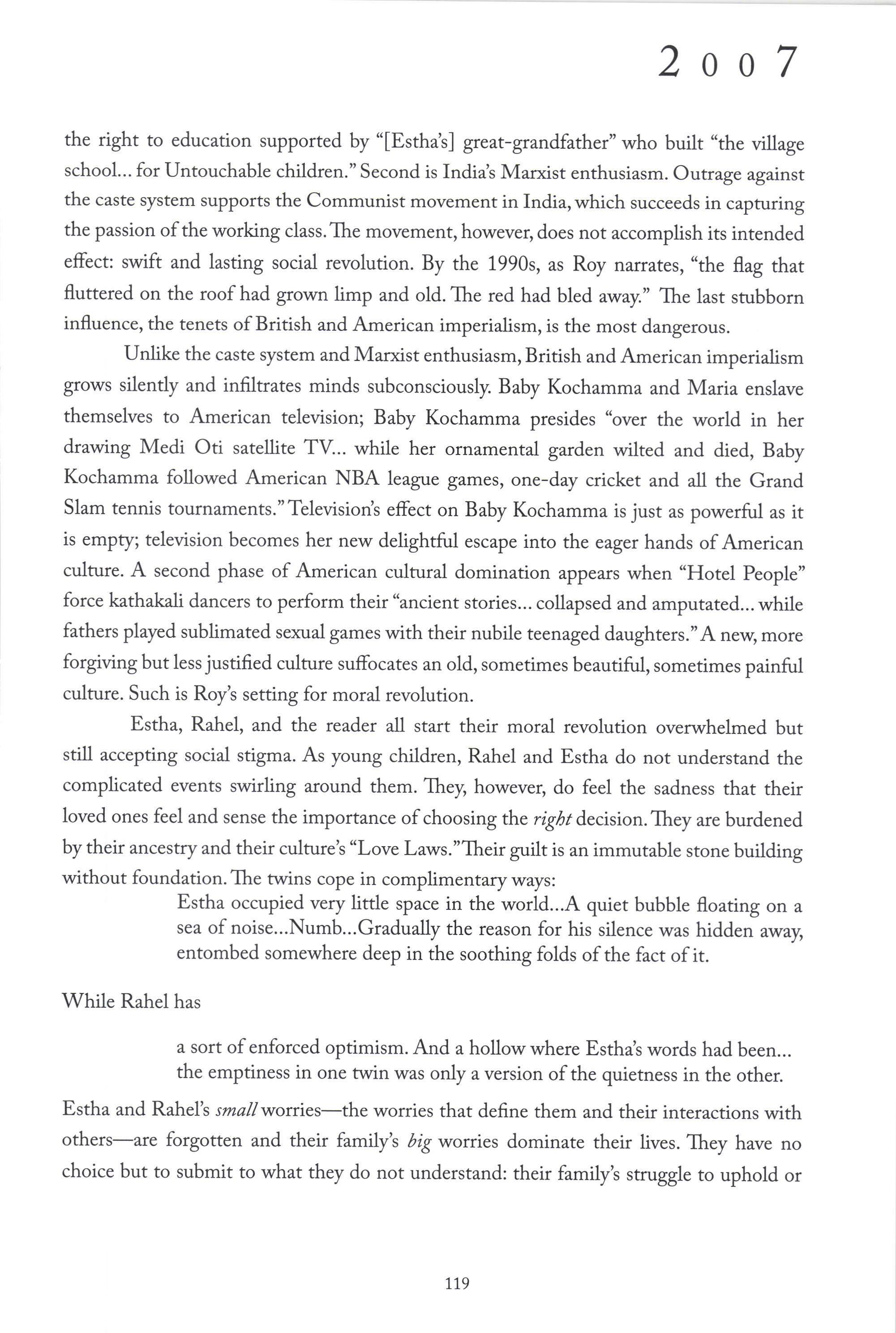
2 o o 7
179
deny the "Love Laws." Like Rahel and Estha, the reader begins the novel observing Sophie Mol's funeral and experiencing the family's anguish, but understanding neither.
The second stage of revolution is a violent explosion of pressure. 'Ibe God of Small Things'main conflicts and most violent seenes-Pappachi's physically abusive relationship with Mammachi, Chacko's violent eviction of Ammu, the Orangedrink Lemondrink man's molestation of Estha, Baby Kochamma's vile ruthlessness, police brutality against Velutha, Ammu's sexual harassment, Mammachi's rage against Velutha-serve this purpose. The violence forces the reader and characters to confront problems and define causes, to pull meaning out of chaos.
Something happened when personal turmoil dropped by at the wayside shrine of the vast, violent, circling, driving, ridiculous, insane, unfeasible, public turmoil of a nation. That Big God holed like a hot wind, and demanded obeisance.
Though at first such violence destroys most characters'identity and vitaliry their Small God, eventually the violence forces the characters to realize the fallibility oftheir preconceived moral notions.
If Roy had ended The God of Srnall Tbings after all this violence the reader would have been left with a bleak picture of the human condition. Thankfi.rlly she did not. Out of the ashes of moral chaos, a phoenix is born. The characters, namely Rahel and Estha, are left not empty, btt vacant. Sex is the ultimate emotional, physical, and social expression. It is the ultimate expression of trust, power, violence and love. When Estha and Rahel have sex,like Velutha and Ammu, they create powerful change in themselves and the reader. Their physical connection and completion of one another mirrors an emotional completionl Estha, silent or empty on the outside, and Rahel, covered in enforced optimism or empty on the inside, are now completed by each other's spirit. Rahel and Estha have broken so many "Love Laws" and defied so greatly the social morality of their childhood that they how define their own "Love Lawsr" contradicting their own moral revolution.
Part of Roy's genius is her awareness of her audience. Almost every culture views incest as taboo. Therefore, no matter how disconnected the reader is from the Indian caste system and "Love Laws,"and no matter how easy it is for the reader to condemn traditional Indian morality's detrimental effect on the characters' lives, by the end of the novel the reader must confront his or her own social stigma. Roy challenges the audience. "They all broke the rules," she says. Can you?
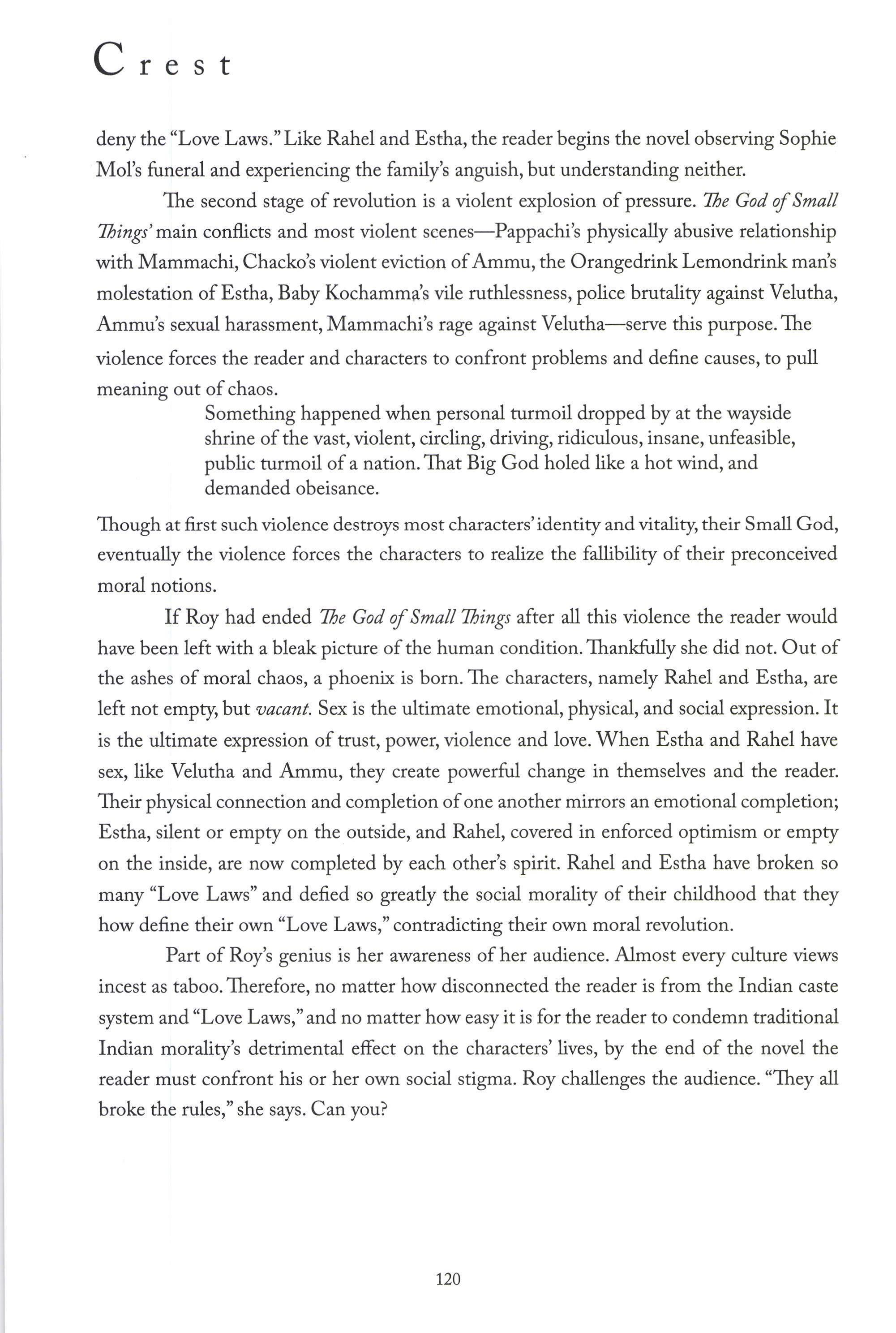
C rest
120
Wounded Knee: |une 25,2006
Carling FitzSimmons
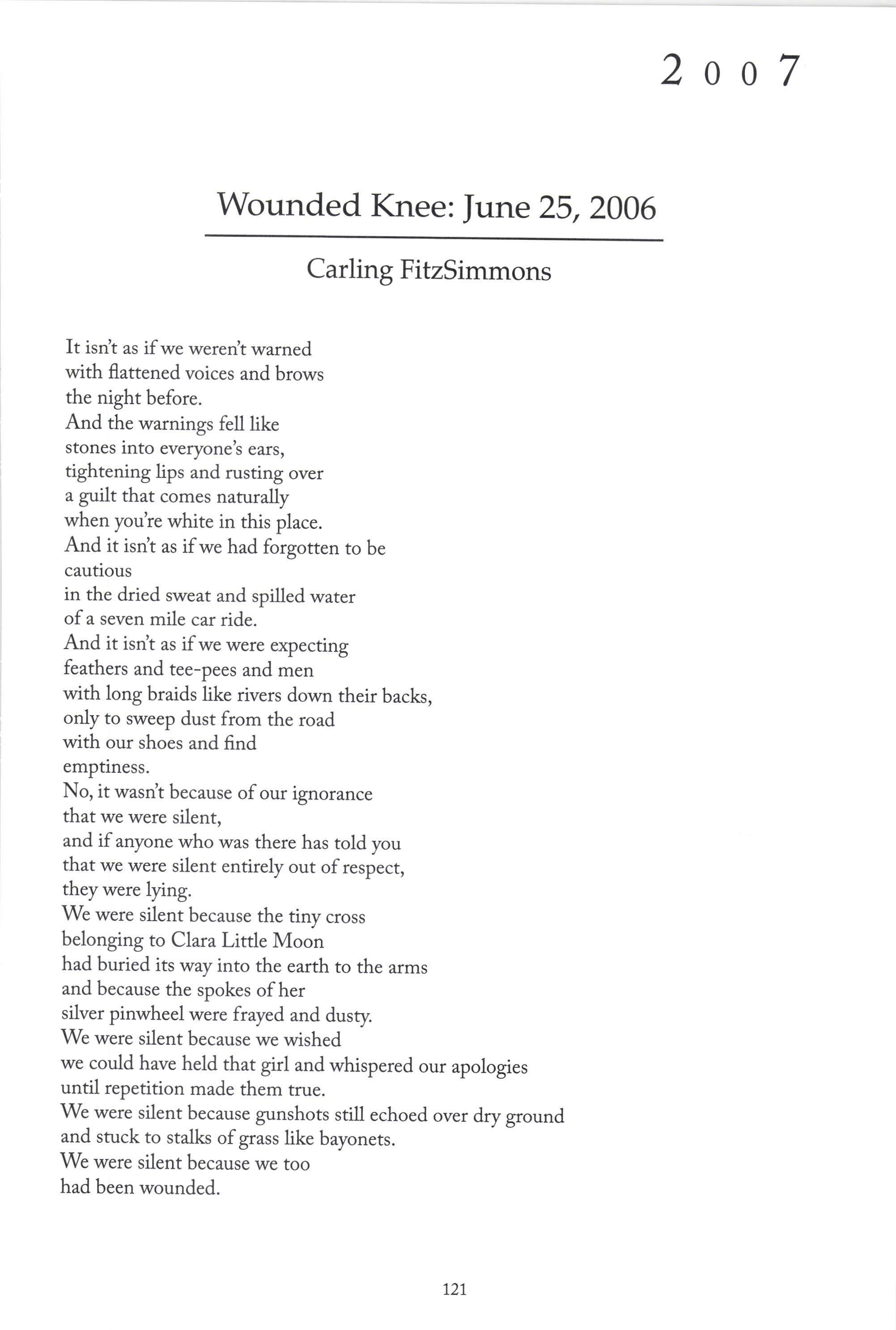
It isnt as if we werent warned with flattened voices and brows the night before. And the warnings fell like stones into everyone's ears, tightening lips and rusting over a guilt that comes naturally when youie white in this place. And it isnt as if we had forgotten to be cautious in the dried sweat and spilled water of a seven mile car ride. And it isnt as if we were expecting feathers and tee-pees and men with long braids like rivers down their backs, only to sweep dust from the road with our shoes and find emptiness.
No, it wasnt because of our ignorance that we were silent, and if anyone who was there has told you that we were silent entirely out of respect, they were lying. We were silent because the tiny cross belonging to Clara Litde Moon had buried its way into the earth to the arms and because the spokes ofher silver pinwheel were frayed and dusty. We were silent because we wished we could have held that girl and whispered our apologies until repetition made them true. We were silent because gunshots still echoed over dry ground and stuck to stalks ofgrass like bayonets. We were silent because we too had been wounded.
2oo7
72t
MLK Oratorical Contest
Luke Knanishu
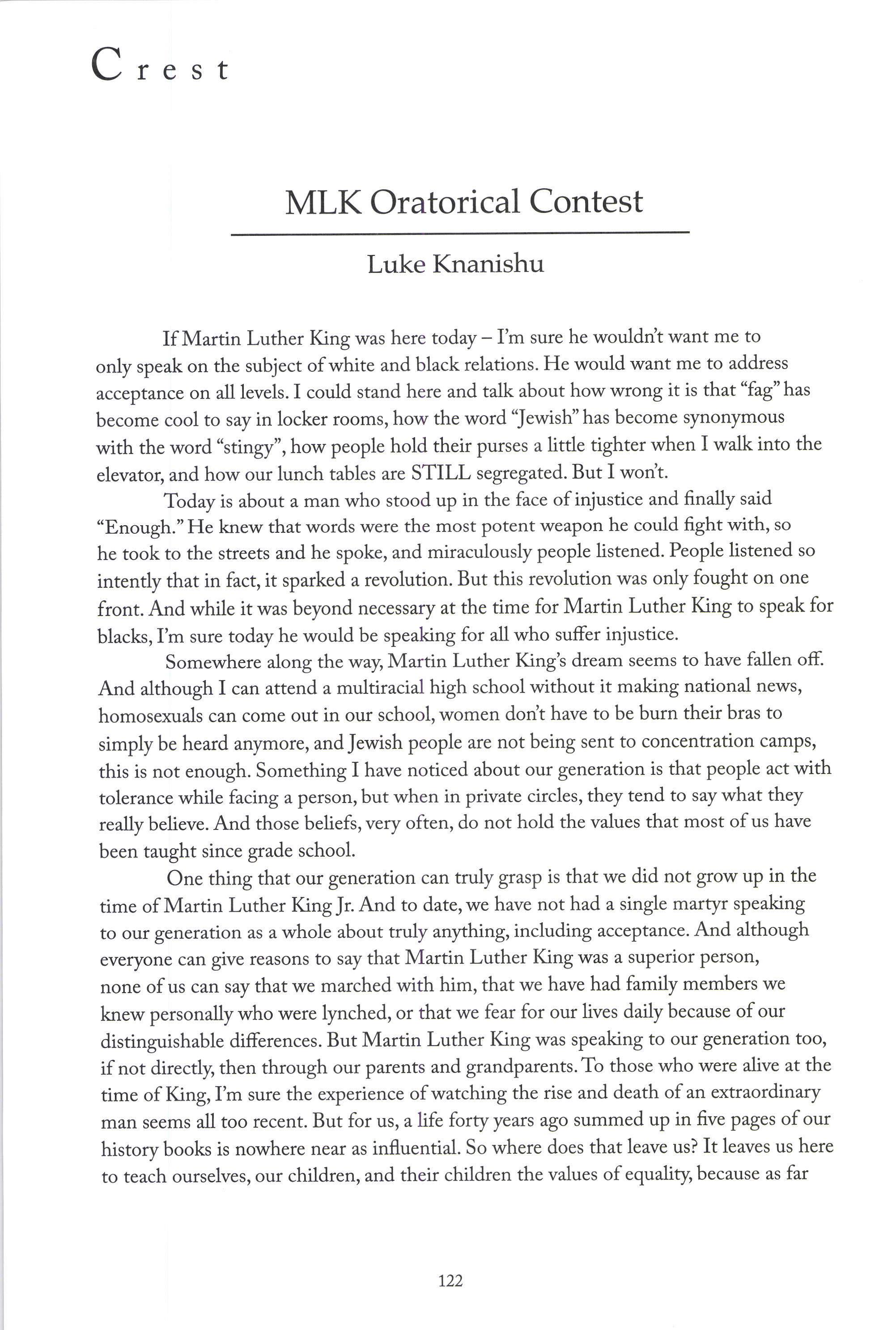
If Martin Luther King was here today - I'm sure he wouldnt want me to only speak on the subject of white and black relations. He would want me to address acceptance on all levels. I could stand here and talk about how wrong it is that "fag" has become cool to say in locker rooms, how the word 'Jewish" has become synonymous with the word "stingy", how people hold their purses a litde tighter when I walk into the elevator, and how our lunch tables are STILL segregated. But I wont.
Today is about a man who stood up in the face of injustice and finally said "Enough." He knew that words were the most potent weapon he could fight with, so he took to the streets and he spoke, and miraculously people listened. People listened so intently that in fact, it sparked a revolution. But this revolution was only fought on one front. And while it was beyond necessary at the time for Martin Luther King to speak for blacks,I'm sure today he would be speaking for all who suffer injustice. Somewhere along the way, Martin Luther King's dream seems to have fallen off. And although I can attend a multiracial high school without it making national news, homosexuals can come out in our school, women dorit have to be burn their bras to simply be heard anymore, andJewish people are not being sent to concentration camPs, this is not enough. Something I have noticed about our generation is that people act with tolerance while facing a person, but when in private circles, they tend to say what they really believe. And those beliefs, very often, do not hold the values that most of us have been taught since grade school. One thing that our generation can truly grasp is that we did not grow up in the time of Martin Luther King Jr. And to date, we have not had a single martyr speaking to our generation as a whole about truly anything, including acceptance. And although everyone can give reasons to say that Martin Luther King was a superior person, none of us can say that we marched with him, that we have had family members we knew personally who were lynched, or that we fear for our lives daily because of our distinguishable differences. But Martin Luther King was speaking to our generation too, if not directly, then through our parents and grandparents. To those who were alive at the time of King, I'm sure the experience of watching the rise and death of an extraordinary man seems all too recent. But for us, a life forty years ago summed up in five pages of our history books is nowhere near as influential. So where does that leave us? It leaves us here to teach ourselves, our children, and their children the values ofequality, because as far
C rest
122
away as King seems from our experience, he'lI seem that much farther from theirs.
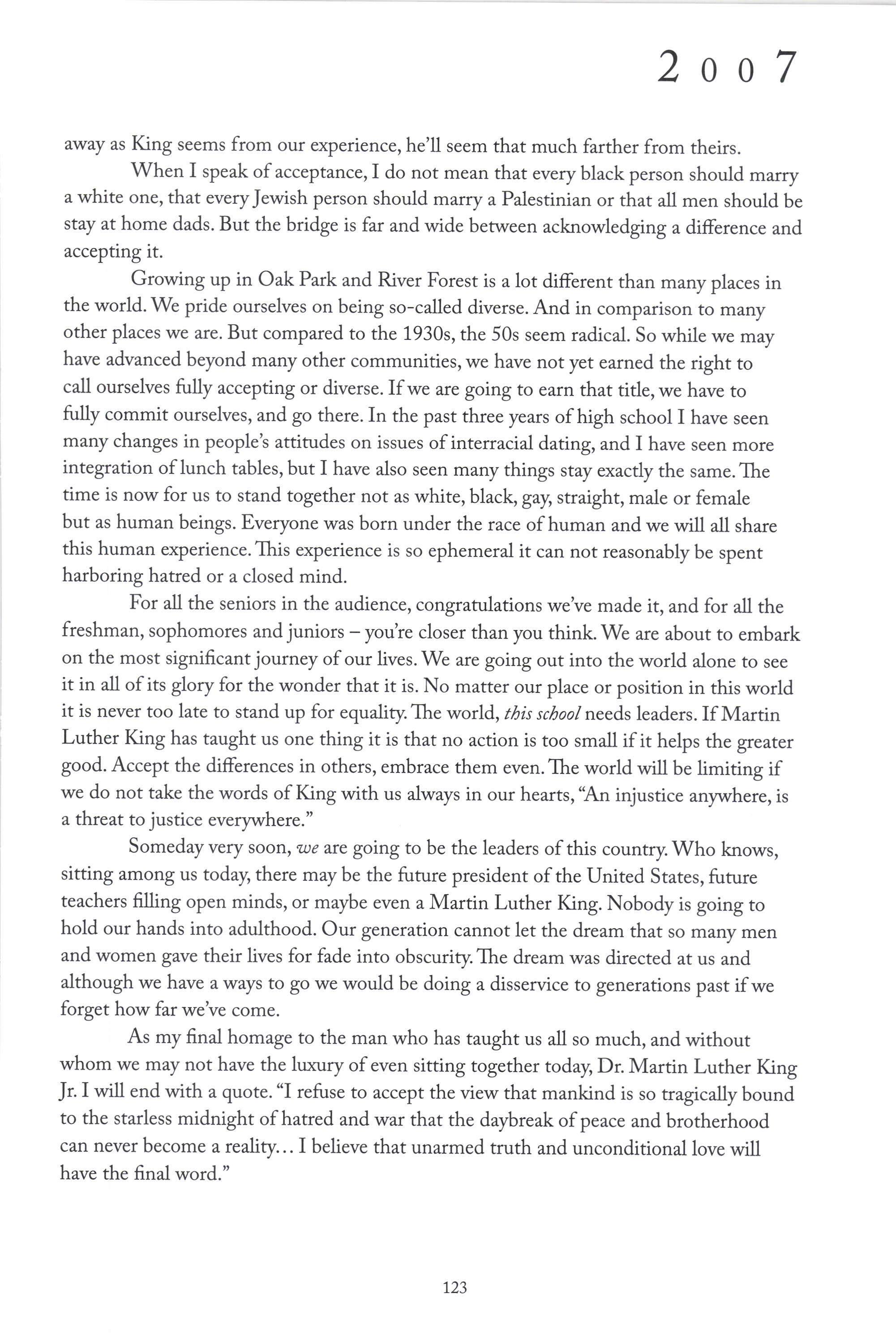
When I speak of acceptance, I do not mean that every black person should m rry a white one, that everyJewish person should marry a Palestinian or that all men should be stay at home dads. But the bridge is far and wide between acknowledging a difference and accePting it.
Growing up in Oak Park and River Forest is a lot different than many places in the wodd. We pride ourselves on being so-called diverse. And in comparison to many other places we are. But compared to the 1930s, the 50s seem radical. So while we may have advanced beyond many other communities, we have not yet earned the right to call ourselves fully accepting or diverse. If we are going to earn that title, we have to fiJly commit ourselves, and go there.In the past three years of high school I have seen many changes in people's attitudes on issues of interracial dating, and I have seen more integration of lunch tables, but I have also seen many things stay exactly the same.The time is now for us to stand together not as white, black, gay, straight, male or female but as human beings. Everyone was born under the race of human and we will all share this human experience. This experience is so ephemeral it can not reasonably be spent harboring hatred or a closed mind.
For all the seniors in the audience, congratulations we've made it, and for all the freshman, sophomores and juniors - you're closer than you think. We are about to embark on the most significant journey of our lives. We are going out into the wodd alone to see it in all of its glory for the wonder that it is. No matter our place or position in this world it is never too late to stand up for equality. The world, tbis scbool needs leaders. If Martin Luther King has taught us one thing it is that no action is too small if it helps the greater good. Accept the differences in others, embrace them even. The world will be limiting if we do not take the words of King with us always in our hearts, "An injustice anywhere, is a threat to justice everywhere."
Someday very soon, aue are going to be the leaders of this country. Who knows, sitting among us today, there may be the future president of the United States, future teachers fillirg open minds, or maybe even a Martin Luther King. Nobody is going to hold our hands into adulthood. Our generation cannot let the dream that so many men and women gave their lives for fade into obscurity. The dream was directed at us and although we have a ways to go we would be doing a disservice to generations past if we forget how far we've come.
As my final homage to the man who has taught us all so much, and without whom we may not have the luxury of even sitting together today, Dr. Martin Luther King Jr. I will end with a quote. "I refuse to accept the view that mankind is so tragically bound to the starless midnight of hatred and war that the daybreak of peace and brotherhood can never become a reahty... I believe that unarmed truth and unconditional love will have the final word."
2 o o 7
723
Promise
Natalya Carrico
Hands are folded hymn books: Still, quiet, Hiding the stories in her eyes and mouth, Silencing the songs Under his ribs.

There are no more walls. Tiees become the chapel Echoing with birdsong. Genevieve's hands and breath are Still Qriet
As she waits, Listening to the empty space next to her.
There is a flower, Yellow like the sunrise On the fields, Tircked behind Margaret's ear. She wants to slip it into his shirt pocket (to say goodbye), But she knows he prefers greens And the scent of new stemming From ears.
So she gives the flower to a little girl Who holds it under her chin And glows.
She wishes they had been younger, As young as their love. She wishes his gentle touches in church Had meant something Was going to save them. Instead she knew Just like Genevieve did That winter lasted.
Forever Is a promise The dead tell the dying.
C rest
t24

a tagalong on math train to 1S d is absolutely lovely, so long as does not cross paths with Joc-
15 OUr te.
apParently a askin of the -Robbins askins. Which awesome. n a cloudy day
itzSimdots I's with not Stacey cGill from BabysitClub
is not the t doesnt keep
aft st eater, down
a troll. ut not us say
She afe her
and
Fteven Ren is destined for greatness. gets 1S tous
PUZ-
ack for crafting tiful works of art,
possib Rosenerg. hift+tr'7 Andrew W.K., attacks, and as

1S She has a valentines s aweofour she is
15 M1SS
ur w1 a name nm
mitosis. She also used to an affinity for cartoon
DQdTaylor is our hero, partially because she reminds us of Ms. Smalley from Holmes School. [ionel Btichi. UMLAU'I'!
AS
We her runs a shelter for wayward CryPt in her spare bedroom.
oy ones a on Colleen Cox is a pusher. She pushes people. Noah Epstein is the eccentric townsperson.
has li a eans.
ChristyJohnston is, among other things, a hallway tackler.
C rest
t26
a band, we're d. Color us
ener- ovana
oo IS m ressed. le has a very ectable name.
consistent with s stylish.
with a Sape.She is awesome, and was once 1n of such tlerTiiplus Micro meto find ig please him in room 306.
pencil.Ifyou acebo
o mo ucy 1n Christrnas afficionado, pretty much favorite on earth ofit. has a pretty
v S nt looking for a testaent to
asa
was ln Carbethe
so boheIS at the sun. IS
hang tevens is "HelLO!" me
has pet onaf
oflooks like Pete from Adoentures and Pete.We this. what's best a future in childrens terature.
isa star dlit$a 1n line.
ony theMffinMan. $ a craye time at Oliver spent Wendell School. olmes Elemen ng the clouds into on ls mal sha 1S ralM.
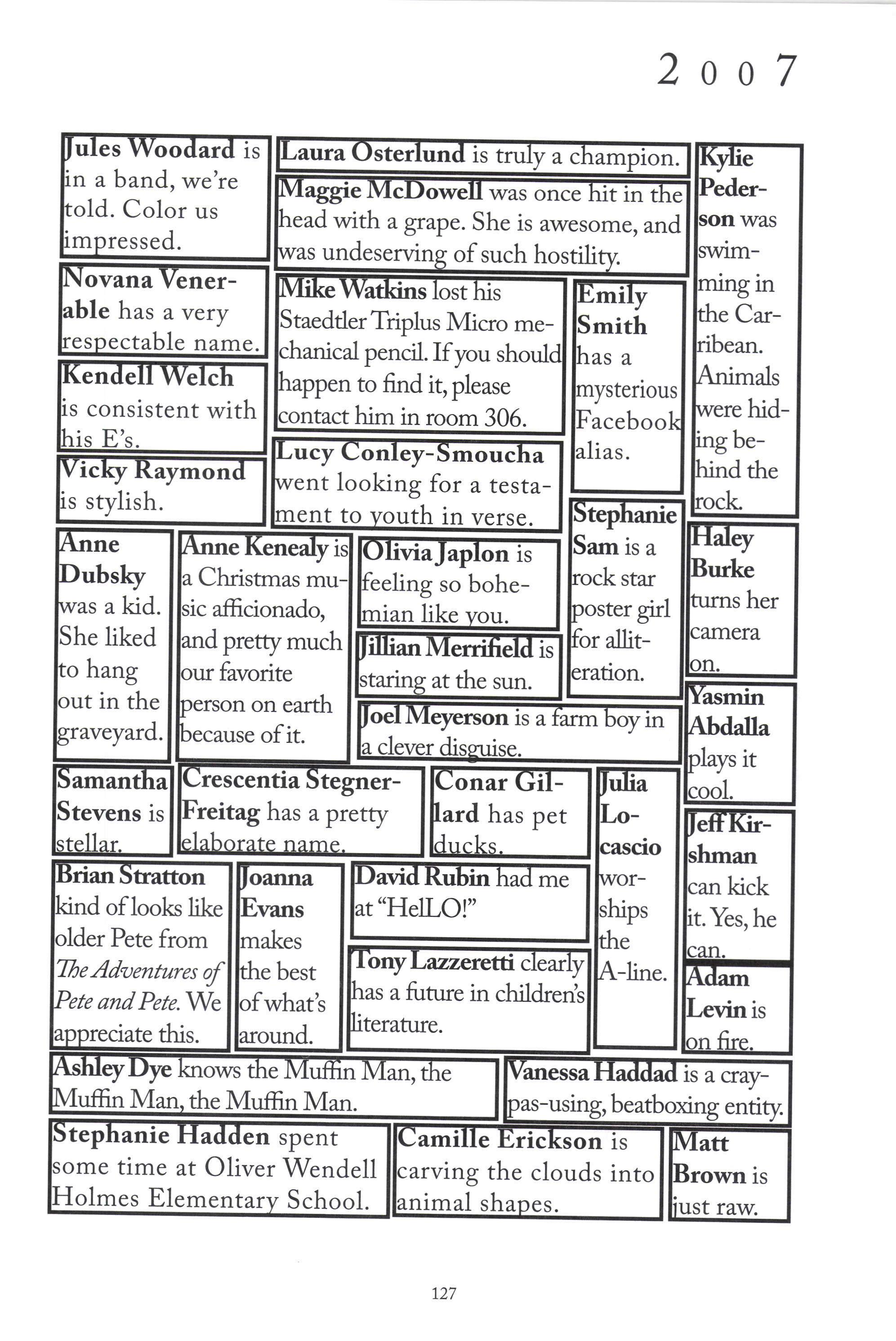
hida kid. liked in the veyard. t27
girt
2 o o 7
Yes,he kick 1S
oatmeal in the Crest room, collecting cars, being mysterious. He often fights for but that is part ofhis charm. He has an action figot thatwears plastic jeans can be found in various locations around
$ our a IS rest but he is in our hearts.
$ our enJoys 307 very favorite and we sweat his hair. He has other, fantastic commitments during
ugly
corTect m swimming. Sometimes we stalk her on FaceBecause of this,we know that she has a red dress and recendy attended a Qrin-
a puqple coat and has ca:ried a bag lunch first grade. She is incapable ofwalking in a line,but it doesrit seem to impair her tap
AS to tS uS
rain boots, and if they go missone of us is probably to blame. She gets by Leo, she ran into his daughter in and her outfits are extremelY coShe was a Mac favorite, which not mean something to you, but it sure t28
triumphant
Yorke, is a secret frequendy sports a "i af,e scientists" tIn fact,we're pretty it's the only shirt he He is kind ofbeand drives a dad with abucket of fhke in the back seat. this we love him.
The 2006-2007 Crest Editorial Board
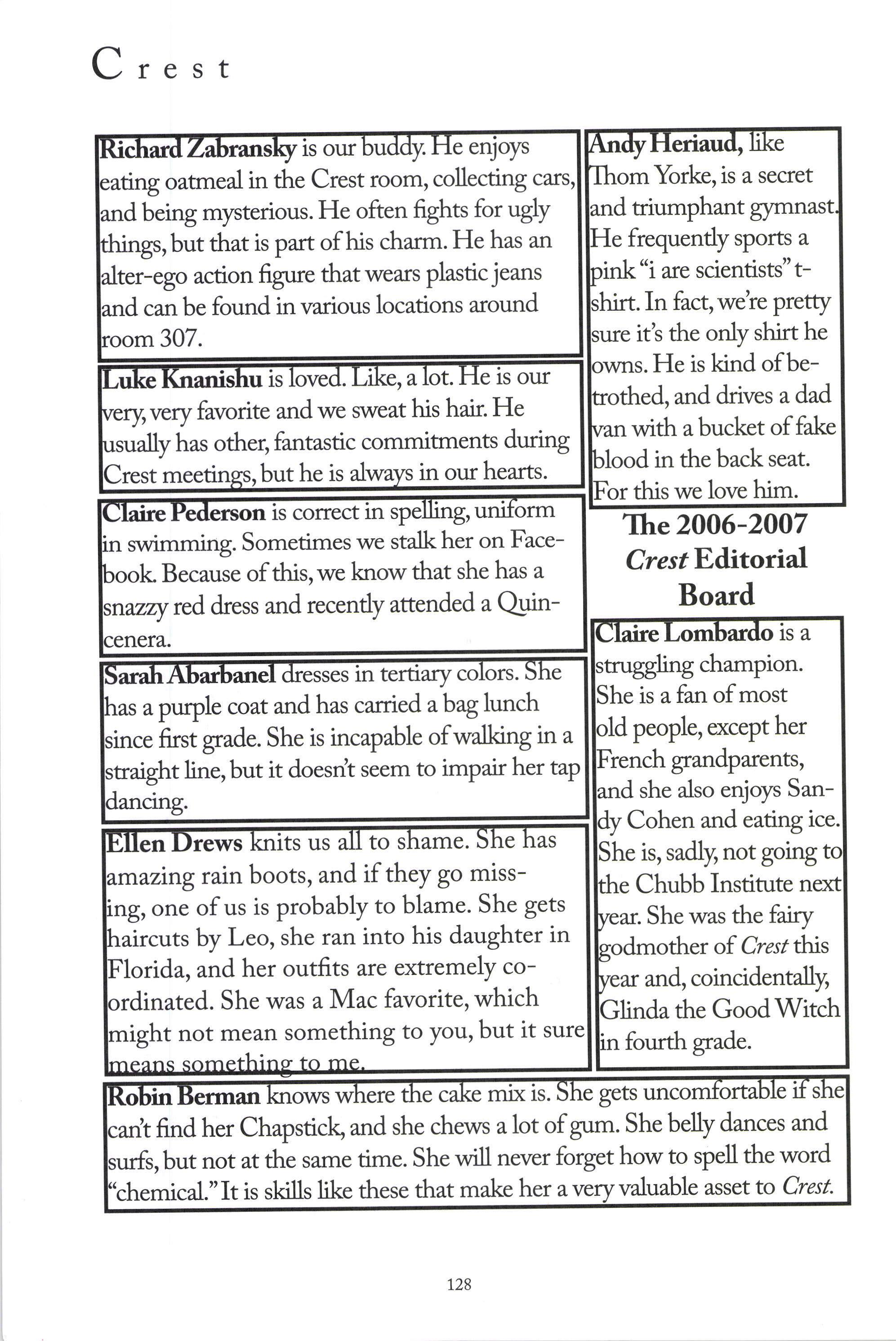
$a champion. of CresttJis
tertrary is a fan of most people, orcept her grandparents, she also enjoys SanCohen and eating ice. is, sadly, not going Chubb Institute next She was the fairy and, coincidentally, the GoodWitch fourth grade.
C rest
1S. gets and dances She of lot chews a she her and belly find gum. Chapstick, to word the never how She f,me. will not but the at SAINC spell forget valuable asset to Crat. ,, that her make a I 1S t like skills these

